

The Cost of Travel in Israel: A 2023 Travel Budget Breakdown
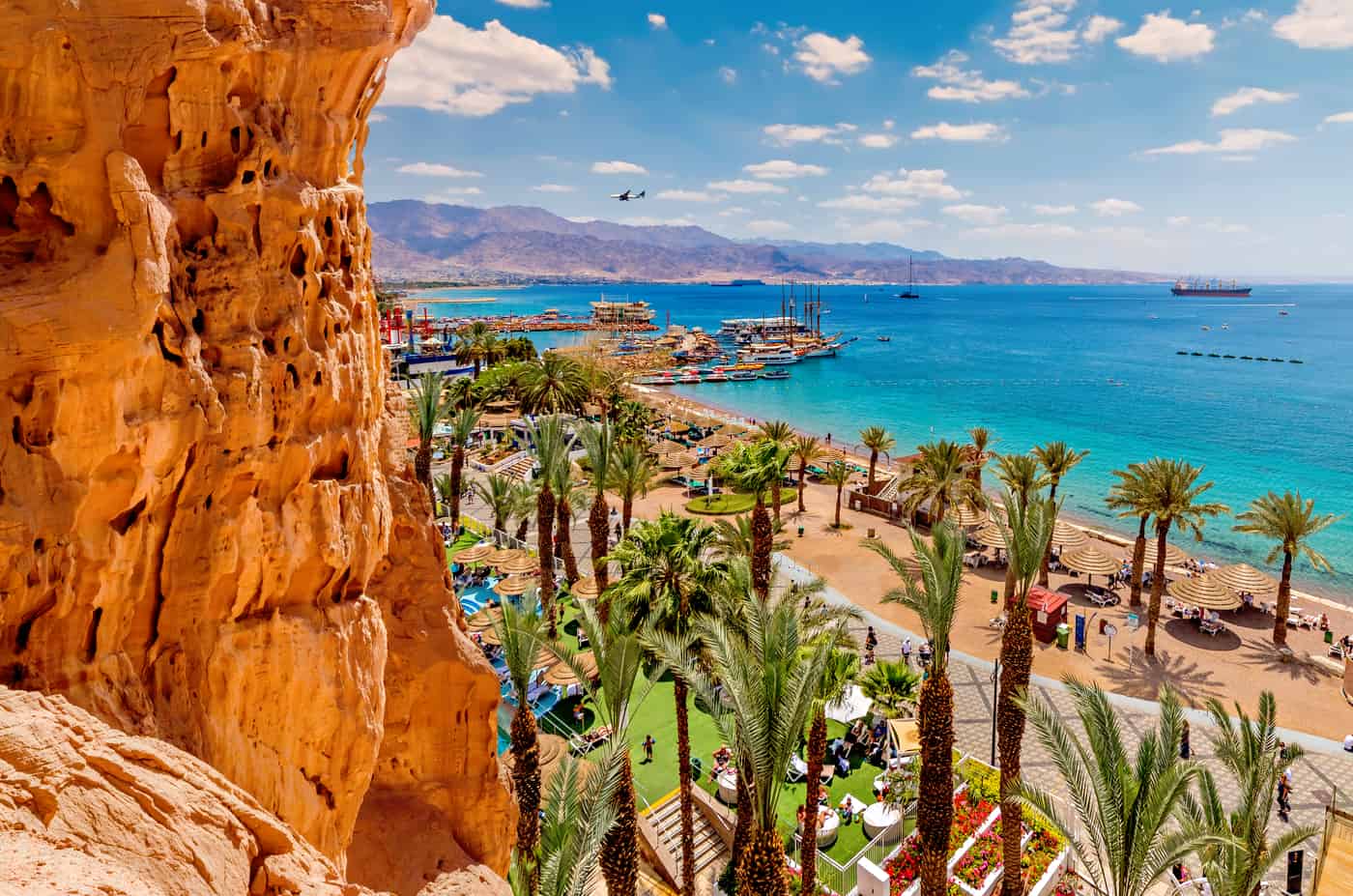
Israel is one of my favorite countries to visit in the world. It has a wonderful climate, delicious local cuisine, gorgeous natural beauty, and even more beautiful people. But what attracts most visitors to the country is its incredible history and culture.
At just 8,550 square miles, Israel packs a lot into its small landscape, which changes dramatically from region to region. Within one short trip in Israel, you could swim in the Mediterranean, ride a camel through the Negev Desert, pick farm fresh fruit from trees in the lush north, and climb the peaks of a snow-capped mount Hermon.
On top of the incredibly diverse landscape, Israel is home to a unique blend of religions and cultures. The country (Jerusalem in particular) is known as one of the most important religious sites for the Jewish, Christian, Muslim, and Baha’i people, housing some of the most important historical biblical sites on the planet, alongside sixteen cultural and geographical UNESCO World Heritage Sites.
Of course, we can’t ignore the ongoing conflict in the Middle East, which has caused massive distress throughout the region. I recommend doing some brief research on current affairs to assess the state of conflict in the country before you visit. That said, you are unlikely to notice any signs of war if you stay within the big cities.
I’ve been visiting Israel since I was a young child. With family living in both the north and the urban center of Tel Aviv, and countless friends dotted across the small country, I would say that I know Israel pretty well. My favorite cities have to be Tel Aviv / Jaffa, as well as Jerusalem, which is buzzing with excitement and local charm. I’m also a big fan of the northern parts of Israel, which are much lusher than the desert landscape down south.
Israel has been a pretty pricey place for as long as I can remember. Even when visiting with family, I have always been conscious of what I purchase and how much I spend along the way. Naturally, the cost of travel in Israel has only increased with time. So, to manage your expectations, ensure you’re prepared to spend more than you might expect.
Accommodation and food will likely be your most significant expenses while in Israel. Depending on the time of year you visit, accommodation prices soar during spring and summer to account for the influx of tourists.
It’s always best to know what to expect before visiting a foreign country, and being blindsided by unexpected Israel travel expenses is a sure way to ruin a good vacation. To make your trip more pleasant, I have used my personal experience to put together a detailed budget for the cost of travel in Israel.
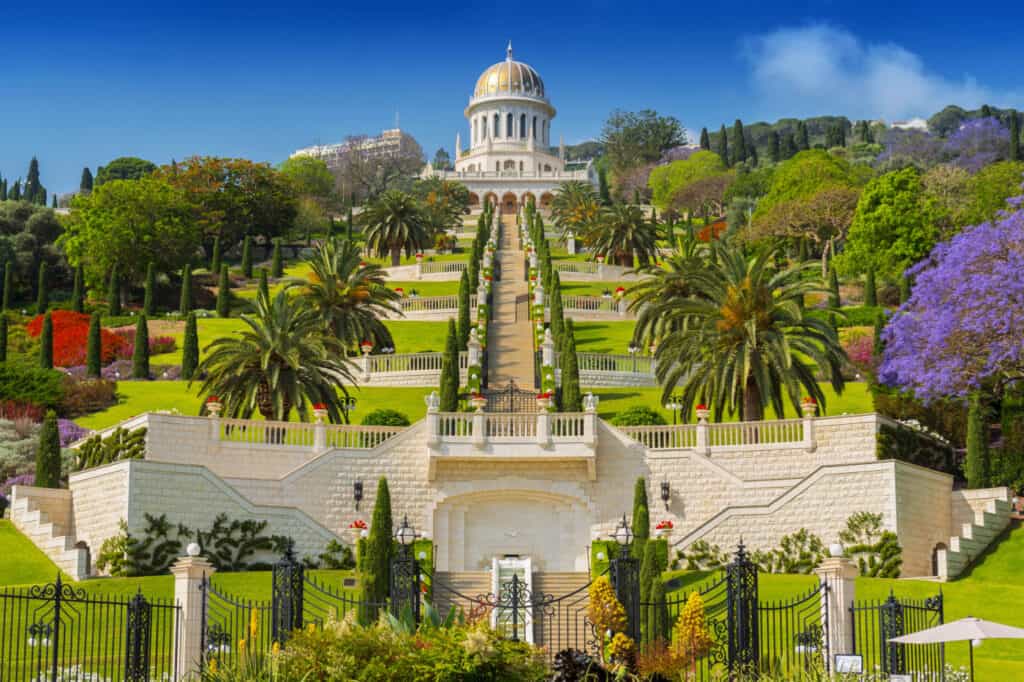
The Cost of Accommodation in Israel
As mentioned, Israel is by no means a budget holiday destination. The country holds the unpopular title of having one of the highest costs of living in the world, with Tel Aviv ranking as the most expensive city from numerous sources.
These high prices can be attributed to many factors, which are far too complicated to get into here. But the premise is that with so little land to work with (and even less fertile land to farm), the country has to import much of its fresh produce from across Europe. On top of this, over 60% of the country is covered by a barren desert, and other parts are covered by lakes and seas, leaving only a small portion to be habitable by humans.
While prices are high, there are always ways to reduce costs and save cash when traveling in any country. One of the best ways to save money on accommodation in Israel is to avoid travel during the busiest months . As a predominantly Jewish country, Israel follows a Jewish calendar with various religious holidays.
With many Jewish families congregating during certain holidays, I highly recommend avoiding travel during the following festivals:
- Pesach / Passover – Early April
- Rosh Hashanah (the Jewish New Year) – Mid-September
- Hannukah – Early / Mid-December
Weather also plays a part in tourist numbers. The peak summer season lasts from June through to September, welcoming hundreds of thousands of visitors to the country. Booking outside of the high season is a great option. Alternatively, make sure you book accommodation well in advance to avoid paying increased fees.
The best time to visit Israel is in April, May, June, or September and October. Temperatures soar during July and August, often too hot to be able to do any exciting outdoor activities.
If you have family or friends in the country, why not ask if anyone needs a house or dog sitter for the duration of your stay? You could even time your trip around a house sitting opportunity. Some house and dog sitters even get paid for their services!
Workaway is a unique agreement where applicants help provide work (household needs, projects, or odd jobs) in exchange for food and accommodation from a host.
Designed as a cultural exchange program, this concept is very familiar in Israel, where Kibbutzim and Moshavim were founded (these are socialist organizations where one works in return for a home and food). Some Workaway hosts even offer a paid allowance to ensure that workers receive a minimum wage for their services.
Couchsurfing can be considered risky in some countries but is typically safe in Israel. The official website advertises over 112 thousand hosts in Tel Aviv and Jerusalem who are willing to host you on their spare sofas or in extra rooms for no cost at all. While entirely free, Couchsurfing is also a great way to meet locals and gain a bit of local knowledge.
If you have it in your Israel budget to rent your private accommodation, there are plenty of affordable places to make your home away from home in Israel.
Airbnb offers some of the most affordable places to stay, from private rooms to shared spaces. Depending on the time of year you visit, you could find yourself a beautiful modern apartment in Tel Aviv with access to a swimming pool for as little as $100 per night.
Hostels are another excellent option for budget travelers, especially if you’re traveling solo. Primarily located in Israel’s biggest cities, some hostels offer shared dorm rooms for as little as $20 per person per night and private rooms for around $100 per night.
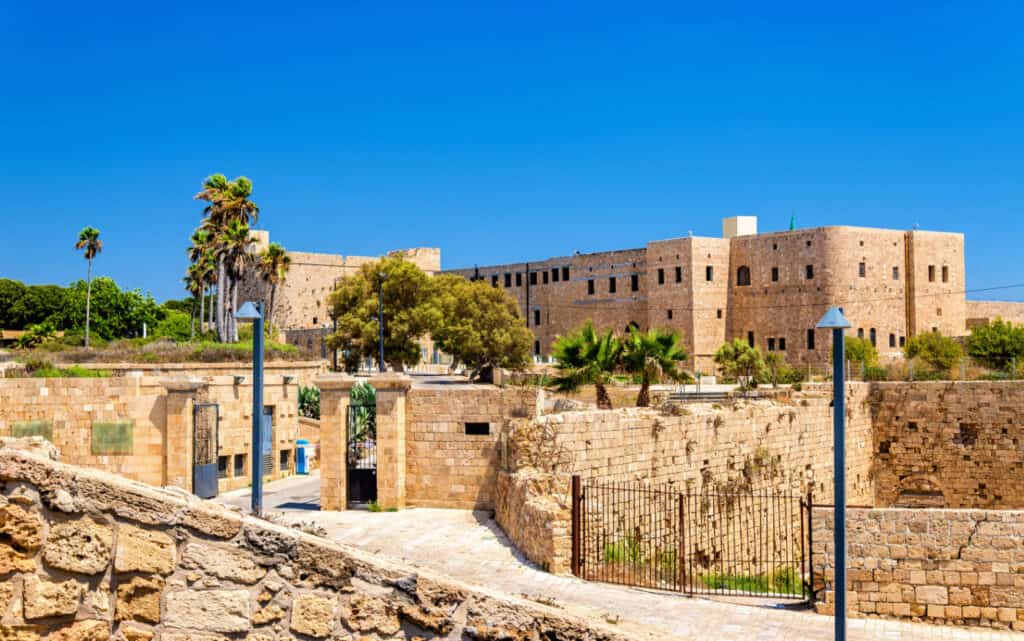
The best hostels in Israel
- Tel Aviv / Jaffa: Set in the trendy Florentin district just a short walk from Neve Tzedek and Tel Aviv’s best beaches, Florentin House ($135 for a double room) is an eco-friendly property with an onsite restaurant, shared lounge, and common kitchen. This hostel has facilities for disabled guests and family rooms, perfect for all budget travelers. If you want to be closer to the beach, WOM Beach ($40 for a single room) is a member of Brown Hotels and offers private pod-inspired rooms with convenient facilities like luggage storage and a shared kitchen.
- Haifa: Hostel Roks ($90 for a classic triple room with a double bed and a sofa) is one of only a few hostels in Haifa, and no doubt the best. The property offers simple accommodation with free private parking, a shared lounge, and a terrace with barbeque facilities. Unlike most hostels, this one doesn’t have shared dorm rooms and instead rends out double, triple, and quadruple rooms for friends traveling together.
- Jerusalem: New Citadel Hostel ($20 per bed in a shared dorm) is just a short stroll from the famous Western Wall in the heart of Jerusalem. The main feature of the hostel is its rooftop terrace, which overlooks panoramic views of the Old City. Guests can use a shared kitchen and lounge – the perfect place to socialize with like-minded travelers after exploring the city. Ideal for solo women travelers, this hostel has female-only dorms.
- Eilat: Arava Hostel (as low as $18 for a bed in a six-person shared dorm) in the town center of Eilat is just a short walk from North Beach. With free Wi-Fi, parking, and air-conditioned rooms, this basic hostel has everything you need for a good night’s rest. If you’re visiting for the diving, check out Exodus Hostel and Dive Center ($20 for a bed in a shared dorm), which offers adult-only accommodation. It’s a one-stop-shop for divers in Eilat.
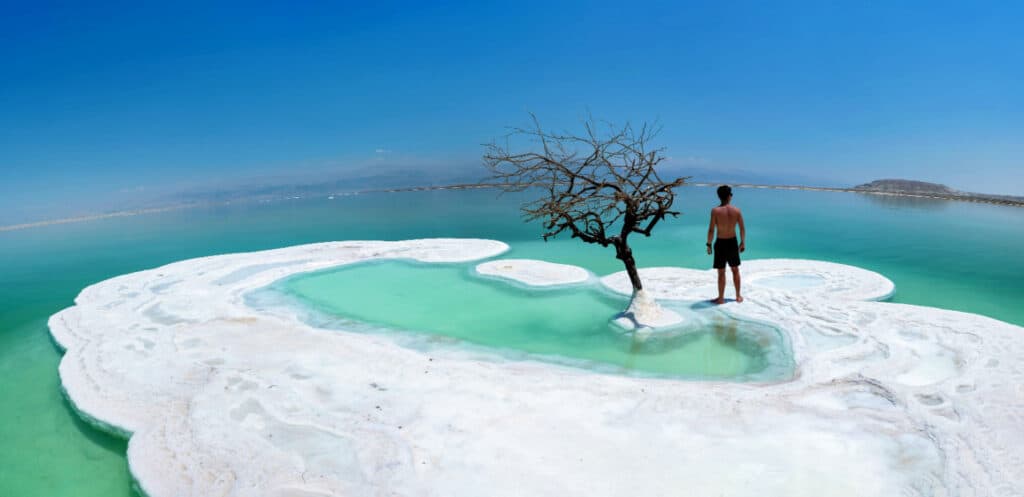
Where to stay while traveling in Israel
As mentioned, Israel is tiny. So small that you could drive from the Mediterranean to the Dead Sea in around three hours, crossing just 70 miles from west to east. The drive from south to north is also super quick, taking only about six hours.
Its small size makes it a great country to explore by car, with excellent road infrastructure connecting all major cities. The most significant cities you’ll want to stay in when you visit Israel include Tel Aviv / Jaffa and Jerusalem, followed by Haifa, Eilat, and Netanya if you have more time. Once you’ve seen these five cities, you could also pay Herzliya, Acre/Akko, Nazareth, and the north of Israel a visit.
If you’re wondering where to start, I created an itinerary for a two-week trip around Israel. It begins in the capital of Tel Aviv, which is where all international flights arrive. From there, it loops the country from south to north, stopping at beautiful natural oases, exciting cities, and historical landmarks along the way.
A two-week road trip around Israel
Day 1: Tel Aviv
Day 2: Tel Aviv
Day 3: Jerusalem
Day 4: Jerusalem
Day 5: The Dead Sea
Day 6: Negev Desert
Day 7: Eilat
Day 8: Caesarea
Day 9: Haifa
Day 10: Nazareth
Day 11: Sea of Galilee
Day 12: Acre
Day 13: Netanya
Day 14: Jaffa Port
If you have a bit more cash to spend on your trip and aren’t interested in sharing common spaces or working for your accommodation, Israel boasts some exquisite hotels. Although expensive, the quality of these spaces makes them worth the high price tag:
The best hotels in Israel
- Tel Aviv: Situated in the heart of the city, The Vera (between $300 and $400 for a classic room for one to two guests) is one of the city’s trendiest boutique hotels. The rooms are decorated in a clean contemporary style, with concrete finishes and bespoke furnishings. Some rooms even have a terrace with city views. A superb breakfast is served daily in the common dining room, but my favorite spot in the hotel is the wooden rooftop deck. Hotel Saul ($270 for a single room per night, or $300 for double capacity) is another favorite, with cozy suites that will make you feel right at home and a delicious breakfast served daily in the hotel lobby.
- Jaffa: Just a stroll away from the beach, Numa Hotel Jaffa ($270 for a single room or $300 for two guests) is a four-star eco-friendly property with city views. With all the conveniences of a 24-hour concierge, room service, and airport transfers, you’ll feel like you’re on vacation from the second you walk into this beautiful modern space.
- Haifa: Easily one of Haifa’s top hotels, Schumacher Hotel Haifa (around $200 for a classic room) is centrally located just a short drive from most main attractions in the city. The rooms are quiet and peaceful, decorated with trendy mid-century interiors, and fitted with a coffee machine and private bathroom. The Schumacher has a rooftop terrace where you can catch some sun or grab a drink, and breakfast is available daily at a partner hotel down the road.
- Jerusalem: For a boutique hotel experience, The American Colony Hotel (between $325 and $380 per night) is one of the world’s top small luxury hotels. The property in East Jerusalem features an outdoor swimming pool, landscaped gardens, and gourmet restaurants on site.
- Eilat: Resort accommodation is common in Eilat, and one of the most iconic resorts has to be the Queen of Sheba Eilat (around $200 to $220 per night for a double occupancy room). Its impressive facade will no doubt attract your attention. However, it’s the incredible location overlooking the Red Sea, friendly staff, and gorgeous rooms that will make you fall in love with the property. Not to mention, the resort has its own shopping mall, leisure spa, gym, kids center, and massive swimming pool.
- Netanya: The best place to be in Netanya is on the beach. So, you won’t find a better hotel than the David Tower Hotel Netanya by Prima Hotels ($190 per night), right on the beachfront of the city. This hotel is as grand as they come, with high ceilings, an impressive lobby, and ever-beautiful flower arrangements to spice things up. One of my favorite spots in the hotel is the spa, which includes an indoor heated pool, Hammam, sauna, and fitness area.
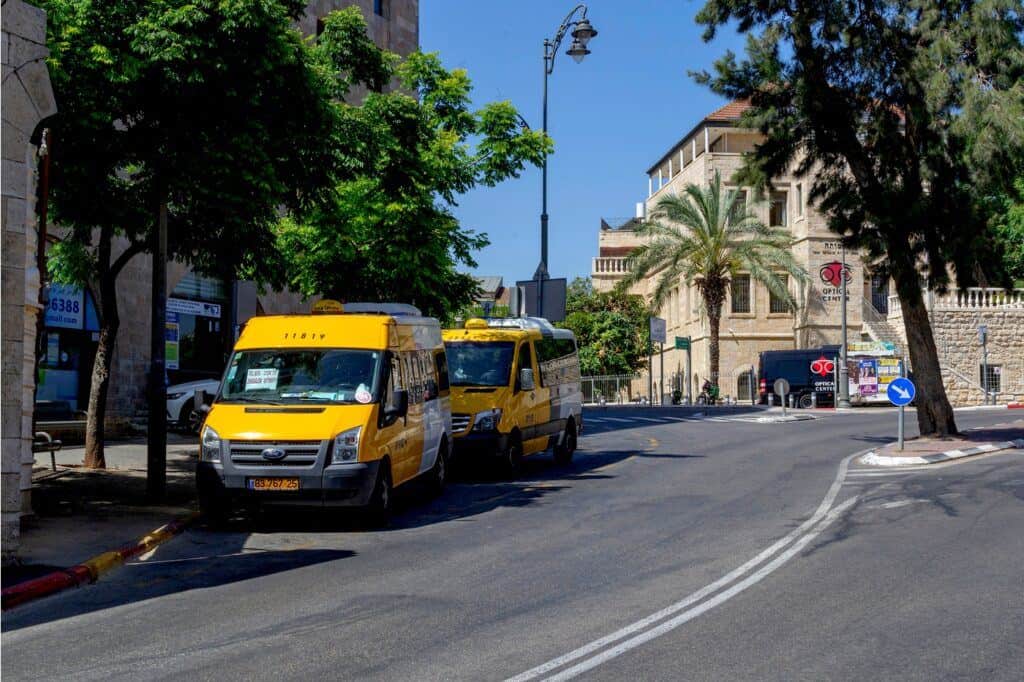
The Cost of Transportation in Israel
Being such a small country, Israel is relatively easy and inexpensive to get around. All major cities are connected by well-maintained road systems and most with railway stations. Distances are so short that flying from one city to another is impractical unless you travel south to Eilat (a 45-minute flight instead of a three-and-a-half-hour drive). However, considering security checks and boarding delays, driving is usually the quicker alternative.
The country has one major airport, Ben Gurion International Airport in Tel Aviv . This airport welcomes daily flights from across the globe and is the main international hub of Israel. Haifa and Eilat also have airports, mainly used for domestic flights.
Since the country is in a current dispute with most of its neighbors, there are no train routes between Israel and other countries. Other than flying, the only other option is to arrive via boat .
Aside from private vessels that can use one of the many marinas along the Mediterranean coastline, there are a couple of cruise liners that make their way into the country regularly. These include the Royal Caribbean International, Silversea, and Celebrity Cruises, which typically dock in Haifa or Ashdod.
Once you’ve arrived in Israel, you’ll be able to get around all the significant cities relatively easily. Tel Aviv is one of the most walkable cities in Israel. If you stay in a central location, you’ll easily be able to walk from one attraction to the other, using the odd taxi or bus to cover bigger distances.
All cities and even most rural parts of the country are serviced by an efficient public transport network . Within Tel Aviv, a one-way journey on a bus costs the equivalent of $1.50.
Intercity bus services are the quickest and often the cheapest way to travel between cities. They frequently depart from Tel Aviv, Haifa, and Jerusalem and offer direct and non-direct routes around the country. The most popular bus companies include Egged, Dan, Afikim, Nateev Express, and Kavim.
To travel on one of these buses, you must purchase an electronic travel card called the Rav Kav, which can be bought for $1.70 at most convenience stores or grocery shops. The best way to plan your route is with Moovit, a reliable app available in many languages!
Another way to get around both in cities and between them is using shared taxi buses known locally as sherut . These mini-busses carry between 10 and 13 people and work on a fixed route basis. Unlike conventional buses, they don’t have specific set stops, and you can often get them to drop you off right at your desired destination. A sherut from Ben Gurion Airport to Jerusalem costs around $17 for one person with luggage.
Intercity trains link most major cities. Tel Aviv has four stations, including a new high-speed train connecting Jerusalem to Ben Gurion International Airport. This train ride takes under an hour and is only around $6 each way. Trains also travel to Akko, Haifa, Beersheva, and Nahariya. Note that trains don’t run on the Jewish holy day of Shabbat (between sunset on Friday and sunset on Saturday).
Traveling with a car can be more trouble than convenient in most Israeli cities, as parking is limited and traffic is heavy. However, if you are planning a road trip, having your own vehicle is a convenient pleasure to explore parts of the country not serviced by transport. Renting a car costs around $200 per week.
Taxis are abundant nationwide, and Ubers are available in big cities. Always remember to confirm prices and use a meter when traveling in a taxi, as taxi scams can be unpleasant, to say the least. Rates vary depending on the time of day you travel, with increased prices between 9 pm and 6 am. During Shabbat or Jewish holidays, you can expect to pay around 25% higher prices than usual.
Common transit routes and their corresponding prices:
- Rough cost of a return flight between Tel Aviv and Eilat – $90 to $220
- Rough cost of renting a car for two weeks in Tel Aviv – $400
- Rough cost of renting a car per day in Tel Aviv – Between $30 and $50 per day
- Rough cost of fuel – $2.5 per liter, depending on fuel consumption
- Rough cost of a high-speed train from Tel Aviv Ben Gurion to Jerusalem – $5 to $6 (one-way)
- Rough cost of a bus from Tel Aviv to Jerusalem – $5 to $6 (one-way)
- Rough cost of a bus from Jerusalem to Haifa – $6 to $10 (one-way)

The Cost of Food in Israel
If there’s one thing Israel is known for aside from its incredible biblical history, it is food. Nestled in the heart of the Middle East, Israel is one of the best places to enjoy authentic Middle Eastern dishes like hummus and shakshuka, two tasty dishes that have been adopted worldwide.
However, while Israel’s cuisine is certainly Middle Eastern in nature, it is made unique by the international influences that have helped to shape it into what you taste today. With a large portion of residents from Eastern Europe, Northern Africa, and even America, these global influences have created a world-class cuisine.
Some of my favorite dishes here include sabich (pita filled with aubergine, boiled eggs, and tahini), Sfeni (a local Moroccan-inspired doughnut), chatzilim/babaganoush (an eggplant salad), and burika (a North African savory and deep fried crepe filled with mashed potato). Let’s not forget about the classic Polish Jewish babka pastry, which is a sweetened cake baked with cinnamon and chocolate.
You’ll find most of the traditional delicacies available in any food market or streetside in the big cities, and street food is undoubtedly the best representation of Israel’s food culture. A short stroll through the bustling streets of Tel Aviv and Jerusalem will quickly reveal the most authentic falafel (deep-fried chickpea balls) stands.
Grocery stores are typically expensive for the quality produce you receive, although more affordable than in the USA. One of the cheapest supermarkets is called Rami Levi. Shufersal, Co-Op Shop, Mega , and Yeish are other grocery chains.
Cost of typical grocery store items:
- 1 liter of milk – $1.70
- 2 lbs of yellow cheese – $14
- 2 lbs of cold cuts or meat – $26
- Mid-range bottle of wine – $11
- A bag of apples – $1
- Head of lettuce – 30c
- Loaf of fresh bread – 50c
Meal breakdown costs
For traditional Israeli breakfast , shakshuka is the clear winner. This tomato sauce-based egg dish is made differently in different parts of the country, using tasty spices and often black olives. A decent portion at a street-side cafe costs around $10 and will keep you fueled for the day ahead.
For lunch , indulge in a juicy shawarma or falafel and pita sandwich filled to the brim with Israeli salad (chopped tomato, cucumber, and onion), hummus, tahini, and grilled aubergine. Don’t miss out on the classic Israeli Jewish salmon bagel, prepared with smoked salmon and cream cheese and topped with capers.
Although you are likely to have tried these dishes before, no one makes them as well as the Israelis. Purchased as a takeout, a healthy portion of lunch could cost you just $8. However, eating lunch at a mid-range sit-down restaurant might set you back around $20, while a three-course meal might cost around $35 per person.
Dinner in Israel is the most expensive meal, and you can expect to pay between $40 and $50 per person to dine at a formal restaurant with multiple courses and drinks. Instead of ordering one meal for yourself, a traditional Israeli meal involves ordering a bunch of small plates for the table to share.
Choose from traditional hummus, tzatziki, tahini, and baba ganoush dipping starters and a range of vegetarian salads like tabbouleh, spiced carrot salad, Israeli couscous salad, and roasted paprika potatoes.
Alcohol is also pretty expensive. A single domestic beer costs between $6 to $8 from a restaurant or bar and as little as $5 if you purchase from a liquor store. A cocktail at a club in Tel Aviv is estimated to cost around $15, while a bottle of wine costs around the same.
If you’re willing to buy produce and cook your own food, you could save some money and spend around $20 daily on food. If you eat out for every meal, expect to pay between $30 and $60 per day for food (depending on where you eat).
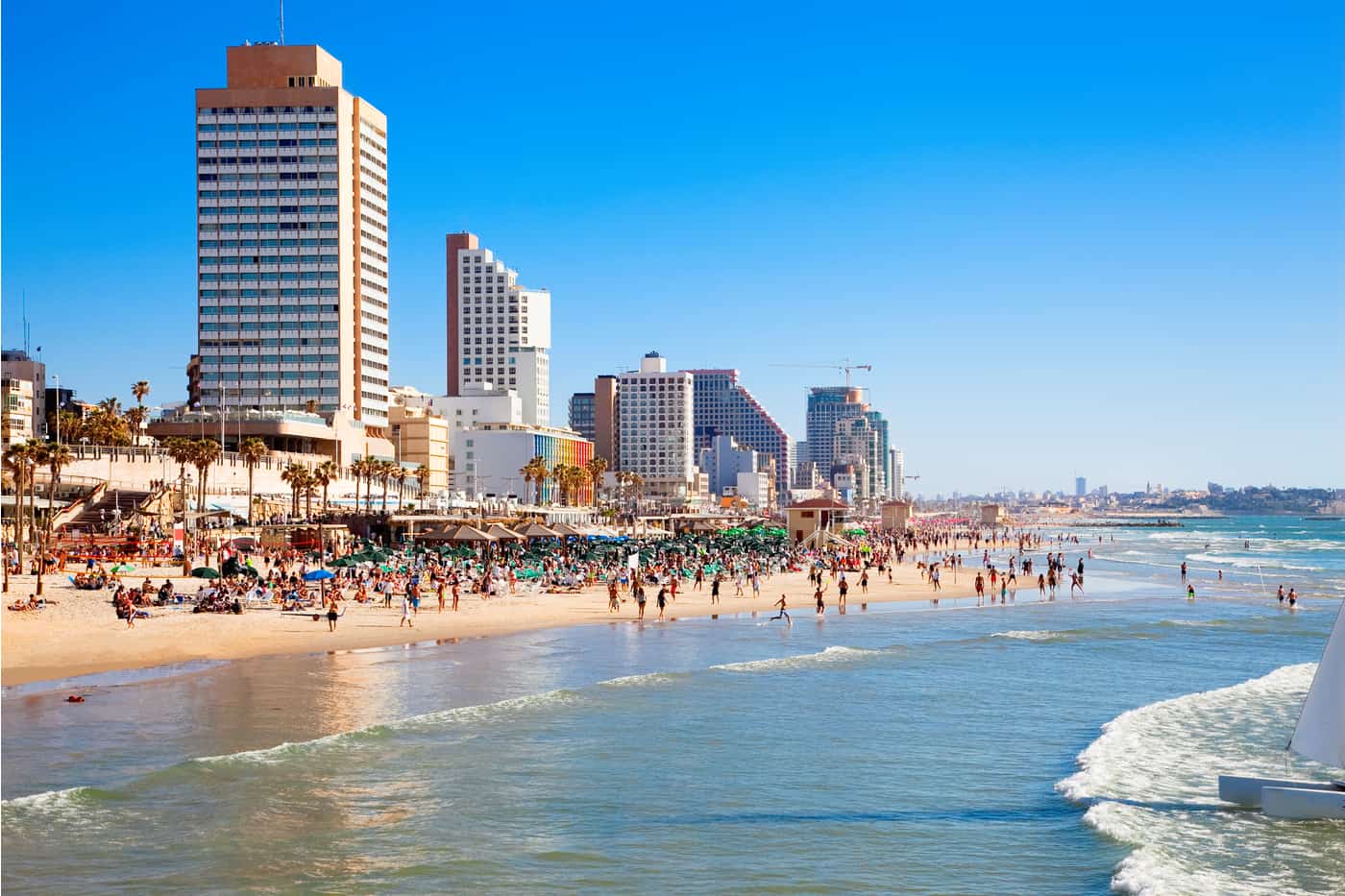
The Cost of Activities in Israel
The country really packs a punch when it comes to activities and adventures. Of course, the cost of activities for your Israel budget depends on what you choose to do, and the time of year you visit.
Generally speaking, entry into most national parks costs between $8 and $10, while most museums charge between $11 and $16 for entrance. There are also many activities that don’t cost a cent, including exploring the historic city of Jerusalem, visiting Yad Vashem Holocaust Museum, and exploring Tel Aviv’s White City.
History has no price, and one of the best activities, walking around the country’s most iconic city and the main attraction, is also free. Without spending a penny, you can explore the Dome of the Rock, the Western Wall, the Mount of Olives, the Church of the Sepulchre, and the Valley of Kidron.
Other free activities include:
- Machane Yehude Market in Jerusalem
- Carmel Shuk in Tel Aviv
- Botanical Gardens of the Hebrew University in Jerusalem
- The Sataf Nature Reserve outside Jerusalem
- The Bauhaus White City in Tel Aviv
- The Independence Trail Walking Tour in Tel Aviv
- Ben Gurion House in Tel Aviv
- The Baha’i Gardens in Haifa
- The Hecht Museum in Haifa
- Hanging Bridges of Nesher Park in Haifa
- The Ralli Museums in Caesarea
That said, there are many guided tours that you can join to indulge in a bit more than meets the eye. This Jerusalem and Bethlehem Guided Day Trip in Israel costs around $150 per person and includes a full-day tour from Tel Aviv.
The most popular activities with tourists usually include visits to religious and biblical sites, including archeological digs, ancient cities and fortresses, and modern museums. But many people also visit for the outdoor adventure and natural beauty.
For an authentic desert experience, slow things down with a Camel Ride followed by an authentic Bedouin Meal in Eilat for just $40. Although these tours can be gimmicky and touristy, they are still relatively authentic and well worth doing at least once in your life.
Eilat is the heart and soul of outdoor adventure in Israel. The town is best known for its incredible snorkeling and dive sites in the Red Sea which is safe to explore with an instructor.
Popular entrance fees:
- The Israel Museum – $15
- Tel Aviv Museum of Art – $15
- ANU Museum of the Jewish People – $15
- Tower of David -$10
- Bauhaus Center Tel Aviv – $17
- Nazareth Village – $14
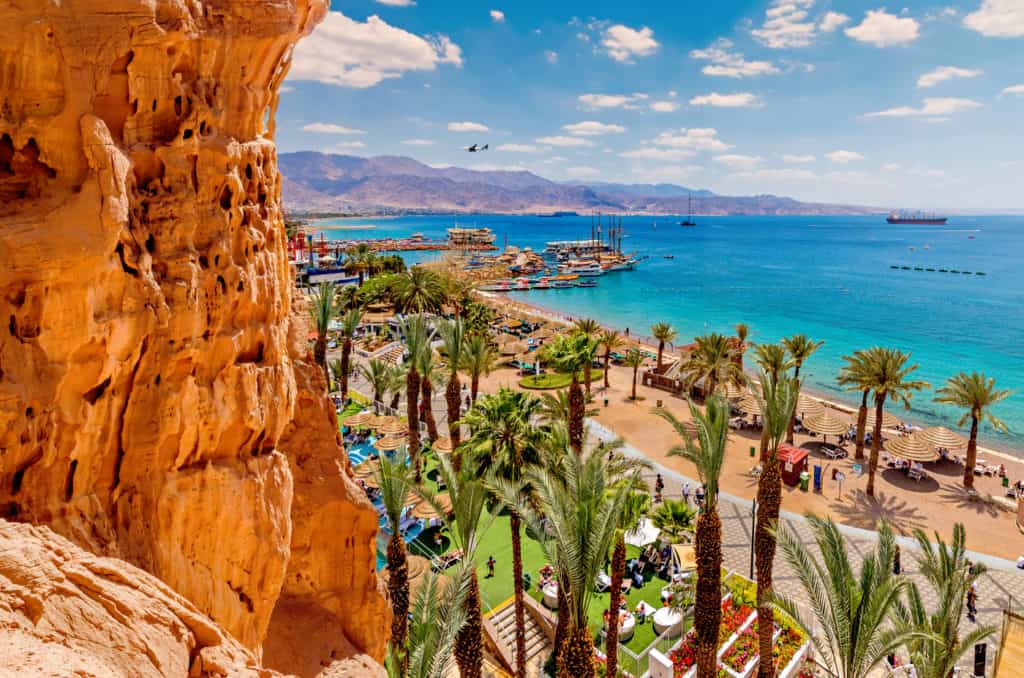
Total Expenses for a Mid-Range Trip in Israel
Even with all these numbers in mind, it’s hard to calculate an exact daily Israel budget. Of course, what you spend will be related to how many activities you partake in, the time of year you visit, the restaurants you indulge in, and the luxury you seek in accommodation.
That said, here is a summary of your total expected expenses for a mid-range trip to Israel:
Accommodation: $200 /day
Transportation: $50 /day
Food: $40 /day
Activities: $30 /day
Total Daily Expenses in Israel: $320
Lauren Juliff
Lauren Juliff is a published author and travel expert who founded Never Ending Footsteps in 2011. She has spent over 12 years travelling the world, sharing in-depth advice from more than 100 countries across six continents. Lauren's travel advice has been featured in publications like the BBC, Wall Street Journal, USA Today, and Cosmopolitan, and her work is read by 200,000 readers each month. Her travel memoir can be found in bookstores across the planet.
Related Posts

The Cost of Travel in Mauritius: My Detailed Budget Breakdown

What’s it Like to Travel in Kuwait? My 2024 Guide

The Cost of Travel in Thailand: My Detailed Budget Breakdown

2023: My Travels in Review

The Cost of Travel in South Korea: My 2024 Budget Breakdown

The Cost of Travel in Peru: A 2023 Budget Breakdown
Leave a reply cancel reply.
Your email address will not be published. Required fields are marked *
Meet Lauren Juliff
Cost of a Trip to Israel & the Cheapest Time to Visit Israel
The average price of a 7-day trip to Israel is $1,990 for a solo traveler, $3,066 for a couple, and $3,209 for a family of 4 . Israel hotels range from $80 to $343 per night with an average of $152, while most vacation rentals will cost $180 to $710 per night for the entire home. Average worldwide flight costs to Israel (from all airports) are between $850 and $1,301 per person for economy flights and $2,669 to $4,085 for first class. Depending on activities, we recommend budgeting $61 to $128 per person per day for transportation and enjoying local restaurants.
See below for average , budget , and luxury trip costs. You can also look up flight costs from your airport for more tailored flight pricing.
The Cheapest Times to Visit Israel
On average, these will be the cheapest dates to fly to Israel and stay in a Israel hotel:
- January 8th to March 4th
- April 23rd to May 20th (except the week of May 7th)
- August 13th to October 14th (except the week of October 1st)
- October 29th to December 9th
The absolute cheapest time to take a vacation in Israel is usually early to mid September .
Average Israel Trip Costs
Average solo traveler.
The average cost for one person to visit Israel for a week is $1,547-$3,037 ($221-$434 per day)
Food, Travel, and Sightseeing : $61 to $128 per day for one person’s daily expenses
Flights : $502 to $1,145 for economy
Lodging : $103 to $137 per night for one 2 or 3-star hotel room
or $136 to $166 per night for a 1-bed vacation rental
Average Couple’s Trip
The average cost for a couple to visit Israel for a week is $2,477-$5,078 ($354-$725 per day)
Food, Travel, and Sightseeing : $122 to $256 per day for two people’s daily expenses
Flights : $1,005 to $2,290 for economy
Average Family Vacation
The average cost for 4 people to visit Israel for a week is $4,948-$9,809 ($707-$1,401 per day)
Food, Travel, and Sightseeing : $244 to $512 per day for four people’s daily expenses
Flights : $2,010 to $4,581 for economy
Lodging : $206 to $274 per night for two 2 or 3-star hotel rooms
or $205 to $249 per night for a 2-bed vacation rental
Traveling Cheap to Israel
How cheap can you make a vacation to Israel? The cheapest trip to Israel is about $161 per person per day for travelers willing to take standby flights, deal with inconvenience, and otherwise limit travel expenses. About 1% of rentals are available in the $0 to $100 range for an entire place, and vacation rentals can be booked for as low as $20 per night. These inexpensive rentals must be booked as early as possible and may not be in the most desirable areas. 1-star hotels are more likely to be available, with rooms starting at around $68.
Even cheaper trips are possible depending on where you live and whether you can drive. Check the cheapest times to fly for more saving ideas.
Budget Solo Traveler
The lowest cost for one person to visit Israel for a week is $1,127-$2,226 ($161-$318 per day)
Food, Travel, and Sightseeing : $31 to $61 per day for one person’s daily expenses
Lodging : $68 to $80 per night for one 1-star hotel room
or $80 to $109 per night for a 1-bed vacation rental
Budget Couple’s Trip
The lowest cost for a couple to visit Israel for a week is $1,840-$3,805 ($263-$544 per day)
Food, Travel, and Sightseeing : $61 to $123 per day for two people’s daily expenses
Budget Family Vacation
The lowest cost for 4 people to visit Israel for a week is $3,597-$7,275 ($514-$1,039 per day)
Food, Travel, and Sightseeing : $123 to $246 per day for four people’s daily expenses
Lodging : $137 to $161 per night for two 1-star hotel rooms
or $121 to $162 per night for a 2-bed vacation rental
Overall it is very difficult to travel to Israel cheaply.
The Cost of a Luxury Israel Trip
There is no true ceiling on the cost of a luxury trip, so our estimates are based on what most people do in Israel.
Luxury Solo Traveler
The high-end price for one person to visit Israel for a week is $3,222-$13,153 ($460-$1,879 per day)
Food, Travel, and Sightseeing : $123 to $259 per day for one person’s daily expenses
Flights : $1,251 to $2,820 for first class
Lodging : $185 to $343 per night for one 4 or 5-star hotel room
or $713 to $1,420 per night for a preferred vacation rental
Luxury Couple’s Trip
The high-end price for a couple to visit Israel for a week is $5,327-$17,779 ($761-$2,540 per day)
Food, Travel, and Sightseeing : $245 to $517 per day for two people’s daily expenses
Flights : $2,502 to $5,640 for first class
Luxury Family Vacation
The high-end price for 4 people to visit Israel for a week is $10,656-$31,322 ($1,522-$4,475 per day)
Food, Travel, and Sightseeing : $491 to $1,034 per day for four people’s daily expenses
Flights : $5,005 to $11,280 for first class
Lodging : $369 to $686 per night for two 4 or 5-star hotel rooms
or $1,073 to $2,134 per night for a preferred vacation rental
Israel Hotel Prices
The cost of staying in Israel is much higher than the average city. On average hotels are less expensive than vacation rentals. Luxury vacation rentals are more expensive in Israel due to very high property costs. The graphs below show how much cost can vary depending on the type of experience you’re looking for.
Israel Lodging Cost by Star Status
The average price for the class of hotel is on the (y) axis. The hotel class (out of 5 stars) is on the (x) axis.
Prices are based on Israel hotel averages and may not reflect current prices. In some cases, we extrapolate prices to estimate costs, and hotels with your desired star rating may not be available.
Vacation Rental Prices
The percent of vacation rentals in the price range is on the left (y) axis. Price range is on the bottom (x) axis.
There are a healthy amount of vacation rentals serving all budgets in Israel.
Flight Costs to Israel
Averaging flights around the world, prices go from a high of $1,301 average in mid December to a low of $850 in early to mid September. Median flight price is $1,076. These prices are based on millions of flights. For Israel our data includes thousands of originating airports, and hundreds of airlines. The area has more variance in price compared with other locations.
Average Flight Cost by Season
Average flight cost by day of week.
The cheapest day to fly in is typically Tuesday, and the cheapest day to fly back is usually Tuesday. Click here to see data for the cost of flights from your airport. In Israel, the difference between the cheapest and the most expensive week is about $451, so you can easily save about 53% simply by using our free flight guides and booking in advance.
Daily Expenses Budget
Daily vacation expenses vary more based on what you’re interested in doing. A fine dining restaurant with drinks around Israel can easily cost $461 per person or more, while a standard nice meal might be about $31 per person. Private tours can cost $922 per day, but self-guided tours to see the outdoor sights can be free. Costs vary wildly, so recommendations are made based on the cost of living and averages we see for this type of vacation.
Other Israel Guides
Travel costs nearby.
- Raananna, Israel
- Ra’ananna, Israel
- Hadera, Israel
- Netanya, Israel
- Petah Tikva, Israel
- Taybeh, State of Palestine
- Caesarea, Israel
- Herzliya, Israel
- Yehud, Israel
- Bene Beraq, Israel
Travel Costs in Popular Places
- Birmingham, the United Kingdom
- Hakuba, Japan
- Meet the Team
- Work with Us
- Czech Republic
- Netherlands
- Switzerland
- Scandinavia
- Philippines
- South Korea
- New Zealand
- South Africa
- Budget Travel
- Work & Travel
- The Broke Backpacker Manifesto
- Travel Resources
- How to Travel on $10/day
Home » Middle East » Israel » Backpacking Guide
Backpacking Israel Travel Guide (BUDGET TIPS • 2024)
Backpacking Israel is unlike any other backpacking experience you will ever have. It’s rewarding, it’s eye-opening, and, at times, it’s even soul-crushing. For every sunset that adorns the eyes, there is another sight that equally boggles the mind and breaks the heart.
Like all the best relationships, travelling Israel is complicated. And you won’t really be able to make sense of your experience until your months outside of it, sitting on some tiny remote island, detoxing the conflicts and reminiscing about eating hummus off her supple naked frame.
Am I still talking about Israel? Who knows.
This is a backpacking travel guide for Israel. It’s got the deetz YOU NEED on how to do Israel on a budget (because, yes, Israel is hella expensive). It’s also got the usual travel guide tidbits: where to stay in Israel and what to do.
However, it’s also an honest travel guide. Here’s the other truth of backpacking in Israel: if you’re paying attention and not just being a run-of-the-mill tourist, this shit will hurt.
Before I visited Israel, other travellers warned me to guard my heart. It is an almost incomprehensibly complex country and – particularly for travellers unused to the rawness of travelling in the Middle-East – it can send you a bit loopy.
But that’s just the nature of Israel. Like all good relationships, basic is boring.
And Israel is anything but basic.
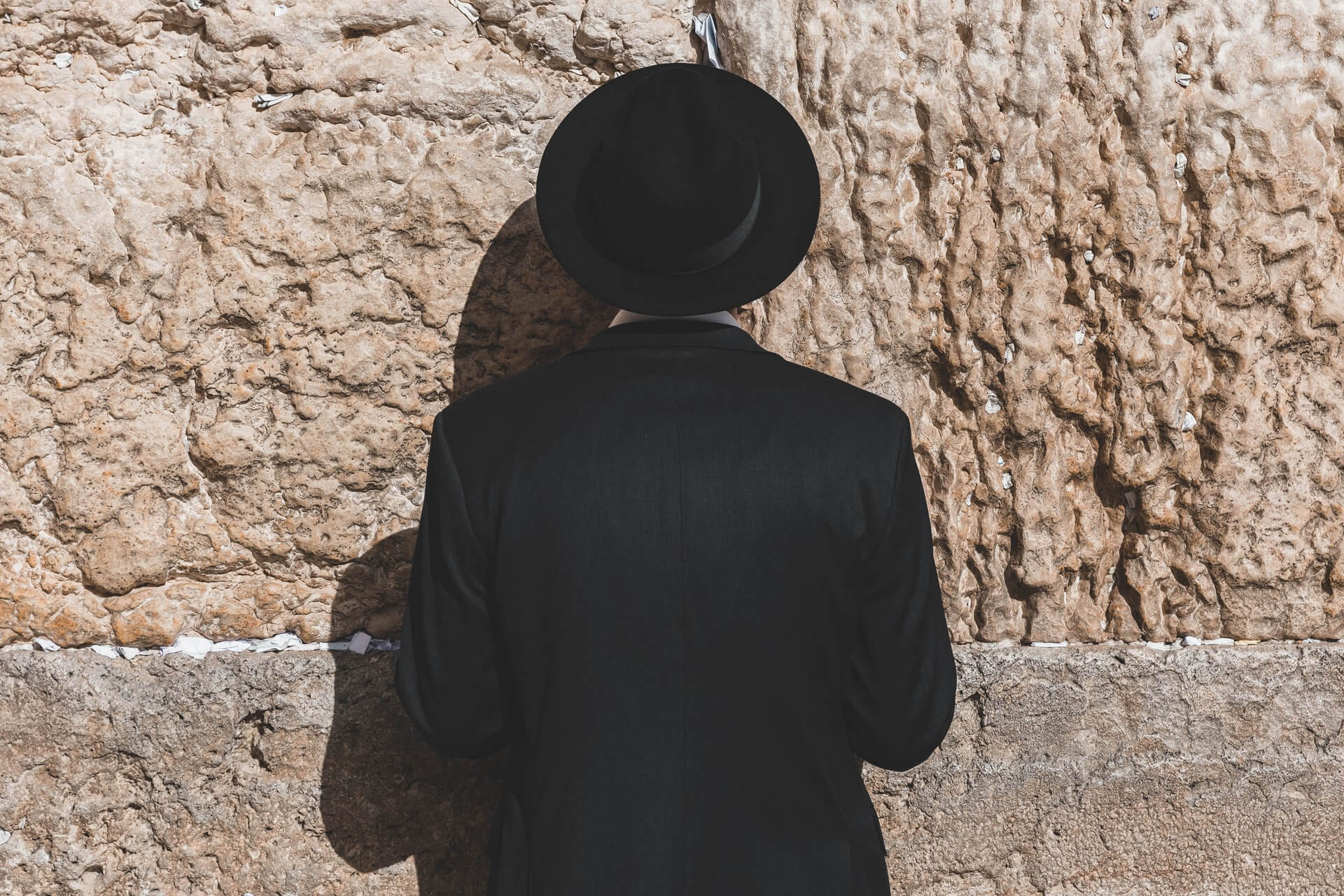
Why Go Backpacking in Israel?
Because, ultimately, complications, conflicts, and craziness aside, Israel is mesmerisingly beautiful. The food is intoxicating, the landscapes are breathtaking, and the people are incredibly warm and hospitable in their own unique way.
And, really, there are so many things to do in Israel! Whether you want to party like a wildcat amongst Tel Aviv’s clubs and bars, get all nerdy up in Israel’s countless biblical sites, or simply hike the Martian-like terrain, Israel always provides. Plus, the other kicker – Israel is crazy small!
Distances between Israel’s numerous regions and destinations are short and generally very well connected. The trains and buses (on the Israeli side of the border) are comfy and quick. Palestine, however, is another story, but we’ll get to that.
No matter where you stay in Israel , you can still get around the country easily. And ultimately, the draw of Israel is that there IS a place for every kind of traveller.
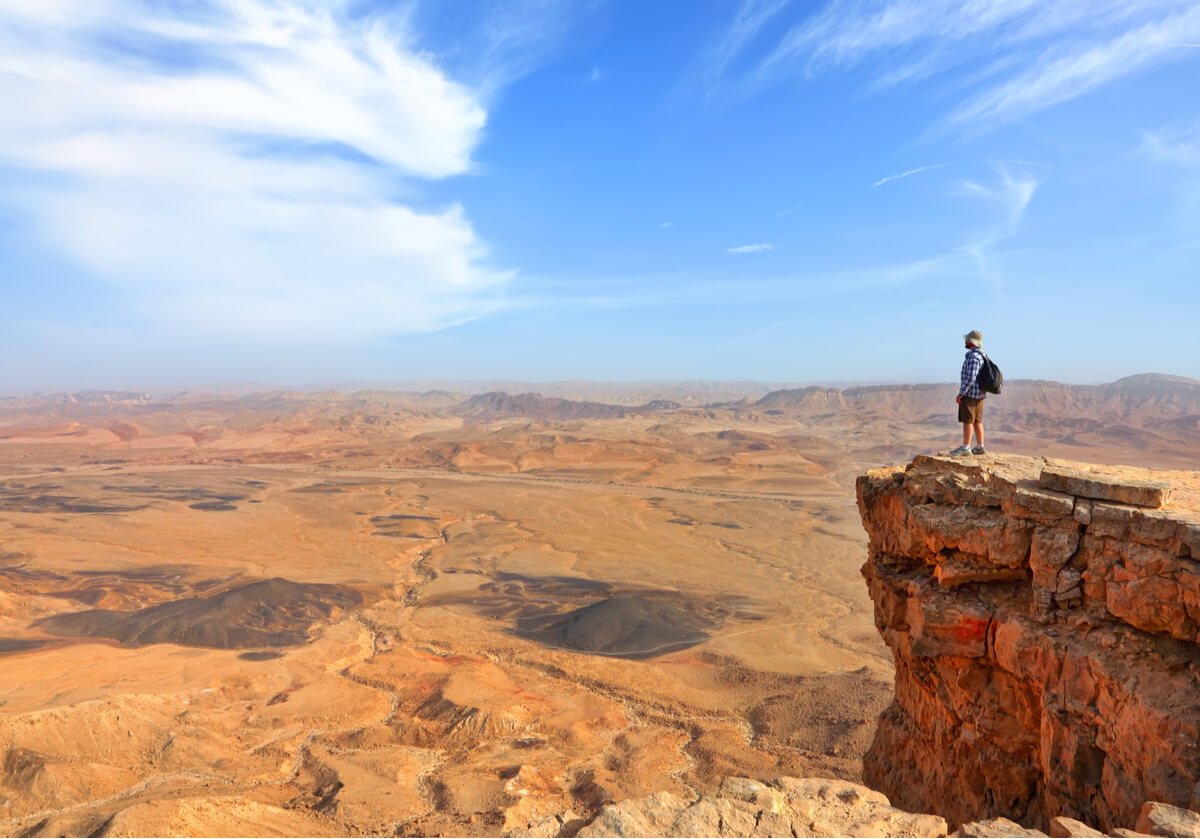
Everything and anything a backpacker might be seeking is only ever around the next corner in Israel. Meanwhile, volunteering, hitchhiking, and the other less touristic ways to travel are easily accessible all over the country.
And, of course, for the backpackers in Israel who really like to push the envelope. Those that really like to learn and open their eyes to the reality of the world through their travels… Well, those people can visit Palestine.
Best Travel Itineraries for Backpacking Israel
Places to visit in israel, top things to do in israel, backpacker accommodation in israel, israel backpacking costs, best time to travel to israel, staying safe in israel, how to get into israel, how to get around israel, working in israel, what to eat in israel, israeli culture, final advice before visiting israel.
Looking for a backpacking route through Israel?
Whether you have a few weeks or a few months, I have assembled several short travel itineraries for Israel to highlight the must-sees of the country. The backpacking routes can easily be combined too, given how small Israel is.
Backpacking Israel 10-Day Itinerary #1: The Northern Hills
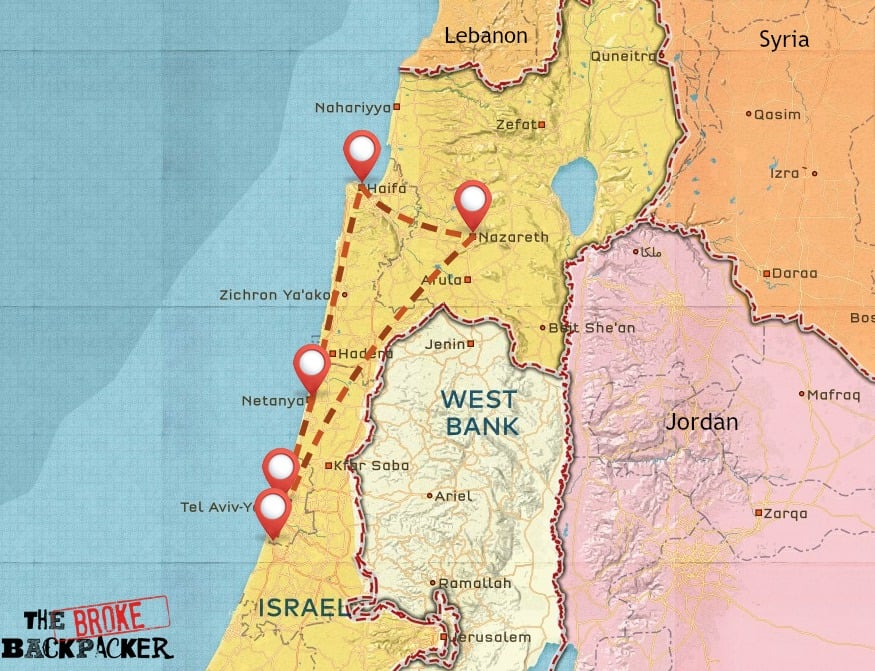
Route: Tel Aviv > Netanya > Haifa > Acre > Nazareth
This is a short itinerary for touring the north of Israel. Book into a cool place to stay in Tel Aviv before jetting off for a much different vibe in the quieter cities of Netanya , Haifa , and Nazareth .
There are bonus points for making your way north into the Golan Heights region ! It’ll be a tight squeeze if you’re doing Israel on a 10-day itinerary, but it’s well worth the trip. It’s a much lusher side of the country.
Highlights:
- Partying until dawn in Tel Aviv.
- Mediterranean sunsets from the west coast.
- Visiting the Baha’i Gardens in Haifa.
- Patting kitties amongst the ancient architecture of Nazareth’s Old City.
Backpacking Israel 2-Week Itinerary #2: The Southern Desert
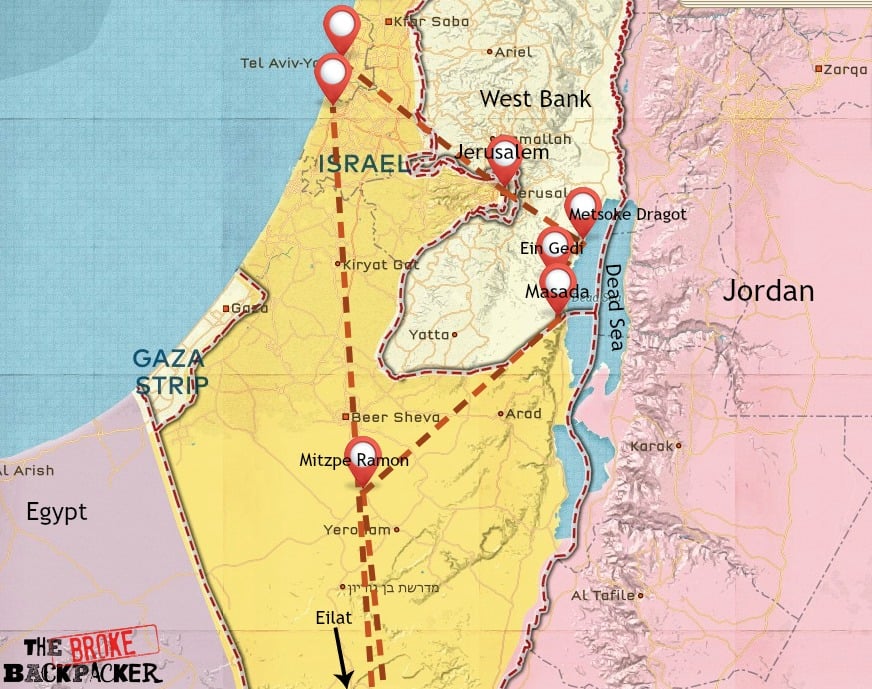
Route: Tel Aviv > Jerusalem > The Dead Sea (Metsoke Dragot) > Ein Gedi > Masada > Mitzpe Ramon > Eilat
This itinerary for Israel highlights the quintessential backpacking experience. Elements of Israel’s archaic history mix with its stunning natural phenomena and, in true Israeli fashion, an abundance of tasty joints and tastier sunsets.
Romping around Tel Aviv to staying in Jerusalem is a massive cultural swing, but after that, it’s all beautiful landscapes! Once you reach Eilat , I’d recommend using it as a base to explore the stunning surrounding area, as Eilat itself is… well… kinda trash, to be honest.
- People-watching the Haredi Jews in Jerusalem.
- Camping by the Dead Sea for dawn.
- Sunsets and smoke over the Makhtesh Ramon (crater) at Mitzpe Ramon.
- Visiting the Sinai region in Egypt from Eilat (if there’s time).
Backpacking Israel 7-Day Itinerary #3: Backpacking Palestine
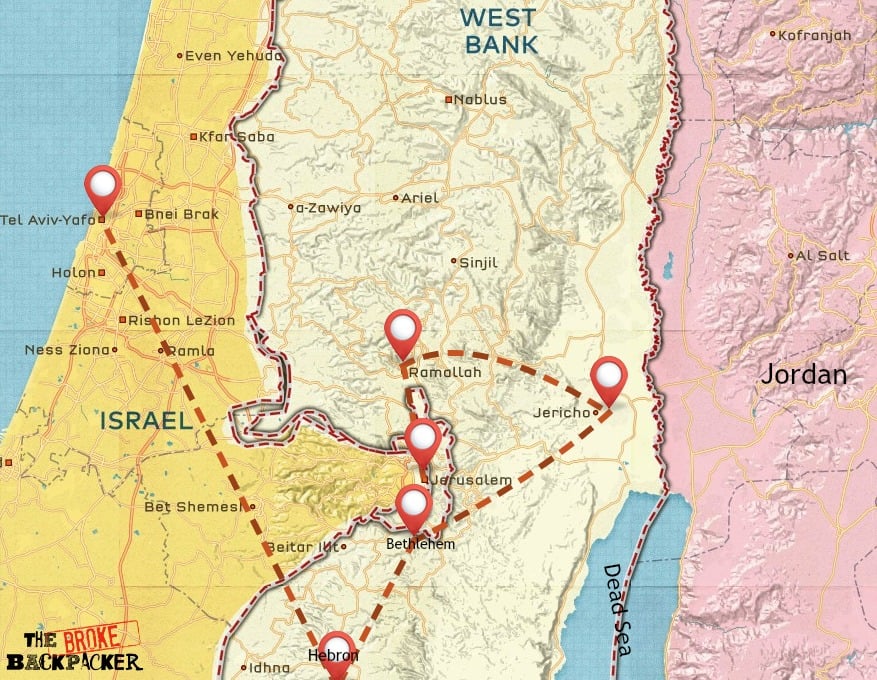
Route: Tel Aviv > Jerusalem > Ramallah > Nablus > Jericho > Bethlehem > Hebron
Some may suggest that a travel guide for Israel shouldn’t include Palestine. However, if you’re one of those people, then this travel guide is not for you!
The Israeli-Palestinian conflict is, for better or worse, an integral part of the experience of backpacking around Israel. Regardless of politics, travel is about the celebration of diversity.
We’ll delve further into the topic later in the guide, but for now, let’s talk about travelling Palestine AKA the Palestinian Territories AKA the West Bank. From Tel Aviv , head to Jerusalem as that’s the best access point into the West Bank.
A visit to Ramallah is a good jumping-off point fo Palestine. A 7-day itinerary is squishy, but travel to Nablus and Jericho afterwards if you can – Nablus is one of the more chill Palestinian cities.
After that, fortify your heart because you’re going to Bethlehem and Hebron . If ever there was a place where the impact of the conflict will flatten you, it’s there.
- A dip in the Turkish bathhouses in Nablus.
- Enjoying Arabic coffee and desserts pretty much anywhere.
- Surveying the wall of Bethlehem .
- Having your head split apart (metaphorically) like a coconut in Hebron.
Now on to the must-sees and dos of the Holy Land! No matter what your reason for travelling to Israel is, there are simply some beautiful must-visit places that aren’t to be missed!
Sunsets, shwarma, and shaloms: the backpacking Israel life.
Backpacking Tel Aviv
Unless you are border-hopping from a neighbouring country, your adventure in Israel will begin in Tel Aviv. Tel Aviv is Israel’s second-largest city and very much the Yang to Jerusalem’s Yin. Much like the Ultra-Orthodox Jews congregate in Jerusalem, so do the secular Israelis in Tel Aviv AKA ‘The White City’ (aka the Gay Capital of the Middle East).
Blessed by a stunning coastline and always-happening nightlife scene, Tel Aviv is a fun-loving and safe city that never seems to sleep (except maybe on Shabbat). Drugs and clubs, Tinder and Grindr, dyed hair and skinny jeans – that’s the Tel Aviv you’ve heard so much about!
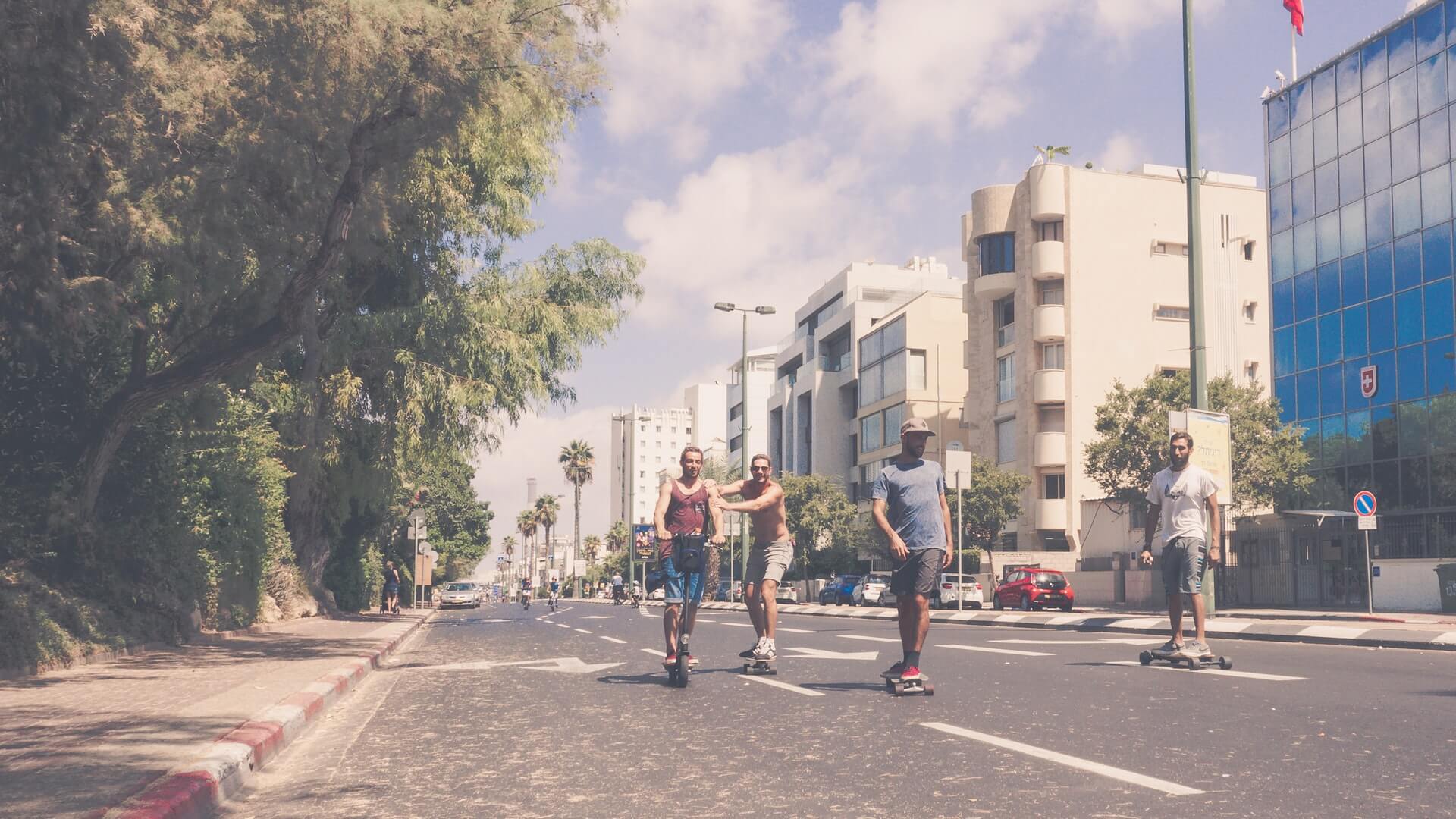
Truthfully, it wasn’t much my vibe. There’s an overarching level of pretence and materialism that accompanies the opulent espresso-soaked Tel Avivian lifestyle, and outside of the dodgier neighbourhoods, you won’t find too many of my beloved feral-types. But between the pumping nightlife, hordes of wild-spirited Israelis, and its rather notorious reputation for being an international hub of hedonism, most travellers visiting Israel will have an absolute ball in Tel Aviv.
There is a truly endless list of cool things to do in Tel Aviv . You can easily spend a few days backpacking around Tel Aviv soaking up its highlights or just letting loose for a few nights.
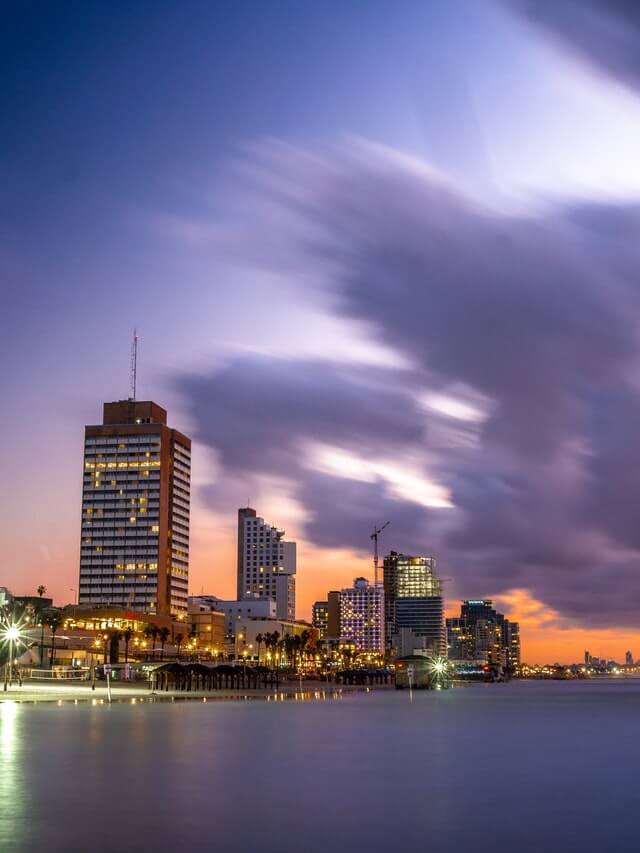
The beaches around the city are admittedly gorgeous . Rent a bike (Lime rent-a-scooters are everywhere in Tel Aviv) and go catch an insane Mediterranean sunset with a cold brew and hot zoot. Jaffa Beach is gorgeous, however, the beaches north or south outside of the centre sprawl are much quieter.
Or to escape the parties, visit the Old City of Jaffa – the old area of Tel Aviv filled with historic architecture and marketplaces brimming with endless delights for the senses. It’s probably the best place to visit in Tel Aviv (outside of the 6 shekel falafel place anyway; Falafel Razon – look it up!).
Ultimately, Tel Aviv is a massively popular destination in Israel and for good reason. Except arguably for Eilat, you won’t find the Tel Avivian vibe anywhere else in Israel except for Tel Aviv and in no way is the city representative of the whole. It’s safe to say that if you visited Israel and only stayed in Tel Aviv, then you didn’t really travel Israel…
But you probably got high!
- Tel Aviv’s Best Backpacker Hostels
- Incredible Airbnb Apartments in Tel Aviv
Backpacking Jerusalem
And now we’re jumping to the complete opposite end of the spectrum! Hardly even an hour’s drive from Tel Aviv, visiting Jerusalem is like ending that drive with a spectacular head-on collision. Jerusalem is a planet in of itself and a cultural shock to the system is a near-guarantee.
Possibly no city in the world stirs up emotion in the way that Jerusalem does. During its long history, Jerusalem has been destroyed at least twice, besieged 23 times, attacked 52 times, and captured (and recaptured) 44 times. You can’t have that much blood spilled on your streets without leaving something more ephemeral behind.
Jerusalem is a striking and, often, bewildering juxtaposition of ancient and modern life; sometimes, it co-exists, while at other times, it clashes. Ancient neighbourhoods of limestone architecture meet Jerusalem’s bustling city centre marked by slick eateries and even slicker public transport. From the American communities to the French quarters, Arabic hubs, and, of course, the Ultra-Orthodox neighbourhoods, Jerusalem is a trip in every sense of the word.
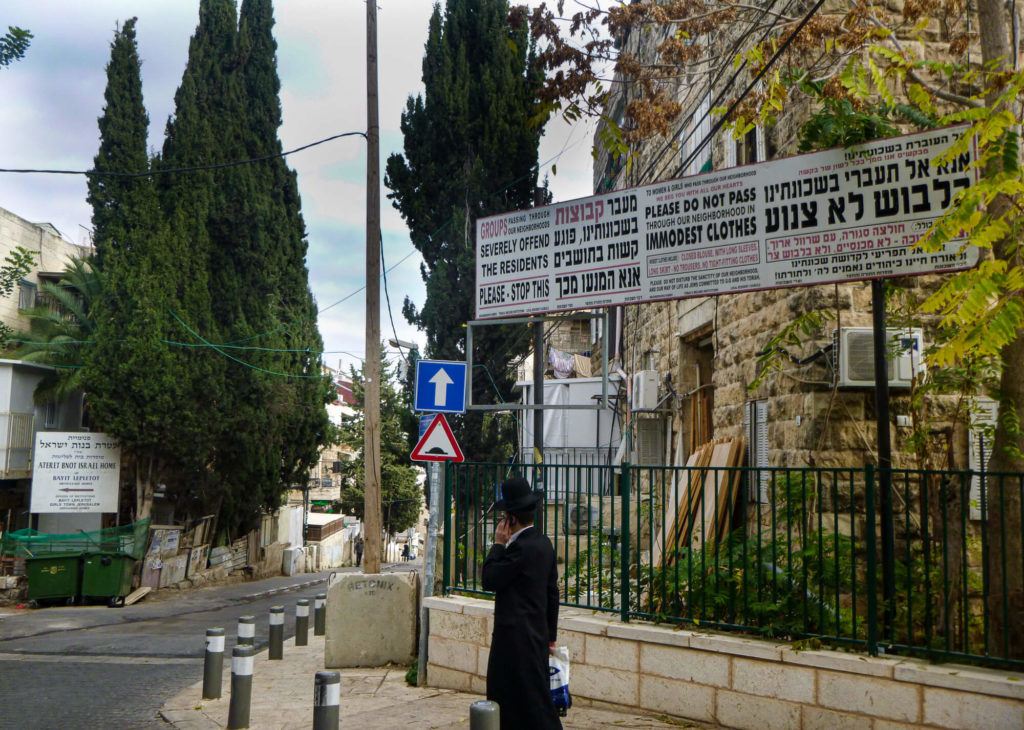
Despite its reputation as the ‘Holy City’ , modern Jerusalem does cut loose with its own unique vibe of nightlife and multitude of activities to keep backpackers entertained. There’s no shortage of social hostels in Jerusalem , craft breweries, and delectable street eats to accompany the history and old-world goodness.
The Mahane Yehuda Market , often referred to as “The Shuk” , is the top place to go in Jerusalem for a feed. It’s a twisting shantytown of vendors peddling spices, souvenirs, and all manner of delicious cuisines. When night falls, the markets truly come alive; Ultra-Orthodox trawl the crowds for loose change, buskers perform for theirs, and the whole energy surges with electricity.
Or if you prefer a more placid sundowner, climb the Mount of Olives over in East Jerusalem for absolutely killer views. When the sun sets and the streaks of orange and red light up the primeval stones of Jerusalem’s cityscape, that’s when the city truly feels hallowed.
Backpacking the Old City of Jerusalem
As if the sheer complexity of Jerusalem wasn’t enough, then you have its inner sanctum. There is quite possibly no place on earth brimming with as much spiritual significance for so many religions as the Old City of Jerusalem.
I feel it can go one of two ways: some people will really vibe with the Old City’s historic sites and attractions of deep cultural significance. History buffs and bible bashers will love it for the obvious reasons.
However, I personally (and other travellers I’ve spoken to) found it rather overwhelming. It’s a bustling labyrinth of divisive cultural attitudes, literal hordes of tourists, and truly savage touts to rival anything that India can throw at you – a place full of religion and void of spirit.
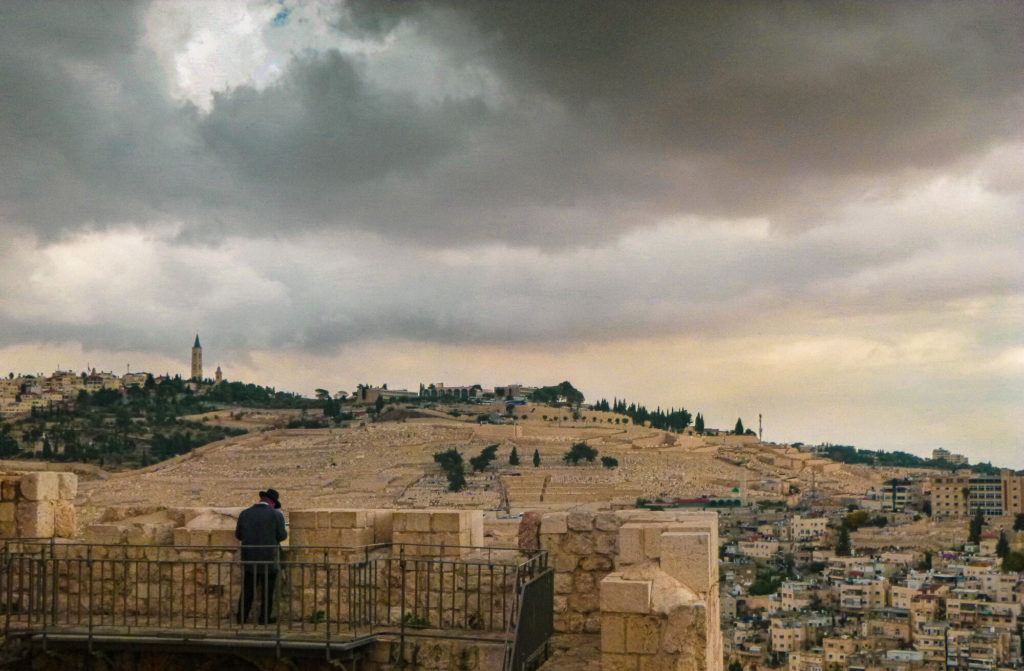
Still, the Old City is a constant intertwinement of a breathing cultural landscape. It’s a chance to see a truly unique place in both Israel AND the world as a whole. Stepping through the Damascus or Jaffa Gate already feels like a portal into another world.
A visit to the Western Wall – the holiest site in the Jewish faith where Jews are permitted to pray – is very intriguing. Expects throngs of crowds as both Jews on-pilgrimage and inquisitive tourists are permitted to approach the wall, however, be respectful if doing so. Dress modestly and respect the segregated gender areas.
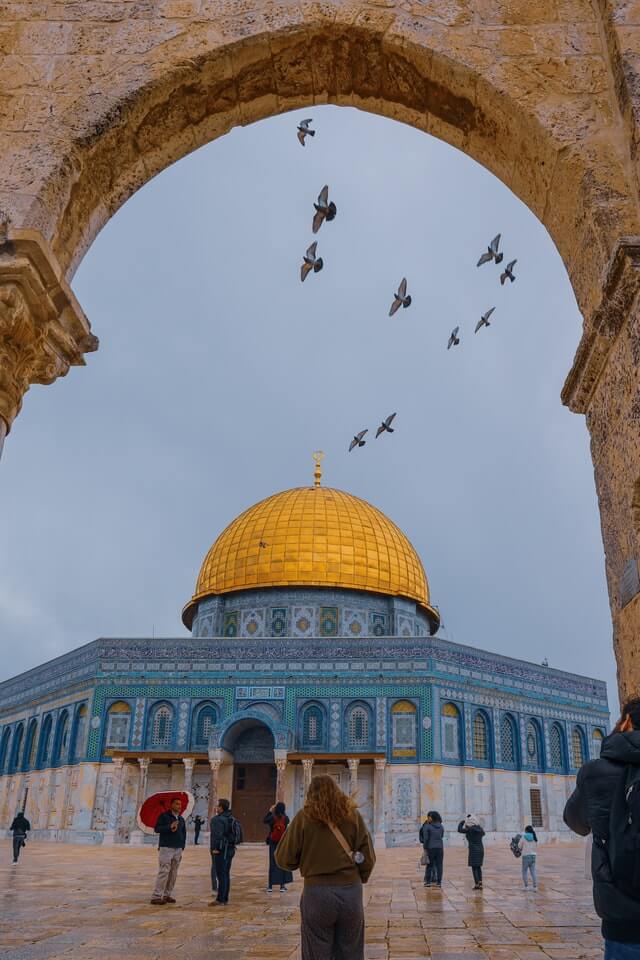
The same rules apply for visiting the Temple Mount . The Temple Mount, or the Haram Esh-Sharif in Arabic, is widely considered the third-holiest site for Sunni Muslims across the world. Inside the Dome of the Rock (the big-ass gold-topped building) is the Foundation Stone where it is believed that God created the world and the first man, Adam.
The mythos of this area’s significance for the Abrahamic religions is crazy interesting and shows just a sliver of the infinite complexity of Jerusalem. Ultimately, there are a lof beautiful things to see in Jerusalem.
However, there’s a reason people lose their minds in Jerusalem : it’s a sharp energy. Usually, I’m not all up in the energetic hippy tosh, but Jerusalem is an exception. Those who are sensitive to these things will feel it.
As my friend said to me after I’d spent a week-and-a-half exploring Jerusalem and having my brain contorted in all directions-
“I’m sorry – I should have warned you. Jerusalem is a very hard city to be in.”
Visiting the Temple Mount
If you’re Muslim, never mind – it’s easy! For everyone else, the Temple Mount’s visiting hours (Sundays to Thursdays) must be respected.
- Winter: 7:30 A.M. – 10:30 A.M. and 12:30 P.M. – 1:30 P.M.
- Summer: 8:30 A.M. – 11:30 A.M. and 1:30 P.M. – 2:30 P.M.
There’s no entry fee to the Temple Mount, however, it packs out hard. Arrive early .
Backpacking Nazareth
Nazareth is the third place I visited in Israel. I delayed my visit until after travelling to Tel Aviv and Jerusalem as I was told by locals that “There’s not much in Nazareth” . I regretted that decision almost immediately after stepping off the bus.
Tel Aviv and Jerusalem were not relaxing in the slightest. The experience of backpacking around Tel Aviv was a pretentious and overcrowded city built on an unnecessarily luxurious lifestyle. Visiting Jerusalem was a cultural TKO on my poor brain still trying to decipher the intricacy of Israel.
Meanwhile, Nazareth is a quiet and pretty city where strangers nod and smile at each other in the street. And it’s filled with cats! I was home.
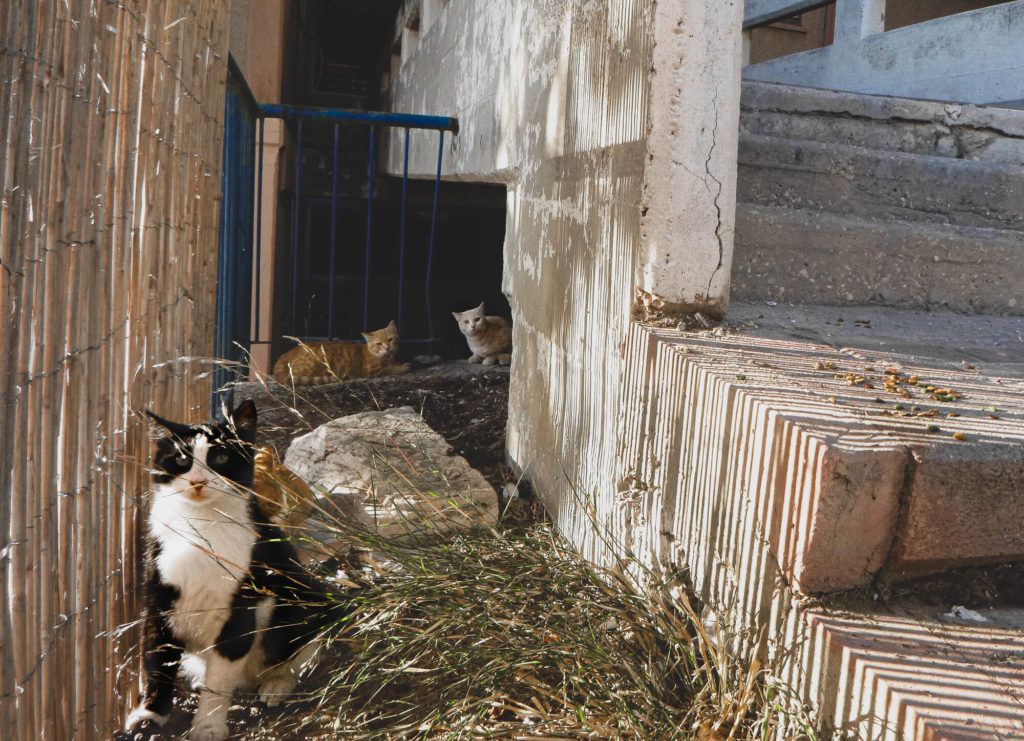
Nazareth is a very famous place to go in Israel, however, it’s more with the Jesus-y tourists. Probably, because it’s where Jesus lived. You’ll still find some backpackers in Nazareth, however, they tend to shoot through on a quick itinerary touring Israel’s major destinations.
It’s also colloquially referred to as the “Arab Capital of Israel” given it’s the largest Arab city in Israel. Both Arab Muslims and Christians divide the demographics and there is a noticeable difference in the vibe of the people you meet. You can expect your handshakes to be much more drawn out.
But you don’t have to be religious to appreciate all that Nazareth has to offer. Stay in the Old City of Nazareth – 100% no-questions-asked. The architecture is beautifully calming and the streets are so narrow that it’s almost entirely limited to foot traffic.
There are some religious tourist attractions in Nazareth, but personally, I just enjoyed soaking up the tranquil vibes. Head to Abu Ashraf for what is quite possibly the best knaffeh (an Arabic dessert) in all of Israel. Take some photos, pat some street cats, and practice some Arabic – the slow traveller’s life .
Once you feel like you’ve gotten your fill of Nazareth, take a day trip into the surrounding countryside for a mad hike. The hills around the city are pretty damn beautiful as well as as a potential stomping ground for the Messiah. Mount Tabor nearby is believed to be the location of the Transfiguration of Jesus; regardless, it’s just a dope-ass looking mountain!

Oh, and avoid visiting Nazareth on Christian holidays (like Christmas or Easter). Unless you’re there for the Jesus-y reasons, it’s just not worth the crowds in the slightest.
Backpacking Haifa
We’ve had a Jewish city, an Arab city, and a ridiculously contested city. So how about a harmonious city? Yup – Israel has that too!
Israel’s third-largest city, Haifa is built on the slopes of Mount Carmel and tapers down to meet the Mediterranean Sea. The views and sunsets from Haifa are always tantalising (as are your cheap eats from HaZkenim Falafel ).
Interestingly, it also stands as Israel’s most demographically mixed city. Israeli Jews, Arab Christians, Muslims, and even a smattering of Druze and those of the Bahá’í Faith all live here in relative harmony. There is some tension, but comparatively to everywhere else, Haifa is regarded as one of the most peaceful cities in Israel.
Haifa’s most popular point of interest is the Bahá’í World Centre and the accompanying (and frankly exquisite) gardens. The combination of marble features and gold trimmings framing the finely-manicured garden all sloping down to the Mediterranean is a beautiful piece of sightseeing.
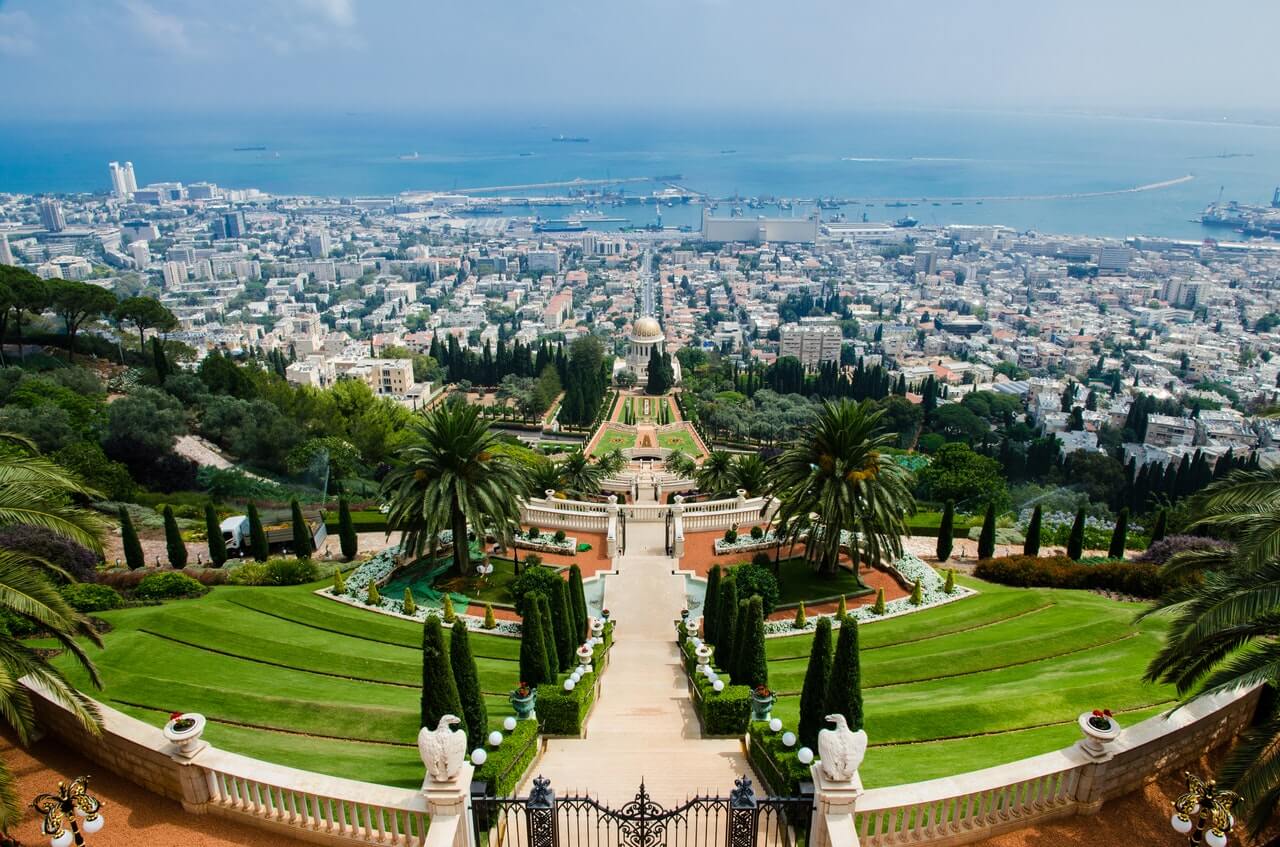
I’m also a fan of Haifa’s beaches. They’re much quieter than Tel Aviv’s while being no less beautiful and fun for a stroll.
Or, for ma homeboy hikers, Mount Carmel National Park is easily accessed from Haifa. Israel’s largest national park , Mount Carmel National Park extends over most of the Carmel mountain range and is chock-a-block full of sweet walking and bicycle trails!
If you are travelling to Haifa, don’t make the mistake of skipping over Acre (Akko) either. Acre is a rad little town just a stone’s throw north of Haifa.
It’s also got a mixed population, some surprisingly intact Crusade-era architecture, and Acre’s own Old City markets complete Arab pastries, coffee, and tobacco… i.e. breakfast! It’s like a 30-minute train ride from Haifa and the result is some sweet historical throwbacks, inquisitve art galleries, and mean-ass street food !
Backpacking the Golan Heights
Much as Tel Aviv and Jerusalem play counter to each other, so too does Israel’s northern and southern areas. Standing in contrast to the southern expanse of the Negev Desert, the Golan Heights is a verdant and hilly landscape abundant with greenery.
Occupied and annexed from Syria in the Six-Day War, the Golan is internationally recognised as illegally obtained territory by Israel (Trump notwithstanding) . A number of Jewish settlements have taken root in the area, however, there are still people of Syrian descent living in the Golan too, particularly Syrian-Druze.
Irrespective of politics, the Golan is astounding . In spring, the wildflowers bloom into life and create lushly painted landscapes of radiant colour. And in winter, it can even snow!
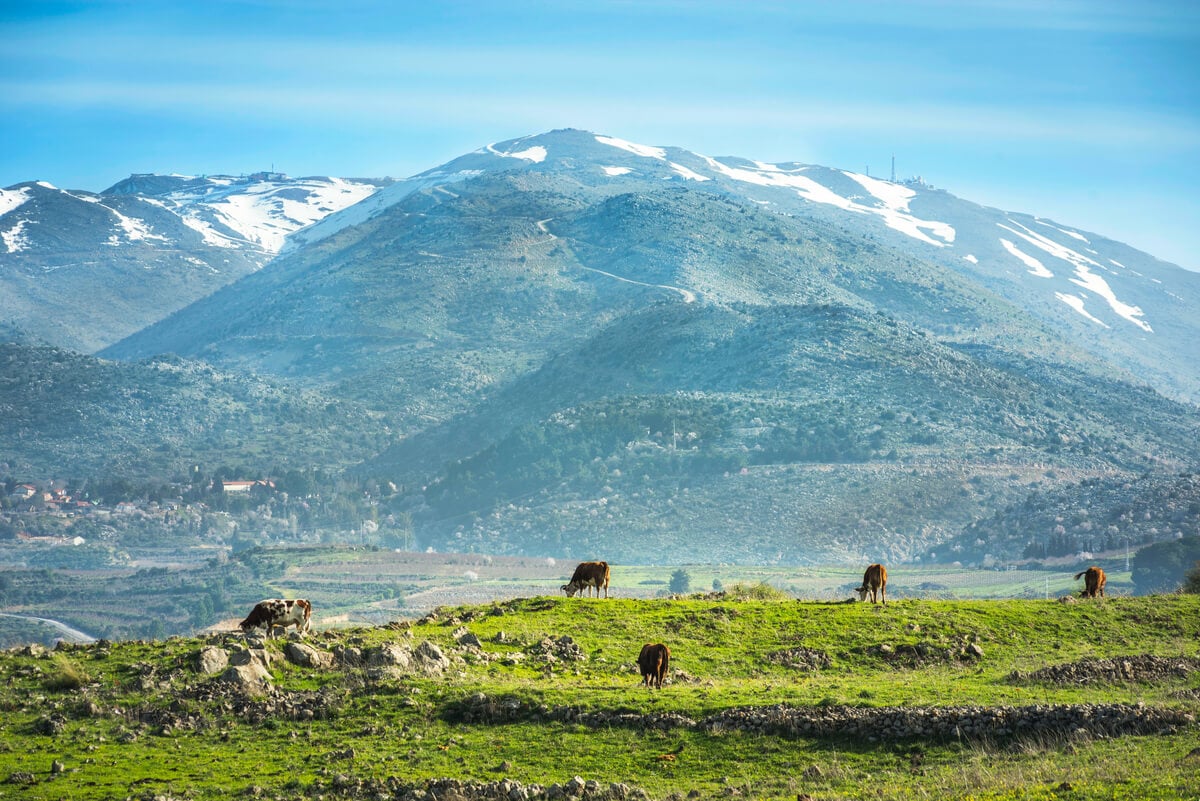
Pack your hiking boots , because the Golan Heights is chock full of hiking opportunities! With weaving trails through the hilly pastures and tucked away waterfall oases, there are a lot of cool places to explore in the Golan (just watch out for landmines – legit). Nahal Jilabun is a particularly choice day hike.
For where to stay in the Golan, I’d recommend either Odem or Madjal Shams . Odem is a Jewish moshav settlement in the north of the Golan. It’s crazy pretty and also has a habit of drawing in some of the more kooky backpackers exploring Israel (courtesy of the rather excellent hostel there).
Madjal Shams, however, is a Druze town sitting in the foothills of Mount Hermon. Despite being annexed more than 50 years ago, the people have maintained their cultural heritage, so the vibe is a bit different. It also gets bloody cold!
Oh, and there’s a ski resort on Mount Hermon ! How you feel about skiing on an occupied mountain in a ludicrously expensive country with rather mediocre snowfall is up to you, but at least the option’s there!
Backpacking the Dead Sea
When I was a kid, I dreamt of visiting the Dead Sea – the sea so salty that gravity loses its meaning. It’s one of the first adventures I embarked on at the start of my backpacking trip to Israel, and what a goddamn adventure it was! What’s a lifelong dream for a boy from Oz is just a regular day at the beach for Israelis!
To be fair, my friend took me to Kalia Beach which is essentially a tourist beach on the northern end of the Dead Sea (and very close to Jerusalem). You pay get to get in – around $17 dollars (yeesh) – and you’re rewarded with the full shebang.
A day at the Dead Sea means beach bars, souvenir shopping, Israelis flaunting their perfectly-sculpted bronzed beach bods, and even a spot of frisbee! (I hit a 7-foot obese Russian man in the face who then proceeded to threaten a violent end upon me in a language I didn’t understand).
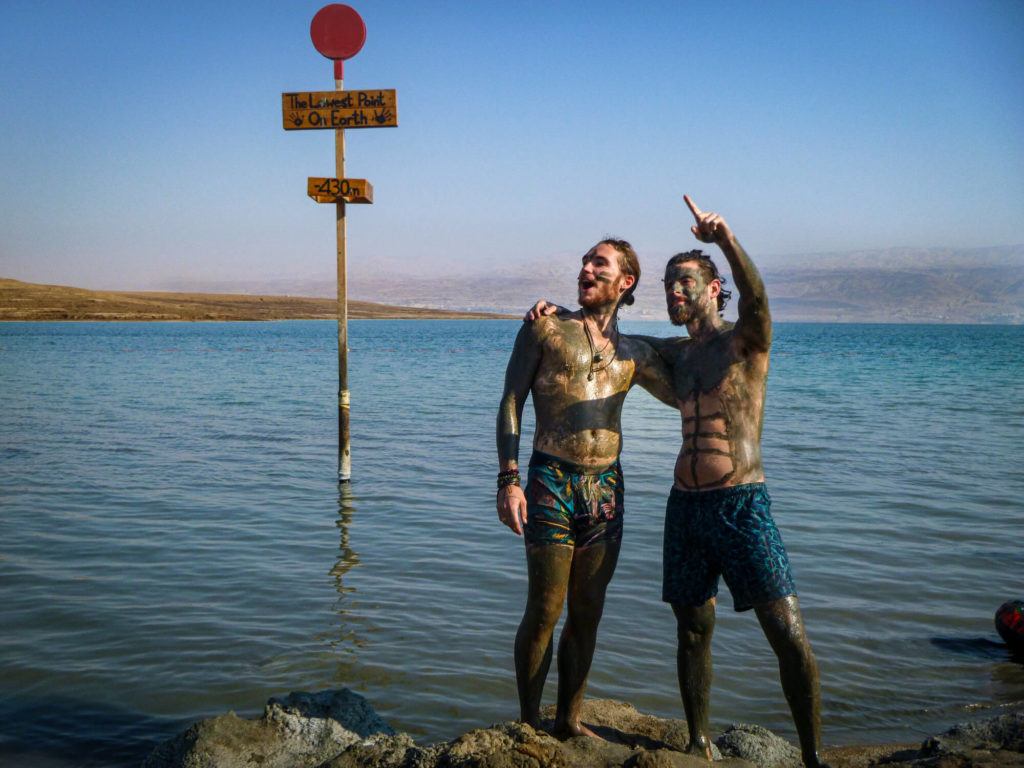
For the true Dead Sea experience, you’ll want to seek elsewhere: it’s a big region. There isn’t much civilisation around owing to the barrenness of the area, so finding a place to camp is super possible!
I suggest packing some camping gear and going to a little nowhere spot on the map called Metsoke Dragot . We were told by the locals, “Go camp out there! That is where all the hippies are.”

Wherever you do camp though, make sure to look out for sinkholes. And take plenty of water too – both drinking water and for rinsing off post-dip. By the way, that water will burn any open wounds like a mofo!
Camping is one of the best ways to visit the Dead Sea and sincerely indulge in its desolate reverence.
The emptiness of the surrounding desert and the solitude of the Jordanian mountains on the opposite bank result in a destination of quiet reflection (something I found almost impossible to do on Israel’s well-trod tourist trail).
The dinky-ass photo-ops of you reading a book while floating in the water is cool and all, but the actual feeling of weightlessness as it stills the mind under the dawn light is what makes this such a truly unique place to visit in Israel (and Jordan but shhh ).
Backpacking Ein Gedi
If all that salty water is getting to you, your cuts, or your suffering eyeballs, then perhaps a freshwater dip is in order! All over Israel, you’ll find plenty of ‘eins’ (springs), but the nature reserve at Ein Gedi (near the Dead Sea) is one truly special place among them.
Unfortunately, Ein Gedi is also stupidly popular. Avoiding weekends (remembering that means Fridays and Saturdays in Israel) is a must. Even then, you’re going to have to put it a bit more effort to escape the crowds.
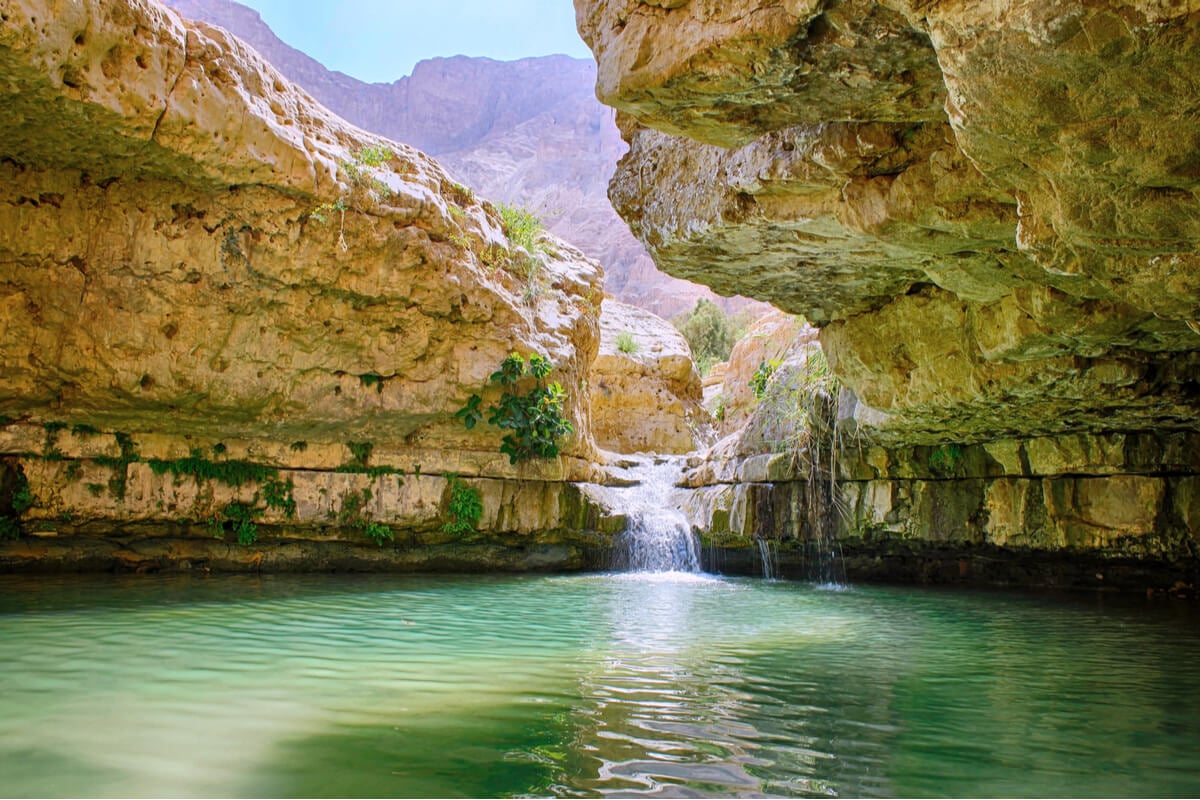
Hike up the track towards Dodim Cave . After roughly an 1 hour of hiking, you’re suddenly going to find the trail a lot quieter! Before long, you’ll be surrounded by pristine waterfalls and vibrant pools of pure water calling for some overheated backpacker to jump in.
The entry fee for Ein Gedi Nature Reserve is about $8.50 . Camping isn’t allowed within the reserve, however, you could possibly pop a sneaky if you’re quiet (and leave no trace ). Either that or just book some nearby accommodation in the Ein Gedi kibbutz.
Backpacking Southern Israel and the Negev Desert
Mmm , Southern Israel, holy shit! Usually, I aim my travels to land me in the mountains or highlands, but Southern Israel is absolutely mindblowing. As I hitched my way through its Martian landscapes, I felt a tingling sense of contentment I hadn’t felt since arriving in Israel.

Beginning at roughly Be’er Sheva – the administrative capital in the north of the region – to Eilat in the south – the Negev Desert accounts for roughly 55% of Israel’s total land area. Craterous canyons and spiring structures of complex eroded earth define the terrain. But it’s far from an empty landscape; within the arid facade lies a deeply complex ecosystem.
There are a lot of places to visit in Sothern Israel. Cities and towns are much further apart, but the landscape is peppered with some cool kibbutzim as well as numerous anicient artefacts:

- Masada ($10 entry fee) – One of Israel’s most popular historical tourist destinations, Masada is an archaeological site of towering proportions. Perched atop a mesa-like plateau, the ruins of Masada originally served as an ancient fortress. The ruins themself are certainly impressive, however, the near-uninterrupted views of the desert landscape from the top is what really sticks with you. Make sure you hike up! There is a gondola, but the price of entry is hardly worth the ride.
- Timna Park ($13.50 entry fee) – Crazy close to Eilat is this rather magnificent specimen of the Negev’s landscape. Towering sandstone pillars dot the terrain which is weaved by numerous hiking trails.
- Samar – A desert kibbutz north of Timna that, regrettably, I didn’t go to. However, people all over Israel told me I should! Apparently, it’s super traveller friendly, total alt-hippy-vibes, and you should go and correct my mistake.
It’s also worth noting that there are lots of places to hike and camp in the desert of Southern Israel, from beginner day hiking up to some long-ass trails. Mileage varies, especially considering the military uses large regions of it for training excercises. But what is a guarantee is that the night sky will blow your goddamn mind wide open.
Backpacking Mitzpe Ramon
Mitzpe Ramon is the traveller hub and haven for backpackers exploring Southern Israel. Pure goddamn dirtbag vibes through-and-through! I rocked up in town on a hitch through and in less than an hour, I was hotboxing in some shoeless and dreaded Rainbow hippy’s bomb-ass ride.
For a small town out in the middle of the desert, Mitzpe Ramon has a lot going for it. A groovy little arts scene, friendly locals, some cool places to eat, and, of course, the absolutely mesmerising landscape that surrounds it.
Mitzpe Ramon hovers on a ridge above the phenomenal Makhtesh Ramon – a gargantuan crater weighing in at 40 kilometres long, 2 kilometres wide, and a whopping 500 m deep! Watching the sunset from the cliffs overlooking the crater is the evening ritual in town, and it’s nearly always accompanied by a succulent smokable too.
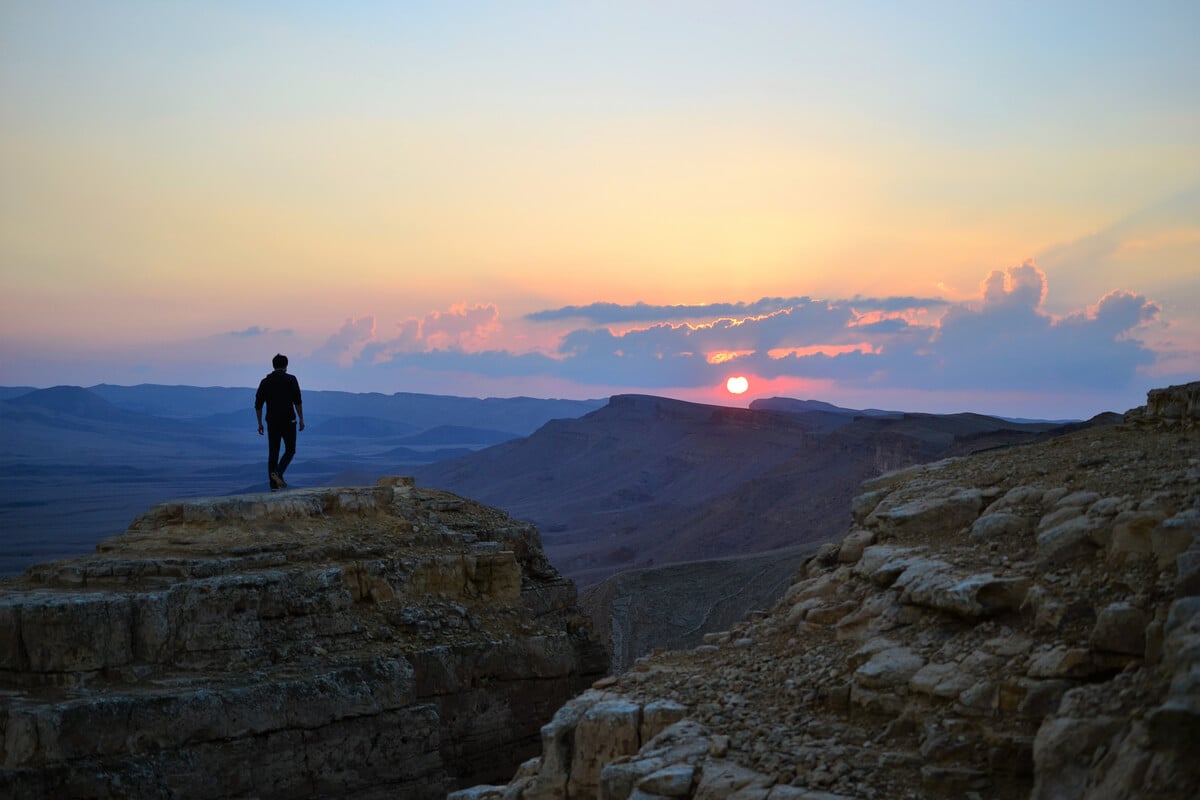
The vibe in Mitzpe Ramon is mega-chill. The people are super open and friendly and finding a crew to jam out with is a cinch.
It’s not just hippy shenanigans either! There are countless hiking opportunities to be had in the hills (and crater) surrounding Mitzpe Ramon. Stock up on water and info before you leave and then go see what makes this area just so damn special.
And give yourself enough time to explore Mitzpe Ramon properly. It’s one of those places; slow travellers might just find it… sticky.
Backpacking Eilat
Eilat can suck my farts through a straw. If you thought Tel Aviv was materialistic, overpriced, and kinda dumb, Eilat will just make you cranky. It’s been months since I visited Eilat and I’m still cranky!
It’s not a big city, but it feels big. Israel’s own resort-y Las Vegas perched on the banks of the Red Sea. Truly, Moses is spinning in his grave… probably to some trashy EDM blasting over the water until the early hours of the morning. >:(
The worse part is that it wasn’t even always that way: it’s my hometown all over again. What started as a beautiful beachside locale famed for its alternative community and dirtbags sleeping on the shores is now Israel’s premier holiday destination complete with an overdeveloped hotel industry and too many twelvie-Israelis staunching the place with an excess of makeup and cologne.
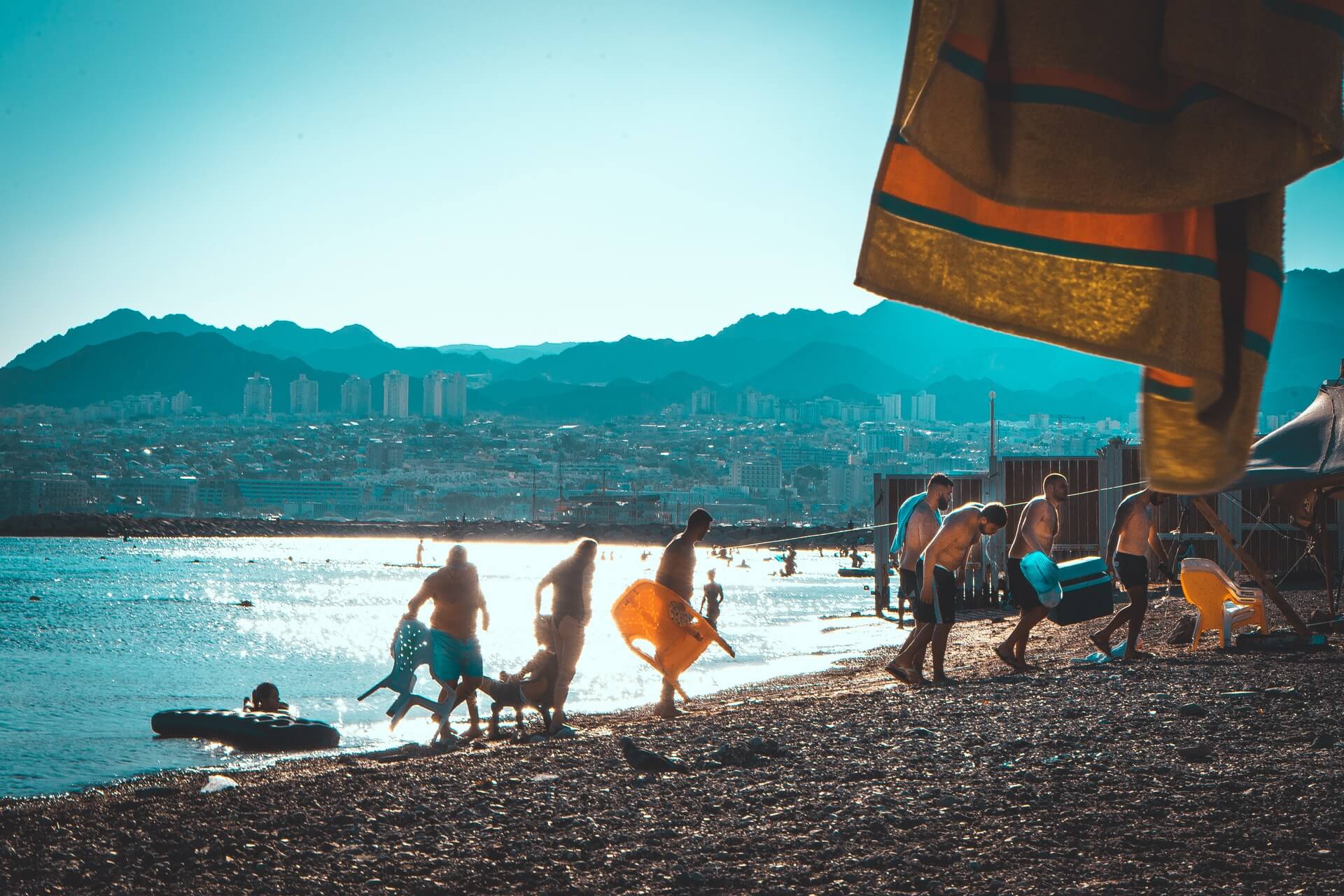
Ok, rant over: what’s good about Eilat?
- There’s some bangin’ scuba diving in Eilat . It’s not best diving you’ll find in the Red Sea, but it is the best diving you’ll find in Israel.
- There are still good and grungy folk who sleep out in Eilat. You have to head south outside of the town a few kilometres (on the road towards Taba), but eventually, you’ll start seeing the pitched tents.
- The Red Sea is downright-shitting-magnificent. Even Eilat can’t ruin that.
Otherwise, what is there to do in Eilat? I don’t care – leave Eilat. It’s not backpacker-friendly, and as you may have guessed, the accomodation in Eilat is hella expensive too. Eilat better serves just as a base for exploring the south topped off with a swim.
And no, you’re not allowed to sleep on the beach to wake up for dawn over the Red Sea. But I did it anyway.
Fuck you, Eilat.
Backpacking Palestine (The West Bank)
There are some Israelis that refer to the West Bank area as Palestine and there are those that disagree or are even perplexed by the denomination. However, I’m writing this Israel travel guide and I call it Palestine, so poops to you!
I do so because it is. Once you step over the border between Israel and Palestine, the whole game changes. The language changes, the culture changes, the attitudes change, and even the experience of backpacking changes. Backpacking Israel is akin to travel in a highly-developed and, often, Americanised country: backpacking Palestine is pure South Asia rules through-and-through (albeit with Arabic spices).
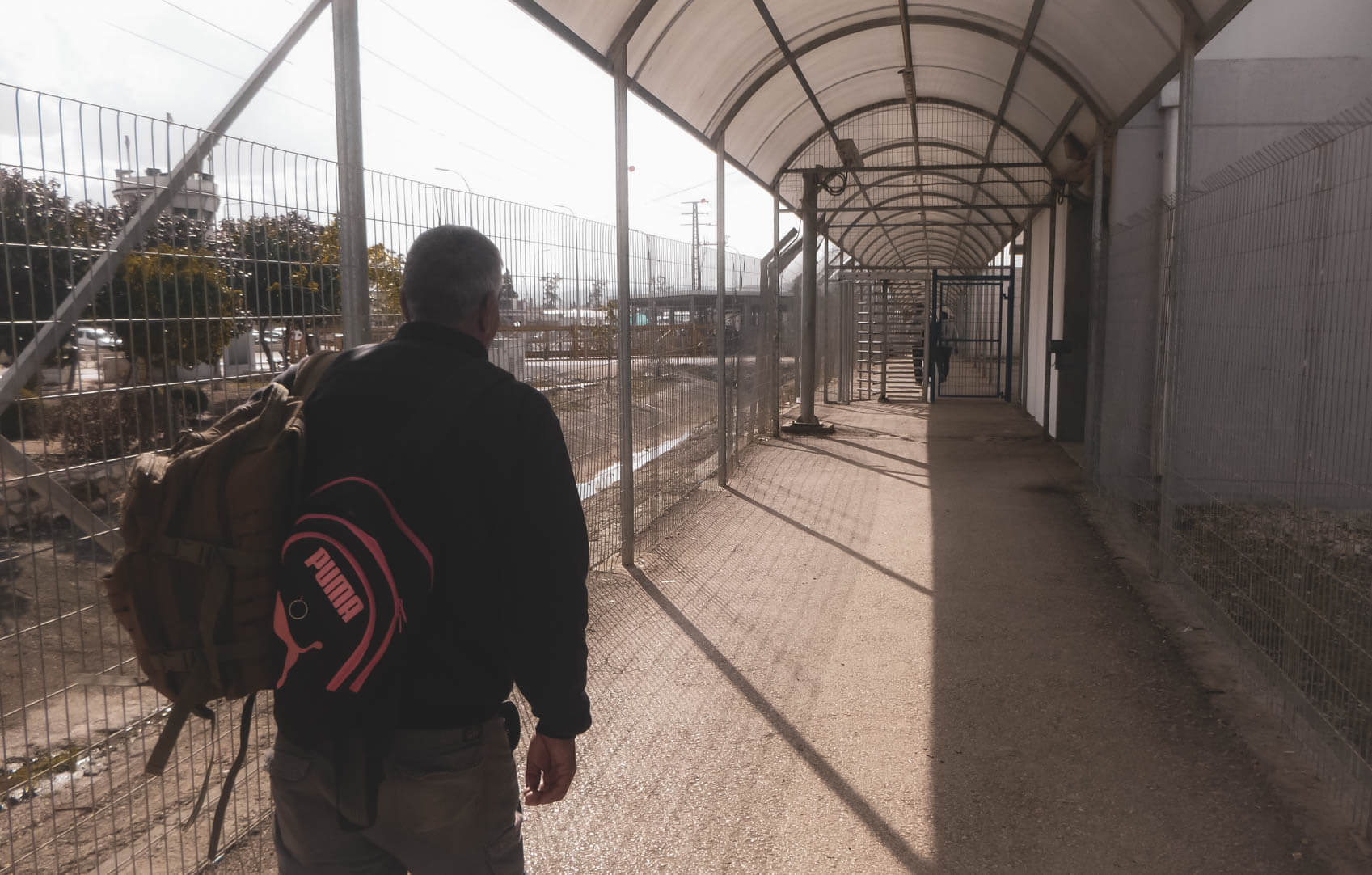
There’ll be time to unpack the conflict later (whoopee), however, here is simply to talk about the travel experience:
- Palestine is safe – Whatever you’ve been told, wipe the slate clean and walk in without those biases. While you have to follow the rules of backpacking in a developing nation, Palestine is safe for tourists . Just be smart.
- You will talk about the conflict – Israelis love to talk about it, but Palestinians yearn to talk about it. It’s hard for the persecuted to find a voice, so when someone is willing to listen, they are always willing to talk.
- It will hurt – Unless you lean very deeply into conservative politics, or are legally blind, that’s unavoidable.
- You will be the centre of attention – Again, think India rules. Not many tourists visit Palestine, particularly independently. For men, this is a genuine curiosity and excitement. It’s the same for women but, well, India meets Arabic customs… Be extra smart, ladies.
- You are allowed to travel there – If anyone says otherwise, politely tell ’em to suck eggs.
Otherwise, prepare for a whole new travel experience! Conflict aside, that’s the beauty of backpacking Israel: you’re really getting two countries for the price of one!
Put your haggling hat on and prepare your tastebuds for some bombastic delights because we’re going in! And the added bonus of travelling Palestine…
Everything gets cheaper.
Places to Visit in Palestine
Environmentally, Palestine isn’t hugely different to the Israeli side: magnificent stretches of desert landscape dotted by surprising bursts of greenery. There are chaotic larger cities, a multitude of dusty villages, and areas where illegal Jewish settlements (illegal as deemed by international law) have cropped up.
These kibbutzim tend to have much higher living standards and are considerably lusher. The Israeli government heavily restricts water allowances to Palestinians while giving these settlements ample amounts of water. So on that note, please be very water-conscious when travelling Palestine – it really matters.
Due to the occupation and crackdown by Israeli forces, tourist accommodations and services tend to be sparser in Palestine. They are there though. Personally, I’d recommend finding accommodation in the West Bank through Airbnb; finding homestays and other family-run accommodation is going to give you the most authentic experience and insight.
While I wasn’t enamoured by the tourist attractions in Palestine, the experience of travelling off the beaten track and interacting the Palestinian culture and way of life is what drew me there. Still, there are a few standards destinations in the West Bank too.
The administrative capital of the Palestinian National Authority, Ramallah is not a glimmering city. It’s not even a pretty city. But that’s kinda the point.
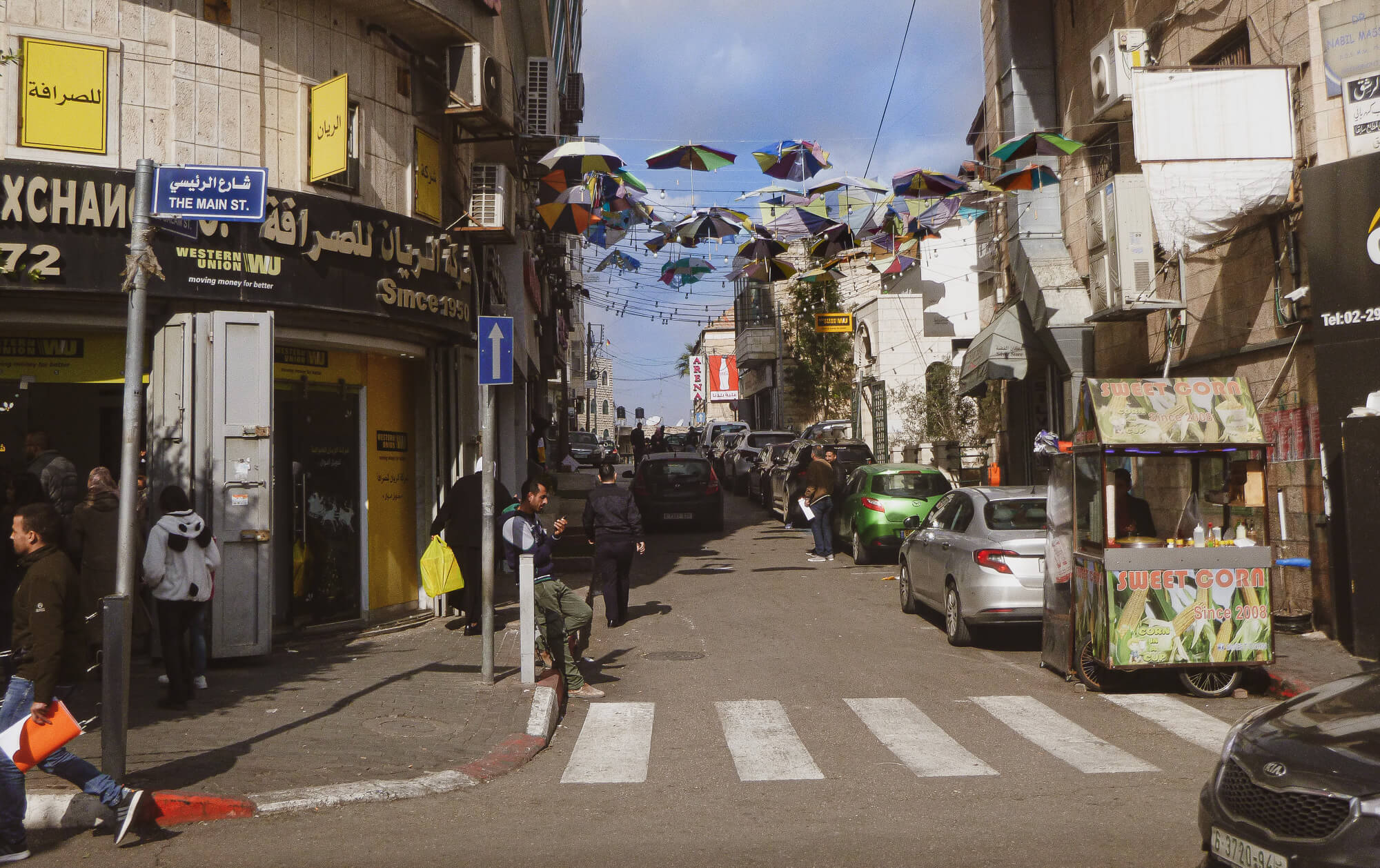
It’s a chance to see what life is like for the Palestinians, however, it’s certainly a lighter experience than Bethlehem and Hebron. There aren’t many must-see attractions in Ramallah save maybe a visit to the mausoleum of Yasser Arafat . Checking out Radio on a Thursday night is also a recommendation for the lovers of a good boogie.
Outside of that, this is a Palestinian city: it’s dustier, less colourful, and so much more chaotic. But sit down in a local cafe for an Arabic brew and puff of the shisha, and I guarantee you’ll have made a crew of homies in no time.
Comparatively to Ramallah, Nablus has a few more places to see while being a bit more off the radar. Modelled off of Damascus – the capital of Syria – there are vibrant bazaars, luxuriant hammams (Turkish bathhouses), and no shortage of intoxicatingly beautiful mosques in Nablus.
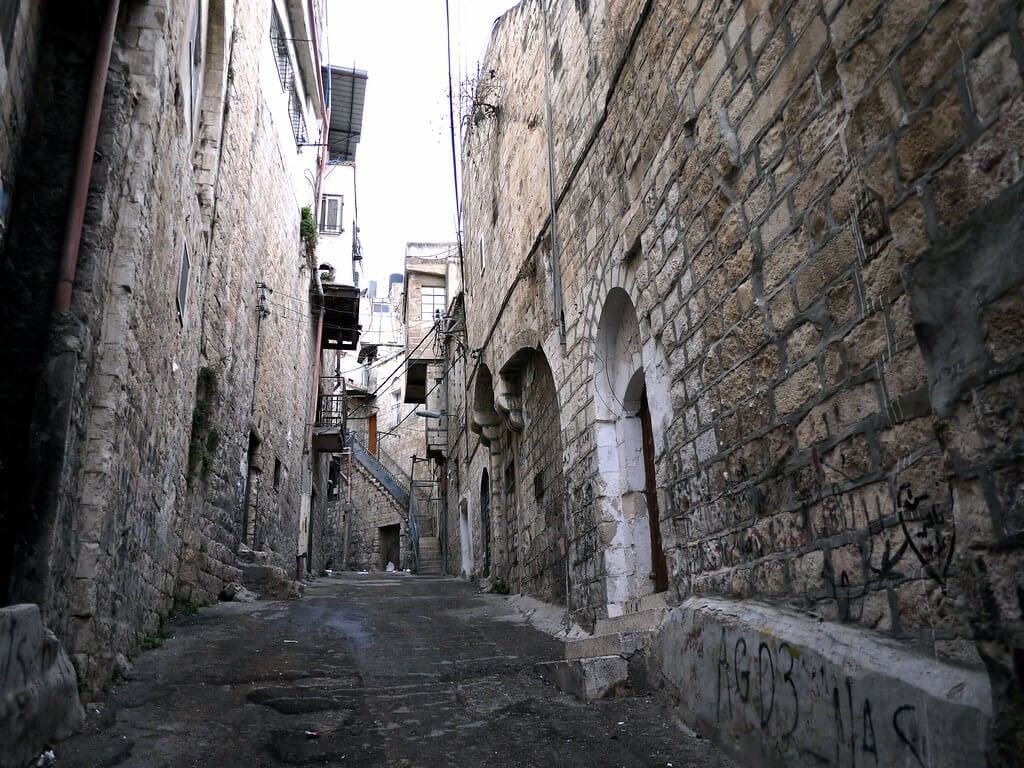
The Old Town is the place to see examples of Nablus’s ancient Levantine architecture. Meanwhile, a trip to Al-Aqsa is a must-do. Most Arabs across the Arabic world will tell you that their knaffeh is the best knaffeh, however, this might actually be the BEST knaffeh!
What’s knaffeh? Hah! No spoilers. 😉
Lovers of ruins will get their fix in Jericho! This is the Jericho of ‘the walls came tumbling down’ fame. Now, while that almost-definitely didn’t happen, the ACTUAL history of Jericho is a billion times cooler.
Unearthed settlements and archaeological sites in Jericho trace back as far as 9000 BCE., i.e. the start of the current epoch (the Holocene) that we’ve been living in since the last glacial period.
Jericho is oolllddd.
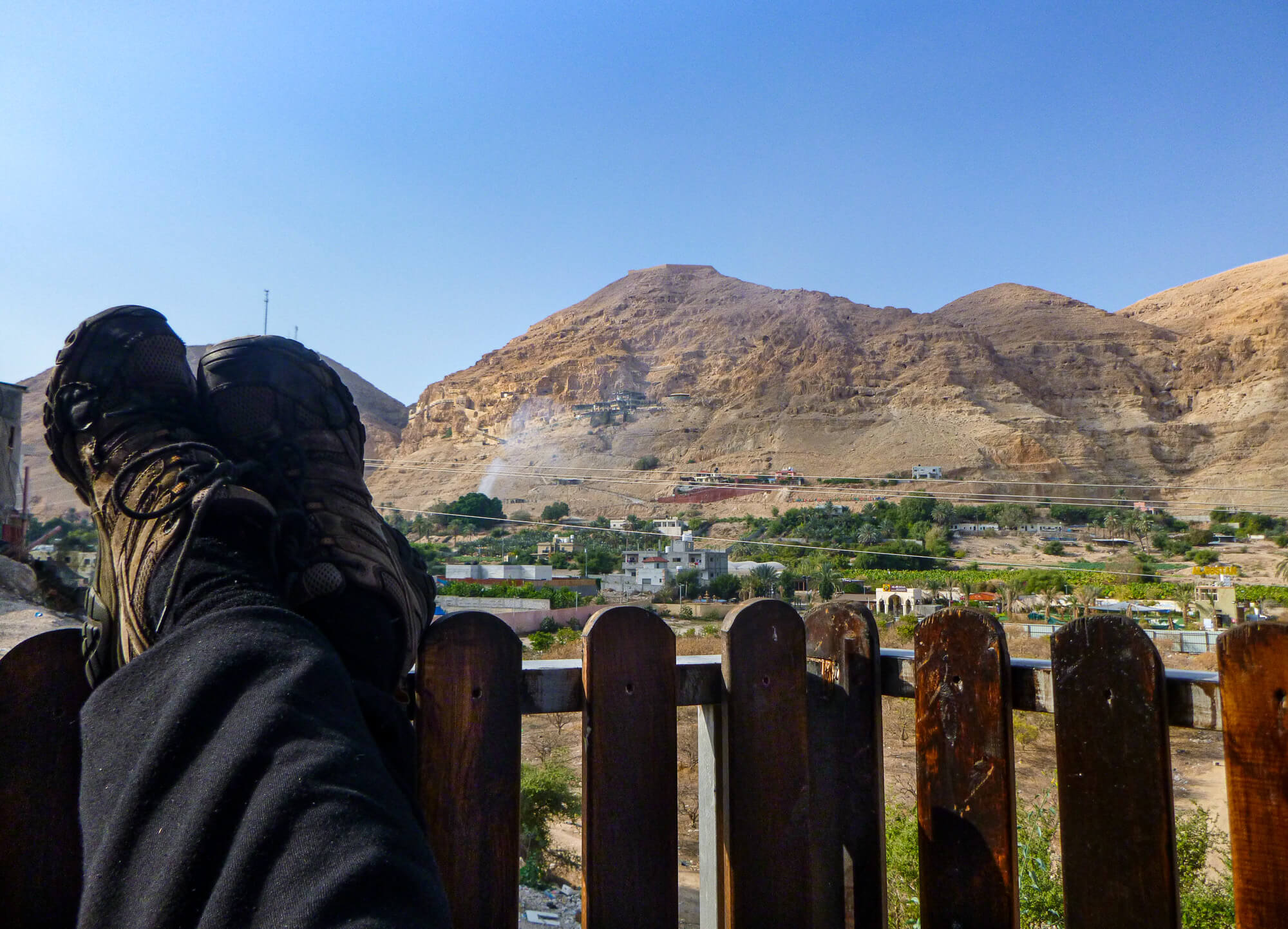
To be frank, outside of the primordial delights, Jericho is kinda boring – I’d visit but not stay. It’s deeply poverty-stricken having been heavily affected by the occupation and it’s not all that encapsulating. But hike up the Mount of Temptation to visit the cliffside monastery before you shoot through is an absolute must-do thing.
Backpacking Bethlehem
Bethlehem is the first place in Israel and Palestine where the gravitas of the conflict really settled on my shoulders. This is due to the occupation wall .
The Israeli West Bank barrier is the separating factor that runs the length of the Israeli-Palestinian border. It serves to annex the West Bank, however, in Bethlehem, it also annexes Rachel’s Tomb – a key site of cultural significance to the Abrahamic religions.
The wall towers overhead and looms as a symbol of oppression. It alone boggles the senses, but once you start paying close attention to the jaw-dropping street art and stories plastered across the length of the wall, it takes on a whole new meaning.

The photo-ops at the wall are certainly abundant. So too are there plenty of hallmark religious sites in Bethlehem, particularly the Church of the Nativity (housing the alleged birthplace of Jesus).
Still, put all that aside and take a moment to really pay attention to Bethlehem. Look beyond the tourists snapping basic-beach shots for Instagram at the wall and listen what to what is being said. You’ll probably need a stiff drink and stiffer spliff afterwards.
Backpacking Hebron
Last up in our tour of Palestine, we’re talking about Hebron. It’s coming last because… well… you’ll see why.
It’s hard to not talk about the conflict and chaos when discussing Hebron because ultimately, that’s the main reason for visiting Hebron. The only real tourist attraction in Hebron is The Tomb of the Patriarchs – the alleged burial site of Abraham, his son, his grandson, and their respective wives. The mosque side of the tomb is very pretty, but that’s not why most backpackers in Israel travel to Hebron.
Hebron is not a light place to go to in Israel and Palestine. It’s a place to go to experience Palestine and the conflict in its full weight, even more so than Bethlehem or Ramallah. I haven’t met a soul yet for whom that wasn’t a heavy weight.

Hebron is, arguably, the most contested city in the Israeli-Palestinian conflict and it shows. One side of the city is open to Israelis (H2) , but it’s still not a place many would visit. The cordoned-off section H1 – roughly 80% of the city – is the area controlled by the Palestinian Authority and it’s here that the true gravity of the conflict is felt.
A step from H2 to H1 through the Israeli military checkpoints and assault rifles is a step from the First World to the Third in a blink. Everything feels so far removed from Tel Aviv and Jerusalem. Trash litters the nets above the souk, dilapidated buildings crumble over into the street, and when it rains here, the sewage overflows and the stench is palpable. The air of oppression lays thick and dense.
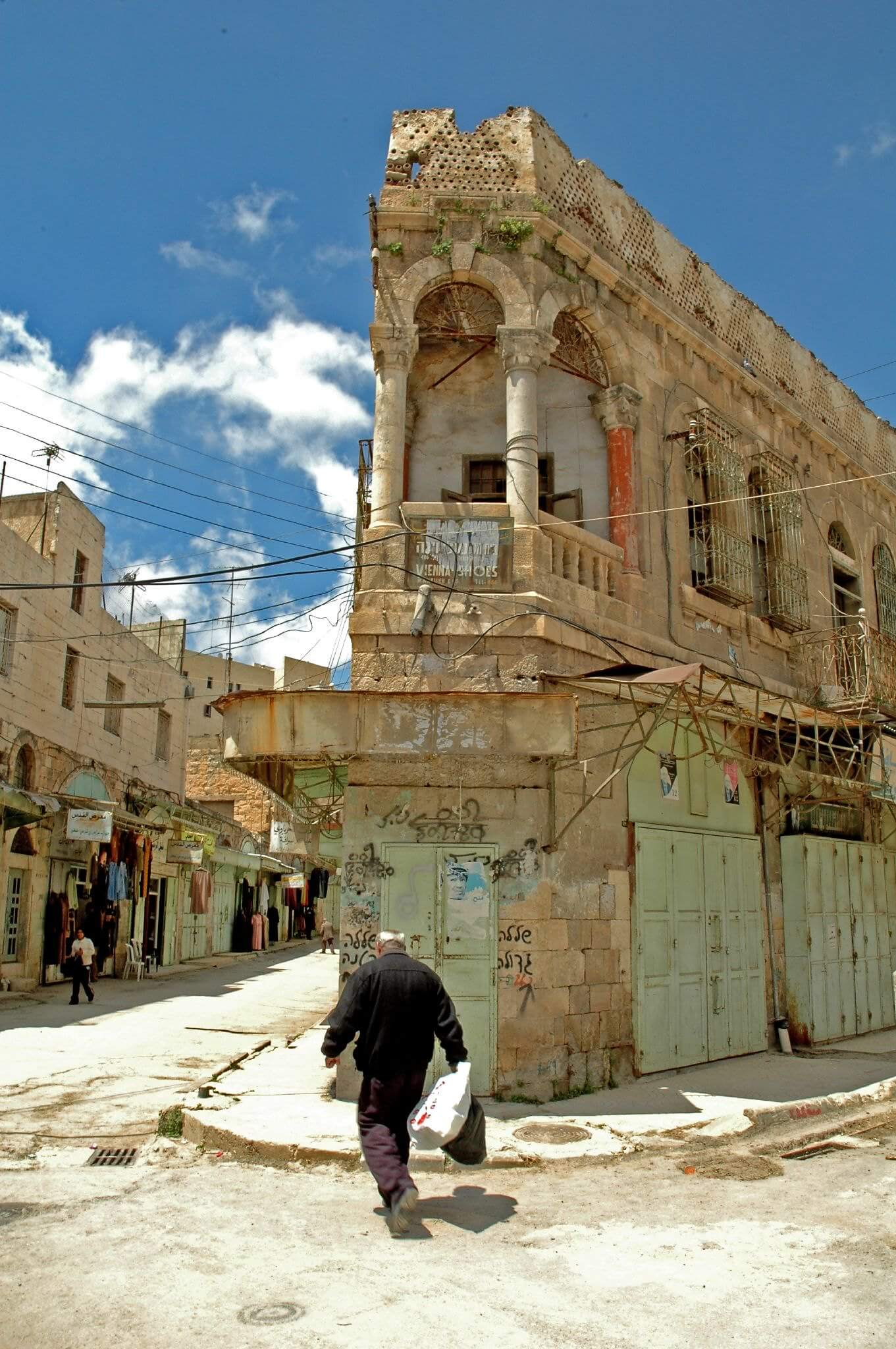
So why go to Hebron? To see it for yourself .
Bethlehem is where the cracks in my psyche started to show, but Hebron broke me, and I mean that. All this time later, it still disturbs me on a regular basis. And I’m so damn grateful I went. If I hadn’t, I couldn’t really say that I travelled Israel.
While you’re backpacking around Israel, people are going to want to talk about this stuff – Israelis, Palestinians, and everyone else. I’ve had good conversations both hitchhiking out of Tel Aviv and sharing coffee and cigarettes with the locals in Hebron.
Israeli or Palestinian, there are good people everywhere. Israel is safe for tourists and so is Palestine. The people inside Hebron are welcoming, warm, and simply excited to talk. If you’re willing, it’s important to see this stuff; it’s important to find your own truth.
Getting Off the Beaten Path in Israel
Because Israel is such a small country with an economy so hinged on tourism, it often feels crowded. But with a little motivation, you can be out experiencing parts of Israel with little to no other backpackers easy-peasy!
Many parts of the Negev Desert and the Golan Heights are sparsely inhabited. Furthermore, in that typical Asian manner (and possibly because of the nature of kibbutzim and moshavim), you can wander most directions in Israel without worrying too much about being slapped as a trespasser. Just be respectful, don’t go traipsing through crops, and if anyone does have a go at you, just play the stupid tourist card.
If it’s not so much the feeling of the cities you’re looking to escape but rather Israel’s tourist trail overall, volunteering at a kibbutz or moshav is definitely the way to. It’s a slower life, but it’s also a cheaper life! (Actually, it’s an excellent antidote to the high cost of travel in Israel.) Volunteering is a fantastic way to travel and is certainly going to provide you with a very new cultural perspective too.
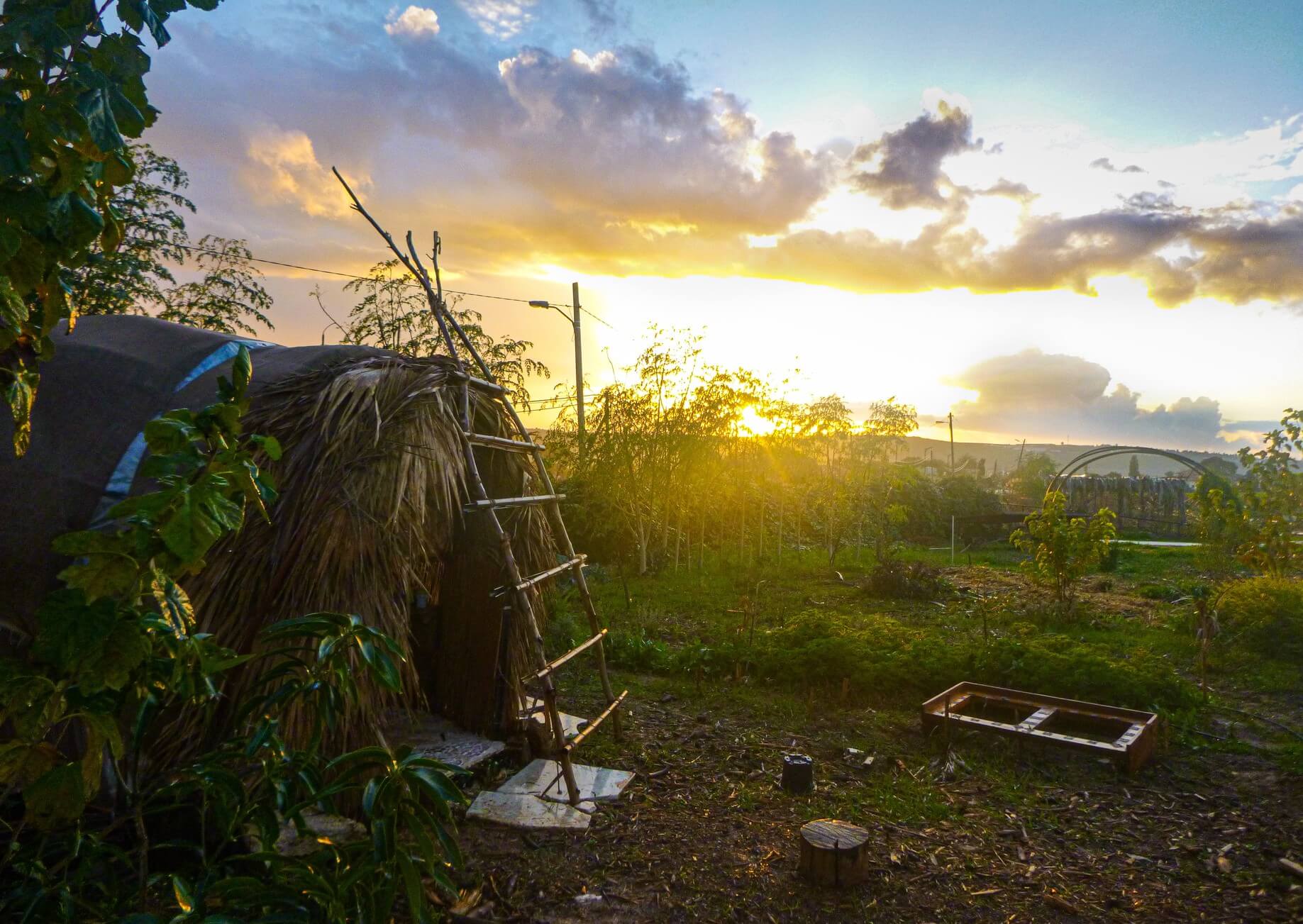
And if you really want to step off the beaten path in Israel, visiting Palestine is your best bet. It’s a very jarring contrast to backpacking around Israel, however, you’ll also find that the locals won’t carry the same jaded disposition for tourists found in Israel’s overdone tourist spots. It feels much closer to an adventure in a lesser-explored country than just a trip of bussing it between the itinerary stop-offs.

We’ve tested countless backpacks over the years, but there’s one that has always been the best and remains the best buy for adventurers: the broke backpacker-approved Osprey Aether and Ariel series.
Want more deetz on why these packs are so damn perfect? Then read our comprehensive review for the inside scoop!
There are a lot of things for backpackers to do in Israel; a lot about this country draws travellers in.
Now, while this is far from a complete list of what to do in Israel , I’ve put some of my personal faves down below. A few may surprise you – sometimes, it’s the little oddities that help us connect with a country the most.
1. Lehitkelev – Dirtbag the Holy Land

Lehitkelev – to “dog it” . It’s a phrase in Hebrew that means to rough it… to live as a dog… to budget travel. To dirtbag.
Travelling without spending much money and employing all the tricks of that trade is what truly led me to connect with Israel and its people. The tourist trail in Israel burnt me out hard, but as soon as I was out on the road travelling again as I know best, I fell in love with the country.
This is my personal number one thing to do in Israel. Hitch the Holy Land, sleep rough, eat what you find, and volunteer kindly. Truly, the Israeli people are good to the lowly dirtbag.
2. Hiking in Israel: A Wandering Pilgrimage
From kick-ass beginner day hikes to the monumental Israel National Trail (INT) – a 1015 kilometre trek taking you from right across the country – Israel is a land simply built for wandering pilgrimages. Make sure you know what supplies to take hiking because you’ll often be waltzing into the desert extremities, but with water, sunscreen, and a big floppy hat, you’ll be fine!
The Golan Trail (125 kilometres) is a much shorter multi-day hike for anyone not keen to just walk across the entire country. Day hikes are pretty much anywhere you go in Israel, but you can also just hike the INT in sections!
3. A Grand Hummus Tour of Israel!

Look, every Israeli in every corner of the country is going to want to show you their hummus. They’ll insist that their hummus haunt is “sooo super super amazing – the best hummus in Israel”. And the only way to be sure is to try every single damn one of them!
Truthfully, you’d have a hard time finding hummus in Israel that isn’t mindblowing; even the supermarket goods will knock your block off! But Abu Adham in Tel Aviv was the one that had me coming back daily… probably because they give you free hummus refills. (Yes, plural. )
4. Actual Tours of Israel
Snacking your way across the Levant is one thing, but how about an actual tour? I did a whole stint reviewing some of the best tours in Israel and while some of the things I learned hurt more than stepping on LEGO, I’m grateful for the things I now know.
Given the overwhelming depth of the culture and history, touring Israel on a guided excursion – at least in part – might be one of the best activities for tourists looking for a crash course.
5. Observe the Ultra-Orthodox
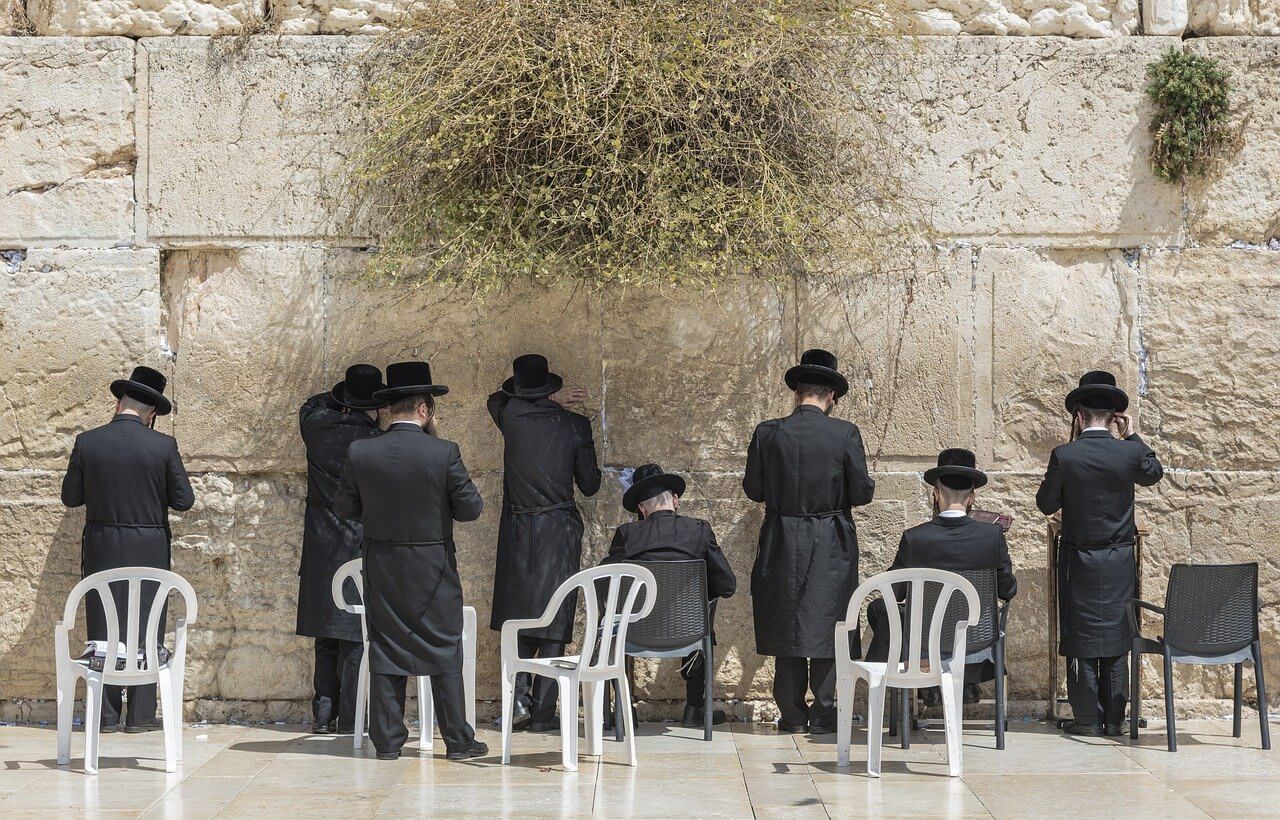
Speak of the devil, I know the perfect guided tour for learning more about the cultural king-hit that is Ultra-Orthodox Judaism! The Haredi Jews (or Ultra-Orthodox) are the members of Jewish sects that adhere most strictly to halakha (Jewish law). As with any form of extreme and esoteric religion, the culture is fairly impenetrable (hence why booking a tour is smart).
Despite only amounting to roughly 10% of the total population of Israel, the Ultra-Orthodox Jews are also one of the greatest sources for political discontent and civil unrest within the country and have defined how the country is structured.
It’s a helluva rabbit hole and one supremely interesting for anybody curious about the topic, but I can’t possibly unpack that Pandora’s Box here. I’m not a tour guy in the slightest, but this is one I wholeheartedly recommend.
6. Par-tay!
So, the Ultra-Orthodox Jews may live rather sheltered lives, but the secular Israelis do not . Drugs, sex, boogies, bouncin’ booties, and more shaloms than you can shake a stick at!
Whether it’s the indulgent nightlife of Tel Aviv where your shekels pave the way to an easy lay or the opportunity to throw down in the desert heat with Israel’s finest doofrats to some pumping bass, go hard.
7. Indulge in Some Matkot
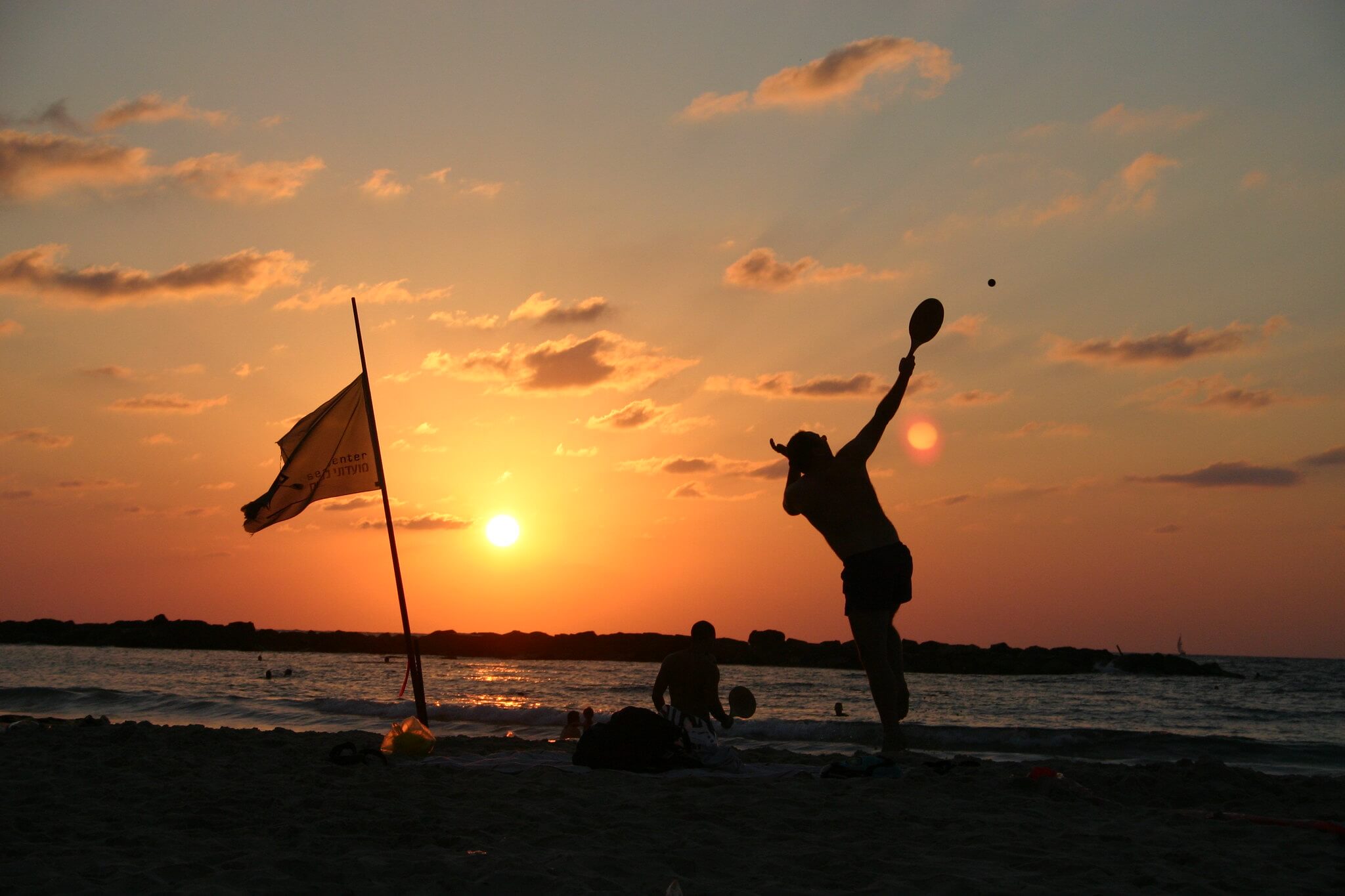
The Italians get football, the Poms get cricket, the Ozzies also get cricket (except we’re better at it), and the Israelis get matkot . What’s matkot? It’s basically beach tennis if tennis had no court, no rules, no win-state, and no real point whatsoever!
Head down to any beautiful beach in Israel and you’ll be treated to the benevolent sound of scores of Israelis playing with their balls. The only things you need to play matkot are two paddles, a ball, and, seemingly, extremely tight and revealing swimwear.
8. Explore Neve Sha’anan
The Upside Down of Tel Aviv and, coincidentally, my favourite neighbourhood to explore. Regarded as the ‘Underbelly of Tel Aviv’ (though it’s hardly dangerous), it’s a bustling hive of activity and a den of debauchery for the homeless, harlots, and haggard of Tel Aviv’s proletariat.
Given the huge number of African refugees and cheap Asian labourers basing themselves in Neve Sha’anan, this neighbourhood is hugely diverse presenting some of the finest cuisines in Tel Aviv at some of its best prices. Sudanese food rocks my world!
If you’d like to explore Neve Sha’anan but aren’t so comfortable amongst wandering the streets solo, I know a kick-ass tour just for that too!
9. Get Your Ass Kicked in Shesh Besh
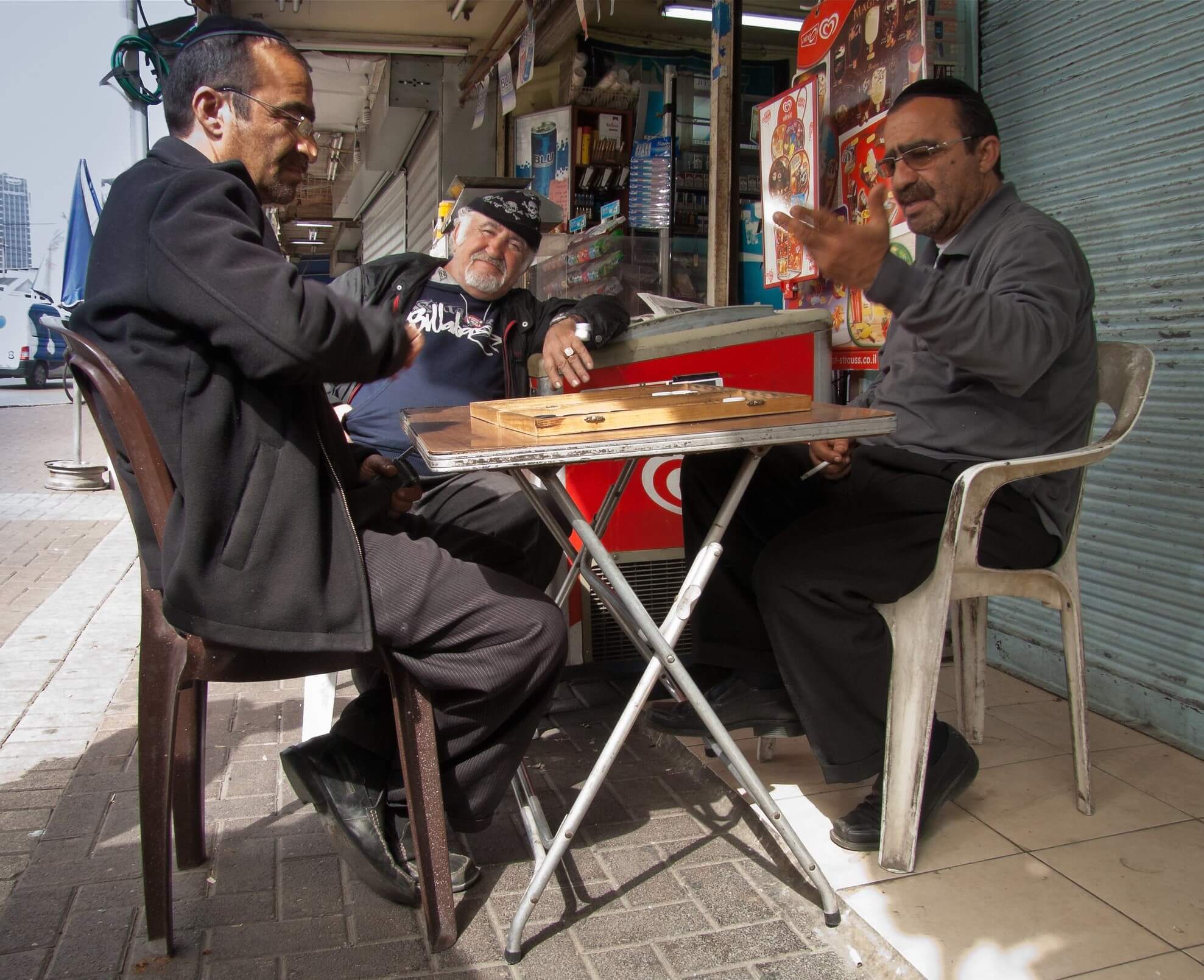
Have you ever actually watched a couple of Israelis go toe-to-toe in shesh besh (backgammon) in a hostel? Who knew backgammon could be such a bloodthirsty sport!
Literally, every single backpacker hostel in Israel you stay at will have at least one board. Go to a cafe in an Arab town and you’ll see the old men smoking cigs and squaring off. Chances are, you’ll start off getting your ass creamed, but practice enough and you’ll be blitzing the board in no time.
10. Respect Shabbat
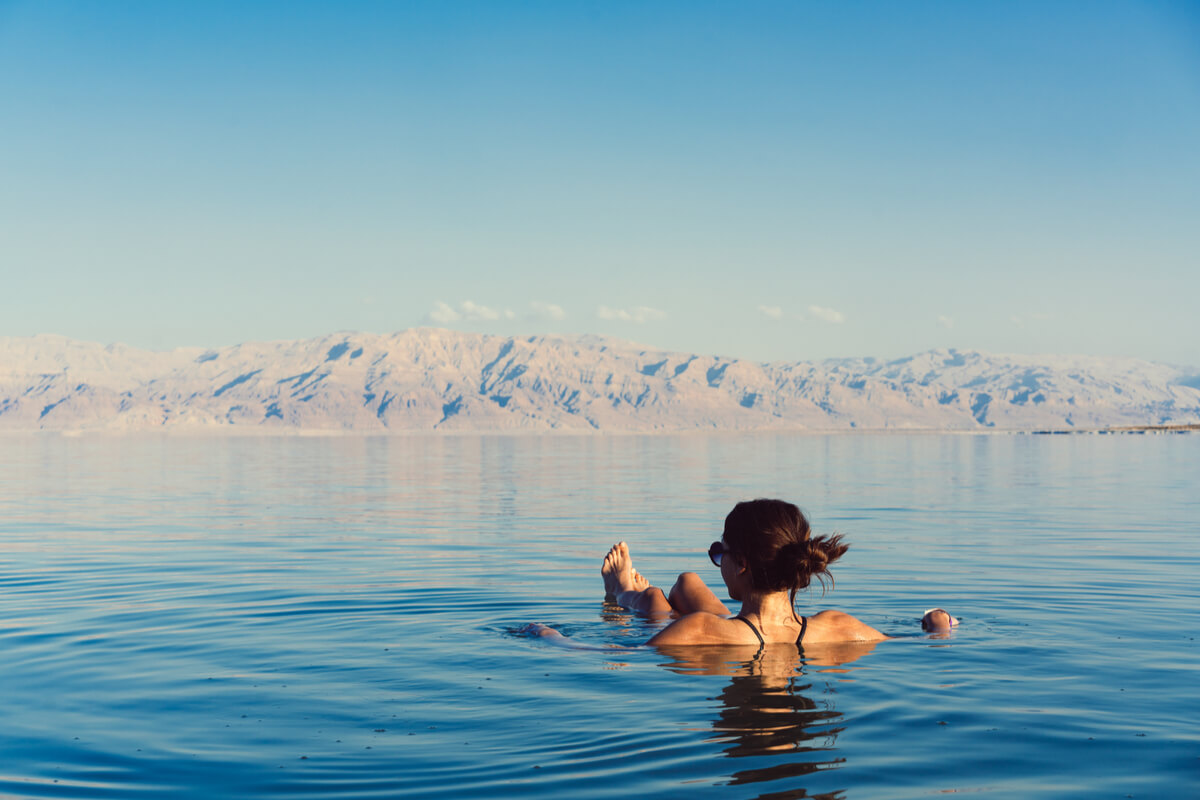
Shabbat is the Jewish day of rest and something to keep in mind when travelling around Israel. From dusk on Fridays to dusk on Saturdays, things shut down – shops, public transport, and even the hummus joints. It’s kind of a pain in the ass, however, then the concept clicks.
The desolate streets of the cities are eerily beautiful in their ghostly silence. Seeing people opt to put their work and phones down for one day a week, gather with their loved ones, and feast and jam around the fire as the night grows long is something the whole world could use more of right now.
Maybe your Shabbat isn’t Saturday; mine are sleepy stoner Sundays. Either way, the point is the same. Shut off the screens for a day and forget the noise of the world for just a little bit. Respect Shabbat.

Wanna know how to pack like a pro? Well for a start you need the right gear….
These are packing cubes for the globetrotters and compression sacks for the real adventurers – these babies are a traveller’s best kept secret. They organise yo’ packing and minimise volume too so you can pack MORE.
Or, y’know… you can stick to just chucking it all in your backpack…
You’re not short of quality backpacker hostels in Israel . The prices vary across the board, but in general, they’re not cheap. $20 US seems to be the running average across the country, however, I’ve seen them stretch from a cool $15 a night to an excruciating ‘I just peed a little’ $40 a night .
To be fair, the standards are high. Israel’s hostels tend to be super clean, plenty comfortable, and decked with all the modern trimmings. It’s just a matter of staying in areas around Israel where the prices are cheaper.

Airbnb and the alternative sites like it – rather surprisingly – is also a useful backpacker tool in Israel. Finding a private room in somebody’s apartment for about the same price as a hostel dorm is not particularly difficult. Splash a bit extra, and you can often find a seriously sweet pad!
But if you’re looking to go cheaper than the hostels, you’ll have to go the volunteering route. A lot of hostels take on volunteers in exchange for board, and, of course, you have Israel’s famous kibbutz and moshav scene. There are still options for travellers who don’t want to blow out their daily budget in Israel on accommodation.
Booking in advance isn’t always necessary, however, the popular (and cheaper) hostels do book up fast. Plan ahead – particularly if you’re visiting Israel in the peak season. And as a backup option, pack a solid travel tent .
Then you can sleep anywhere!
The Best Places to Stay in Israel
Abraham Hostels is the largest and most popular hostel chain in Israel with places to stay in Tel Aviv, Jerusalem, Nazareth, and Eilat! But are they worth the price of entry?
We have a full review of Abraham Hostels right here in case you’d like to find out!
Hot diggity damn, Israel is fucking expensive! I’ve already mentioned it numerous times, but I really can’t reiterate it enough. If you’re backpacking Israel on a shoestring budget, you do really have to dog it.
Food costs are manageable provided you like hummus and tahini. If you don’t, probably just go to a different country instead (or region of the world). On a vego diet, eating for less than 15$ (or even $10) a day is certainly possible.
Similarly, the transport costs in Israel are surprisingly manageable. The buses and trains actually aren’t criminally expensive (though perhaps kinda overpriced relative to the distance). Intercity transport by bus or train is usually less than $10 except in the occasional exceptional circumstance (eg. travelling to Eilat).
It’s everything else in Israel that eats up your travel budget. Activities, attractions, and tours are expensive – souvenir shopping is pissing money into the wind, and accommodation is… groan.
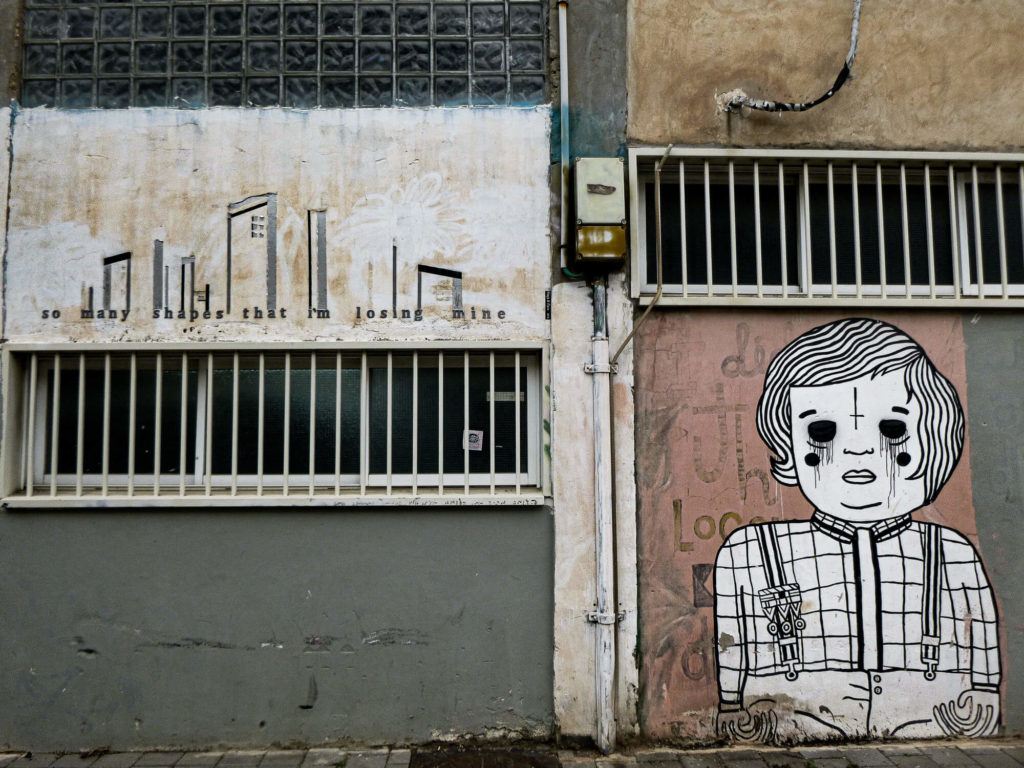
You’d be hard-pressed to find accommodation in Israel – hostel or otherwise – for less than $15 a night. I found the average to be closer to around $20-$25 a night. Camping and finding hosts with Couchsurfing are near-necessities in Israel for long-term budget backpackers as paying nightly fees is just not sustainable.
I would say, however, that it is entirely realistic to travel Israel for as little as $30-$40 a day. People that prefer a more comfortable style of travel (complete with untethered nights on the town) are looking more at a $50-$70 level , but those savvy with their cash will spend less.
Meanwhile, those more equipped in the art of budget backpacking and the finest forms of dirtbaggery could swing $10-15 a day , but you’re going to have to crunch hard. Camping, volunteering, hitchhiking, and perhaps even a touch of dumpster diving are all essential to travelling Israel on a budget.
Fortunately, Israelis are very kind to celebrators of the dog’s life.
A Daily Budget in Israel
Money in israel.
Real talk – I love the currency in Israel! I’m well used to colourful money, but the notes even feel nice in your hand and there’s just a little bit of mystique to the coins. Plus, they’re called shekels; that’s just a fun word to say!

Israel’s currency is the New Israeli Shekel (ILS) . As of writing this (Janurary 2020), 1 ILS = 0.31 USD . For the simplest math, I just regard it as 1 ILS equals 30c or 10 ILS (a much more common denomination) is $3.
ATM machines are widely available pretty much everywhere (though are rarer and a tad sketchier in Palestine). Major credit cards are widely accepted too, however, always carrying a bit of cash on you is best as Israel is a tipping culture (again, groan ). Oh, and buskers and beggars are somewhat common to so having some loose sheks in your money belt never goes astray!
Travel Tips – Israel on a Budget
Some of the best ways to travel Israel cheap are also some of the best ways to travel it period! Some of the best conversations I’ve had on the road occurred while rummaging through trashcans like a wayward raccoon:
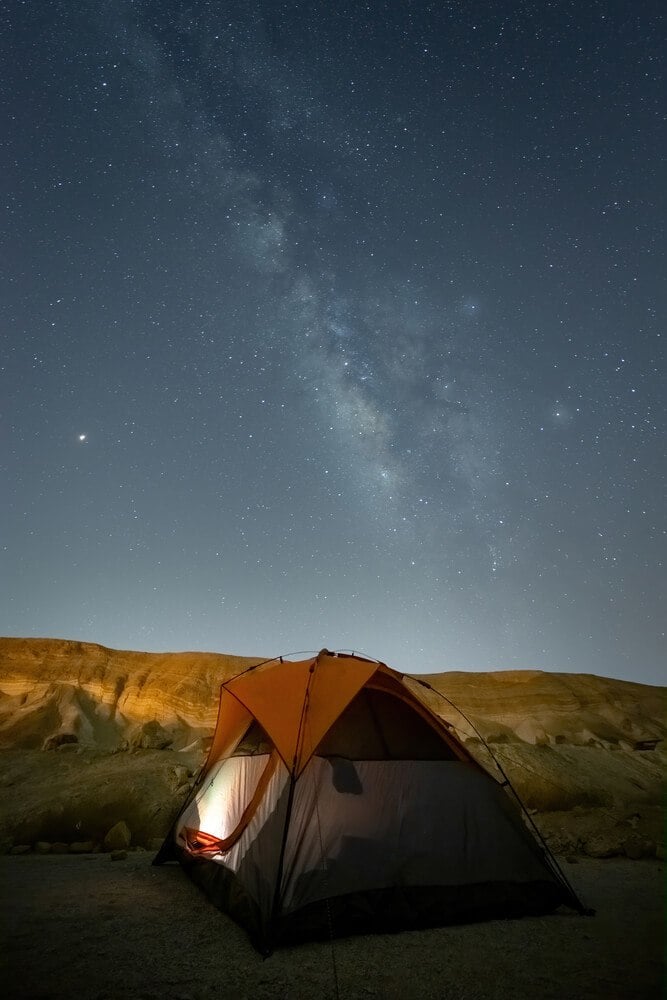
- Camp: Sleeping out is easy in Israel, particularly in rural areas; people are chill about it. You’ll just need to make sure that you’re carrying the right backpacking gear and necessities fit for the purpose of sleeping outdoors!
- Couchsurf: Israelis will most definitely put you up and chances and – in typical Israeli fashion – they’ll want to show you the world. Couchsurfing is an excellent way to make a local friend quick. I didn’t actually try it on the Palestinian side, however, I heard the story is much the same.
- Volunteering: I’ll expand in the volunteering section later on, however, it suffices to say that volunteering is a classic method to save on travel costs in Israel!
- Hitchhike: Where appropriate, hitchhiking is a great way to save money on transportation costs. Where is hitchhiking appropriate in Israel? Everywhere! (We’ll get to the elephant in the room soon.)
- Pick fruit from the trees: The kibbutzim, moshavim, and even just random locales have abundant fruit trees growing. Is it ok to pick them? I dunno, but the kibbutzim were built on socialist ideals… I’m sure no one will miss a couple of oranges.
- Dumpster Dive: Look, I know it’s not everyone’s style, but I can tell you dumpster diving works in Israel. I replaced nearly my entire wardrobe in Tel Aviv and I found more bread in the streets of Jerusalem than I did Jews.
Why Should You Travel to Israel with a Water Bottle?
Plastic washes up on even the most pristine beaches… so do your part and keep the Big Blue beautiful!
You aren’t going to save the world overnight, but you might as well be part of the solution and not the problem. When you travel to some of the world’s most remote places, you come to realise the full extent of the plastic problem. And I hope you become more inspired to continue being a responsible traveller.
Tl;dr – STOP USING SINGLE-USE PLASTIC! If you’d like some more tips on how to save the world .
Plus, now you won’t be buying overpriced bottles of water from the supermarkets either! Travel with a filtered water bottle instead and never waste a cent nor a turtle’s life again.

Drink water from ANYWHERE. The Grayl Geopress is the worlds leading filtered water bottle protecting you from all manner of waterborne nasties.
Single-use plastic bottles are a MASSIVE threat to marine life. Be a part of the solution and travel with a filter water bottle. Save money and the environment!
We’ve tested the Geopress rigorously from the icy heights of Pakistan to the tropical jungles of Bali, and can confirm: it’s the best water bottle you’ll ever buy!
Since Israel is blessed with a Mediterranean climate, the country enjoys fantastic beach weather throughout the year. Mostly…
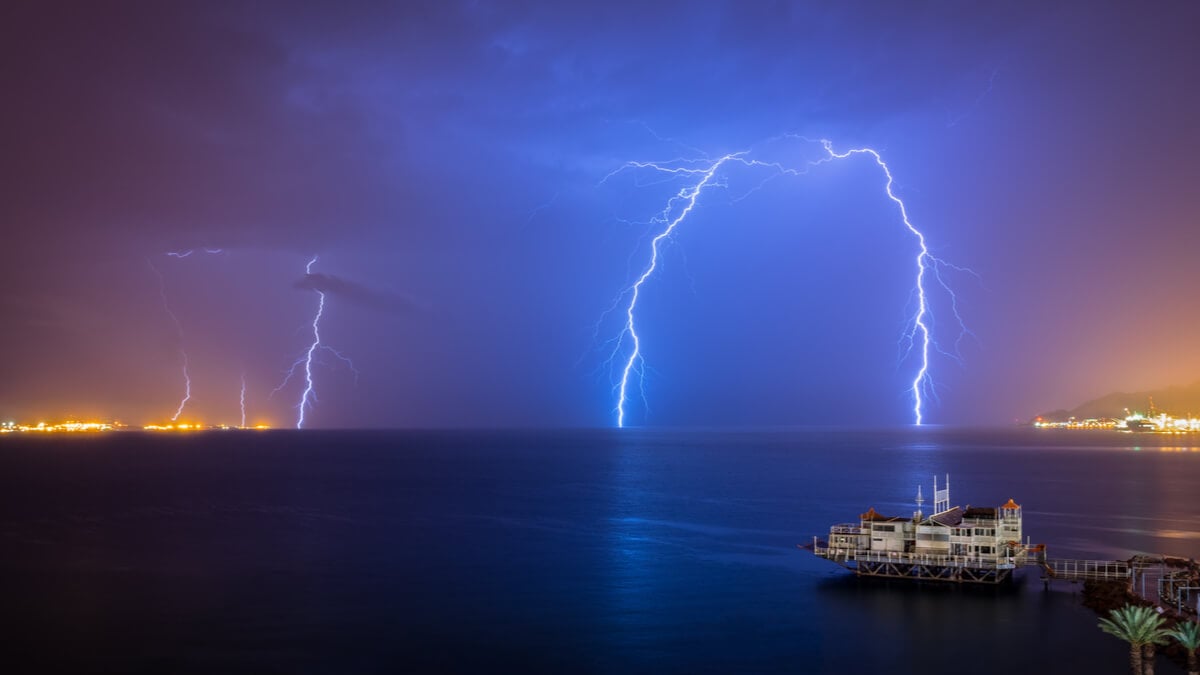
- Winter (December-February) : You’d think winters in Israel wouldn’t get cold (or rainy) because of that whole desert thing, but somehow, it gets both. The far north in the Golan will snow, I had torrential rain close to the Sea of Galilee over Christmas and New Year’s, and the winter winds in Jerusalem can suck my uncircumcised penis.
- Summer (June-August): On the other hand, summers in Israel are EXACTLY what you would expect (given that whole desert thing). They’re hot as balls. The average summer temperature in Israel hovers between 27°C and 32°C (80-90 Fahrenheit) which is kinda basic to an Australian, but spikes and heatwaves are also common. The highest temperature ever recorded was 54 ° C (130 Fahrenheit), at Tirat Tzvi!
Peak tourist season is in the summertime, and it’s also the kind of peak season you don’t want a bar of. Israels’s economy is very much built on tourism and it’s not just the cool backpacker-types either. The beaches are slammed, accommodation is packed-out, prices go up, and the combination of heats and tourists can make the locals a bit cranky(er).
I would strongly recommend visiting Israel in the shoulder seasons instead – autumn or spring. Winter too, if you don’t mind the weather, has a certain charm to it.
Festivals In Israel
Sweet Mama Bojama, Israelis party hard! I mean, hell, Palestinians party hard too. Maybe all that unbridled insanity leaves you with some pretty serious emotions to boogie out!
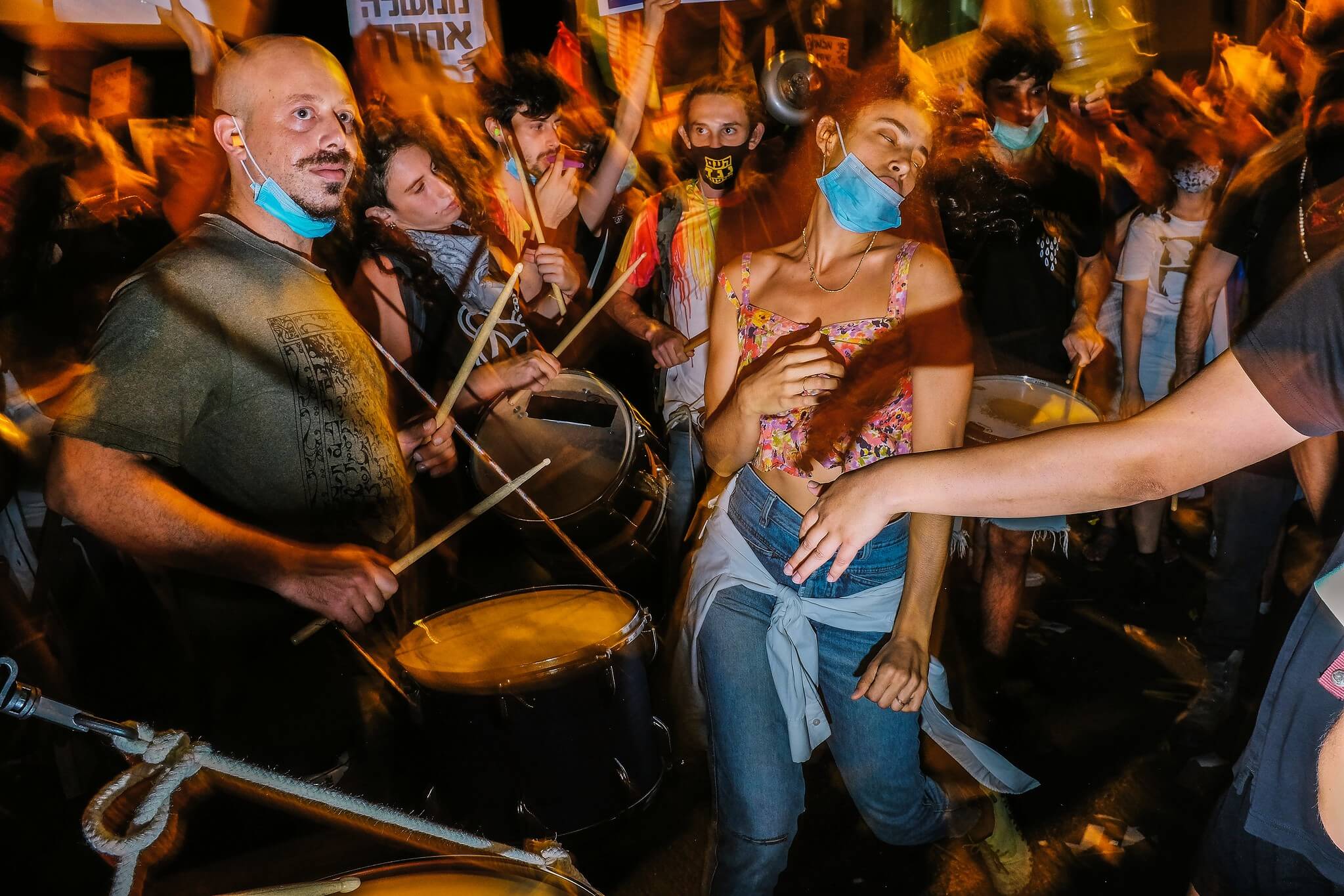
Every year in Israel, there are a ton of different festivals – both religious and renegade – happening throughout the country. I’m not even going to list the religious shindigs because that’s just a list of holidays from the three major Abrahamic religions. Instead, let’s talk about the fun festivals in Israel!
The ones where you get to stick something tasty under your tongue. 😉
- DOOF Festival (April): Doofs – i.e. psytrance festivals – are crazy popular in Israel. Sadly, that also means they’re kinda mainstream and you’re not always looking at the most authentic crowd. On the other hand, the music and drugs are on-point! DOOF is one of Israel’s largest trance music labels, and they’re yearly non-stop 72-hour music festival gets wild . Bring a budget tent and get ready to party with some of the weirdest and most wonderful humans from all over Israel!
- Menashe Forest Festival (May): Not a psy fan? Then instead, Menashe Forest Festival – a wicked 3-day festival in north-central Israel – brings live performances from a huge array of Israeli bands from across all kinds of genres.
- Midburn (May-June): Burners rejoice – Israel has a burn too! Midburn is basically Burning Man but with more hummus and shaloms. Prepare yourself for 6 days of untethered madness taking place in the extraterrestrial sands of the Negev Desert.
- Zorba The Buddha Festival (May and October): Israel’s resident hippy festival, the Zorba Festival happens twice a year at the Desert Ashram in the Negev – once in spring and once during the Jewish holiday of Sukkot. It’s five days of spirituality, dance, meditation, and music, or in other words… hippy shit!
Oh, and one last tip for getting down for the least amount of money: usually if you volunteer at a festival, you can score a free ticket!
What to Pack for Israel
Whether it’s for a short trip or a 3-month stint on a kibbutz, know what to pack for a backpacking trip in Israel! On every adventure, there are five things you should never go travelling without:

Osprey Aether 70L Backpack
Ya can’t go backpacking anywhere without a blasted backpack! Words cannot describe what a friend the Osprey Aether has been to The Broke Backpacker on the road. It’s had a long and illustrious career; Ospreys don’t go down easily.

Feathered Friends Swift 20 YF
My philosophy is that with an EPIC sleeping bag, you can sleep anywhere. A tent is a nice bonus, but a real sleek sleeping bag means you can roll out anywhere in a and stay warm in a pinch. And the Feathered Friends Swift bag is about as premium as it gets.

Grayl Geopress Filtered Bottle
Always travel with a water bottle! They save you money and reduce your plastic footprint on our planet. The Grayl Geopress acts as a purifier AND temperature regulator – so you can enjoy a cold red bull, or a hot coffee, no matter where you are.

Petzl Actik Core Headlamp
Every traveller should have a head torch! A decent head torch could save your life. When you’re camping, hiking, or even if the power just went out, a top-quality headlamp is a MUST. The Petzl Actik Core is an awesome piece of kit because it’s USB chargeable—batteries begone!
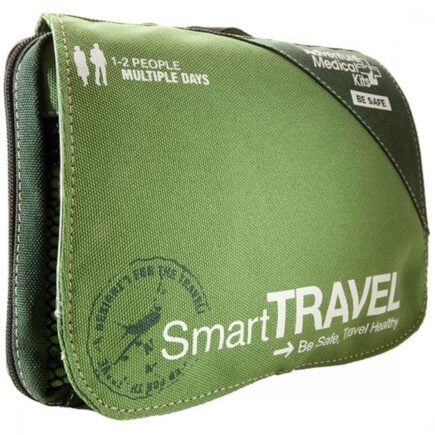
First Aid Kit
Never go off the beaten track (or even on it) without your first aid kit! Cuts, bruises, scrapes, third-degree sunburn: a first aid kit will be able to handle most of these minor situations.
Ohhhhh noooo, now we’re getting into thin ice territory. This is about the only section of this travel guide where you’ll see me properly unpack the Israeli-Palestinian conflict, so strap in, grab some hummus, and let’s do this!
First, to the crux of the issue: Israel is a safe country to travel. Tourists rarely, if ever, find themselves coming to any harm.
Violent crime is low and extremely uncommon. Security measures and police/military presence is everywhere . Most conflict is of the ethnic/religious variety and as a foreigner, you get to thankfully stay out of it.
But I have to be honest: there is constant tension and volatility. Whatever your political leanings might be, the looming threat of violence is always real.
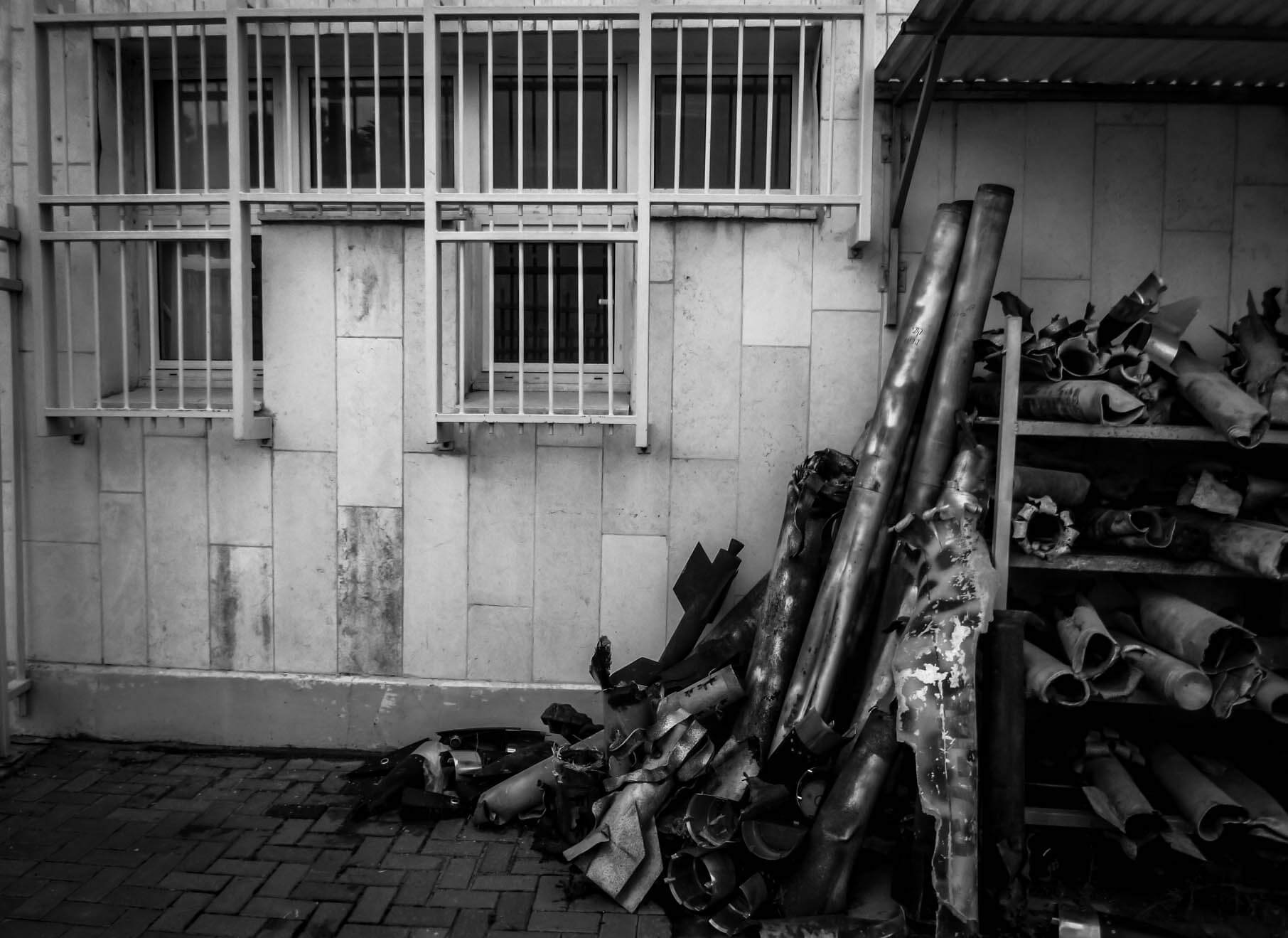
A week before I arrived in Israel, Tel Aviv was hit by missiles. A day before I visited a friend in Sderot (a student town very close to the Gaza border), there were missiles. The buses running from Jerusalem to Hebron (an occupied city in the West Bank) are heavier than the regular buses… because they’re bulletproof.
Sometimes, I meet other travellers who ask me in hushed whispers if I “experienced the conflict in Israel” to which I answer: how the fuck could I not? It’s unavoidable; it slaps you in the face the moment you exit the airport terminal.
Israel is obsessed with national security to an almost fetishistic level. It has the Iron Dome – Israel’s missile defence system with an alleged 85%-90% rate of effectiveness at countering missile fire. Everywhere you travel in Israel, you meet soldiers – 18 to 21-year-old boys and girls donned in battle gear who were (essentially) conscripted. It’s a good day in Israel if you don’t see an assault rifle, and those days are rare.
However, the truth is that it has to be that way. Clashes between Israeli soldiers and Palestinian rebels – and civilians – do happen, sometimes on a weekly basis. And while very few rational individuals can argue that the Palestinian people don’t cop it much, much, much worse.
The reality is that if those national security measures weren’t there and the walls came down, the country would erupt into full-scale war overnight. It would be a bloodbath for both sides.

It’s not fair, it sucks, and it shouldn’t be that way. Countless young Palestinian AND Israeli people – hell, teenagers – are fighting and dying in a war for the sins of their fathers, and that’s the reality of daily life for the people of Palestine and Israel.
But for a traveller backpacking Israel?
Yeah, they’ll be totally safe. Stick to the standard rules of safe travel , use your commonsense, and listen to your gut – you’ll be fine.
However, I say this: safety is not just about your physical wellbeing. I’m writing this travel guide for Israel particularly because I want people to understand the reality of the situation and guard their heart and their mental wellbeing accordingly.
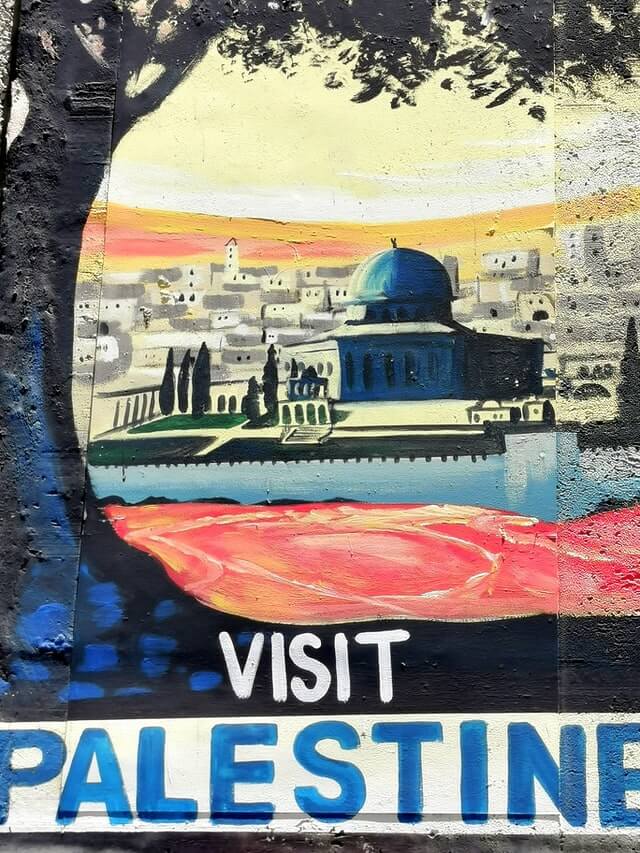
I came into Israel a stupid and arrogant (but still kind-hearted) Australian almost entirely oblivious to the geopolitics of the Middle East; back in 2018, I regularly confused Palestine for Pakistan (while backpacking in India).
After one month of backpacking in Israel reviewing “dual-narrative” tours, visiting places like Hebron and Bethlehem, and experiencing something completely different to anywhere I’d travelled before (or my blissful little bubble at the bottom of the planet), I was on the cusp of a full-blown mental breakdown. It was affecting my work, my relationships, and my sanity. It’s only thanks to one very beautiful Israeli friend that – after hearing me on the phone – demanded I immediately come and stay with her, that I was able to bounce back… slowly.
I’m not trying to say “don’t go to Israel” . On the contrary, go to Israel.
Some tourists don’t even seem to notice what’s happening around them. I envy them. Guaranteed, they have a damn good time.
And for everyone else? Regardless of how many positions your brain gets taken in, you will learn. You will grow and you will come away with a whole new level of understanding of the human condition that simply wasn’t there before. That’s the whole point of travel: growth through hardship .
I’m ending this rather long and heartfelt section with a quote because I want it to make it into the guide and nowhere else will it be relevant. It’s something (slightly paraphrased for the sake of broken English) that a soldier told me when he picked me up while I was hitchhiking on the Green Line – the border between Israel and the Palestinian West Bank. He was a kid – 19-years-old – and he said to me:
I don’t like this. I don’t hate the Palestinians, and I don’t want to hurt them. I understand why they’re angry… But it’s my duty.
They’re taught to hate the Israelis and they attack, but that’s not their fault. They’re taught to hate and they have a right to be angry. But they will attack, and they will hurt my friends. I have to fight to protect my family.
When the ride was finished and he’d dropped me off on the side of the road, I cried.

Sex, Drugs, and Rock ‘n’ Roll in Israel
Ok, back to our regular scheduled programming: drugs, sex, and backpacker things! Woo!
Finding drugs on the road in Israel is doable. If you are looking for a cheeky smoke whilst backpacking Israel, it shouldn’t be too difficult to find. EVERYBODY smokes in Israel. As that beautiful friend said to me over a long-into-the-night discussion on the conflict and, later, the stoner culture in Israel…
“Of course, it hurts. Why do you think everybody smokes?”
Hash and weed are everywhere, good quality, and ridiculously easy to find. If you’re really struggling, you can just download Telegram; search “weed” and the name of the city you’re in, and boom, Yahweh! Delivery just like a pizza!
Hash and weed is expensive, so expect to pay top shekel if you want to get ripped. From a purpley-hazy memory, I think we paid around $110 for 10 grams , however, that was in Tel Aviv. It’s cheaper everywhere else in the country.
( Psst – pro-tip: you can buy the scraps and dust of the bud super cheap, however, it’s sadly not the dankest of the danks. It does the job though!)
Harder drugs are much the same story; accessible, expensive, and a lot of fun. I’ve heard differing accounts of the penalties for people caught with drugs, but it is the worst-kept secret of the Holy Land – just don’t get caught! And be safe with your consumption too.
And yeah, like any good lurvin in any self-respecting backpacking destination , sex is hella common too! Secular Israelis bone and Tinder just as much as any Western country. I’d be more concerned if you couldn’t get a lay in Tel Aviv playing the exotic foreigner card (unless you’re American – that card doesn’t really work in Israel).
Oh, and one last tip: ciggies and tobacco are stupidly expensive… on the Israeli side. Smokers will want to hightail it to Palestine or even just the markets in an Arab town and stock up there.
Travel Insurance for Israel
I mean, as safe as Israel is, you’d have to be pretty daft to head anywhere in West Asia without some sort of coverage. I’m pretty sure there were around 200 missiles flung their direction in the two months I backpacked Israel alone.
Travelling without insurance is risky; please, consider getting good travel insurance sorted before you head off on an adventure. Your mum shouldn’t have to pick up your medical tab.
Several members of The Broke Backpacker team have been using World Nomads for a long-ass time and made several claims over the years. They’re one of the first crews that started taking care of us itinerary-less vagrants and they still are all these years later.
ALWAYS sort out your backpacker insurance before your trip. There’s plenty to choose from in that department, but a good place to start is Safety Wing .
They offer month-to-month payments, no lock-in contracts, and require absolutely no itineraries: that’s the exact kind of insurance long-term travellers and digital nomads need.

SafetyWing is cheap, easy, and admin-free: just sign up lickety-split so you can get back to it!
Click the button below to learn more about SafetyWing’s setup or read our insider review for the full tasty scoop.
For anyone flying into Israel, you will land at Ben Gurion International Airport in Tel Aviv . Alternatively, Israel borders several countries, however, you’ll only be able to access Israel by travelling from Jordan or Egypt. Lebanon and Syria are level-10 no-nos.
If you have stamps from any Arabic or even Muslim countries (eg. Malaysia or Indonesia) in your passport, be prepared to answer questions. And prepare your patience too as Israeli officials – security officers in particular – aren’t exactly renowned for their kindly demeanour.
Take a breath, be polite, and don’t be too jarred by their resting bitch face either. That’s just how entering Israel works.
Entry Requirements for Israel
Currently, passport holders from a fat chunk of countries can enter Israel without having to obtain a visa in advance. Everyone else will have to apply for a visa – specifically, a B/2 Visitor’s Visa .
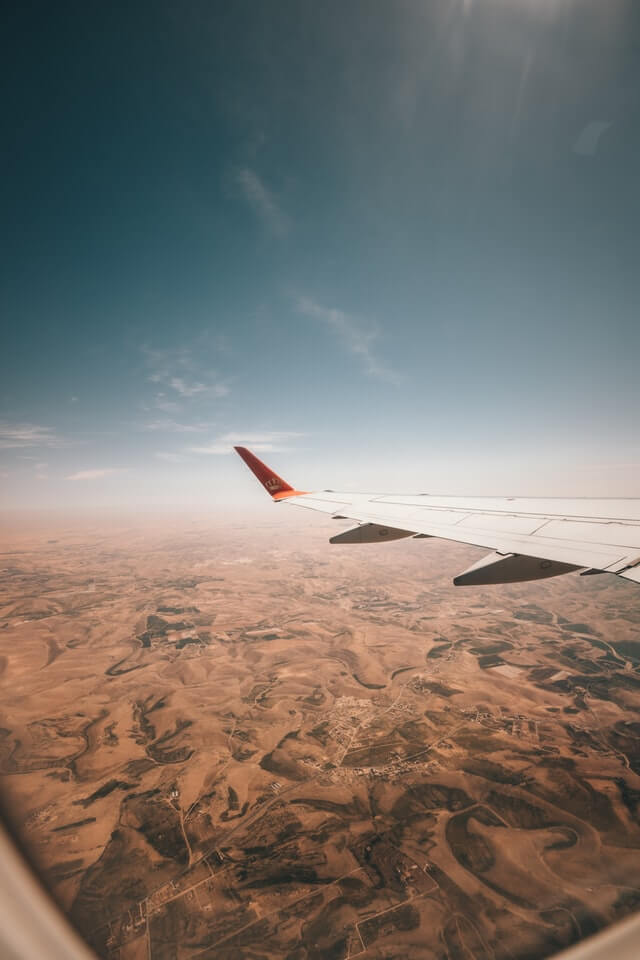
Visas or visa waivers are generally for 3 months, however, the security officers do have the power to reduce (or entirely rescind) the travel allowances on entry. I rocked up looking like a hippy, got asked a couple of questions, and in I went no problems! BUT my passport name is extremely Jewish.
Also, Israeli customs officials no longer stamp your passport due to the complications that having an Israeli stamp can create in many other parts of the world. Now, they print a little piece of paper with your details on it. For the love of Elohim, DO NOT LOSE IT! This is your proof you were legally permitted into the country.
There’s one last thing that also needs mention no matter how contentious it may be. It’s a sad yet evidentially-supported truth of Israel, that racial and ethnic profiling is applied , particularly at the borders. It isn’t just Arabic people either.
I met a German woman with an Islamic last name who was detained for several hours, and, similarly, an English woman of Pakistani descent with an English name (and accent) who was also detained. I also met a Chilean man who was heavily interrogated over his funds for travelling in Israel and was ultimately allowed to only be in the country for two weeks.

Get 15% OFF when you book through our link — and support the site you love so dearly 😉
Booking.com is quickly becoming our go-to for accommodation. From cheap hostels to stylish homestays and nice hotels, they’ve got it all!
Israel really has an excellent public transportation network. Frequent buses and trains connect most cities and towns and even link to some destinations in Palestine. The cost of public transport in Israel isn’t cheap, however, it’s also not nearly as expensive as I expected considering the cost of everything else.
Travelling Israel by Bus and Train
Is mega-easy! Google Maps probably has your back or download the app Moovit (as I did) for an incredibly easy time getting around Israel. It’s actually an Israeli app so it won’t lead you astray, and there’s even an online web-based app too!
You’ll also need a Rav Kav card – Israel’s tap-on-tap-off cashless transit card. You can still catch the train without one, but for buses, you need a Rav Kav card.
There’s a minimum top-up as well as a 5 shekel fee for purchasing the card, but on the plus side, the credit lasts ages . Hold onto your card for your second trip to Israel! You can top-up at train stations, major bus terminals, and select shops.
Outside of that, it’s really simple: first-world fineries on timely transport. The trains and buses in Israel are slick and I never experienced crowded carriages (although I’m sure rush hour is a pain).
But something VERY important thing to keep in mind whilst backpacking Israel is the lack of public transit on Shabbat. Except for some lines in Haifa, there is NO public transportation operating on Shabbat, even to and from the airport. On these days, your choices include hitchhiking, expensive taxis, or you can find a camel.

Oh, and don’t be alarmed by the general feeling of sharp urgency amongst passengers when catching public transport in Israel. As an Israeli man told me…
“You have to catch the train like an Israeli. Push and shove as much as you want, but do it with a smile!”
How to Get Around Palestine
Getting around the West Bank isn’t much more difficult; it just operates on different rules. As I always say to people visiting Palestine, once you step over the border, put your backpacking India cap on.
There are buses running from Jerusalem to a few major destinations in the West Bank including Bethlehem, Hebron, and Ramallah, among others. They’re cheap and slow, but the roads in Palestine are thankfully in good nick (comparative to India anyhow). They do usually wait for the bus to fill up though, so you may want to stick to the faster form of public transport – shared taxis!
Shared taxis, service taxis, or just servees (make sure to really Arab-ify the pronunciation) are faster than the buses and still pretty damn cheap!
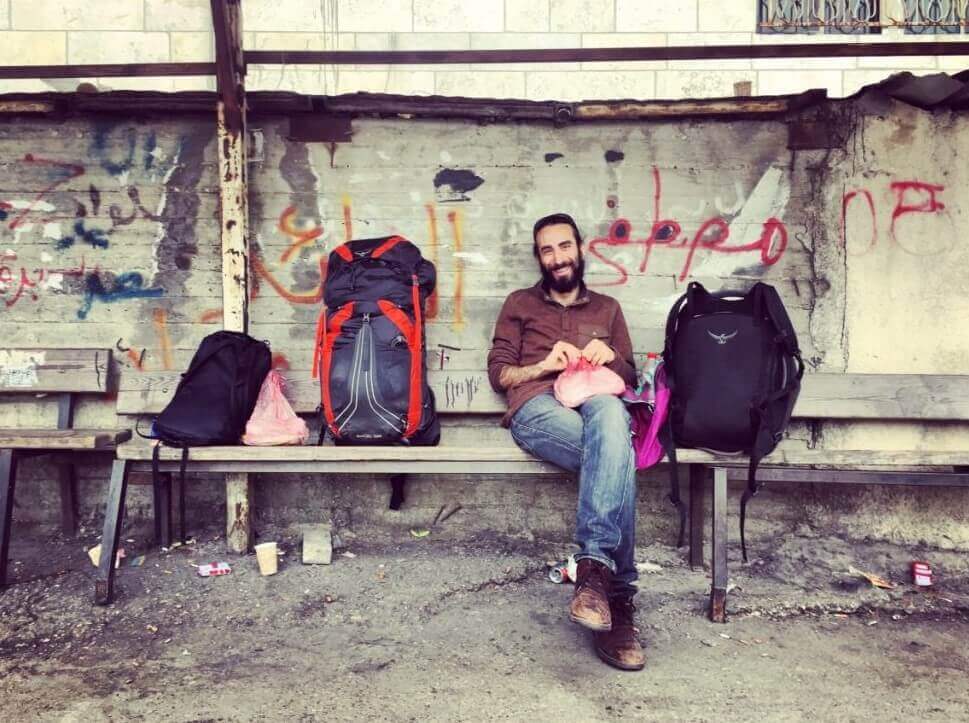
They generally congregate at a shared station in the centre of town and run on fixed prices. Some are nicer looking yellow mini-vans and some are just crappier vehicles with black stripes on them, but if it’s packed to the rafters like a clown car, it’s probably a shared taxi!
You can also flag them down from the side of the road hitchhiker-style. Jump in, pay the man, let everyone else sort out your change. It’s a much more chaotic way to travel than in Israel – particularly when six Palestinians start frothing when a whitey jumps onboard – but in many ways, it’s more fun too!
Hitchhiking in Israel
Hitchhiking in Israel is definitely an option for those who want to save a few bucks on their travel costs. Hell, it’s the BEST way to travel Israel period (in this stingy author’s humble opinion).
Hitchhiking is what taught me how to stop worrying and love Israel. Suddenly, I was travelling again – for real. I was meeting real people and having real conversations about real things while being shown a level of kindness and hospitality that I hadn’t experienced since Japan.
Wait times are not long in the slightest, particularly outside of urban areas (and even in urban areas), and people will certainly go the extra mile to help you out. The rules are pretty simple too:
- Find a decent spot.
- Thumbing it works but pointing at the ground is more widely understood.
- Tracing a sign from the internet (or asking a local to write it) doesn’t go astray.
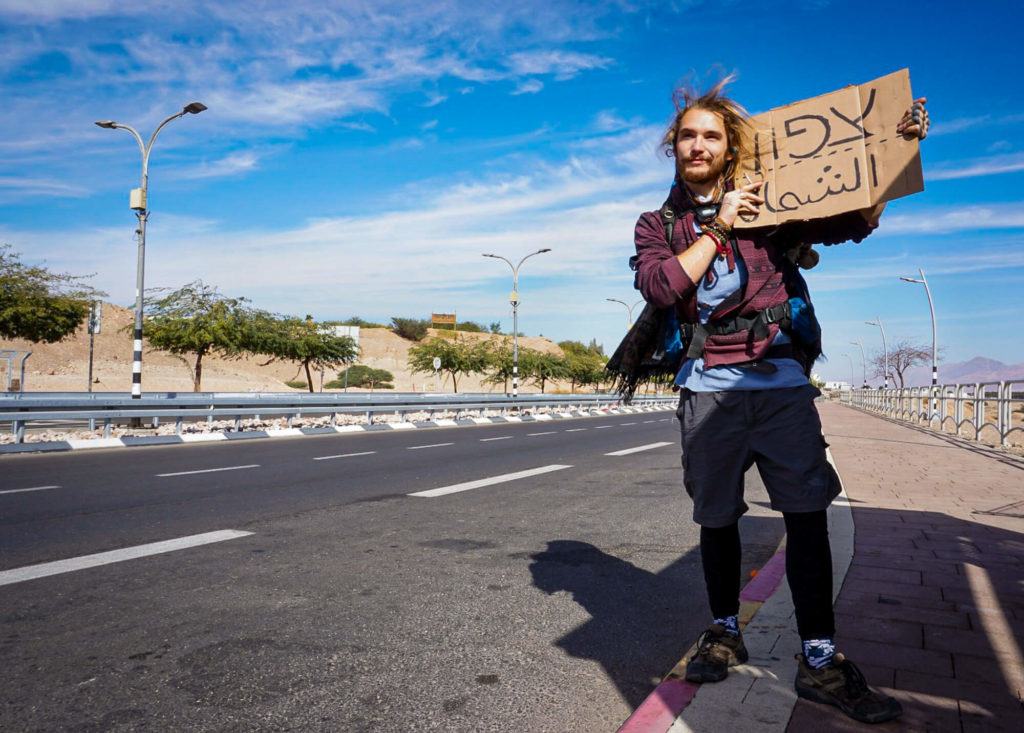
Hitchhiking in Palestine , while hairier, is no less possible. How much hairier? It’s much more akin to the experience of hitchhiking in a developing country i.e. a lot more challenging, a lot slower, and, at times, downright infuriating.
Jewish settlers in the West Bank hitch regularly. You’ll often see queues at trempiada (designated hitchhiking posts) in Jewish areas complete with their own priority queuing etiquette.
Palestinians are known to hitch as well, however, it’s much less common. Racial tensions in Palestine towards illegal Jewish settlers are extremely high and there have even been kidnappings of hitchhiking teenage settlers in the past. As a traveller you’re fine, but it helps to look foreign (or, more specifically, not Jewish).
Also, when hitchhiking in either Palestine or Israel, prepare to talk about the conflict. Your ride may subtly steer the conversation there or they may approach the topic as subtly as a brick hurled towards your face, but chances are people will want to talk about it. Usually, this desire comes from a genuine place of wanting to talk and share their experience.
Have an open mind, be honest but tactful, and above all, listen. No matter where they stand on the subject, you may learn something.
Onwards Travel from Israel
Lo and behold, Israel does not have the best relationships with its neighbours – who’da thunk? Israel has four countries bordering it – Lebanon, Syria, Jordan, and Egypt – and currently, it’s only possible to enter two by land:
- Egypt – Just south of Eilat, you can cross into Taba , a vacation destination perched on the Red Sea. Most nationalities can obtain a permit at the border to visit the Sinai Region , however, to carry on independently to Cairo and the rest of Egypt, you’ll need to pre-obtain a visa for Egypt at the Egyptian embassy in Tel Aviv.
- Jordan – There are actually three border crossings between Israel and Jordan: the King Hussein Bridge Border Crossing , the Jordan River Border Crossing , and the Yitzhak Rabin Border Crossing . Currently, sources suggest the only crossing you can’t get a visa on arrival for Jordan is at the King Hussein Bridge.
I say seemingly because let’s remember this is the Middle East. Borders are volatile, rules change all the time, and often, not even embassies seem to have a clear picture of what’s happening.
So on that note, prepare for a grilling when travelling onwards from Israel, whether it’s by land or air (and from either side of the border). I got a mild shakedown when I left at the airport and they were very interested in what I’d written about Israel and where I’d been. Ears were burning when I mentioned I’d visited Palestine; sometimes, it’s best not to mention these things.
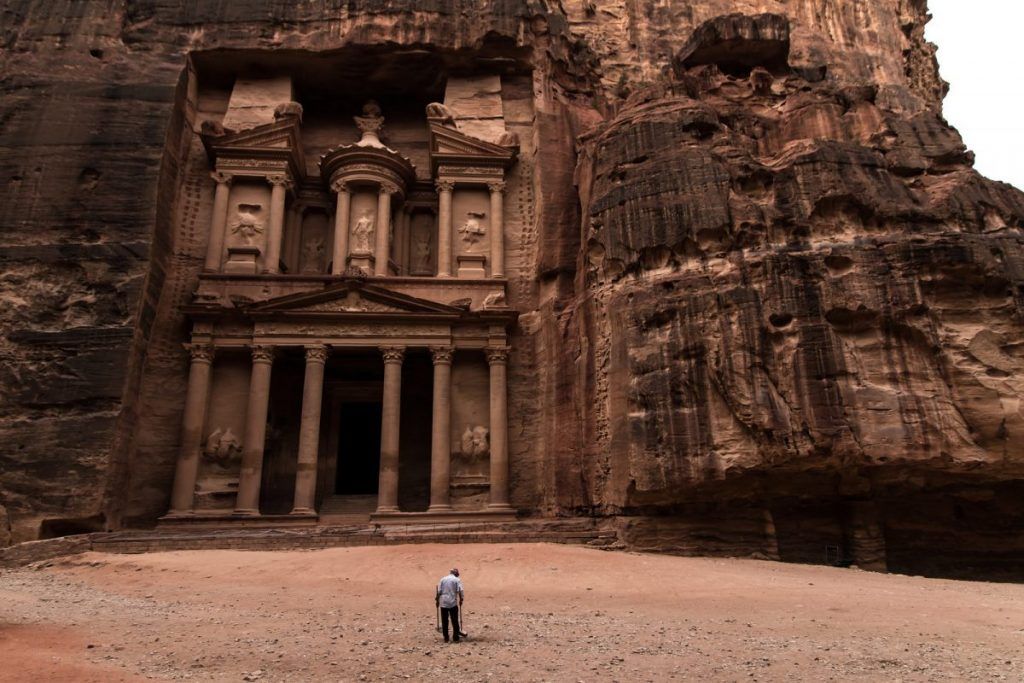
Currently, it’s not possible to travel to Lebanon overland from Israel but it is worth jumping on a flight and spending some time in this beautiful country. The hash is cheaper!
As for Syria. Ehhhhh… Maybe one day.
- Backpacking Jordan Travel Guide
- Backpacking Egypt Travel Guide
It’s not a strong recommendation. It’s not even a light recommendation. Is it a recommendation at all?
The problem with working in Israel is simply that the cost of living is extremely high. Living the digital nomad – unless it’s a lucrative job – is not particularly viable. It’s POSSIBLE, and Tel Aviv is absolutely something of a hub for the kitschy espresso-slamming, skinny-jean-donning millennial-life, but it’s far from an ideal working destination.
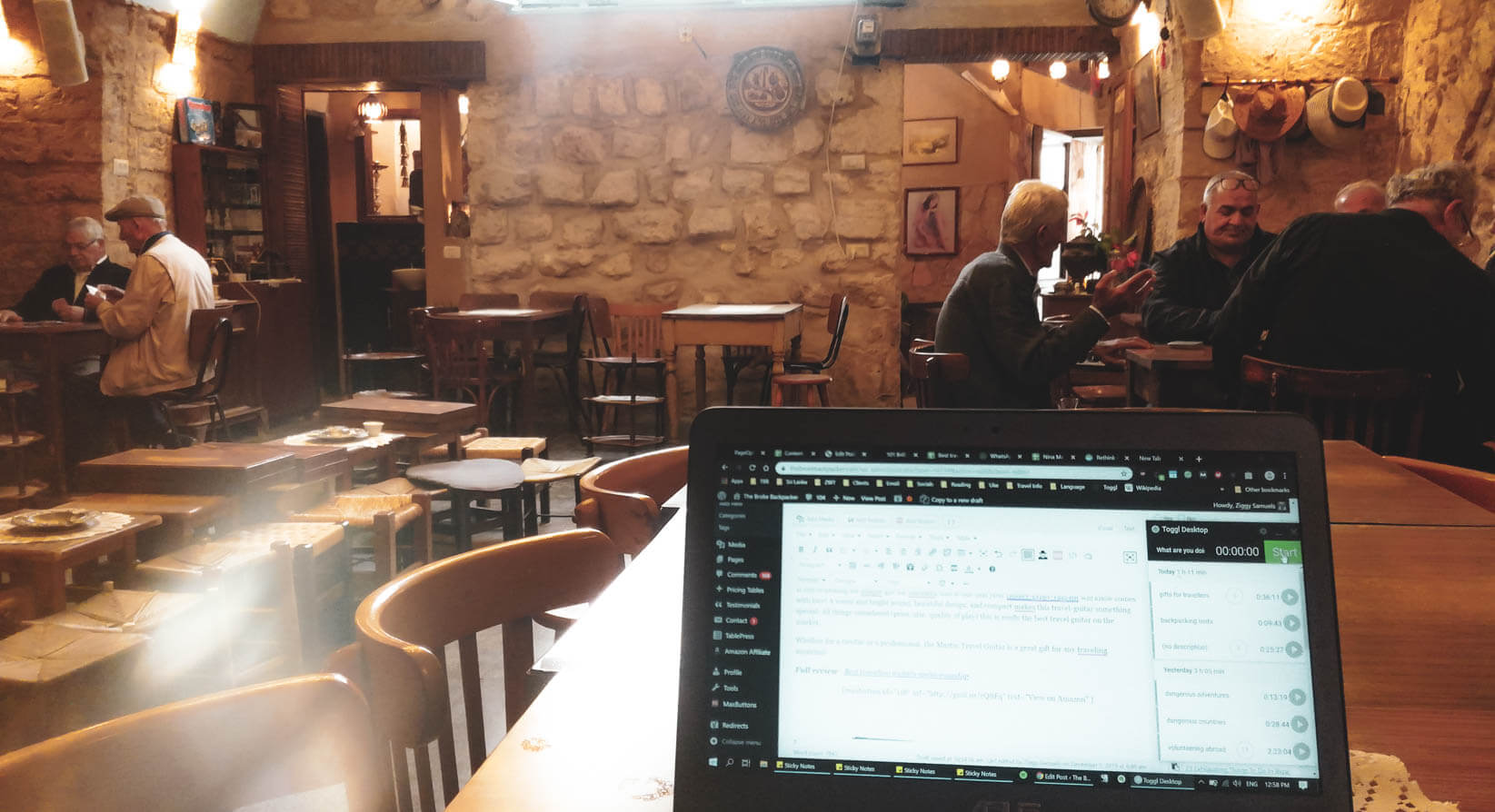
You could also work a regular ol’ day job, however, work permits are given very selectively. Even most Israelis struggle to make ends meet given how low the minimum wage is, and it’s unlikely many places would opt to hire a foreigner over a local anyway.
You still could totally do the digi-nomad thing there; I did for two months! The internet is reliable, free WiFi hotspots are all over cities, and if you buy an Israeli SIM card (but not at the airport – it’s a rip-off), data is plentiful and fairly cheap too (relative to Israel).
It is possible to live cheaper in Israel if you want to work there. The Palestinian areas, in particular, are much more affordable. It’s just not the ideal destination for someone living on a digital nomad’s income.
You’ll be eating a lot of hummus in Israel to stay on top of your travel budget. Which, come to think of it, actually sounds perfect.

A new country, a new contract, a new piece of plastic – booooring. Instead, buy an eSIM!
An eSIM works just like an app: you buy it, you download it, and BOOM! You’re connected the minute you land. It’s that easy.
Is your phone eSIM ready? Read about how e-Sims work or click below to see one of the top eSIM providers on the market and ditch the plastic .
Volunteering in Israel
So what can you do in Israel? Volunteering. Without a shadow of a doubt, volunteering in Israel is an incredibly rewarding experience.
I could write a whole deep dive on the culture of the kibbutzim . Originally founded as communal agricultural communities based on socialist ideals, the kibbutz system has, sadly, changed substantially over the decades.
Still, despite waves of increasing privatisation, kibbutzim (and their less socialistic counterpart, moshavim) have a long -standing tradition of taking in road-weary travellers in exchange for some hard yakka. They are an excellent point of connection for travellers in Israel!
Now, while volunteering platforms such as Workaway make finding gigs in Israel a breeze, it’s also pretty easy to sniff ’em out yourself. Israel has that similar ‘one big village’ mentality that New Zealand does and making one friend in one section of the country can suddenly have you networked to several more opportunities a couple of hundred kilometres away.
I will say that the expectations of volunteers in Israel are pretty skewed relative to other places that I’ve travelled. While most countries expect perhaps 20-25ish hours of work a week, a lot of places in Israel are going to expect closer to full-time hours.
That aside, it’s still an awesome experience. There’s a certain magical element to working at a kibbutz that is hard to find elsewhere in the world. It’s a wonderful little mix of the Asia-style lack-of-personal-space, the Arabic family values, and the communal ideals imported from Eastern Europe with the Jewish people.
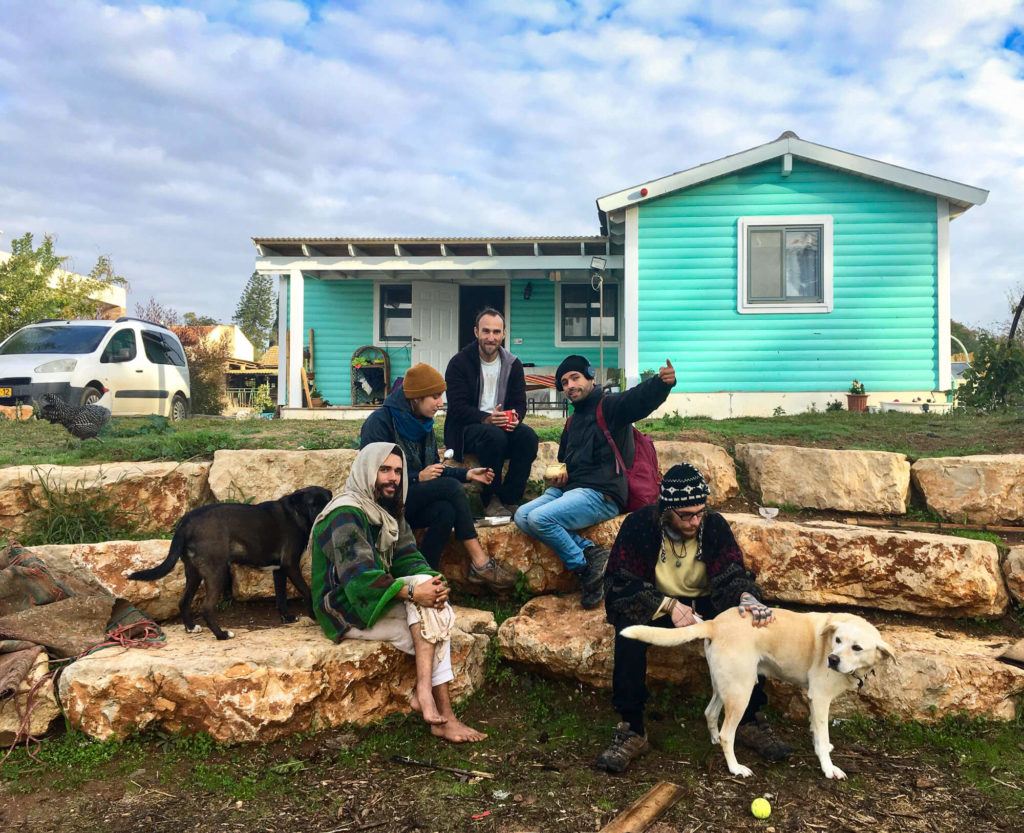
You’re guaranteed to make friends. There’ll be some rad adventures too! And, almost undoubtedly, joints shall be boomed. If you’re interested in volunteering in Israel, joining a cheap platform for volunteering abroad is a fantastic method.
Much like Workaway, Worldpackers is a kickass organisation connecting travellers to meaningful volunteering positions all over the planet. In fact, it’s The Broke Backpacker’s #1 pick of ALL the Workaway alternatives .
Not only do they make the process so much simpler and come stacked with a slew of cool community features, but Broke Backpacker readers also get a sweet discount on the signup fee just by using the code BROKEBACKPACKER ! You can save money when you signup and then you can save money again by skipping the unholy accommodation costs in Israel!

Worldpackers: connecting travellers with meaningful travel experiences.
Backpacking Israel provides the opportunity to taste some of the best food money can buy! Why do you think Israelis carved a hummus trail right through South and Southeast Asia? Because nothing can compare to the food from home.
Why’s it so good? Probably for the same reason the Israeli genepool is so damn seductively beautiful: it’s a supreme mix of the best of everything from right around the world.
Classic Arabian spices (za’atar is my homeboy) and Middle Eastern dishes of the region meet a whole bunch of imported Jewish cuisines that developed independently courtesy of the numerous diasporas. Imported foods, spices, and cooking styles have continuously arrived from North Africa, Eastern Europe, and the Mediterranean regions.
Top this off with numerous other cuisines due to Israel’s high number of refugees as well as the influence of the ever-growing international culinary scene, and it’s safe to say that ‘what to eat in Israel’ is everything you lay your damn eyes on! Put simply, Israelis do not screw around when it comes to food.

Oh, and the agricultural products? Olives, pickles, citrus fruits… it’s all to die for.
Look, ancient history, a vibrant and complex culture, and traditions rooted in the Abrahamic divine – these are all valid reasons to visit Israel. But if you went backpacking in Israel purely for the food alone after eating a shakshuka once in India, well… you wouldn’t be alone.
Popular Israeli Dishes
- Falafel – Deep fried balls made of chickpea and smashed with spices. A street food classic and cheap!
- Shawarma – The 3 A.M. drunk-as-a-skunk kebab is a time-honoured tradition Down Under. You’re looking at the OG kebab. And I’m risking my Australian citizenship here, but they do it better in Israel.
- Hummus – I’m not explaining hummus to you. If you’re uneducated on the matter, two hours in Israel will fix that. Instead, I’ll let ya in on a little local’s secret: at most hummus places, you get a free refill. 😉
- Tahini – Hummus’s little cousin, tahini is made from sesame seeds, is super cheap, super healthy, super delicious, and more necessary to an Israeli’s sustenance than water.
- Shakshuka – A fine dish of eggs poached in a sauce of tomatoes, chilli peppers, and onions, often spiced with cumin. Get an Israeli to teach you how to cook this before you leave. It’s piss-easy and a total anytime meal.
- Bamba – A peanut butter flavoured puff-chip made by people with the munchies for people with the munchies.
Popular Israeli Drinks
- Israeli Wine – Israel is known for producing some fine wines. If you are keen to get some wine tasting in whilst backpacking around Israel, Galilee is the place to do it.
- Arak – The national liquor concoction of Israel. Strong but so damn tasty. A complimentary shot if you eat at the bar in a restaurant is standard too!
- Tubi – It’s a citrus-based beverage and I don’t know what’s in it. Nobody knows; that’s the beauty of tubi! Whatever is in it, it’s delicious (though it may take some getting used to) and will get you wasted in a way that you’ve never quite experienced before.
- Unnamed Purple Juice Box – I forget the name, but I think it’s grape flavoured. It’s a kiddy drink but heaps of Israelis neck ’em like a good brew. If you know the name, please leave a comment; I MUST know!
There are a lot of truly special people in Israel, but in some cases, it doesn’t always come across. Many Israelis – particularly in the metropolitan centre – have a certain manner about them (some would argue rightfully so, given the history) that can come across as cold, rude, or sharp.
While backpacking Israel, I often found underneath that exterior was a lot of genuine warmth and sincere kindness. Think of a roasted marshmallow that you left in the fire too long; once you get underneath the charred outside, it gets all sweet and gooey and delicious. That said, there are also many perfectly roasted marshmallows in Israel too.

It would, however, be disingenuous to suggest that there are only Israelis in Israel. There are a large number of Arabic people too. While many are Israeli-Arabs (and some are even Jewish), there are also Christians , Muslims , many people who would not refer to themselves as “Israeli” , and, of course, the Palestinians .
There is also a number of Bedouin tribes living in Israel, an ancient nomadic Arabic people. Some have taken to neighbourhoods offered by the Israeli government, but many still live in a nomadic style throughout various shanty towns across the country.
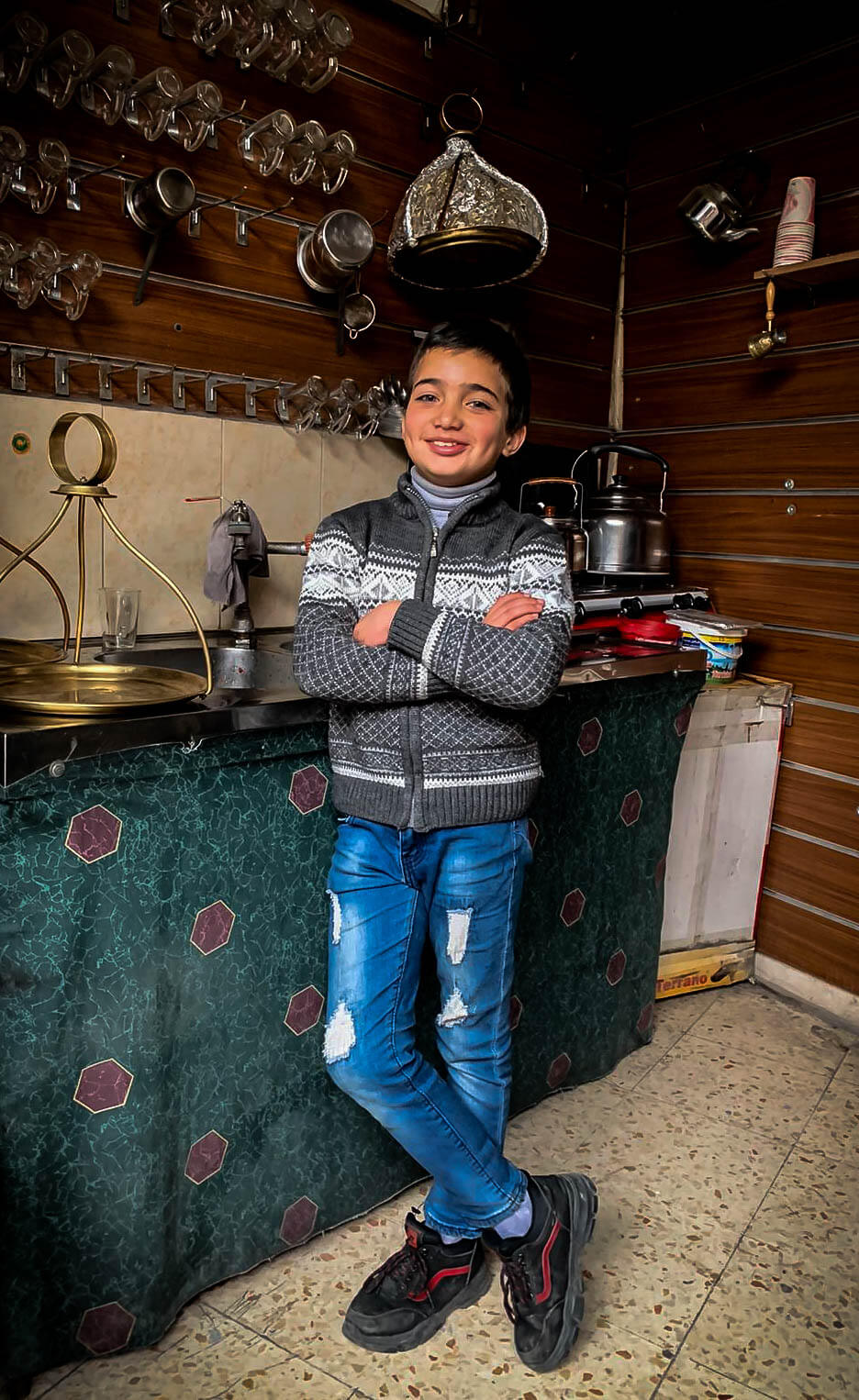
Then, there are the Druze people, Arabic in their own right, but also possessing a very unique culture. Many Druze possess Israeli citizenship, however, there are also many Syrian-Druze living in the occupied area of the Golan.
Lastly, Israel has a long history of migration. Primarily, Jews from right around the world seeking to make Aliyah (return/ascend to Israel). It’s this process of a near-century-long migration that lends itself to Israel’s deep multi-culturalism.
Western and Eastern Europe, West Asia, North Africa and beyond, plenty of Jewish Americanos, and an ungodly number of Russians all make the pilgrimage to the land they believe to be their promised home. Non-Jewish refugees regularly arrive seeking asylum, there are cheap labourers brought in from right around Asia, and even people of Jewish descent from places you’d never expect like Ethiopia or India.
As you may have noticed, Israel is one hell of a melting pot. What are all these people like? Well, that’s a separate thesis altogether so instead, I guess you’ll have to get out there and find out for yourself! I’ll give you a hint though: they’re all complicated – they’re people.
Useful Travel Phrases for Israel
While Hebrew is the official language of Israel, roughly 20% of the population – the Arab Christians and Muslims – speak Arabic. Once you incorporate Israelis that speaks some Arabic, that figure climbs higher.
English is also plenty common, particularly with younger Israelis. While learning a new language for travel is always a blast, Hebrew is not the strongest recommendation.

It’s a stupidly difficult language and most Israelis will switch to English the moment they realise you’re foreign regardless. Attempting to fumble your way through Hebrew can often just be ill-received as ‘wasting time’ .
Truthfully, though it’s less fun, the best way to travel Israel is simply coasting by on the Hebrew phrase for “In English, please?” (listed down below). I found it to be the most favourable and polite way to switch the conversation into English when someone starts speaking to you in Hebrew (i.e. all the time) with a much warmer reception.
Here are a few useful phrases in Hebrew AND Arabic for your backpacking Israel adventure. You’re gonna meet Arabs too, and they really do appreciate the effort:
- Hello – Shalom*
- Have a nice day – Yom tov
- Please/You’re Welcome – Bevakasha
- Yes/No – Ken/Lo
- Thank you (very much) – Toda (raba)
- I don’t speak Hebrew – Ani lo medaber Ivrit
- In English, please – Ba Anglit, bevakasha
- Let’s go/hurry/hell yeah/roger – Yalla
- Hello – A salaam alaikum**
- Bye – Maa salame
- You’re Welcome – Afwan
- Yes/No – Naam or aiwa (in response)/La
- Thank you (very much) – Shukran (kteer)
- What is your name? – Sho esmak?/Sho esmek? (For men/women)
- Darling – Habibi/habibti (for men/women)***
*Directly translates as “peace”. **Directly translates as “peace be upon you”. ***Habibi is a fantastic casual term of endearment but don’t cross the genders. Men say it to men and women to women.
Books to Read About Israel
If you wanna read up on the country before visiting Israel, there are entire archives on the topic. Of course, there are the classic traveller reads too, but the only thing more complex than quantum mechanics is the history of Israel!
- Six days of War – Though it lasted for only six days, the 1967 Arab-Israeli war never really ended. Every crisis that has ripped through this region in the ensuing decades is a direct consequence of those six days of fighting. Michael B. Orena’s comprehensive account of this epoch-making event is an internationally acclaimed bestseller for good reason.
- I Shall Not Hate – Heart-breaking, hopeful, and horrifying, I Shall Not Hate is a Palestinian doctor’s inspiring account of his extraordinary life, growing up in poverty but determined to treat his patients in Gaza and Israel regardless of their ethnic origin.
- Khirbet Khizeh – A classic (if controversial) piece in Hebrew literature, this 1949 novella is penned by S. Yizhar, a soldier in the 1948 Arab-Israeli war. It’s an easy read for its length but not so much for its gutwrenching recount of a soldier’s point-of-view on the brutality of that war.
- The Ethnic Cleansing of Palestine – Authored by a New Historian , this historical text is both a harrowing account of the expulsion of the Palestinian people as well a challenge to the mainstream official account of the Nakba (Palestine War) lasting from 1947-1949.
- Sapiens: A Brief History of Humankind – Not about Israel but written by a very respected Israeli public intellectual – Yuval Noah Harari. Sapiens (and its successive titles) are absolute smash-hits with travellers worldwide. A timeless read!
A Brief History of Israel
I can’t even begin to condense Israel’s archaic past. Israel’s ancient history spreads into times long gone and mixes historical accuracy with biblical narrative. Conquests, exoduses, ancient kings, and the divine presence of God all intertwine into the story of Israel’s past.
It’s these biblical components that largely underpin Israel’s claim to the region, and, in many ways, the conflicts that define it now. The ever-shifting borders of Israel have always been fraught with conflict: the only difference from then to now is that our guns got bigger.

May 14th, 1948 – the day that David Ben-Gurion officially established the state of Israel with the recognition of the US president Harry S. Truman and the Soviet leader Joseph Stalin. That is the birth of the country we now recognise as the State of Israel in modern times.
The following morning on May 15th, 1948, a newly-formed coalition consisting of the Arab states of Egypt, Syria, Lebanon, Iraq, and Transjordan (Jordan) marched their forces into the region now dubbed “Israel” . They opposed the UN partition plan for the region of Palestine in the conflict we now know as the First Arab-Israeli War .
Large numbers of Jewish immigrants, many of them World War II veterans and Holocaust survivors, resumed a life of conflict. In many ways, this conflict never ended – it just bled into new ones.
Throughout modern times, Israel has seen a timeline marked by active warfare and lulled instability. Major events include…
- The Six-Day War of 1967
- The Yom Kippur War of 1973
- The Invasion of Lebanon in 1982
- The First Palestinian Intifada (Uprising) of 1987
And that doesn’t even encapsulate everything
Since the First Intifada, things really haven’t gotten much better. There have been more uprisings, peace talks, expansions into Palestinian territory deemed illegal by most of the international community, and an uncountable loss of life for both sides. War atrocities have been frequently committed with Palestinian civilians and adolescents targeted as well as Jewish settlers within the West Bank and, of course, the deaths of both Israeli and Palestinian soldiers.
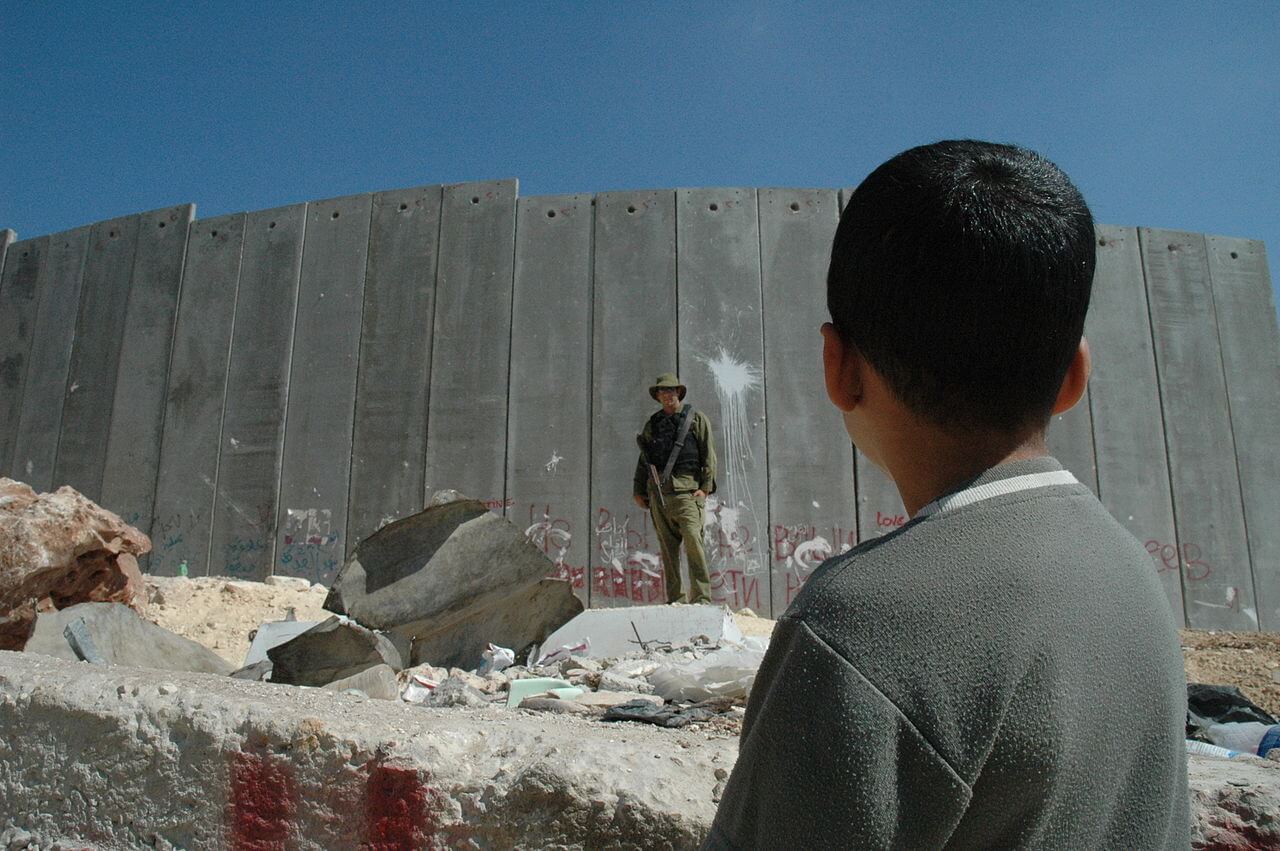
The constant interference from despots such as Trump and Putin has not helped as well as the seemingly unending regime of the Israeli Prime Minister Benjamin Netanyahu, a man indicted on numerous corruption charges.
2020, Netanyahu’s corruption, and the coronavirus pandemic has led to a massive shift in the narrative of Israel; numerous Israelis – particularly of younger generations – are now beginning to strengthen and unite through political demonstrations. How this plays out remains to be seen, but what can be said is that in the greater scope of Israel, its position in the Middle East, and the Israeli-Palestinian Conflict, nobody wins.
This was not an easy travel guide to write – splitting Israel apart for dissection is much like splitting the atom. The quantum complexities just keep coming.
And, in many ways, that’s what makes Israel – and the Israeli people – so beautiful. It’s in the darkness that the light shines brightest.
When you’re backpacking around Israel, remember to enjoy it. Remember that no matter where you fall on the political spectrum, there is a level of understanding you can never have. Because you’re not Palestinian and you’re not Israeli and true empathy comes from shared experience.
So, if I could give one piece of advice… One final travel tip for Israel to myself from way back before I even landed in the country, it would be to take a chill pill and remember to enjoy it.
Yeah, it hurt. And yeah it permanently shaped my worldview and my relationship with travel itself.
But guess what? So it bloody well should! We all gotta grow up sometime, and some of us have to grow up a lot sooner.
So please, travel to Israel. Have an amazing experience in a deeply flawed yet captivatingly beautful land. And find your own truth.
And on the days that it’s all just getting a bit too much to handle, roll up a doobie, grab a falafel, and go find a kitty to pat. Sometimes, it’s the smallest things that make travel so grand.
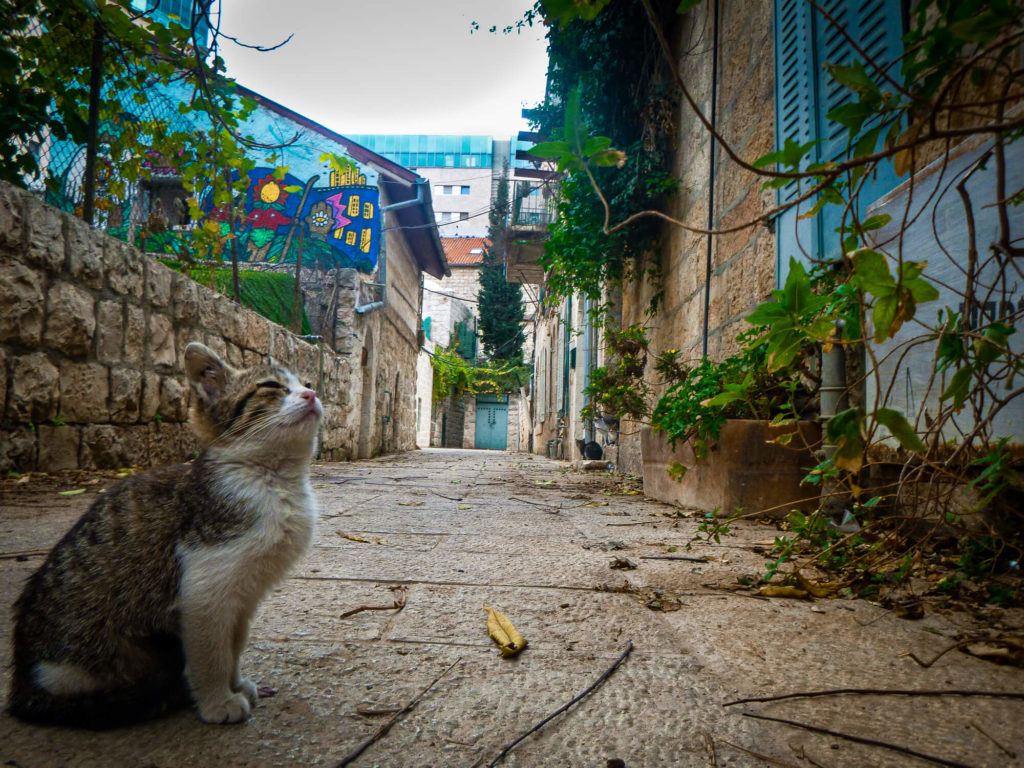
And for transparency’s sake, please know that some of the links in our content are affiliate links . That means that if you book your accommodation, buy your gear, or sort your insurance through our link, we earn a small commission (at no extra cost to you). That said, we only link to the gear we trust and never recommend services we don’t believe are up to scratch. Again, thank you!
Ziggy Samuels

Share or save this post

Hey does anybody have any recent info about metzoke dragot? is it still possible to just go there and camp for a night?
Hey man, I was in Israel recently and from what I heard, it’s still the place everyone goes for camping by the Dead Sea. Other then that, you’ll definitely be able to find more sweet spots in the south area of the Dead Sea.
Great article! as an Israeli, I feel like you know my country better than I do (: My tip – don’t miss Haifa’s downtown old neighborhoods, especially Wadi Salib and Wadi Nisnas.
Hi How long did you go for and how do you get into Palestine? Is there any border stops or can you just walk in? Also we have just over 4 weeks do you think that will be enough.
You cannot just walk in… You are crossing the border. 4 weeks is plenty of time to visit Israel and Palestine.
Leave a Reply Cancel reply
Your email address will not be published. Required fields are marked *
Save my name, email, and website in this browser for the next time I comment.
Notify me of followup comments via e-mail.

Can you travel around Israel on a budget? YES, and here’s how!
Ahh, the question every potential traveller to Israel wants to know – can you travel around Israel on a budget?
Hopping from Asia to Israel last fall was like a slap in the face. Before arriving I knew the prices would be a lot higher than what I had become accustomed to in places like Cambodia, Vietnam and Thailand, however, I still experienced sticker shock.
The prices in Jerusalem were on par with what you would expect to pay in Scandinavia (exorbitant!), and in places like Tel Aviv, they were closer to what you’d pay in Western Europe or North America (not cheap).

I think the key to travelling around Israel on a budget is coming to terms with the fact that you are going to have to dish out more cash than you would on the average trip , and then trying to be wise with your shekels and stretching them as much as possible.
My daily budget in Israel was anywhere between $75-150 USD per day (depending on whether I was doing any tours) .
Here’s a little rundown of what a trip like mine might cost you:
How to do Israel on a budget
Accommodations.
Accommodations will be, by far, the biggest expense of the whole trip. I stayed in a mixture of hostels, inns and hotels, and I was fortunate enough that all of these places had breakfast included – one less meal to pay for.
If you’re passing through Jerusalem, Nazareth or Tel Aviv, here are some places to consider:

Abraham Hostel, Jerusalem
What I loved about this hostel is that it wasn’t just a place for twenty-something backpackers. There were young adults travelling with their parents, families travelling with young children, and even seniors touring the Holy Land. All of them were looking for a budget-friendly option in the city , and this resulted in a really cool communal feel that felt like a big international family .
Abraham Hostel had a range of rooms from dorms to family rooms to private rooms. To give you a better idea of the rates, it was 79 ILS ($22 USD) for a bed in a 10 people dorm, 290 ILS ($82 USD) for an economy double room, and 580 ILS ($164 USD) for a 5-bed family room. I assure you that in Jerusalem, that is a bargain!!! And if that were not enough, Abraham Hostel was also recently voted the 5th best extra-large hostel in the world!
It’s worth noting that Abraham Hostel also offers free accommodations if you are willing to volunteer for a minimum of 6 weeks. If you’re planning on an extended stay in Jerusalem and you can offer 5-6 hours a day for 5 days a week, that could really cut down your accommodation costs .
View rates for Abraham Hostel in Jerusalem.

Fauzi Azar Inn, Nazareth
The Fauzi Azar Inn was one of the most unique places I have ever stayed in. This 200-year-old Arab mansion located in the heart of the Old City of Nazareth made my stay in the city all the more special. The setting was perfectly serene and there were days when I just wanted to sit in the garden listening to the trickle of the water fountain with a novel in hand. The place had a very homey feel, and this was further accentuated by the free tea and home-baked cakes available ALL DAY LONG!
You might think you can’t afford to stay at a fancy mansion if you’re on a budget , but Fauzi Azar Inn catered to all budgets with both private rooms and dorm rooms. Room rates ranged from 90 ILS ($25 USD) for a bed in a 10 person dorm to 330 ILS ($93 USD) for a private double room. So there you have, y ou can stay at a mansion and not break the bank!
View rates at Fauzi Azar Inn in Nazareth.

Gordon Inn, Tel Aviv
This little place really turned out to be a gem of a find. It was located in a residential neighbourhood that was outside the city centre, yet it was conveniently 2 blocks away from the beach – score!
Its location meant I could easily take the public bus into town in the mornings and then spend my afternoon sunning on the Mediterranean .
The rooms were very light and breezy, all the linens and the furnishings were white, and they also had a little mini-fridge which meant I was able to do some groceries down the street and buy a few items for a do-it-yourself meal (fresh bread, cheese, deli meats, and a few ice cold beers for the boys).
The Gordon Inn was also a really short walk to one of my favourite restaurants in town – Café Hilinka . Just when I was starting to think that Israeli food was all the same, this little café surprised me with its modern twist on classic dishes . Want a grilled cheese sandwich? How about a grilled goat cheese sandwich with sun-dried tomatoes and pesto instead? I visited this place several times during my stay.
Overall, at 300 ILS ($85 USD) a night for a double room with a private ensuite or 85 ILS ($24 USD) for a bed in a 7 person dorm, I thought the Gordon Inn was a bargain for a city like Tel Aviv.
View rates at Gordon Inn or Abraham Hostel in Tel Aviv .
Easy day trips around Israel
While in Israel the majority of my sightseeing was done with Abraham Tours . I wanted to make the most of my 10 days in the country, so having an experienced driver and guide to take me around and explain the significance of the places I was visiting made a lot of sense.
I took several tours while I was there, but I wanted to highlight some of my favourites and also show you that you can do them on a budget:

Best of the West Bank Tour
While it’s impossible to even begin to comprehend the complexities of the West Bank/Palestine on a 1-day tour, I felt it was important to go and see it for myself.
One of my fondest memories of the day was walking through a local neighbourhood right by the dividing wall – my dad was with me and he somehow ended up befriending a Palestinian man along the way. Neither really spoke the other’s language, yet something happened; they stopped to shake hands, said their names and their place of origin (Argentina and Palestine), and they warmly smiled at each other. I know it sounds so simple, but their handshake was one of acknowledgement and acceptance. It was a handshake that said ‘I know you’re here on the other side, you are not forgotten’, and one that echoed ‘thank you for visiting and trying to understand’.
What I took away from the trip wasn’t a political agenda, rather a small glimpse at a very warm and welcoming people .
Price: 360 ILS ($100 USD)

Dead Sea Chill Out Tour
I honestly felt like a pretty lucky girl because this was my 3 rd time venturing to the Dead Sea in the span of 2 months. My first time I visited at Mineral Beach on the Israeli side, the second time I got to take a dip on the Jordanian side at the Kempinski Ishtar, and the third time I got to visit another private beach that trumped the 2 former ones with the amount of black mud all around. Like the name suggests, this was a very relaxed tour and we finished the day off at sunset with cups of mint tea and sweet dates in hand.
Price: 150 ILS ($42.50 USD)

Meet the Orthodox Jews
I know this sounds like a rather unusual name for a tour; I too was a bit perplexed by it – “Umm, what kind of setting are we doing this in?” – but it was a lot more casual than it sounds. Basically, this tour was an opportunity to learn about the cultural and religious diversity of the Orthodox Jews.
We were met by a member of the local Orthodox community in Jerusalem, and together we set out to explore the neighbourhood while learning a little bit about their lifestyle along the way.
We stopped at a synagogue, visited a bakery and learned about kosher cooking, we went to a Hasidic library for a look at Jewish texts and artifacts, and then we finished off the day at our guide’s home, where we enjoyed a beverage while she talked about family roles, the community, and her people’s legacy. It was a bit unusual in the sense that it’s not your average sightseeing tour, but I appreciated the opportunity to ask lots of questions along the way (because I had lots!)
For someone like me who knew very little about the Orthodox Jews and their belief system, this was a really interesting way to spend the evening.
Price: 130 ILS ($37 USD)
Here are a few more ideas of easy days trip around Israel .
Free walking tours
Walking tours are a great way to get to know a new city, and when they’re free it’s all the better! (Of course, technically you are expected to give your guide a little tip at the end of the day, however, this sum is at your own discretion.)

If a walking tour isn’t available in the city you are visiting , you can easily create your own. All you need to do is pick up a good map (these are often free at your guesthouse), choose a few places that interest you, and set out for a day of wandering and exploring.
What to eat in Israel?
When it comes to dining, I found that eating out was relatively affordable depending on the type of cuisine. I opted for small restaurants specializing in Middle Eastern food , however, if you’re in the mood for international flavours, that’s going to cost you a little more.

My idea of a budget lunch included a mix of the following: homemade hummus with fresh pita (a must when in the Middle East!), tabbouleh (a refreshing salad made with tomatoes, parsley, bulgur, mint, onions, garlic, and lemon juice), shakshouka with a loaf of bread (a nice dip of tomato sauce with eggs cooked overtop), or a pita wrap with falafel. For dessert I usually opted for a plate of knaffe (a cheese pastry soaked in sweet syrup), or malabi (a sweet milk pudding).
This usually kept my meal anywhere between 25-42 ILS ($7-12 USD).
Transportation around Israel
What you need to keep in mind before you even start thinking about transportation in Israel is that the Sabbath plays a very important role here , and that means certain modes of transportation completely shut down when the sun begins to go down on a Friday afternoon .
If you’re catching a flight Friday night or Saturday morning, don’t take your chances thinking you might be able to flag a cab down on the street. Book your transportation ahead of time!

Now here’s a look at some of the different ways to get around:
The sherut is a large minivan that acts as a shared taxi. You can take it within a city (where it acts a lot like a public bus but on a smaller scale), from city to city (which is a lot cheaper than taking a taxi), or you can catch them from the airport into Jerusalem. The nice thing about taking a sherut is that it doesn’t just stop at designated bus stops; you can literally hail it down anywhere in town and if the driver has room he will stop for you.
Taxis were not cheap, however, since I was travelling with Sam and both my parents, it was easier on the wallet because we were splitting the costs. Just to give you an idea of the rates you can expect to pay, a taxi ride from Nazareth to Tel Aviv can cost upwards of 500 ILS ($140 USD), and that’s for a ride that is just a little over an hour. Taking the taxis within Jerusalem also proved to be quite pricey. We usually ended up paying over 100 ILS (around $30 USD) to get across town, which meant we actually ended up walking a lot.
The train is very modern and effective, however, it was a tricky mode of transportation to navigate as a foreigner since hardly anything was printed in English. I remember trying to catch the train to the airport in Tel Aviv and my ticket was printed in Hebrew and all the signs at the station were also in Hebrew . I had to ask for help several times to even find the right platform and even so I ended up missing my train . If you go with this option, just give yourself plenty of time to find your way around.
Flo Shuttle
The Flo Shuttle is a new service that can help get you from Ben Gurion Airpot to Tel Aviv on a budget. The shuttle leaves every hour and the current rate is $17 per person. Just keep in mind that you need to prebook in advance. Their service is available 7 days a week, including during Shabbat.
These are just some of the methods I used to get around Israel. For more information on transportation around Israel, you can click here .
Thoughts on visiting Israel on a budget
– Choose a hotel where breakfast is included in the price.
– Keep in mind that even nicer inns and guesthouses may have budget rooms in the form of dorms (like that 200-year-old mansion did!) Also, consider staying outside the centre of town.
– Join free walking tours whenever possible (but still leave a tip at the end).
– Be willing to splurge on a few day trips that interest you. You came all the way here, so you should get to visit the places you’ve been dreaming about!
– Eat what the locals are eating. The local cuisine is always going to be cheaper than international fare.
– Opt for shared or public transport whenever possible.
Have you done Israel on a budget? How did you help keep the costs down?
33 Comments
It’s so funny reading this because Isreal was your shock from Thailand, while Thailand was my shock from India! lol. Granted I went to the popular islands which were a lot higher, but after being in India for a year before, I was baffled at seeing 9 dollar sunscreen and such expensive lodging (15 or so dollar huts). My friends I met in Thailand that had come from the U.S. kept saying “it’s so cheap!” and I’m like “nooo, India is cheap!” to keep costs down, I do like you and try to find somewhere that offers breakfast.
That’s so funny! For me it was the same way with Hong Kong. Prior to flying out to Israel I thought Hong Kong was pretty pricey ($40 for a cramped room in a rundown building – outrageous!), but by the time I flew back I had no problem paying that sum – I actually thought it was a bargain. It’s funny how our perception changes depending on where we are… And I agree, you can’t beat India’s prices!
As an American who speaks and reads Hebrew with relative ease, I never thought about it before, but I can totally see Israel as being impossible for non-speakers! Not to mention that outside of major cities few people even speak English. It actually reminds me of Thailand, a bit. Not much English on signs there either. Ah, the joys of being an international traveler… Well, I hope the train station people were nice about the missed train at least! (Though, unfortunately, I doubt it…)
It was a bit tricky with the language in the smaller cities and towns, but in the big cities like Tel Aviv and Jerusalem pretty much everyone spoke English. I think in part this is because they are very international cities – I met many Americans, French, and Brits who had moved to Israel to explore their roots.
Interesting post! I’d love to go to Israel and those tours sound neat. I’ve been to the Jordanian side of the Dead Sea and loved it so would definitely go for that again – it is such an unreal experience.
Oh yes! The Dead Sea is a lot of fun! I wouldn’t mind floating the afternoon away with a book in hand right about now. 😉
Make sure to tie your foot to a rock on the shore or you might find yourself floating to Jordan :-). Actually happened.
Oh, you have won me over. I absolutely have to go to Israel someday, write a book about it or something. It has been something I’ve wanted to do, but seeing your pictures and all the things you shared, I’ve just revving now. Good grief. And I have no idea when I’ll be able to shlep out the door for the airport.
I hope you get to visit soon, Elora! There really is so much to see and do in the country. Even after 2 visits, there are so many places I still want to get to.
Good advice as always Audrey. I am SOOOO SUPER LUCKY….. I went on my birthright, which is pretty much a free trip to Israel, because my mother raised me Jewish. Yes, very lucky indeed. I only needed a few bucks for lunch and dinner everyday otherwise, my trip was FREE! I want to go back, but I’ll have to wait until I get some more cash! 🙂
That’s awesome, Nina! That’s a really cool initiative to help people discover their roots. Did you join up with a group of travellers also on their birthright trip, or did you have to travel around solo once you got there? I’m curious as to how a birthright trip works. 🙂
During our RTW, we actually wound up in Jerusalem the day that Hamas military commander, Jabari, was assassinated. That was pretty intense, with rockets being fired at Jerusalem for the first time and air raid sirens going off in the old city. We’d planned on visiting Tel Aviv, but with situation being as tense as it was, we chose to stick it out Jerusalem. We were able to keep our budget down to $115 for both of us, but we didn’t take any tours and mostly stuck to eating falafels and shwarmas, had a private room at Citadel Youth Hostel for about $50.
We are heading to Scandinavia in a week to see the northern lights, and the price of things there has me in shock. Aside from a safari in the Serengeti, I think it’ll be the most expensive place we’ll have visited.
Yikes, sounds like a really bad time to be there! I’m glad you guys were okay. Also, I’m impressed that you guys were able to keep it down to $115 for the 2 of you – that’s some great budgeting on your part! 🙂
Israel might be a little more expensive than some other places to travel, but it was well worth it. It had such a mixture of old world and new world vibe that I just loved! I wish I’d taken the Orthodox tour…sounds great!
I agree! It’s a really fascinating place to visit – there’s so much history everywhere you turn!
Thanks for such a detailed and informative post! That’s somewhere in the Middle East that we would love to visit.
Cooking for yourself is one of the best ways to keep costs down. Also, couch surfing would be good for accommodation.
After last year’s visit I’m even more intrigued by the Middle East. I’d also love to explore the region more thoroughly, but that’s going to take a lot of saving up. 😉
Definitely bookmarking this for future planning. Thank you for all of the amazing tips, Audrey! Also “…free tea and home baked cakes available ALL DAY LONG!” I’M SOLD!
Happy travels 🙂
Thanks, Lauren! I hope you get to visit soon!!! 🙂
This is interesting, I had no idea Israel was so expensive! Thanks for the money-saving tips!
You wrote here some great tips. I didn’t realize that Israel is expensive for travel cause I live there, but I think it’s a special country with intresting history and so many things to do, so it’s worth it. Whenever I travel I really miss the Israeli food. also someone here wrote that almost no one in Israel speaks English and I think he had a bad luck, cause everyone I know speaks English really well, especialy in the big cities!(=
And Palestine?
Hi! I am currently a volunteer at the Fauzi Azar in Nazareth! I’ve found it a great way to travel and save money. Because I am a volunteer, I am also able to do a lot of the Abraham tours for free (provided they’re not full). I’m so glad you enjoyed your stay. Its’ the kind of place you can’t help but fall in love with!
Hi!Pamela… Volunteering seems great to spend time when I will go to Israel… can you give me some tips how to do it? some contacts maybe? It’s my first time so I want to get the most of it! and volunteering is onething I want to do…
WoW! This is great! Thanks Audrey! it will be my first time to go to Israel and your blog helps me to cut budget and save so i could stay longer.. thanks!
Israel is a place that still want to know. It has a lot of history and tradition, and in every corner a surprise. I hope to make this trip.
Can you please share your daily itinerary? Thanks.
Hi Bee, I haven’t written a day-by-day itinerary, but here’s a look at some of the different trips I took around Israel. This might come in handy: http://thatbackpacker.com/day-trip-ideas-around-israel/
Good blog I like your photos, just would have liked more information on Jerusalem. My favorite destination in Israel and I think it is the most popular.
This is fantastic! Glad you shared your experience in Israel! It’s not really known to be a ‘budget destination’ but you did a great job on saving wherever it’s possible. Oh, and wonderful photos, seem like you had real good time!
Great info thanks so much What Christian sites are must see places We will do this on our own in Sept We are seniors now but we were flight attendants for forty years so not afraid of getting out on our own we just need the names of places in Israel that we should see on a low budget
I liked your article until I came to the sentence:”… Just when I was starting to think that Israeli food was all the same…”
Wait what?? Israel food is all the same?
Israel has the most unbelievable mix of dishes. We eat more vegetables and in more combinations and receipts than any other country. Israel breakfast are world renown. Walk into five different homes for lunch or supper (especially on Friday) and you will experience five completely different 4-5 course meals.
The food in Israel, although not cheap, is amazing.
Of course, if you on a budget and resort to three daily meals of Falafel and Hummus, then yes, the food will always be the same.
I’d be going to Israel principally to practice the language. I’ve been learning Modern Hebrew for a couple of years here in London. Therefore I’d be actively avoiding the areas where I take English to be widery spoken, such as Tel Aviv, Jerusalem and other major tourist centres. In fact, I quite fancy a rather “dull” town that few others will voluntarily include in their schedule.
Linguistic purposes are not well served by a short visit. I’m looking to rent a room with a secular family for a few weeks as a minimum. Ideally some language exchange to mitigate costs as I actually taught English professionally in the past so it’s no big issue for me. I can get Hebrew practice in my free time outside the home, or when visitors come to the house.
I can cope with a fish/vegetarian diet at home to avoid issues of kashrut as i could eat meat out if the urge came upon me.
Having said this, it isn’t so easy to find a family to stay with that wants a stranger in their home. I;m particularly interested in Mizrachi, Sephardi, Ethiopian or mixed families rather than Ashkenazi which I know pretty well as my own community. Ideally, a gay/lesbian family would suit me best, provided it’s outside Tel Aviv.
All in all, it’s a pretty big ask though I have often managed it in other countries where I cannot afford to stay in established tourist business.
Your email address will not be published. Required fields are marked *

How to Plan the Perfect Israel Trip (1-3 Week Israel Itinerary)
By: Author Taylor Lorenz
Posted on Last updated: 10/25/2023
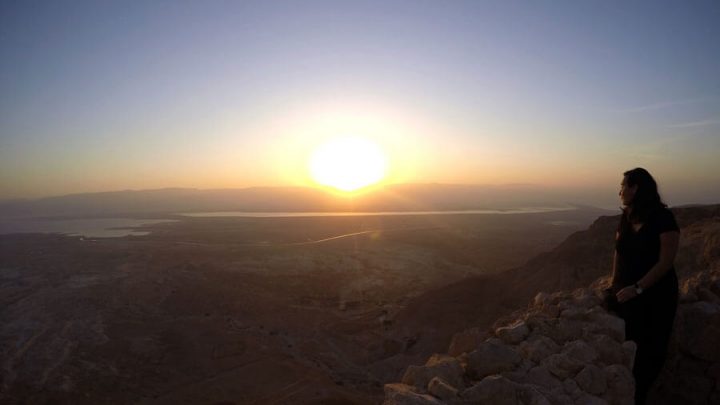
Israel is often seen as dangerous, unknown and is usually not the place that people put on the top of their bucket list. I’m here to shatter those beliefs and to let you know that Israel is actually completely unique yet somehow familiar at the same time.
I believe that an Israel trip is a must for any seasoned traveller.
Picture yourself in the desert, overlooking the Dead Sea, laying on the beach along the Mediterranean coast, taste testing olive oil in the north and standing atop mountains from where you can see Syria.
Israel is packed full of religious monuments, sites and holy places that are important to almost every religion. But it is also a country filled with history, adventure, unique nature and wildlife and epic parties. There is truly something in Israel for everyone.
This Israel travel guide will help you plan the perfect trip to Israel for 1-3 weeks and includes the best places to visit in Israel and Palestine, where to stay in Israel, what to do in Israel and Israel travel tips. By the end of this Israel guide you’ll have your Israel vacation planned.
Some tours, accommodation and transportation mentioned in this post were sponsored by Abraham Tours and Abraham Hostels . As always, all thoughts and opinions are my own.
Table of Contents
Israel Fast Facts
Currency: Israeli shekel (NIS) Languages: Hebrew and Arabic (English is widely spoken in main tourist areas) Population: 8.7 million Religion: Jewish, Muslim and Christian, with some less common faith’s practiced as well
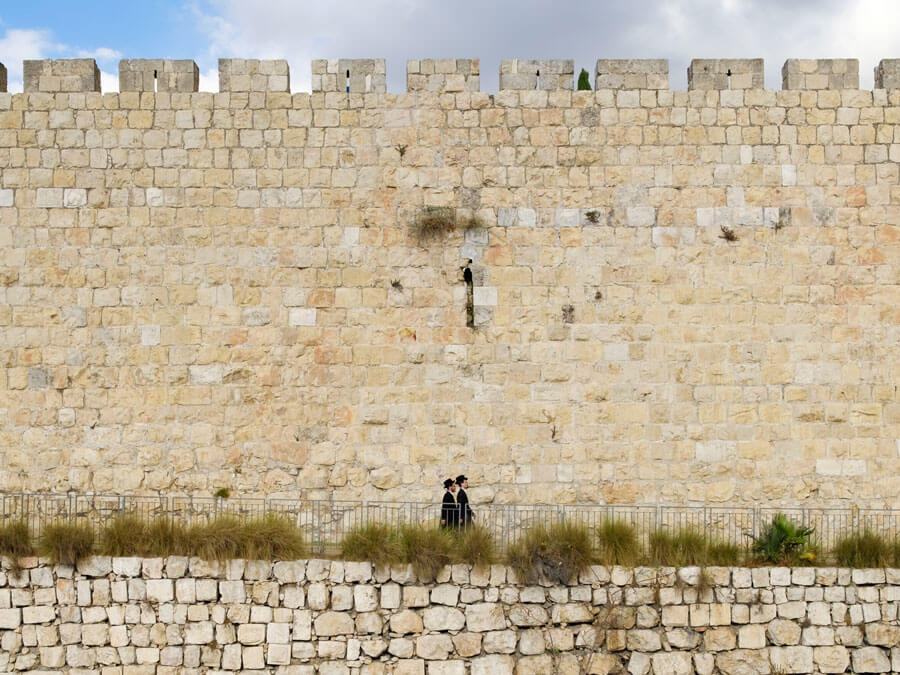
Israel Itinerary
Here’s the tough part, deciding where to go! Pick out which spots above interest you the most and then build around that. Below I recommend some itineraries to help you get started.
I do not include Eilat in these itineraries as many people choose to visit Eilat on it’s own as a place to stay for a week at a resort or to spend time diving. You could easily visit for a couple or few days but plan that it will take you at least half a day of travel to get to Eilat.
Israel Itineraries by Length
1 week in israel (central israel, palestine).
- Day trip to Dead Sea and Masada
- Day trip to West Bank (Palestine)
10 Days in Israel (Central and Northern Israel, Palestine)
- Nazareth or Haifa as base for trips to Golan Heights and Sea of Galilee

2 Weeks in Israel (Central and Northern Israel, Palestine)
- Nazareth of Haifa as base to see Golan Heights, Sea of Galilee, Acre
- Multiple day trip(s) or base yourself in the West Bank (Palestine)
3 Weeks in Israel (Central, Northern and South Israel (or Jordan), Palestine)
- Haifa as base to se Acre
- Nazareth as base to see Golan Heights and Sea of Galilee
- Multiple day trip(s) or base yourself in West Bank (Palestine)
- Spend more leisurely time in places or opt to spend 2-3 days in Jordan or head down to Eilat
Daily Breakdown of My Israel Trip Itinerary
I recommend the minimum amount of time for each destination and longer so you can experience the best things to do in Israel at a leisurely pace or for those with limited time.
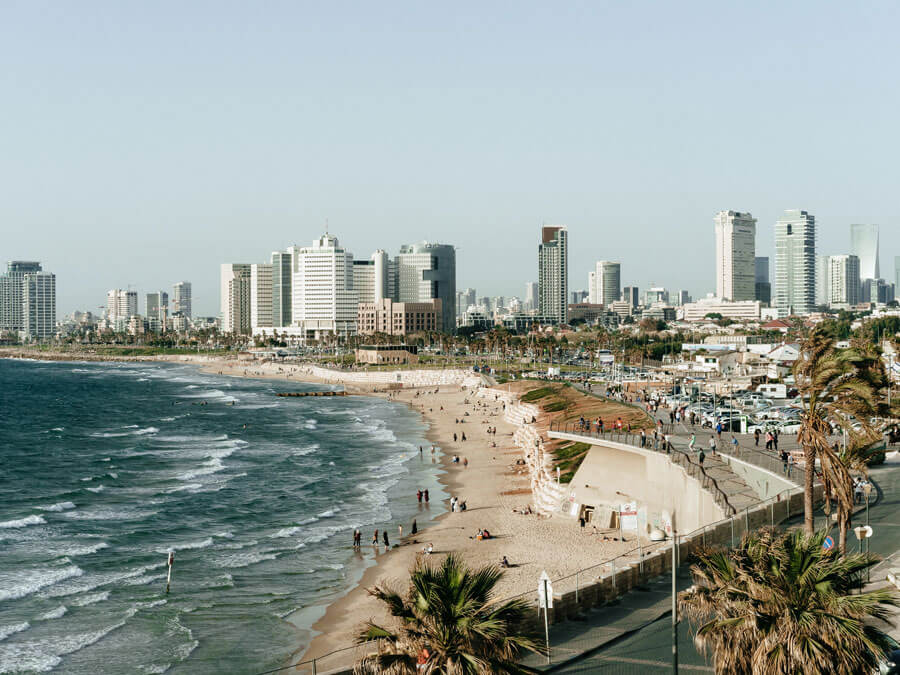
Tel Aviv: 2-4 Days
If you like nightlife then use Tel Aviv as your base, otherwise, I would recommend spending a few days in Tel Aviv to explore Tel Aviv and then moving onto Jerusalem as Tel Aviv is further than many of the Israel tours that leave from both Tel Aviv and Jerusalem.
DAY ONE: Spend your first day relaxing after your travels. Head to the beach and check out the city’s most famous market. The Camel Market and the Nahalat Binyamin Arts and Crafts Market are two of the most popular.
In the evening go on a pub crawl or try doing a self-guided food tour to experience a diverse range of foods in Tel Aviv.
DAY TWO: In the morning take a Tel Aviv walking or bike tour to get to know the city. In the afternoon I recommend roaming around the city some more to see what street art you can find (there are tons). Street art tours are also available and give a great background behind the art and help you find many that are hidden.
DAY THREE: Explore Old Jaffa, which was once it’s own city, by doing the free Old Jaffa walking tour . For the afternoon hit up some more markets, museums or opt to do another food tour (I did a vegan one even though I’m not vegan and loved it).
DAY FOUR: Get cultured, do a half-day trip to visit a Kibbutz . A Kibbutz is a community living together where all income is split equally to all people. It’s a very interesting concept that many people enjoy (though I didn’t personally love the tour).
Another option which is unique is The Other Tel Aviv Tour which takes you to a lesser known neighbourhood and touches on subjects and issues in Israel that often get hidden by the conflict. It’s a very educational experience that also has food!
READ MORE: 13 Cool Things to do in Tel Aviv and 7 Best Day Trips from Tel Aviv
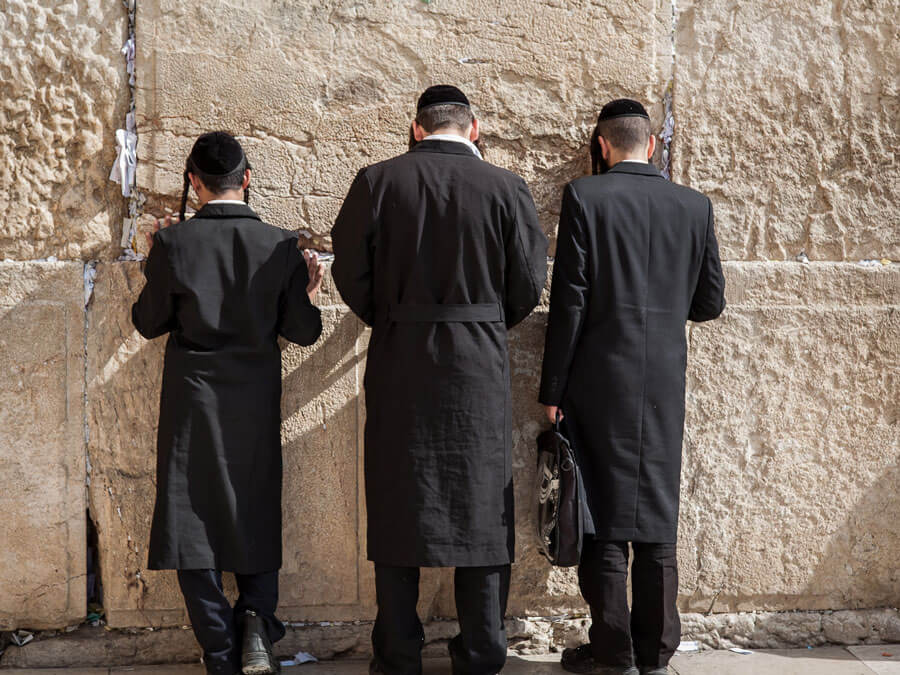
Jerusalem: 3-5 Days
I recommend this long in Jerusalem because there is really a lot to do in the surrounding areas as well as in the city itself.
DAY ONE: Familiarize yourself with the city, join the Holy City tour which gives you an in-depth explanation of many of the city’s most famous sites, the free walking tour or a full-day city tour if you’re limited on time.
DAY TWO: Take a day trip to the Dead Sea! There are day trips that include visiting the Dead Sea, Masada and Ein Gedi so you get to see all three spots in one day. I personally did the sunrise tour which was ideal because you hiked up to Masada in the morning without the sun. A non-sunrise option to all three places is also available.
If you prefer to travel at a more leisurely pace or just want to spend half of the day hanging out at the Dead Sea then choose this chill out option .
In the evening head to the Mahane Yehuda Market to grab dinner (it’s seriously one of the best food markets I’ve ever been to and I went every night I was in Jerusalem).
DAY THREE: Take the day to explore some Jerusalem city sites on your own. Check out Dome of the Rock (a must) if you haven’t already on a tour, go shopping in the Old City market, stop by the Western Wall and go to the Tower of David which also has a light show at night.
Other top spots to visit include Yad Vashem, a Jewish memorial site from the Holocaust, the Israel Museum and the Mount of Olives . Then do a pub crawl !
DAY FOUR: Visit the West Bank (Palestine). One of the best Israel tours I did was the Hebron Dual Narrative Tour through Abraham Tours. I can not recommend it enough. The guides were beyond amazing and it is the tour that I learned the most about Israel and Palestine. If you want to understand these places and the people there is no better tour to take.
DAY FIVE: Take another day to explore a different spot in the West Bank (Palestine). For those limited on time the best option is to take the Best of the West Bank tour . Another option is to explore Bethlehem more in-depth or take a multi-day tour to the West Bank .
READ MORE: 20 Awesome Things to do in Jerusalem and 10 Best Jerusalem Tours and Day Trips
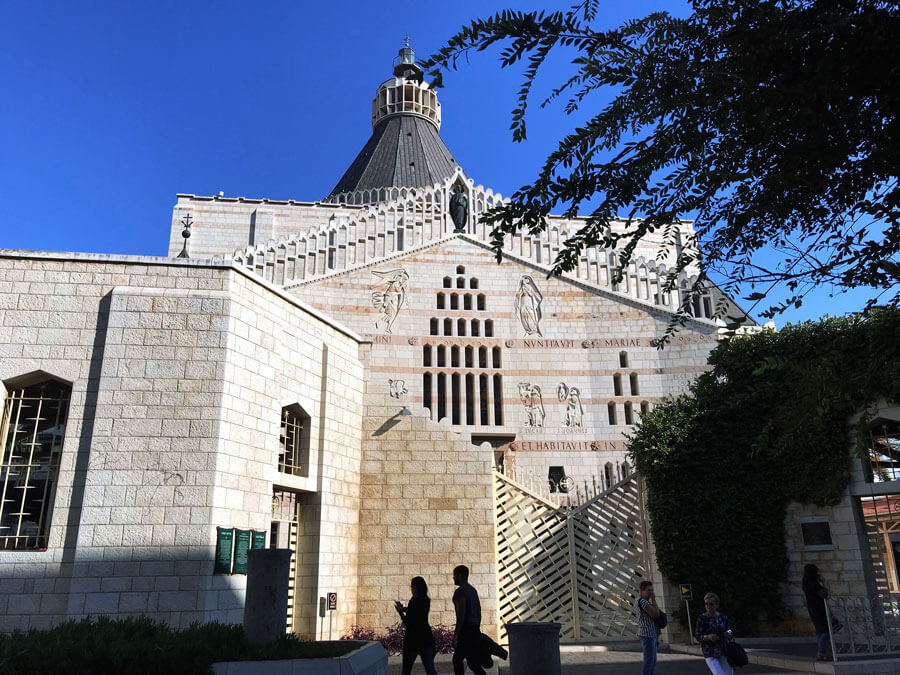
Nazareth: 2-3 Days
I personally used Nazareth as my base for exploring the north of Israel through Abraham Tours. I opted for the Northern Israel 4 Day Package from Tel Aviv which was a great value. I visited Nazareth, Golan Heights, the Sea of Galilee, Haifa, Acre and Rosh Hanikra.
I choose to do the tour because getting around the north can be difficult without a car.
Nazareth itself you really only need a day to visit sites such as Basilica of the Annuication, Mary’s Well and walk part of the Jesus Trail for a pretty sunset view. Your second and third day can be spent visiting Golan Heights and the Sea of Galilee and then Haifa, Acre and Rosh Hanikra .
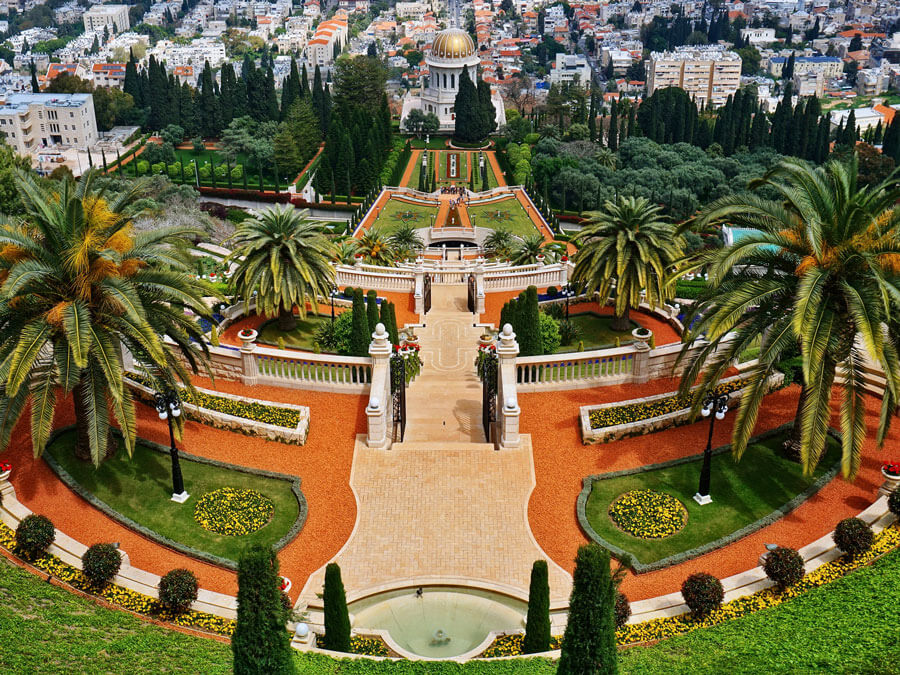
Haifa: 1-2 Days
Haifa is another place that you can base yourself to explore the north of Israel but I only recommend doing this if you have a car.
DAY ONE: Spend the day in Haifa, see the beautiful Baha’i Gardens (one of the most beautiful Israel attractions), roam around the German Colony, check out some of the museums or chill at the beach.
DAY TWO: Take a day trip to Acre and/or Rosh Hanikra.
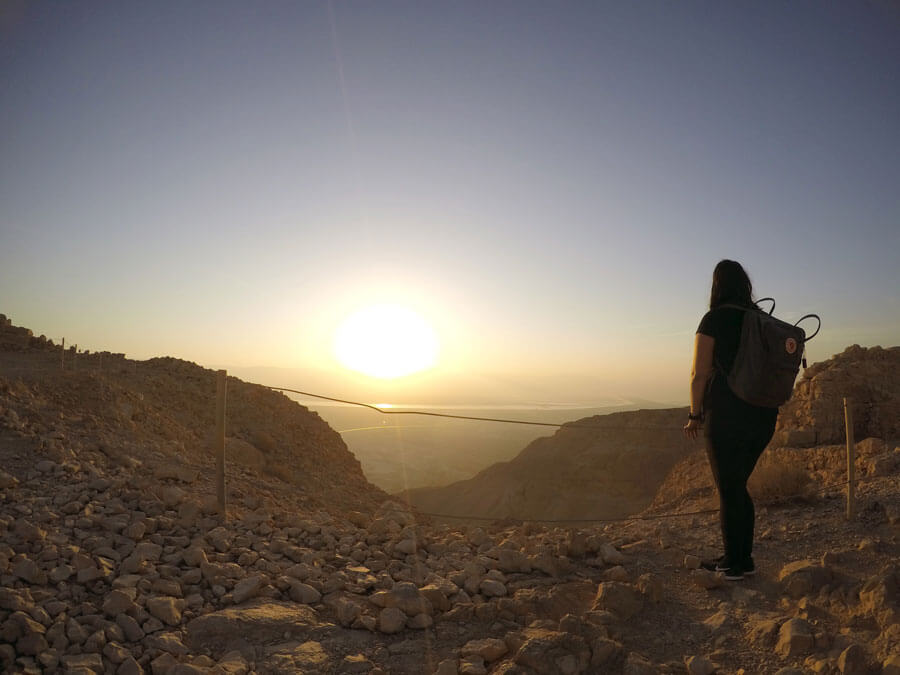
Dead Sea, Masada and Ein Gedi
I mentioned to do these from Jerusalem by tour or if you have you own car then it’s ideal!
Here are your tour options:
- Masada Sunrise, Ein Gedi and Dead Sea Tour
- Masada, Ein Gedi and Dead Sea Tour
- Dead Sea Chill Out Day Trip
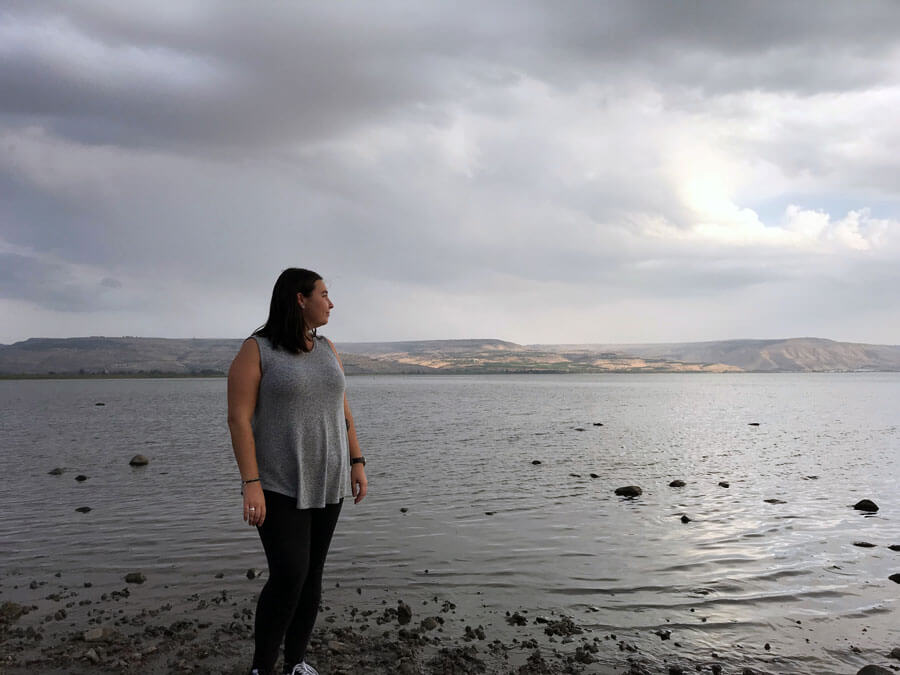
Golan Heights and Sea of Galilee: 1-2 Days
You can easily spend a day driving around Golan Heights and checking out the must-see sites for yourself or you can opt to do a day trip if you don’t have a car. What you can see are nature reserves such as Banias Nature Reserve (waterfalls!), see the view (including Syria) from Mount Bental, stop by the Golan Heights Winery or go skiing if it’s winter at Mount Hermon.
If you have a car and want to explore at a more leisurely pace then opt to do the Sea of Galilee on a second day to visit the beaches around the Sea of Galilee, stop by the Town of Jesus (Capernaum), Mount of Beautiudes and the Tiberias-Hamat Hot Springs. This day tour from Nazareth combines stops in Golan Heights and the Sea of Galilee.
If you are driving Tiberias is also a good spot to base yourself without driving back to Nazareth.
Acre: Half-Day – 1 Day
I recommend visiting Acre as a part of a tour from Nazareth or as a half-day or full-day trip from Haifa. The old town is not very big and all things can be done in a day.
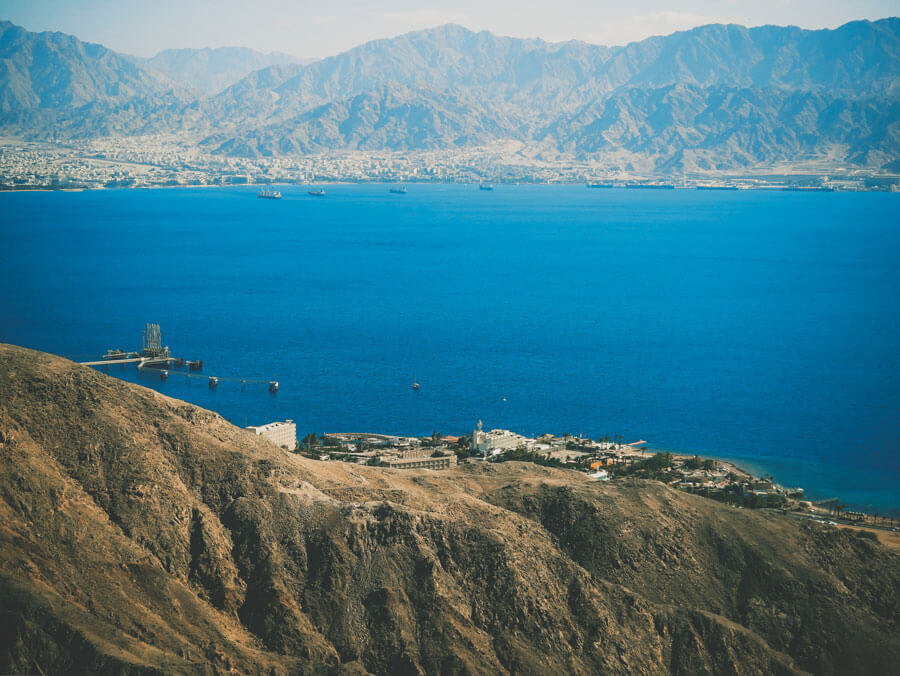
Eilat: 2+ Days
How long you stay in Eilat for really depends on why you’re visiting. A minimum of two days is required so that you have one day to explore the mountains by jeep and a second day to see what’s underwater or to spend time relaxing at the beach.
Tack on a third day if you want to visit Petra or plan to scuba dive.

Palestine (Hebron, Bethlehem, Jericho and Ramallah): 2+ Days
Once again, this really depends on what you want to do while you’re in Palestine. Some people prefer exploring each city on their own, others want to do tours so that they can gain as much information as possible.
I based myself in Jerusalem and visited on day trips.
I think Hebron is a must-visit which is most common to do by tour. The Hebron Dual Narrative Tour is a must (it’s the best tour I did on this trip).
Here are some tour options:
- Hebron Dual Narrative Tour
- Best of the West Bank (Bethlehem, Jericho, Ramallah and more)
- Bethlehem Sightseeing Tour from Jeusalem
- West Bank 3 Day Package
- Northern West Bank Full-Day Tour (Nablus, Jenin refugee camp and more)
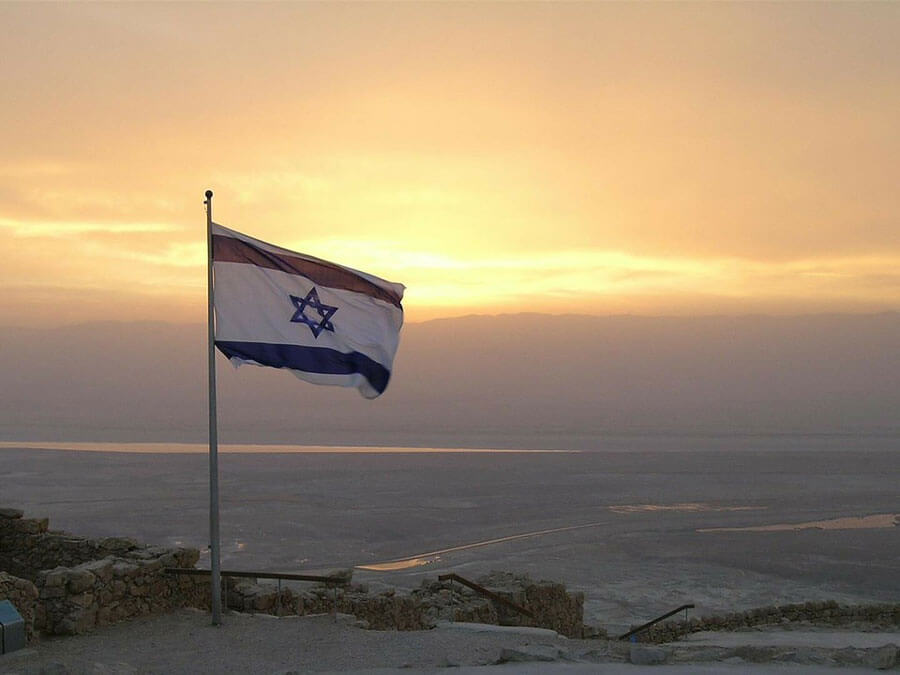
A Brief Word on Israel and Palestine (Must-Read)
The Israeli-Palestinian conflict is complicated and can take a bit of time to wrap your head around. It is still ongoing and something I believe that you should be aware of before you take a trip to Israel or Palestine.
While this guide is labeled as an Israel trip, parts of it include Palestine, which is referred to as West Bank from the Israeli point of view.
Israel and Palestine are both safe to travel to so long as you avoid areas of heavy conflict such as the Gaza Strip where violence can occur. Guns are seen regularly by those who are in the army who are required to have a gun on them at all times, even when out of uniform.
This is quite a detailed guide on the ongoing conflict but it is broken down into questions so you can choose to read parts that will still allow you to get a good idea on what’s going on.
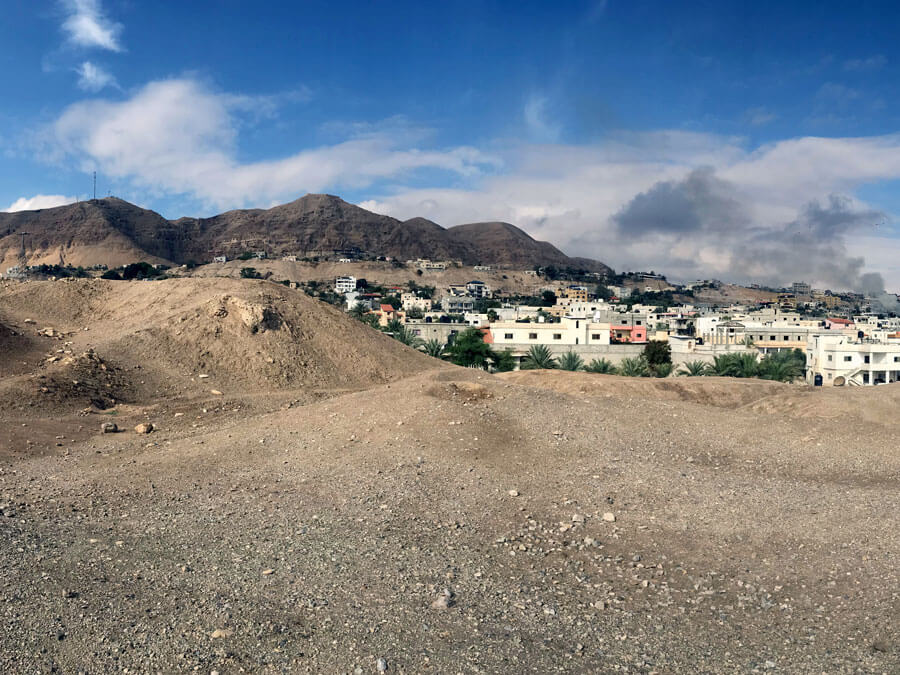
I personally read My Promised Land: The Triumph and Tragedy of Israel to gain a better perspective of the country from before Israel was created to why and ideas on the future of the country. It certainly helped me understand more and the complexity of this small country.
Do not be afraid to venture into Palestine, the barbed wire and concrete walls make it look harsh but the people are so welcoming. More people welcomed me into their country by saying “Welcome to Palestine!” than I have experienced anywhere else in the world.
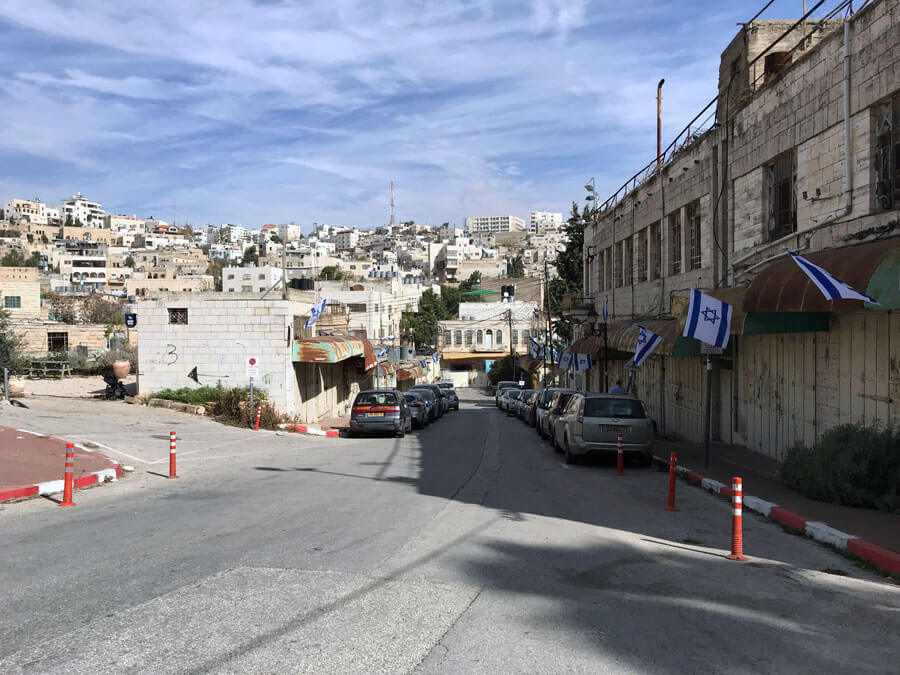
Lastly, I refer to Palestine as Palestine because 137 out of 193 United Nations member plus two non-members recognize Palestine as a state. However, in this guide I sometimes refer to it as the West Bank as many tours from Israel call it the West Bank, so as to help avoid confusion.
I had a guide tell my group on our way to Hebron (Palestine) that we would go into the conflict confused with many questions and come back out even more confused and with twice as many questions. I can promise you that that is true.
Best Time to Visit Israel
When it comes to Israel weather there really is no bad time to visit Israel as the weather is never extreme cold, rainy or snowy. It all really boils down to what kind of vacation you have to have when in Israel.
The weather in Israel varies significantly from the north where there are mountains to the south where there is the desert. The country experiences four seasons.
In summer the temperatures are hot, reaching above 30°C (86°F) and oftentimes into the 40°C’s (104°F) in the desert and the Galilee (in the north).
Winters in Israel are still mild but areas such as Jerusalem and the north which have high elevations can get snow, though it is rare. Temperatures are around 10-20°C (50-68°C) during the day and dropping to 5°C (41°C) at night.
Weather and budget-wise the best time to visit Israel is during spring (March-May) or fall (September-November) when temperatures are in the 20°C’s (68-84°C), there are fewer visitors and prices are more affordable than summer.

Israel Travel Budget
I’m sorry to be the bearer of bad news…Israel is not cheap. However, travelling Israel on a budget can be done but expect to keep an eye on your wallet as things will add up quickly.
For backpackers aim to budget $75-$100USD (275-370 NIS) per day. This will give you enough to stay in hostels 80-130 NIS per night ($21-$35USD), cook your own food or eat out at cheap street food joints, 10-20 NIS ($2.70-$5.40USD), get around by bus, cheap daily activities and to take an occasional tour.
For a mid-range budget plan to have $175-$300USD (650-1115 NIS) per day. This gives you plenty of wiggle room to stay in private rooms in hostels, cheap apartments or mid-range (3-star) hotels which are 350-550 NIS ($95-$150USD) per night.
You will be able to eat more meals out at sit down restaurants, 80-250 NIS ($21-$68USD) but will still need to eat some budget meals. This will also allow for taxis, pricer daily activities and more day tours.
A luxury budget in Israel should be $450USD+ (1670 NIS) which will allow you to stay in 5-star hotels, get private cars or tours and to eat out wherever you like.
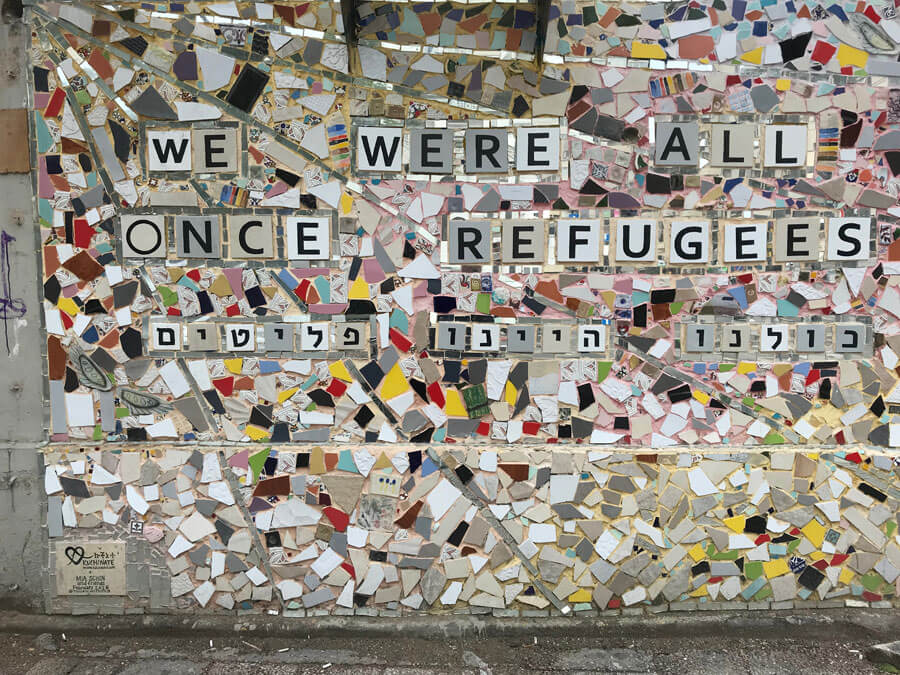
How to Get to Israel
Flying to Israel is by far the most common way to get into the country. Flights from North America are often expensive but budget airlines fly to Israel from Europe often. I recommend getting a sale flight to Europe and then hopping over to Israel.
From abroad you will fly into Israel’s largest and main airport, Ben Gurion Airport, which is located about half-way between Tel Aviv and Jerusalem.
It’s also possible to enter Israel from Jordan. There are shuttles/buses that make border crossings or you can opt to take a taxi, you’ll need a taxi on both sides of the border.
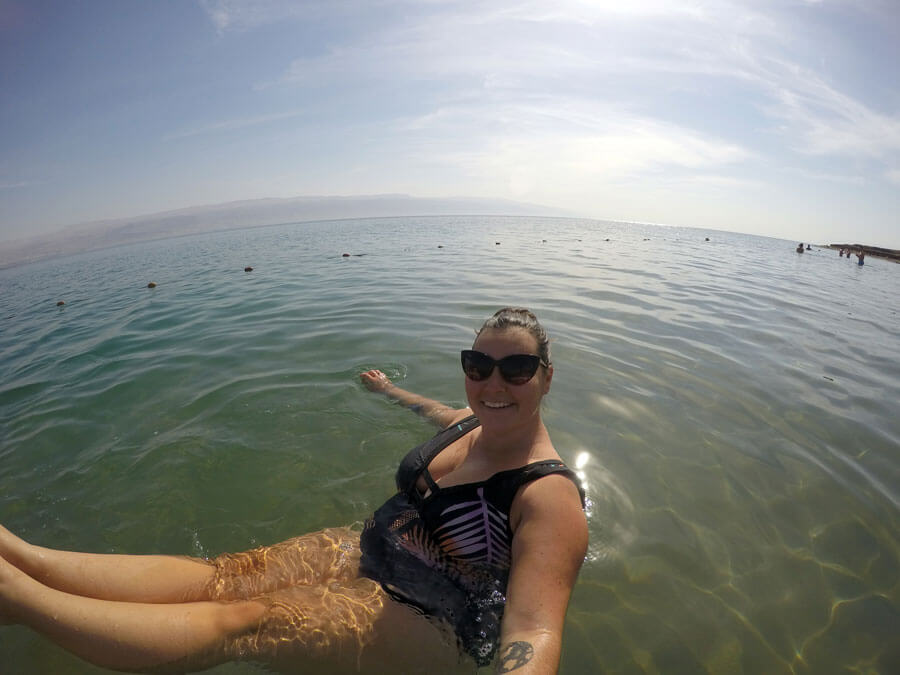
Visa Requirements for Israel
Always a question on travellers minds heading to Israel, luckily for a lot of people getting into Israel is not as difficult as many think.
Majority of the countries in Europe along with Canada, USA and Australia (plus many more, check here ) are given tourist visas that are free and valid for 90 days.
In Israel you will be given a card upon entry and exit that you must keep with your passport while you are in Israel as if you are asked to show your passport (you may need to show it if you plan on going into Palestine and accommodation will ask you to show the card) then the card is the only proof you have of legal entry into the country.
This card is used because some Arab countries do not allow those who have visited Israel to travel in their countries so a stamp is avoided by using this card.
Be prepared to be asked many questions going in and especially out of the country. This is normal but not always the case.
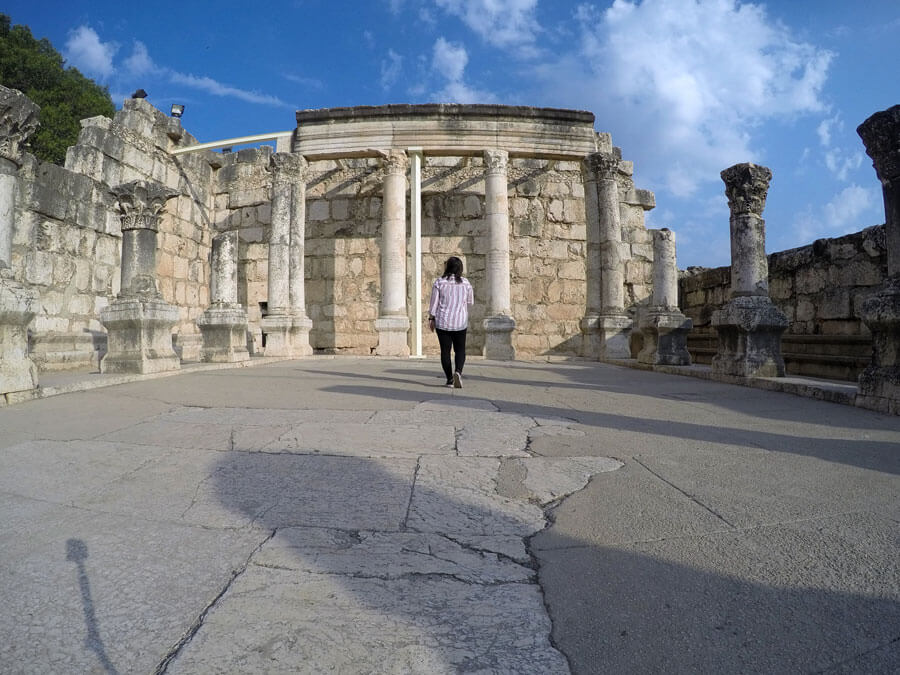
How to Get Around Israel
You have options when it comes to travelling around Israel. If you’re in a group and plan to see most of the country then a rental car is your best option as it will be the fastest.
Buses are the most popular way to get around Israel and the cheapest too. The company to look for buses is Egged . Buses don’t go to all tourist destinations though so sometimes you may have to walk far from a stop so check routes before jumping on.
Trains are definitely less popular because of the lack of trains. There is a train that runs from the airport to major cities such as Tel Aviv and Haifa (you have to go through Tel Aviv to get to Jerusalem).
Personally, I took shuttle buses through Abraham Hostels that delivered me from door to door to each hostel in Jerusalem, Tel Aviv and Nazareth.
Israel Travel Insurance
Where to Go in Israel
This Israel map gives you an idea of the best places to visit in Israel. I have also included places to visit in Palestine (marked in red). These places are often visited as day trips from Israel, typically Jerusalem, or you may visit them on your own.
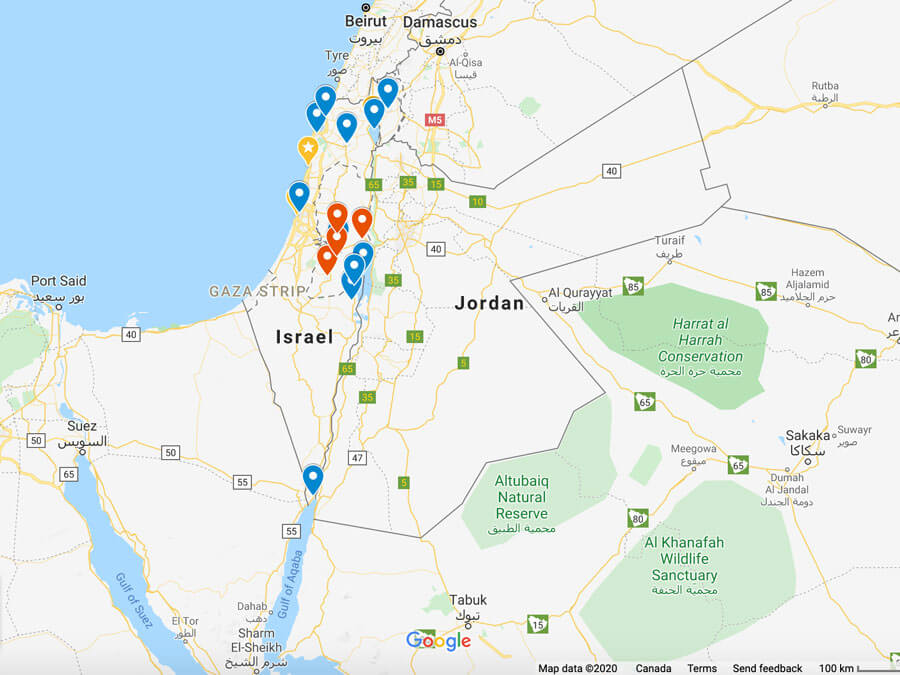
North Israel
Haifa: Haifa is the third largest city in Israel and is located on the northern Mediterranean coast. The city is most well known for the expertly designed Baha’i Gardens (Baha’i is a small religion that is fascinating) and the German Colony, a street lined with restaurants at the base of the gardens. Haifa is a good place to base yourself to explore the north.
Nazareth: Nazareth is a second option for you to base yourself when travelling around the north. This small city is the largest Arab city in Israel but has many religious sites and is where the Jesus trail begins. Nazareth is a work in progress though, it’s developing itself as a cultural and culinary destination but is still rough on the edges.
Golan Heights: Golan Heights is an area in northern Israel that borders Syria, once a place where conflict and tension ran high but is now a spot where it is safe to travel. In Golan Heights you can find everything from nature reserves to wineries, mountaintop views, old war bunkers and you can even go skiing on Mount Hermon in the winter.
Sea of Galilee: The Sea of Galilee (known as Yam Kinneret in Hebrew) is well-known for its biblical associations. At the Sea of Galilee and in the area around Jesus is said to have performed many of his miracles. The sea itself is Israel’s largest freshwater lake which the Jordan River runs through that has beaches, camping and many walking and cycling trails around.
Acre (Akko): Acre is more like an old town in Europe than it is unlike any other city in Israel. Located on the northwest Mediterranean coast, Acre is a UNESCO World Heritage Site with stone walls and alleys that lead you to the Mediterranean shores. The town is small with markets and tons of history. Even Napolean tried to take over this town but failed.

Central Israel
Tel Aviv: If you’re a city person then Tel Aviv is where you want to be. It’s the second largest city in Israel and most likely where you will start your trip. Tel Aviv is hip, packed with culture, has beaches that rival some of the best beach destinations in the world, art, architecture and is home to the country’s party scene. Foodies will love Tel Aviv too.
Jerusalem: Jerusalem, the Holy City, is in the Judean Mountains in east Israel and is where history is still an open book. New ancient discoveries are made constantly and pilgrims venture to the old part of the city where they can find some of the holiest sites linked to Judaism, Christianity and Islam. Beyond the thick stone walls of the old city the modern expands outwards with trendy cafe lining streets, educating museums and much more.
Dead Sea: Stop by the Dead Sea, one of the top Israel tourist attractions, to float in the saltiest of water at the lowest point on Earth (431m below sea level). As you float you will see Jordan across the sea and to get to the Dead Sea you’ll drive through the picturesque Judean Desert.
Masada: Masada is an ancient fortress with Roman ruins that sits atop a plateau in the Judean Desert that overlooks the Dead Sea. It’s here that a bloody siege took place but now it’s a place for dramatic views.
Ein Gedi: Ein Gedi is a nature reserve in the Judean Desert that is an oasis in the middle of the harsh, hot climate. It’s here that plants are found that are usually in Africa, thousands of miles away, freshwater waterfalls plummet to the ground and unique wildlife make their appearances.
South Israel
Eilat: Eilat is the most resorty area in all of Israel. In the far south of Israel, bordering Jordan, Eilat sits along the Red Sea where beach lovers flock to enjoy some rays. Snorkelling and diving here are extremely popular as the waters are filled with an abundance of marine life and coral reefs that are not bleached.

Hebron: Just 30km from Jerusalem, Hebron is where travellers go to see a very real side of the Israeli-Palestinian tension. Hebron is believed to be the final resting place of Abraham and the city is very important to all three major religions of Islam, Judaism and Christianity. Barbed wire lines the walls of some streets, metal gates stop Palestinian’s from passing through to the Israeli side of the city and soldiers stand guard at all times in this Israeli controlled city.
Bethlehem: Bethlehem is an extremely important city for those of Christian faith. It’s believed that Jesus was born here in the Church of Nativity. Other than religious sites, Bethlehem is also famous for being the home of some of Banksy’s most well-known pieces of art that line the wall that separates Bethlehem from Jerusalem.
Jericho: Jericho is a place of history, where you can see monasteries carved into mountain faces and ancient cities being uncovered from dirt. Jericho holds the name of the ‘world’s oldest continuously inhabited city’ where evidence has proven that settlements here date back over 10,000 years.
Ramallah: Ramallah is a great city to visit to experience Palestine as just that, Palestine. The city is the political and economic heart of Palestine with street art decorating many walls but it’s more than just politics. It’s a bustling place to see everyday life.
How Long to Spend in Israel?
This really depends on what you want to see. I would recommend spending a minimum of one week in Israel but typically people spend 10 days to two weeks and this just covers the major highlights.
I personally spent three weeks in Israel and feel like I got a good look and feel of the country but could have easily have spent more time there and still not do the same thing twice.
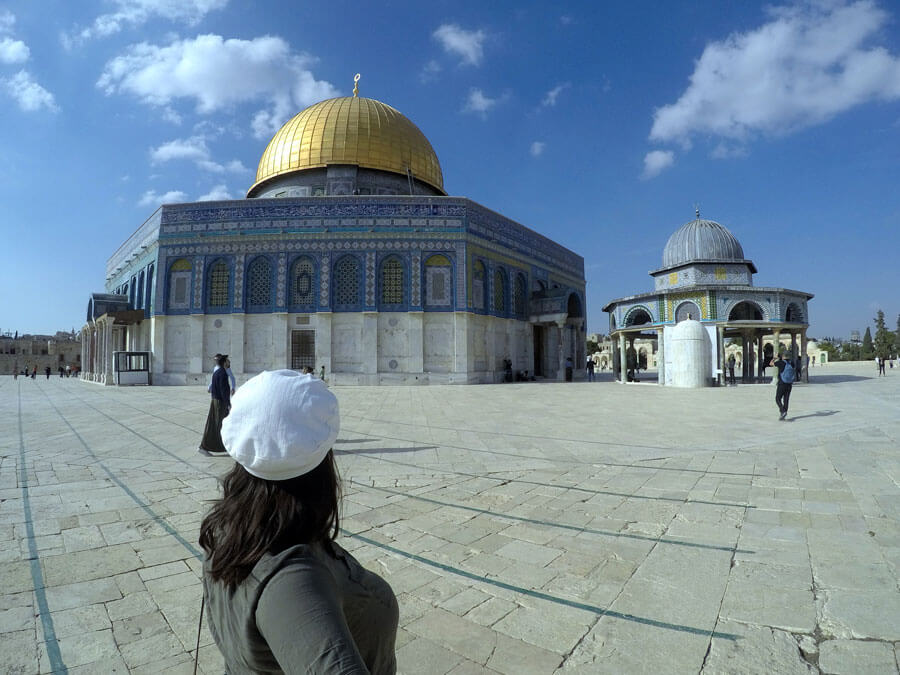
Enjoy your Israel holidays!
Must Read Posts About Israel
- All My Israel Trip Planning Resources
Disclaimer: This post may contain affiliate links which I earn a small commission from and are at no additional cost to you. See my disclosure policy for details. Thank you for supporting my small business!
Disclaimer: Taylor’s Tracks is a participant in the Amazon Services LLC Associates Program, an affiliate advertising program designed to provide a means for us to earn fees by linking to Amazon.Com and affiliated sites.

Happy & Fed: Daily Budget in Israel
Israel is a land of culinary delights, with a rich and diverse cuisine that reflects the country’s history and culture. From fresh hummus to savory shawarma, there’s no shortage of delicious food to try. However, dining out in Israel can be expensive, especially in the major cities. But fear not – with a little creativity and some insider tips, you can enjoy great food without breaking the bank. In this article, we’ll explore how to stay “Happy & Fed” on a budget in Israel.
So Much Delicious Food in Israel!
Israeli cuisine is a fusion of Mediterranean, Middle Eastern, and Jewish influences, resulting in a vibrant and flavorful culinary landscape. Some must-try dishes include falafel, shakshuka, and sabich. Markets like Mahane Yehuda in Jerusalem and Carmel Market in Tel Aviv are great places to sample local fare, and offer a wide variety of fresh produce, spices, and street food.
Don’t Break the Bank: Tips for Budget Eating
Eating on a budget doesn’t mean sacrificing quality or taste. One way to save money is to dine during lunch instead of dinner, as many restaurants offer discounted lunch menus. Another option is to share dishes with friends, allowing you to try a variety of items without overspending. Additionally, look for local eateries that cater to the student crowd, which often offer affordable options.
Street Food Gems: Where to Eat for Cheap
Street food is a staple of Israeli cuisine, and is a great way to sample local fare without breaking the bank. Some popular street food options include hummus and pita, falafel, shawarma, and sabich. You can find street food vendors throughout the country, especially in major cities like Tel Aviv and Jerusalem. Don’t be afraid to try something new – you may just discover your new favorite dish.
Satisfy Your Sweet Tooth: Budget Desserts
No meal is complete without dessert, and Israel has some delicious options to satisfy your sweet tooth. One budget-friendly option is halva, a sesame-based confection that comes in a variety of flavors. Another option is kanafeh, a sweet cheese pastry soaked in syrup. For a refreshing treat, try a cup of fresh fruit from a local market.
Affordable Dining Options for Every Meal
Whether you’re looking for breakfast, lunch, or dinner, Israel has plenty of affordable dining options. For breakfast, try a local bakery that offers fresh pastries and coffee. For lunch, head to a falafel stand or grab a sandwich from a local deli. And for dinner, consider a local pizzeria or a shared plate at a Mediterranean restaurant. By being savvy and exploring different options, you can eat well without spending a fortune.
In conclusion, eating on a budget in Israel doesn’t mean missing out on the country’s incredible culinary scene. From street food to budget-friendly restaurants, there are plenty of options to explore. So next time you’re in Israel, don’t hesitate to try something new and delicious – your wallet (and your taste buds) will thank you!
You Might Also Like:

- South Korea
- Indonesia (Bali)
- Central Asia
- African Safari
- South Africa
- Itinerary Ideas
Israel Trip Cost 2024/2025, the Most Expensive & Cheapest Times
When planning a trip to Israel, the costs of an Israel trip are frequently asked. As one of the most expensive countries in the Middle East, you can generally expect Western European prices.
To get a better idea of the cost of an Israel tour, we have outlined some of the main expenses and provided tips on how to create your dream trip within your budget.
Content Preview
- 1. Cost to a Private Israel Tour
- 2. Most Expensive and Cheapest Times to Go
- 3. The Cost of International Flights
- 4. The Cost of Accommodation
- 5. The Cost of Transportation
- 6. The Cost of Dining and Drinking
- 7. The Cost of Attractions and Activities
How Much Does a Private Israel Tour Cost?
Israel, being a relatively small country, is often recommended as a part of a Middle East trip of 3–7 days.
For worry-free experiences, a private guided tour is highly recommended when visiting the historical sites and cultural wonders of Israel. Your knowledgeable guides would introduce Israel in an interesting way and offer insights as locals.
On a private week-long trip to Israel, you can expect to pay approximately US$500 to US$700 per person per day. As a developed country, Israel has high prices for hotels, transportation, and services, approximately 50% higher than other Middle Eastern countries.
Besides regular sightseeing, we are experts at creating special occasions, particularly for family trips and romantic getaways. To keep your kids or your partner engaged, you'll have chances to go on a food-hunting tour in a hidden alley to celebrate fine dining. The Night Light Show in the Tower of David also enriches your nights in Israel.
You could find out more price details in our best-selling tours. You could also let us know your interests and we would happily tailor-make your dream trip .
- 15-Day Best of Israel, Jordan, and Egypt Family Tour : from US$4,950 p/p
- 18-Day Egypt, Jordan, and Israel Treasures Discovery Tour : from US$6,565 p/p
The Most Expensive and Cheapest Times to Go to Israel
With the most favorable weather in spring (March to May) and autumn (September to November) comes the highest prices. But you'll be rewarded with pleasant temperatures and bright skies for sightseeing and outdoor adventures. Booking 3-6 months in advance is beneficial to get the best deals and ensure the availability of your preferred hotels/rooms during these high seasons.
Due to cold temperatures and occasional showers/snow, the winter months (December to February) tend to be the cheapest times to go to Israel. But if you're celebrating the Christmas and New Year holidays in Israel, you could expect lower but still high prices. Departing before December 20th is helpful to get more affordable international flight tickets.
Due to the heat averaging 31°C (88°F) or higher, summer (June to August) is the second cheapest time to visit Israel . However, you'd better prepare for a busier Israel than in winter at the time of the school summer breaks.
Traveling in June is a smart choice as it offers the coolest weather and most tranquil experiences available in the summer months. A flexible private tour is also helpful to make the most of the weather.
See how long to spend in Israel and handpicked itinerary options >>>
The Cost of International Flights to Israel
International flights make up a significant portion of your overall trip cost to Israel. The cost tends to be highest during peak travel seasons and major holidays. Weekdays are usually cheaper to fly internationally than weekends.
Tel Aviv is the primary entry point for international flights to Israel. Like other Middle Eastern countries, you could easily find direct flights to Tel Aviv from major cities in Europe ranging from US$150.
For Americans, you can fly directly from New York, San Francisco, Los Angeles, and Chicago from US$500 to US$1,700 on an economy flight. You could consider making stopovers in Istanbul, Zurich, and Paris to get cheaper air tickets.
If you are from Australia or New Zealand, you would have to make stopovers in cities like Dubai or Hong Kong. Airfares range from US$800 to US$1,500.
Suggested reading: 2-Week Jordan and Israel Itineraries for First-Timers >>>
The Cost of Accommodation in Israel
With similar hotel standards to Western hotels, hotels in Israel are typically about 50% more expensive than those in other Middle Eastern countries. You could find mid-range hotels at approximately US$150 to US$350 per room per night, while the higher-end hotels, like the 5-star hotels, usually cost more than US$400 per room per night.
To cater to various requirements, we've carefully selected hotels with family rooms, swimming pools, stunning scenery, and unique experiences for memorable occasions. We are confident we have found the best hotels at the best rates for you!
Just tap Create My Trip , tell us your preferences, and then you'll get a private Israel tour suggestion with a personalized itinerary and well-selected hotels within 24 hours!
The Cost of Transportation in Israel
As a small country, flights are limited from/to Tel Aviv in Israel. You're advised to take flights (50 minutes) between Eilat and Tel Aviv at a price of about US$90, as private transfers and trains take over 4 hours.
Private transfers and trains are more frequently used for other shorter journeys between popular destinations (Tel Aviv, Haifa, Jerusalem, etc.).
The train is the most atmospheric and relaxing way to unveil authentic Israel life and scenery on a journey. The fastest trains usually cost from US$20 to US$30. During holidays, early booking is necessary to guarantee the tickets.
If you would like the most flexibility and least travel hassles, a private transfer is the best choice, especially for big family trips. Besides saving you from carrying luggage, our driver and guide are helpful for having rich interactions with knowledgeable locals along the way. If you like, the option of going somewhere off the beaten path along the way is an added bonus.
Public buses or subways are cheaper options within cities. But they are less recommended for first-timers due to potential navigation difficulties and the stress of having to do a lot of walking and planning.
The Cost of Dining and Drinking in Israel
When it comes to food in Israel, the cost can vary depending on your preferences. If you're adventurous, you can enjoy local street food for as little as US$3–5 per person.
For dining in a mid-range restaurant in Israel, you can expect to pay about US$20–50 per meal. It is customary to leave a tip of about 10–15% for meals enjoyed on-site, while other Middle Eastern countries typically require 5–10% tips. If you seek fine dining, you'd better prepare to pay over US$200 per person.
Travel with us as we prioritize dining in local restaurants to provide an authentic experience. Additionally, we can tailor-make exclusive food experiences, allowing you to immerse yourself in the local culinary traditions of Israel.
The Cost of Attractions and Activities in Israel
Israel is renowned for its rich history and religious significance. Entrance fees to attractions, such as the Western Wall, Masada, and the Church of the Holy Sepulchre, usually range from US$5–10 per person.
Special experiences, such as foodie tours and light shows, can require an additional cost of US$30–50 per person.
Discovering Israel With Us
You are warmly welcomed to have us customize your own trip based on your group size, interests, and other needs. Sit back and use our Create My Trip service.
For inspiration, you could also see the following popular Israel tours:
- 10-Day Israel In-Depth Tour
- 15-Day Best of Israel, Jordan, and Egypt Family Tour
- 18-Day Egypt Jordan and Israel's Treasures Discovery Tour
- More Middle East Tours
Why Global Highlights (10,000+ reviews & 98.8% 5-star rating)
- Save Your Time:
- Less research, more enjoyment!
- Real-time 1V1 expert planning
- Maximize Your Flexibility:
- Personal local guide and ride
- Explore at your own pace
- Celebrate Your Journeys:
- Specially-crafted family adventures
- Celebrate milestones with style!
Get Inspired with Some Popular Itineraries
More travel ideas and inspiration, sign up to our newsletter.
Be the first to receive exciting updates, exclusive promotions, and valuable travel tips from our team of experts.
Why Global Highlights
Where can we take you today.
- Southeast Asia
- Japan, South Korea
- India, Nepal, Bhutan, and Sri lanka
- Travel Agents
- Loyalty Program
- Privacy Policy
Address: Building 6, Chuangyi Business Park, 70 Qilidian Road, Guilin, Guangxi, 541004, China
Nomadic Matt's Travel Site
Travel Better, Cheaper, Longer
How to Road Trip Around Israel Like a Pro
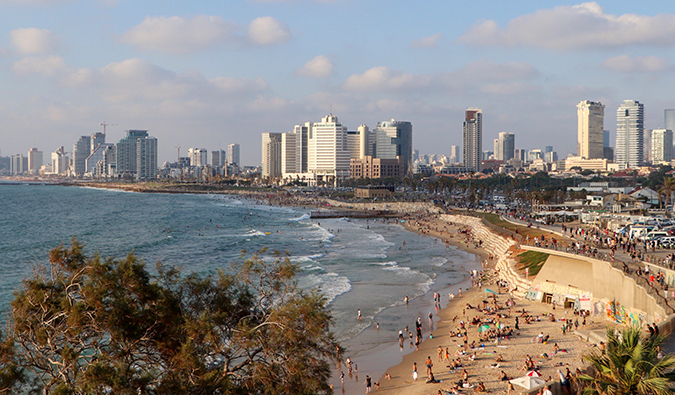
This guest post from Anastasia Schmalz and Tomer Arwas of Generation Nomads . They have spent an extensive amount of time traveling Israel and today are going to share their knowledge to help you road trip around Israel on a budget!
Having visited Israel regularly and completed three road trips across the country, we can confidently say that there is no better way to explore it than in your own car.
The road infrastructure is well maintained throughout the country, and distances between destinations are short. You can start your day floating in the Dead Sea, the lowest point on earth, and watch the sunset a couple of hours later from the porch of your wooden cabin in the Golan Heights or on a Mediterranean beach.
Additionally, having your own vehicle means that you can visit places off the beaten path that buses and trains don’t reach. For example, on our route from Masada to Tel Aviv, we took a spontaneous detour to visit a traditional Bedouin desert village, which wouldn’t have been possible if we didn’t have a rental car.
Over the years, we have built up know-how and resources that help us to make our road trips a smooth and wallet-friendly experience.
Budgeting: What will your daily costs be like?
Israel has become one of the most expensive tourist destinations in the world in recent years and, according to the Israeli newspaper Haaretz , the cost of a visit can exceed expensive cities such as Zurich, Paris, London, and Moscow. Here are some average costs:
Accommodations (per night):
- Hostel: 85 NIS ($24 USD) per bed in a 4-bed dorm room
- Hotel: 300 NIS ($83 USD) per room
- Airbnb: Prices starting at 175 NIS ($50 USD) per room or for the entire place
- Main course on the menu of a restaurant: 60 NIS ($17 USD)
- Street food meal (e.g., falafel or shawarma sandwich, with a drink): 25 NIS ($7 USD)
Car rental:
- Rental: 80-140 NIS ($22-39 USD) per day
- Gas: Although prices vary, expect to spend 6–7 NIS ($1.67–1.95 USD) per liter of gasoline
How to Rent a Car in Israel
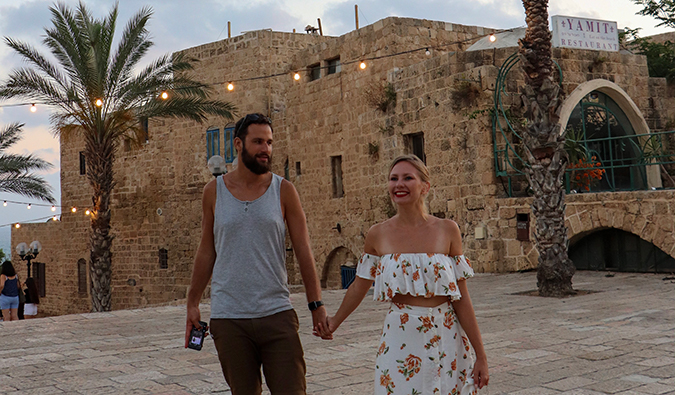
There are many car rental agencies in Tel Aviv that can help arrange your rental, or you can select the pickup location online if you decide to reserve a car before your trip. We recommend comparing prices on sunnycars.com , or calling or walking up to brokers directly. Rental fees are dependent on the seasons and typically start around 80 NIS ($22 USD) per day.
There are plenty of options for renting your car in the city center. Most rental companies are located on HaYarkon Street near the Dan Tel Aviv Hotel , where you can walk from one to another to do some price comparison before choosing the one that suits you best.
There are several smaller car rental agencies that have more attractive prices than the large players. We have frequently rented cars from those companies without any issues.
These are some of our recommended rental agencies:
- Auto Shay, HaYarkon St 130, Tel Aviv-Yafo
- TIR, HaYarkon St 132, Tel Aviv-Yafo
- Eldan, Kaufmann St 10, Tel Aviv-Yafo
- Hertz, HaYarkon St 144, Tel Aviv-Yafo
- Shlomo Sixt, HaYarkon St 122, Tel Aviv-Yafo
- Europcar, HaYarkon St 80, Tel Aviv-Yafo
When comparing deals, be sure to take into account the type of insurance policy as well as the number of kilometers included; for the itinerary suggested below, you can expect to log a total of 850 to 1,000 kilometers. Also, check ahead if your driver’s license is valid in Israel by calling a rental agency and verifying the requirements directly with them.
Driving Safety Tips for Israel
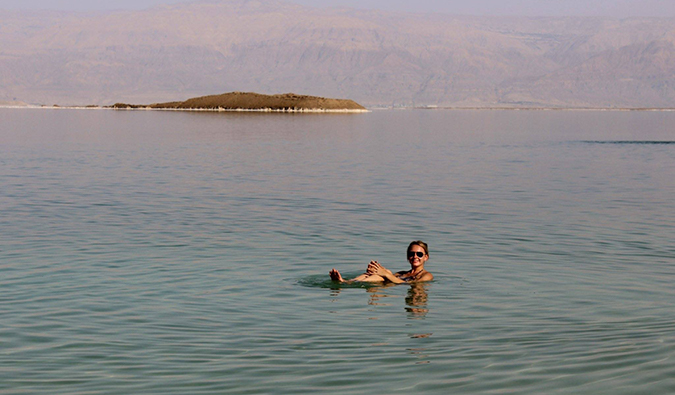
One important factor to consider in the planning of your trip is driving (or not driving) in the Palestinian territories, consisting of the West Bank and Gaza. There are set regulations to adhere to when entering the area. You will have to pass through army checkpoints on your way in and out and elaborate on the reasons why you wish to drive through. Moreover, do not rely on your GPS as may not work properly. Although the West Bank is now considered to be relatively safe, you should check with local authorities and your own country’s travel warnings for the latest travel advice.
Our Suggested Driving Route
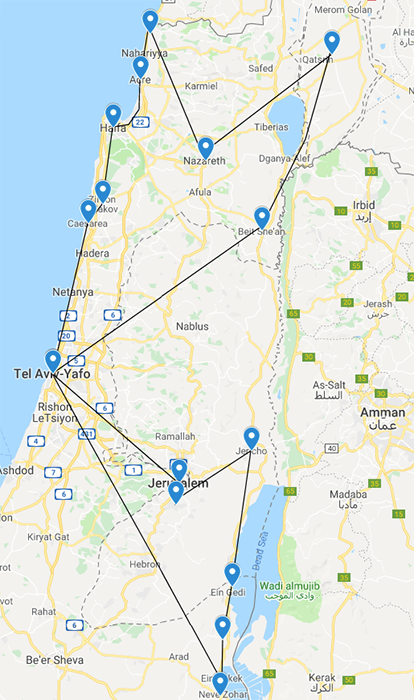
Start: Tel Aviv-Yafo —> Jerusalem —> Bethlehem —> Jericho —> Ein Gedi Nature Reserve —> Masada —>Dead Sea —> Tel Aviv —> Caesarea —> Zichron Ya’akov —> Haifa —> Acre —> Rosh Hanikra —> Galilee —> Golan Heights —> Beit She’an —> Tel Aviv-Yafo
How to Navigate Around Israel
Car rentals usually charge an extra fee for renting a GPS system. To save money, get an Israeli SIM card instead. For 50 NIS ($14 USD), you can get a two-week unlimited data package from local provider Partner . This also allows you to stay connected with family and friends, check out restaurant reviews, and keep your Insta story going.
With internet on your smartphone, there are several helpful apps you can use to navigate Israel during your road trip. iPhone’s built-in Maps app and Google Maps work quite well, but when in Rome, do as the Romans do: Waze is Israel’s most popular navigation app, as well as a social platform that monitors traffic and connects drivers on the road. The advantage of Waze is that it’s based on the most accurate traffic monitoring system in Israel and will always find you a best alternative route to skip traffic jams or inform you about speed cameras.
How to Park Your Car in Israel
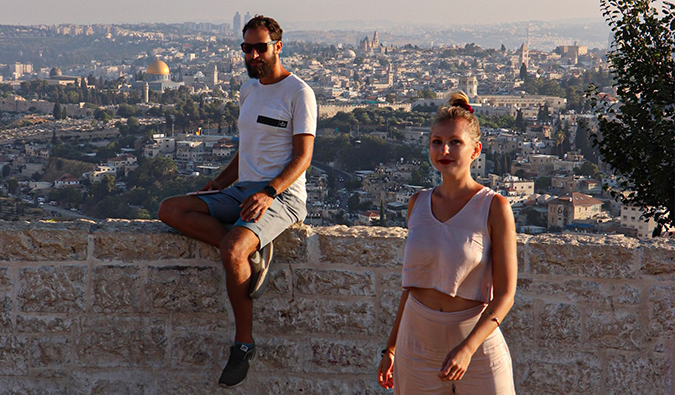
If you do find street parking, make sure to comply with the rules. The curb of the streets is marked with the following color codes:
- Blue + white = Paid parking
- Red + white = No parking allowed
- Solid gray = Free parking
- Gray + yellow = Kiss and drive (you may not leave the car)
Another option in major cities is parking lots. They are more expensive and may charge a fixed price for the full day or by the hour.
Good news: On Shabbat (Friday sunset to Saturday sunset) parking is free of charge everywhere.
Here are some apps you can use to navigate your way around cities:
- Moovit – This is the locals’ app for checking real-time bus arrival information and planning trips.
- Google Maps – It is getting more accurate in recent years and can also be used to check real-time bus arrivals.
- GetTaxi – The Israeli version of Uber, it’s a taxi-booking app that allows you to pay with a credit card.
2 Final Tips on Driving Around Israel
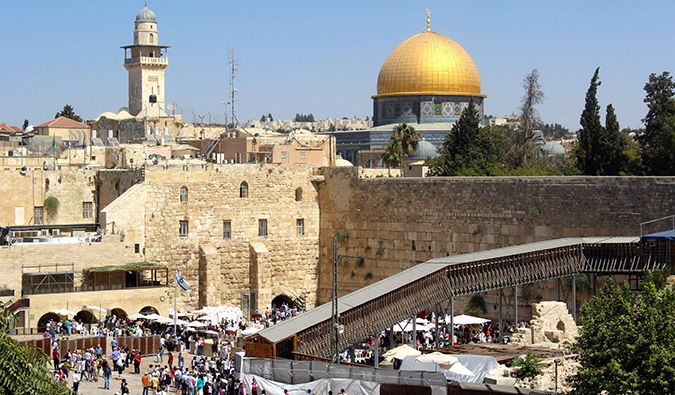
First, the best time of year for a road trip around Israel is during spring (April-June) and autumn (September-October), when weather is most pleasant. Unfortunately, the good weather also means that these the busiest months. Additionally, these are also the months with the most Jewish holidays, which are the busiest and most expensive times to visit (see below for more info). Winter months are rather unpredictable, and you won’t be guaranteed beach time, unless you had down south to Eilat. July and August are the hottest months of the year — even locals don’t spend much time outdoors, instead going from one air-conditioned space to another. Although rental cars are equipped with A/C, the heat and humidity can become unbearable during those months, and sightseeing can seem like a chore.
Second, Shabbat is the Jewish holy day of the week, from sunset Friday to sunset Saturday, and, besides weekly Shabbat, there are also many Jewish, Christian, and Muslim holidays throughout the year.
So how will these affect your trip?
First, Jewish holidays (many of which fall in the spring and autumn) are usually busy periods in Israel, and prices of accommodations and car rentals rise. Second, Israel is a Jewish state, meaning that during Shabbat and other holidays, many businesses (besides non-kosher restaurants) are closed. This may include some car rental companies, as well as shops, grocery stores, and museums. This is especially true in more religious cities and towns, such as Jerusalem. On Yom Kippur, Judaism’s most somber holiday, it is forbidden to drive. Moreover, there are observant Jewish neighborhoods where driving on Shabbat is unwelcome and even dangerous, such as Jewish Ultra Orthodox neighborhood in Jerusalem: Mea She’arim.
Lastly, Christian holidays such as Christmas and Easter attract many tourists and pilgrims to holy sites such as Jerusalem, Nazareth, and Bethlehem. Muslim holidays are not officially part of the national holiday calendar, but are still celebrated by the large Muslim population residing in Israel. Muslims observe Friday as the holy day of the week, meaning that Muslims sites and businesses are closed.
Having done three cross-country road trips over the last two years, our experience is that there is hardly any better way to explore Israel than in your own car! A well-maintained road infrastructure and short distances between (most) destinations make Israel a road trip–friendly country .
Planning your trip outside of the main Jewish holidays, renting your car from less expensive agencies, and using useful apps for navigating and parking in cities will give you the smoothest experience possible while helping you to save money.
Anastasia Schmalz and Tomer Arwas run the millennial blog generationnomads.com. Feeling burnt out from their 7-7 and wondering if there is more to life, Anastasia and Tomer decided to leave their jobs as business consultants in Amsterdam, NL. On October 2018 they hopped on a one-way flight to travel the world, with the intention to redesign their lifestyle. During their travels, they took up the challenge of understanding why millennials feel stuck in their careers and seek change. Their mission is to help millennials unfold their best lives. On their blog, they cover a range of topics providing actionable tips and resources on navigating career (gaps), creating a location independent lifestyle, and getting closer to financial freedom.
Book Your Trip to Israel: Logistical Tips and Tricks
Book Your Flight Use Skyscanner or Momondo to find a cheap flight. They are my two favorite search engines because they search websites and airlines around the globe so you always know no stone is left unturned. Start with Skyscanner first though because they have the biggest reach!
Book Your Accommodation You can book your hostel with Hostelworld as they have the biggest inventory and best deals. If you want to stay somewhere other than a hostel, use Booking.com as they consistently return the cheapest rates for guesthouses and cheap hotels.
Don’t Forget Travel Insurance Travel insurance will protect you against illness, injury, theft, and cancellations. It’s comprehensive protection in case anything goes wrong. I never go on a trip without it as I’ve had to use it many times in the past. My favorite companies that offer the best service and value are:
- Safety Wing (for everyone below 70)
- Insure My Trip (for those over 70)
- Medjet (for additional repatriation coverage)
Looking for the Best Companies to Save Money With? Check out my resource page for the best companies to use when you travel. I list all the ones I use to save money when I’m on the road. They will save you money when you travel too.
Got a comment on this article? Join the conversation on Facebook , Instagram , or Twitter and share your thoughts!
Disclosure: Please note that some of the links above may be affiliate links, and at no additional cost to you, I earn a commission if you make a purchase. I recommend only products and companies I use and the income goes to keeping the site community supported and ad free.
Related Posts
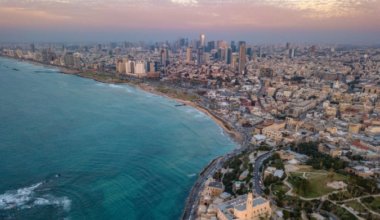
Get my best stuff sent straight to you!
Pin it on pinterest.
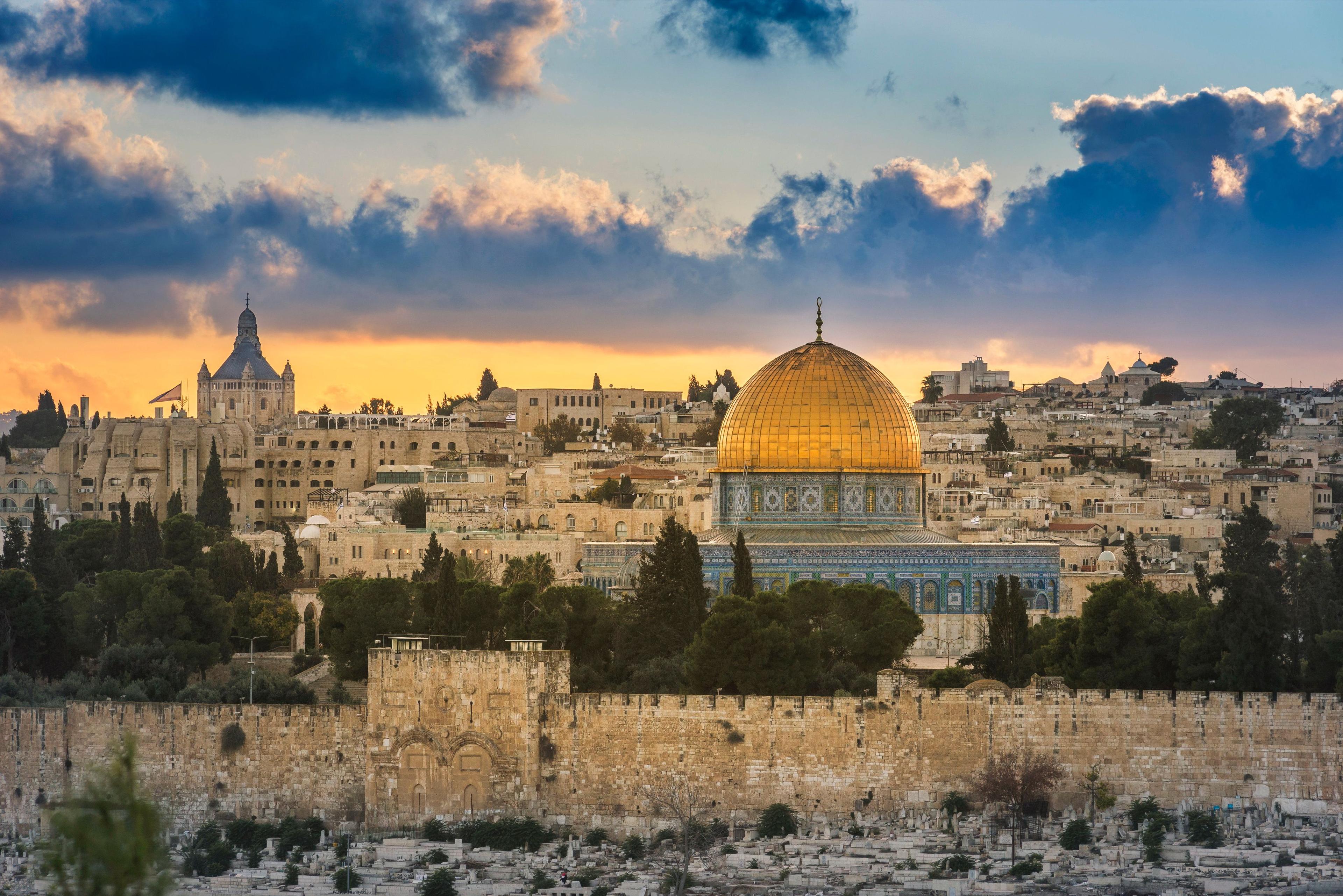
How Much Does A Trip to Israel Cost?
- Jun 14, 2023
- Israel, Travel
Donny Arkush

Want to visit the ancient ruins. Give us a call to talk about how we can help make that happen.
One of the most critical steps in planning a trip to Israel is researching travel costs. We’re frequently asked, “How much does a trip to Israel cost?”
This article aims to break down the costs associated with traveling to Israel, including the tour packages offered by Tradition Tours. We provide white-glove service to help you plan every step of your journey.
Whether you’re a seasoned traveler or you’re unaware of the intricacies and options available to you when traveling to Israel, this travel guide will help you feel more confident in planning your trip of a lifetime.
For a complete guide on when to tour Israel, read our next article:
Best Time of the Year to Visit Israel
How Much Does a Trip to Israel Cost?
Table of Contents:
- Cost Breakdown for a Trip to Israel a. Airfare b. Accommodations c. Local Transportation d. Food & Drink e. Attractions f. Other Spending
Save Time & Money with an Israel Tour Package
- What’s Included in a Tour Package
- What’s Not Included in a Tour Package
Israel Tour Packages
Create a tailored israel experience with tradition tours, cost breakdown for a trip to israel.
One of the most common mistakes people make when planning and budgeting a trip to Israel is not realizing how much is involved in preparing for a tour of this importance. We’ve outlined the details for you here, including many items people often overlook.
We’ll provide insight into the costs of airfare, accommodations, local transportation, food & drink, attractions, and other spending items you might forget to plan and budget for.
If reading through these details brings up further questions you need to discuss, please give us a call to talk them through. 1-855-958-6877 .
You can also read our complementary article titled How Much Does a Trip to the Holy Land Cost?
You might assume you’ll fly into Jerusalem on your trip to Israel. In reality, you’ll fly into Tel Aviv, where the airport is approximately 15 miles from downtown and 40 miles from Jerusalem. Because they’re so geographically close, you can drive to Jerusalem in an hour.
This is why most of our tours begin in Tel Aviv (technically Ben Gurion airport) and spend a couple of days there so you can get acclimatized and adjusted before heading to Jerusalem and all the other sites that Israel offers.
Note: Our church tours only spend one day in Tel Aviv so that you can get to the historical (biblical) sites quicker.
Some European flights arrive in Eilat, but if you’re coming from North America, expect you’ll land in Tel Aviv. Landing at Ben Gurion doesn’t impact the cost of your flight because it’s the primary option available.
There may be (up to) a $600 (per person) difference between winter and summer flights. To discuss those details, give us a call at 1-855-958-6877 .
Accommodations:
You’ll have various accommodation options in Israel, including hotels, hostels, and vacation rentals. When booking through Tradition Tours, we’ll arrange beautiful hotels, including up to 5-star deluxe hotels.
Of course, different locations and varying amenities impact accommodation prices. For instance, hotels within cities (prime, popular locations) will tend to be higher priced. Weekends (Thursday and Friday) in Galilee or the Dea Sea area will also increase costs.
Local Transportation:
Israel has many different transportation options, such as taxis, public transportation, and rental cars. In various cities, we recommend different modes of transport.
But if you’re traveling between cities, then public transportation might be your best choice. In Galilee, we recommend renting a car. Or, if traveling between Tel Aviv and Haifa, train is your best option.
Of course, the best option is for Tradition Tours to plan every detail for you, including transportation via shuttle bus (or coach bus). Transport is an often-forgotten but essential detail that can significantly impact the enjoyment of your trip to Israel. To have us arrange the details for you, let’s discuss our Tour Package options.
Give us a call today @ 1-855-958-6877 .
Renting cars may be more expensive, while local buses, trains, and taxis can be less expensive. But most people don’t want to fumble around for loose coins to pay the cab fare. Let us handle the details for you ahead of time.
Food & Drink:
While you have various food options in Israel, you should budget your daily restaurant stops based on similar prices to food in the USA. You can also grab a shawarma for $15 to $20, then meal prices increase.
As with most vacations, you shouldn’t plan on cooking your meals. Budget for eating in restaurants, food stands, and shops. And don’t forget to enjoy the nightlife, too.
Attractions:
While in Israel, you’ll want to explore the natural beauty, including participating in popular outdoor activities like hiking, snorkeling, and visiting national parks. The costs for these activities can add up if you don’t follow your budget daily.
That’s part of why we recommend guided tours: the daily costs are a “known” quantity instead of a surprise while in-country.
You may be interested in cultural activities like visiting museums, attending festivals, or experiencing local traditions. The costs associated with these activities vary based on type and season.
Other Spending:
Souvenirs and Shopping:
In Israel, you’ll discover plenty of souvenir shops and local crafts. As with any trip, you can spend as much or as little as your budget allows. We advise you to make a list of the people and items to purchase so you don’t overspend (and don’t waste time searching).
Travel Insurance:
While only partially necessary, purchasing proper insurance for your trip is a good idea. Whether it’s flight insurance to cover expenses in case of cancellation or trip insurance to cover hotel problems or illness, we highly recommend you invest in insurance before your trip to Israel.
As mentioned with souvenirs, you can spend as much or little on insurance as your budget allows. As a quick rule of thumb, you can get an “OK’ policy for around $200 to $350 per person, depending on numerous factors. When you give us a call, we can suggest some options for insurance coverage.
Visa and Entry Fees:
Americans traveling to Israel do not require a specific visa to enter the country. You’ll receive a no-cost, three-month visitor visa upon arrival in the country at the airport. Other countries (such as Jordan and Turkey) require visas before entry.
For more information, including additional entry fees or permits that may be required for your trip, read the FAQs of our Best Christian Holy Land Tours article.
Currency Exchange Rates:
Most businesses in Israel will not accept USD, so you’ll need to have local currency called the NIS (New Israel Shekel). Ask your local bank if you can order NIS a few weeks ahead of time.
Credit cards are also widely accepted. However, use one that does not charge foreign exchange rates, as those fees can add up throughout your trip.
Again, all the details you need to know about currencies for your trip are available in the Best Christian Holy Land Tours article (FAQ section).
We recommend using XE.com or checking with your local bank for the most up-to-date exchange rates.
As you’ve seen, there are a lot of details to think through and plan for your trip to Israel. For many people, the best reason to have Tradition Tours plan your trip is the convenience and stress reduction we offer.
The logistics and planning can make the trip feel out-of-reach and undoable. Instead, our tour packages can provide a hassle-free travel experience. We know which hotels to book, the transportation to arrange ahead of time, and the activities for you or your group.
We provide a combination of expert guidance and local knowledge. Our tour packages include knowledgeable guides who can provide insights and context throughout your trip. The value of having a local guide who can enhance the overall experience. You’ll come back home feeling inspired in ways you can only imagine.
Another advantage of Tradition Tours is the cost savings and value for money. Through our partnerships and experience, we can offer competitive prices by leveraging group rates and negotiating better deals. You’ll save money by including meals, attractions, and transportation in our tour packages. Don’t worry about your budget getting out of control through the nickels and dimes of unexpected or unplanned events. We provide better value compared to arranging everything on your own.
You’ll also experience the enhanced safety and security of our 25 years of experience. More than that, travel packages can provide protection, especially for travelers unfamiliar with Israel. What’s more, the presence of a tour operator who can help you handle any unforeseen situations or emergencies.
Using the Israel tour packages from Tradition Tours also provides you with social interaction and group dynamics that you wouldn’t otherwise have if you planned the trip on your own. You’ll meet and connect with fellow travelers in a group tour setting. The shared experiences, camaraderie, and friendships formed during the trip are unbelievable.
What’s Included in a Tour Package?
When you book your trip to Israel with Tradition Tours, you’ll make the wise decision to hand off the fine details of your trip to our team with decades of experience.
Your tour package includes all transfers upon arrival and departure and all your hotel accommodations. You’ll travel from destination to destination in an air-conditioned comfortable, modern vehicle with a driver. Also included are all entrance fees to museums and attractions, too.
More than that, on most tours, all breakfasts and dinners are included daily. And your group tours will be led by an expert state-certified and licensed tour guide.
What’s NOT Included in a Tour Package?
Your tour package includes most ground tour details. With that said, airfare is not included in the tour package. Nor are items purely of a personal nature, such as souvenirs.
Most tour packages include breakfast and dinner, but lunch is not included.
The border fees are not included if your package includes stops in Jordan or Egypt. You’re also encouraged to ensure your travel insurance policy (if you choose to purchase insurance on your own), as it’s not included in the price quotes for the tour.
And, of course, any tips or gratuities you want to gift to tour guides or operators are not included. Note that many church tours DO include tips, so check beforehand if you’re unsure.
Taste of Israel
This 14-night tour includes ancient Jerusalem, modern Tel Aviv, historic Galilee, and beautiful Eilat. This tour is designed to give you a broad-strokes introduction to all the highlights of Israel. If it’s your first time to the Holy Land, this package is a great trip to start.
Check out all the details of this tour HERE .
Israel & Jordan Tour
Our 12-night tour allows you to step back in time and connect with the stories and sites of the past. The highlights of Israel plus a few essential stops in Jordan, such as Amman and Petra.
Israel Tours
Whether you visit Israel for a pilgrimage, to experience its culture and history, or to relax on vacation, there will be something in this fantastic destination that will stay with you forever. Click this link to find our list of Israel tours.
Discover the tour options HERE .
If you’re planning (or hoping to plan) a trip to Israel soon, our top recommendation is to let us help you plan and curate your trip. With over 25 years of experience creating memorable, meaningful, and fulfilling experiences in Israel, we know the destinations and deals to recommend or avoid.
Whether traveling alone or planning a group trip with your church, Tradition Tours operates a full-service travel boutique. We’re proud to offer you “white glove” concierge services to make your trip to Israel unforgettable.
Call us today @ 1-855-958-6877 .
Planning a trip to Israel can be overwhelming and exhausting. Let us help guide you through the process. Call now.
Call us at Tradition Tours to talk about your Holy Land tour.
ABOUT THE AUTHOR

Donny Arkush is the President and Co-Founder of Tradition Tours. Donny has more than 19 years of experience in the travel industry. He’s driven by a desire to ensure that every single Tradition Tour traveler has the best Holy Land experience possible. To get regular emails from Donny, click here .
Recent Posts
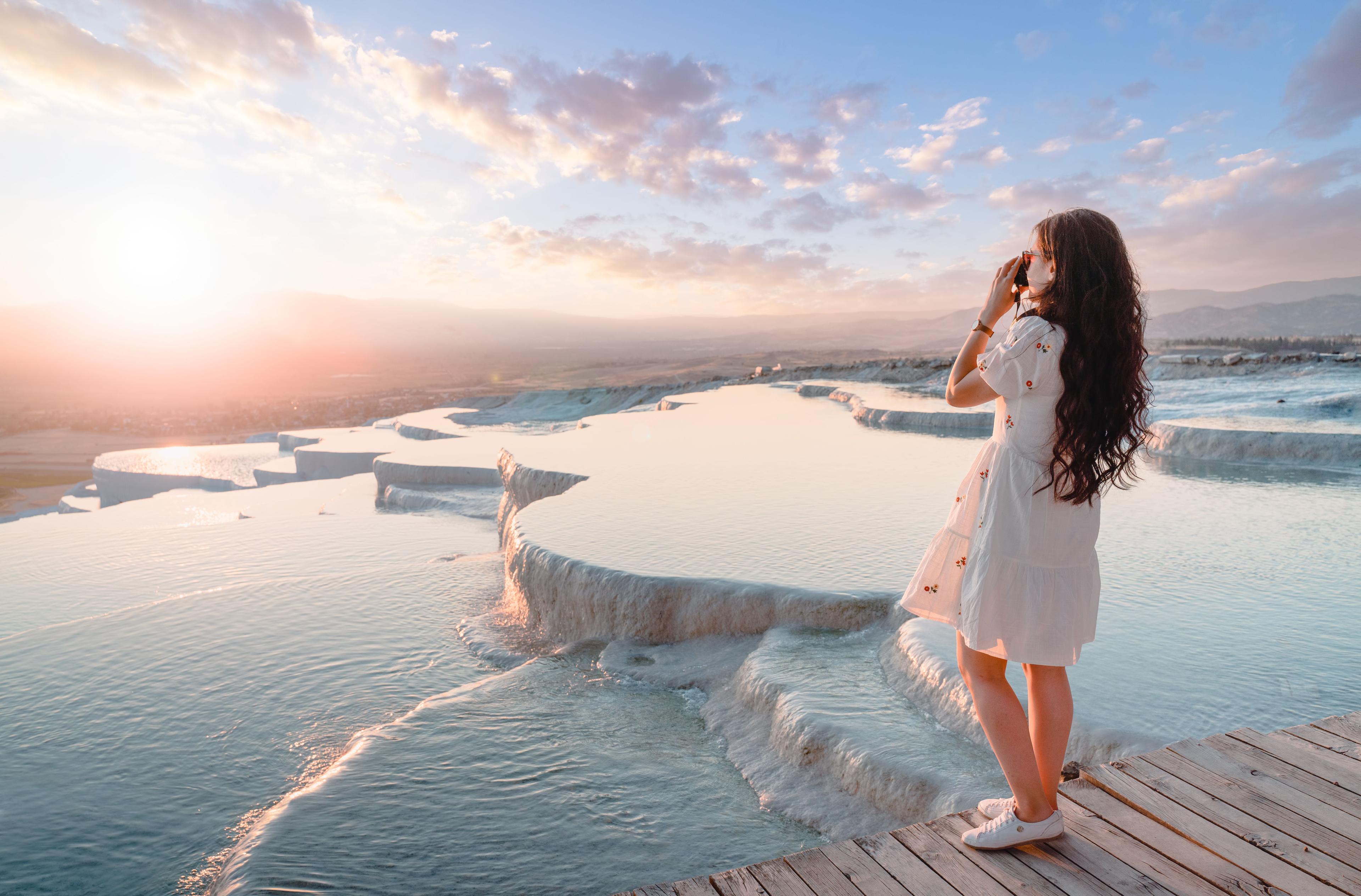
Visiting Pamukkale: A Timeless Adventure with Tradition Tours | Tradition Tours
Pamukkale, a natural marvel in Turkey's scenic landscape, beckons travelers with its beauty and ancient wonders. Known for its mineral-rich thermal waters that cascade down snowy-white terraces, this UNESCO World Heritage site offers a unique blend of relaxation, history, and nature. Whether you're soaking in the thermal pools, exploring the ruins of Hierapolis, or simply marveling at the natural beauty, Pamukkale promises a rejuvenating and enlightening experience. With Tradition Tours, your journey to this celestial landscape is not just a visit but an immersive exploration into the heart of Turkey's natural and historical treasures.
1. The Thermal Springs: Nature's Spa
The thermal springs are at the heart of Pamukkale's allure, whose healing waters have drawn visitors for millennia. These terraces, formed by calcite-laden waters, create natural infinity pools with breathtaking views. With Tradition Tours, you'll have the opportunity to bathe in these therapeutic waters, experiencing the same rejuvenation that has attracted travelers since Roman times.
2. Hierapolis: Walking Through History
Above the stunning white terraces lies Hierapolis, an ancient city that has stood the test of time. This archaeological haven offers a glimpse into the past with its well-preserved theater, necropolis, and thermal baths. Tradition Tours guides bring the city's rich history to life, from its significance in the Greco-Roman world to its role in early Christianity, ensuring a deeply engaging experience.
3. The Antique Pool: Swim Amidst Ruins
One of the most enchanting experiences in Pamukkale is the Antique Pool, where you can swim among fragments of ancient columns and artifacts. Often referred to as Cleopatra's Pool, this site offers a rare opportunity to immerse yourself in history literally. With Tradition Tours, you'll learn the fascinating stories behind this historic pool and enjoy a leisurely swim in its warm, mineral-rich waters.
4. Nature Walks and Photography: Capturing the Beauty
Pamukkale is not just about its historical and geological wonders; it's also a haven for nature lovers and photography enthusiasts. The surrounding landscape offers a myriad of scenic walks and breathtaking vistas, perfect for capturing the beauty of this unique destination. Tradition Tours can guide you to the best spots for that perfect shot, from the radiant sunset over the travertines to the vibrant flora and fauna that thrive in this unique ecosystem.
Conclusion:
Visiting Pamukkale with Tradition Tours is more than just a trip; it explores the heart of Turkey's natural and historical wonders. From the healing waters of the thermal springs to the ancient ruins of Hierapolis, every moment in Pamukkale is a step through history and a dance with nature. Whether you're seeking relaxation, adventure, or cultural enrichment, Tradition Tours offers luxury private tours, including specialized itineraries for senior travelers, guided private church tours, and excursions exploring the Seven Churches of Revelation. Embark on this customized journey with us to discover the wonders of Pamukkale in comfort and style, ensuring your trip to Pamukkale is unforgettable.
If you're inspired to witness the ethereal beauty of Pamukkale and immerse yourself in its rich history and natural wonders, we invite you to get in touch with Tradition Tours. Our team is dedicated to creating experiences that cater to your interests and ensure your visit creates memories that will last a lifetime. Contact us today to embark on your Pamukkale adventure with Tradition Tours.
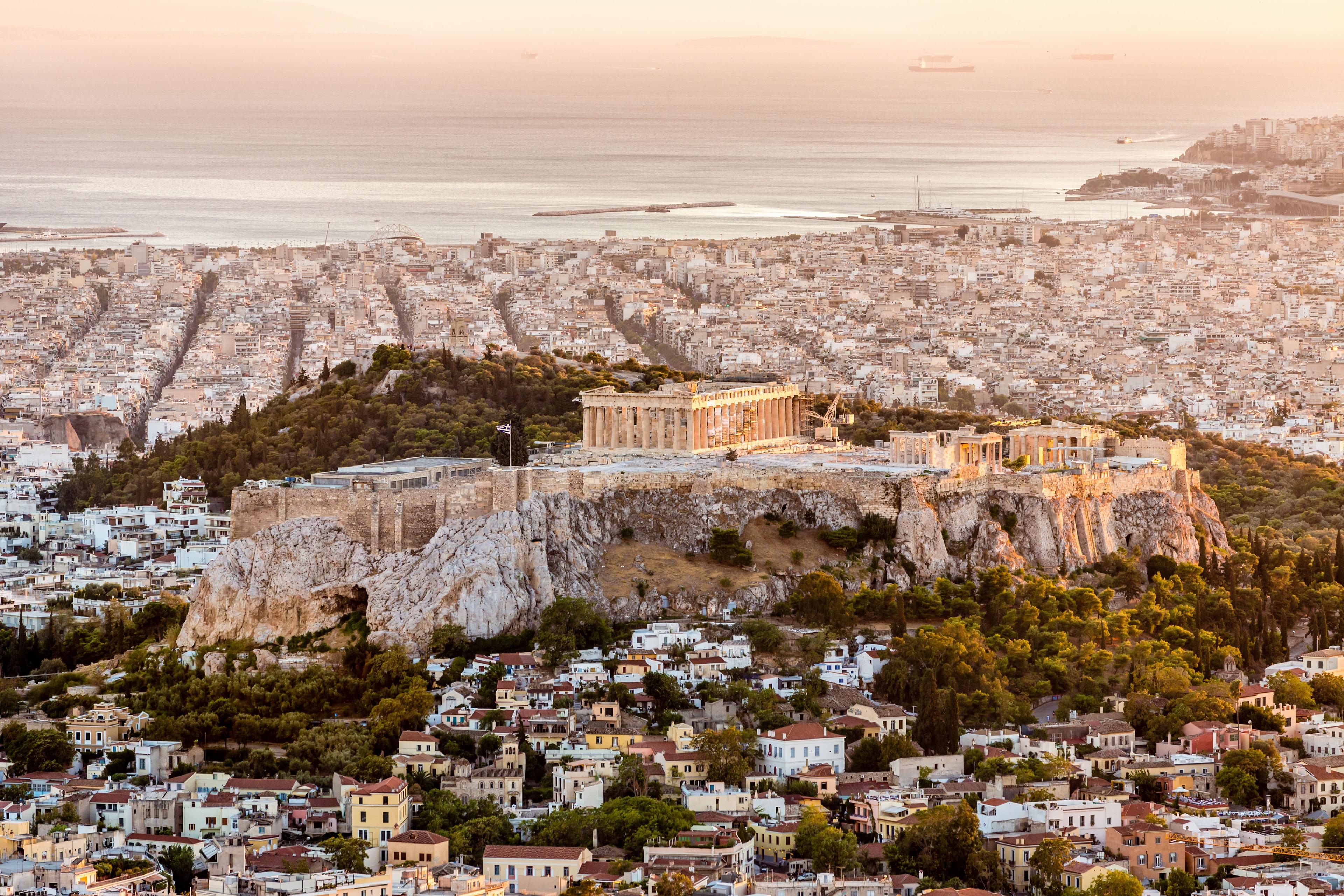
Discovering Divine Greece: A Journey of Faith and Luxury | Tradition Tours
Embark on a spiritual odyssey through the heart of Greece, where ancient history and divine narratives intertwine, offering an experience like no other. With Tradition Tours, delve into a realm where luxury private tours meet the sacred footsteps of the Apostle Paul and where every path tells a story of faith, miracles, and the birth of Christianity. Join us as we unfold the tapestry of Greece's Christian heritage through personalized, Bible-based tours that cater to the discerning traveler seeking an intimate journey through this blessed land.
Luxury Private Tours: An Exclusive Odyssey Experience Greece like never before on a luxury private tour designed to envelop you in the opulence and serenity of the Hellenic landscape. With personalized itineraries, you'll explore the cradle of Western civilization in unparalleled comfort and style, from the majestic Acropolis to the tranquil shores of the Aegean. Our bespoke tours promise not just a journey through space but a voyage through time, where every need is anticipated and every comfort provided.
Guided Private Church Tours: A Spiritual Encounter Step into the divine with guided private church tours, where the sacred halls of Greece's ancient churches whisper tales of saints and scholars. Led by expert guides versed in the rich tapestry of Christian history, these tours offer an intimate glimpse into the spiritual heart of Greece. From the Byzantine splendor of Thessaloniki's basilicas to the mystical serenity of Patmos, where John penned the Revelation, each visit is more than a tour; it's a pilgrimage of the soul.
Customized Private Tours: Tailored to Your Faith Craft the journey of a lifetime with customized private tours that cater to your unique spiritual and cultural interests. Whether you're drawn to the footsteps of Paul, the wonders of early Christian architecture, or the tranquil beauty of Greece's monastic traditions, our bespoke itineraries are tailored to fit your quest for enlightenment and adventure. Explore at your own pace, with the freedom to immerse yourself fully in the moments that move you most.
Footsteps of Paul Pilgrimage Greece Tours: Walking with the Apostle
Embark on a transformative journey following the Footsteps of Paul pilgrimage Greece tours, a once-in-a-lifetime experience that traces the Apostle Paul's missionary journeys across the Greek landscape. From the ancient agora of Athens to the vibrant streets of Corinth, walk in the footsteps of the apostle who spread the Christian message across the Roman world. These tours blend biblical history with the breathtaking beauty of Greece, offering a profound connection to the early days of Christianity.
Greece Christian History and Church Tours: A Legacy of Faith
Delve deep into the heart of Greece's Christian legacy with tours that illuminate the country's rich religious history. From the early Christian communities of Philippi to the revered monasteries of Meteora, our Greek Christian history and church tours provide an unparalleled exploration of the places where faith was forged in the fires of persecution and piety.
Bible-Based Greece Tours Visiting Paul's Locations: Scripture Comes Alive
Experience the living history of the Bible with tours specifically designed to bring Scripture to life. Our Bible-based Greece tours visiting Paul's locations offer a unique opportunity to see, touch, and feel the settings of the New Testament. As you stand in the places where Paul preached, taught, and lived, the Bible's stories unfold before you, transforming ancient words into vivid reality.
Conclusion: Your Journey of Faith Begins with Tradition Tours
With Tradition Tours, your spiritual journey through Greece is not just a vacation; it's an expedition of the heart and soul. Our commitment to excellence, combined with a deep respect for the sacred history of Greece, ensures that your experience will be as enriching as it is luxurious. Whether you seek the solace of holy sites, the thrill of walking in the footsteps of saints, or the comfort of a journey tailored just for you, Tradition Tours is your gateway to a divine adventure. Contact us today to begin your personalized pilgrimage through the holy lands of Greece.
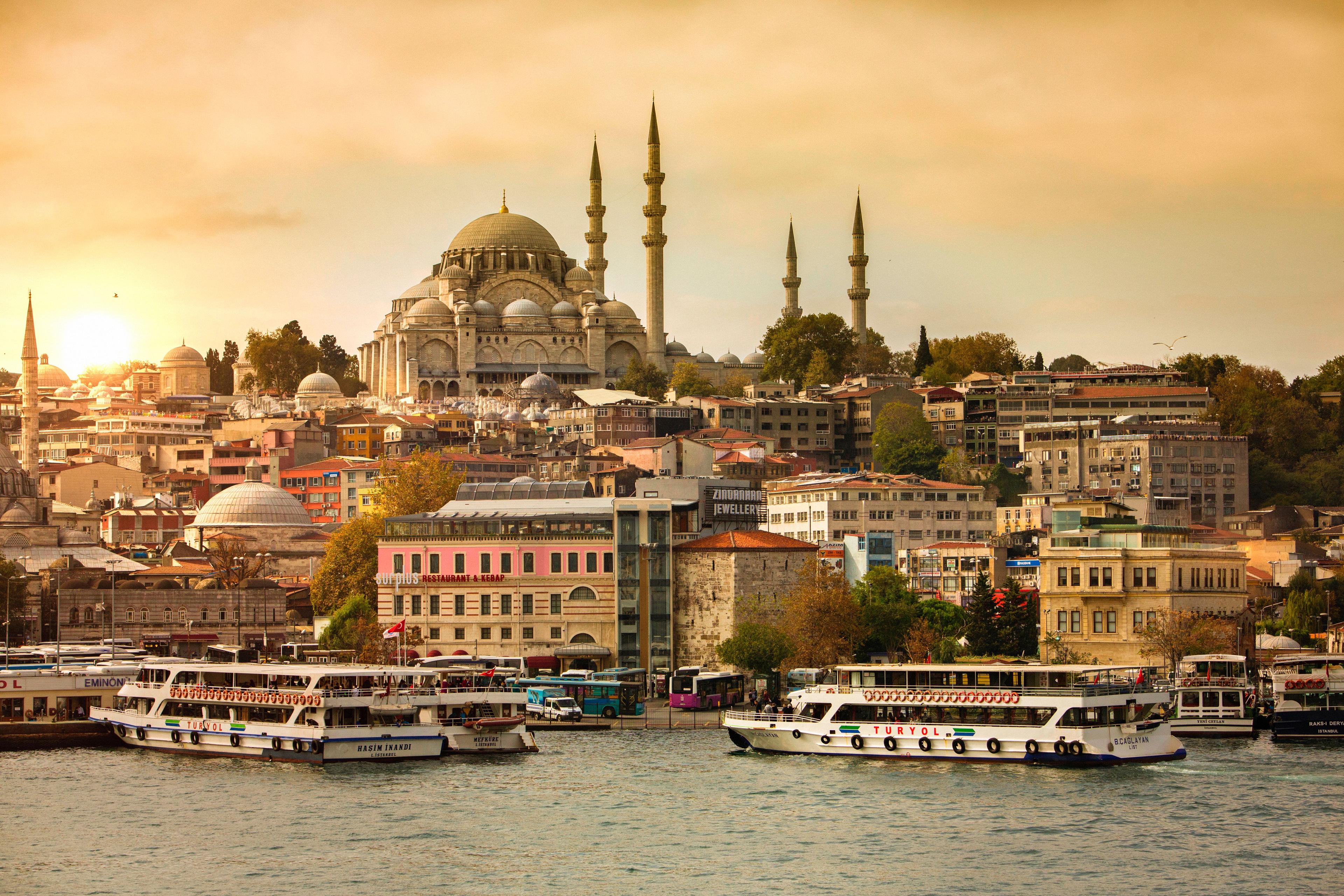
Istanbul: A Tapestry of Time - The World's Premier Destination | Tradition Tours
Istanbul, straddling the continents of Asia and Europe, is a city where history and modernity blend seamlessly, creating an enchanting experience for all who visit. In 2023, Istanbul achieved a remarkable milestone by becoming the number one city for international arrivals, welcoming an astounding 20.2 million visitors. This represents a 26% growth from 2022, underscoring the city's ever-growing appeal as a global travel destination.
A Gateway Between Continents
Istanbul's unique position as a bridge between two continents has made it a melting pot of cultures, cuisines, and traditions. The Bosphorus Strait, which runs through the city, splitting the city between Europe and Asia, offers breathtaking views and reminds us of Istanbul's strategic importance throughout history as the crossroads of the world.
Historical Marvels and Architectural Splendor
As it was known in the past, Constantinople, now Istanbul, is dotted with architectural masterpieces that tell the tales of empires that ruled this land and early Christianity. From the awe-inspiring Hagia Sophia to the majestic Blue Mosque, Istanbul's buildings are a testament to its rich history and cultural diversity. Tradition Tours offers luxury private tours that allow travelers to explore these marvels in comfort and style, providing in-depth insights into the city's past and present.
The Vibrant Pulse of the Bazaars
The Grand Bazaar and Spice Bazaar are not just markets but the beating heart of Istanbul's bustling life. Tradition Tours will guide you through narrow lanes filled with various goods, from spices to textiles, offering a glimpse into the vibrant local life and commerce, creating an immersive experience regardless of whether you are on a guided church tour or private tour, allowing you to delve deeper into Istanbul's religious and cultural heritage.
Culinary Delights: A Feast for the Senses
Istanbul's cuisine is as diverse as its history, with influences from the Mediterranean, Central Asia, and the Middle East. The city's food scene, from street vendors to high-end restaurants, offers an array of flavors that promise a culinary adventure for every palate.
Embracing the Future
In response to its growing popularity as a travel destination, Istanbul has been enhancing its tourism infrastructure and promoting sustainable travel initiatives. These efforts aim to ensure that the city can accommodate its increasing number of visitors while preserving its natural and historical treasures. Like Constantinople of old, Istanbul is the most connected city in the world, with flights to more international destinations than any other city. It makes this city a truly global gateway to start your tour. With that being said, Tradition Tours remains at the forefront, offering customized Istanbul tours for the seven churches of Revelation and Istanbul to Ephesus Footsteps of Paul tour packages, catering to those seeking a deeper historical and spiritual connection to these biblical areas.
Istanbul's position as the most visited city in 2023 is a testament to its timeless allure and capacity to enchant visitors with its blend of historical grandeur and contemporary dynamism. Whether it's the city's rich history, vibrant markets, delicious cuisine, or the warmth of its people, Istanbul offers an unforgettable experience to all who walk its streets. As we conclude our journey through Istanbul's enchanting narrative, let Tradition Tours be your compass to the city's wonders. Reach out for an immersive experience tailored by experts, and let your Istanbul adventure begin. Share your thoughts or contact Tradition Tours to transform your travel dreams into reality.
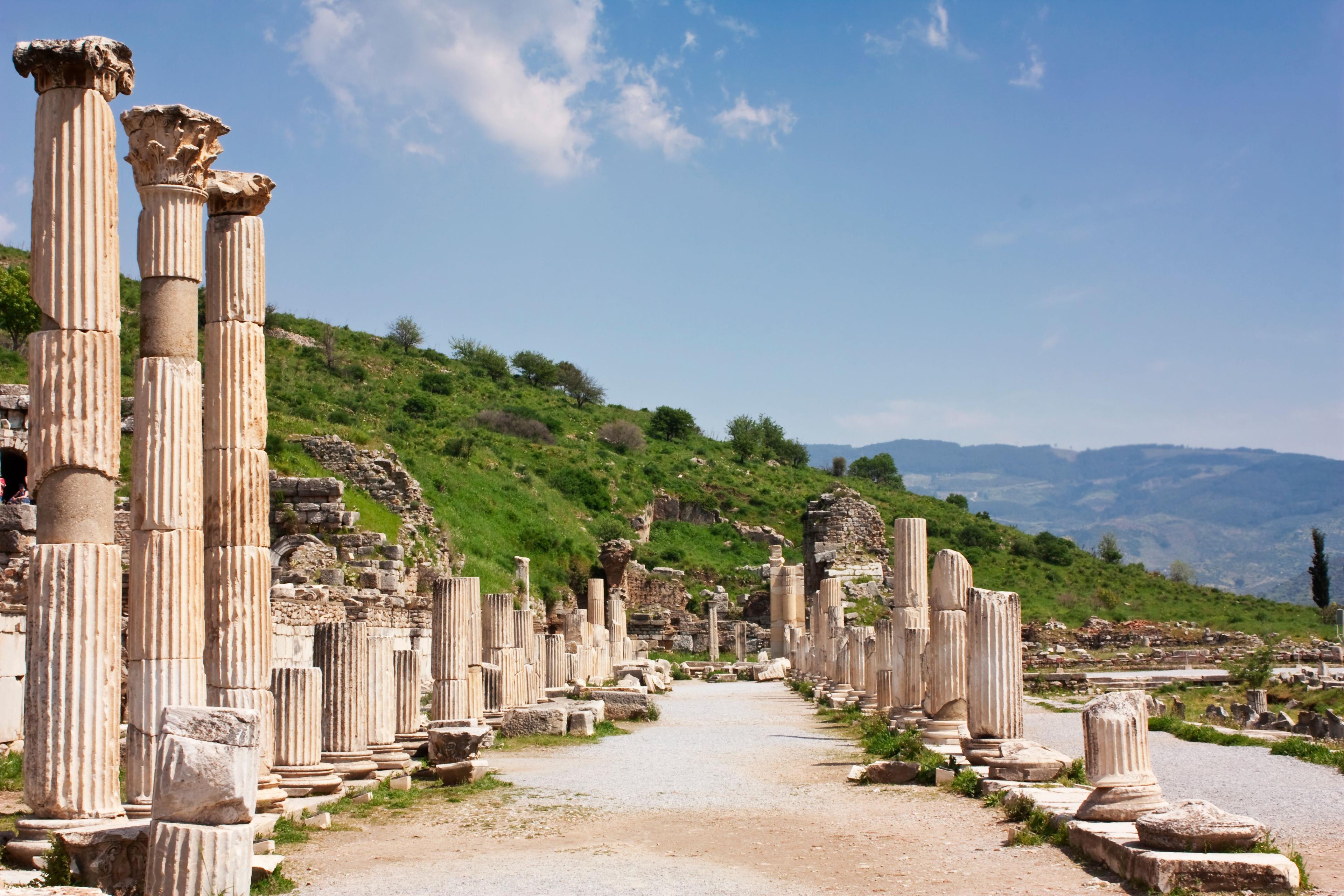
Uncovering Izmir's Ancient Wonders with Tradition Tours | Tradition Tours
Have you ever wondered about the tales hidden within Izmir's age-old ruins? Join us on an enthralling tour, where we reveal the rich tapestry of history and the stunning vistas of Izmir's archaeological marvels and its surrounding area. Prepare for an unforgettable journey into history, tailored just for you with our customized private tours, including options perfect for senior travelers and those interested in spiritual paths, such as our guided private church tours. Izmir, cradled by Turkey's western shores, offers a unique blend of the contemporary and the historical. This city, steeped in history, invites you on a personalized voyage through epochs past, making it ideal for those captivated by the remnants of ancient civilizations. Our private tours ensure a comfortable and enriching experience, allowing you to explore at your own pace.
Ephesus: A Glimpse into Roman Grandeur
Ephesus, a cornerstone of our "Footsteps of Paul Ephesus travel packages," is a marvel of Roman engineering. It was once a bustling metropolis and is a testament to ancient architectural prowess. Stroll down its marble pathways on a private tour, immersing yourself in the city's storied past, from the grand Library of Celsus to the awe-inspiring Great Theatre.
Pergamon: Where Culture and Healing Meet
Our guided private church tours often include Pergamon, which is renowned for its cultural and scientific achievements. Explore the Acropolis and the Asklepieion at your leisure, delving into ancient healing practices and the city's role as a significant cultural hub. These personalized tours are designed to offer deep insights into the intellectual life of the ancient world.
Smyrna Agora: Reliving Ancient Market Days
In the heart of modern Izmir lies the Agora of Smyrna, once the city's bustling marketplace. Today, it's an open-air museum where you can explore ancient shops and public buildings. Our customized private tours allow you to relive the vibrant market days of old, providing a tangible connection to daily life in ancient Smyrna.
Teos: A Sanctuary for Artists
Teos, an ancient Ionian port, was celebrated for its contributions to art and literature. The remains of its grand theatre and the temple of Dionysus highlight the city's cultural significance. Our customized private tours to Teos offer a serene backdrop for those wishing to reflect on the artistic endeavors of ancient times, making it a perfect addition to any cultural itinerary.
Let's Journey Together
With Tradition Tours, Izmir's historical tapestry comes to life, offering a deep dive into the annals of time. From the grandeur of Ephesus and the intellectual might of Pergamon to the lively Agora of Smyrna and Teos's creative spirit, our tours provide an unparalleled opportunity to immerse yourself in history. Whether you're interested in our "Footsteps of Paul Ephesus travel packages" or seeking a customized experience tailored to your pace and interests, we're here to guide you. Ready to explore these wonders yourself? Contact Tradition Tours to embark on your adventure.
APRIL SALE: Discover and book at up to 60% off!
Budget Tours & Trips to Israel
Discover a varied offer of budget Israel and Holy Land adventures that will take you through some of the most renowned destinations such as Jerusalem and Nazareth. Each affordable tour will provide you with memorable experiences for some of the lowest prices on the market. Discover the best budget trips around the world with TourRadar!
67 Budget Israel tour packages with 242 reviews
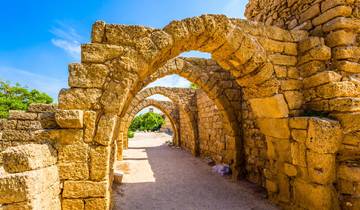
- In-depth Cultural
- Sightseeing
The Story of the Israeli State - 10 Days
My husband and I had never been to Israel and booked this tour as a “bucket-list” event. Our tour guide, Efraim Native, was the best - he was a history professor, knew philosophy, religion, politics, economics, abd engineering - answering every question we had. He was friendly, helpful and made excellent food recommendations. Our tour covered Tel Aviv (our new favorite city), Haifa, the Golan (do not miss the Hula Nature Preserve), and Jerusalem (Old and New). We added the Masada/Dead Sea tour at the end. Finally, we chose the 5-Star hotel option and stayed in true luxurious accommodations). We will use Tour Radar and Click Tours again!
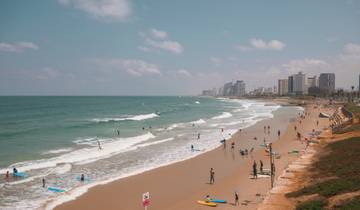
- Christmas & New Year
Tel Aviv, Jerusalem and Dead Sea 4-Day Excursion
Amir was great, shared a lot of history about Jerusalem and we had a wonderful time learning about our surroundings with him!
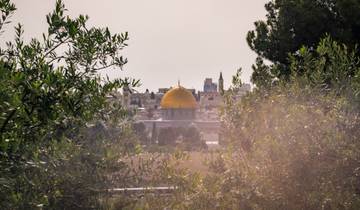
Jerusalem and Dead Sea 4-Day Journey
Really enjoyed it. The tour guides are very knowledgeable.
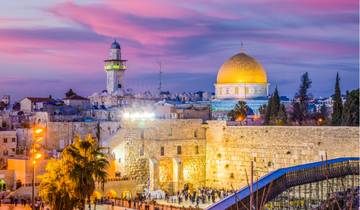
Highlights of the Holy Land Best Experience - 8 Days
It was such an excellent tour specially for first timer to visit Israel . I think I will come back to get more focus and time on the holy places that is important in my religion. I understand why we were not able to spend more time in some places like church of sepulcher because of long line. For people who expect more time in this places should book a tour faith based. This tour gave me a lot of information, overview of the holy land and important historical places , UNESCO sites for such short amount time . Claude our tour guide and elan bus driver were excellent. I’ll give them 5 stars . Thank you .
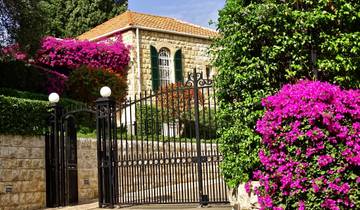
Holy Land Discovery - Faith-Based Travel - Catholic Itinerary
Amazing and the tour guide was a+ in his knowledge of history, culture exceptional value !
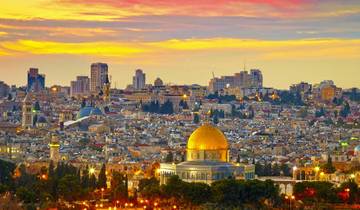
- Coach / Bus
Biblical Israel - Faith-Based Travel - Protestant Itinerary
Trip duration was 8 days but only 5 full days and we need to pay extra for 1 more day excursion. Breakfasts and dinners included and they're good.
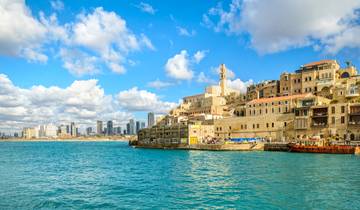
8 Day Budget Travel Package Israel & Jordan
Beautifully organized trip, the sites were amazing, very knowledgeable guides and friendly staff, they made my journey an unforgettable one
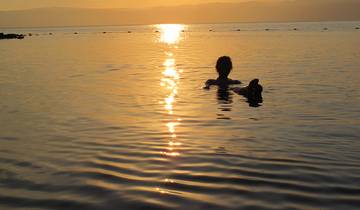
Highlights of Israel
Optional could have been offered/suggested for the last day in Jerusalem with many of us on later departures.
- 10% deposit on some dates Some departure dates offer you the chance to book this tour with a lower deposit.
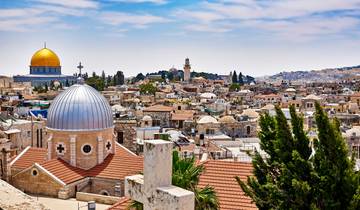
Egypt, Jordan & Israel - 14 days

Moses to Jesus: Egypt, Israel & Jordan - 11 days
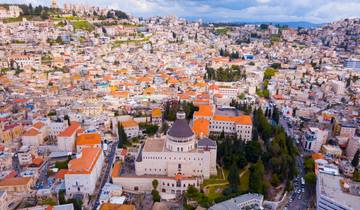
Israel & Jordan – 10 Day Budget Travel Package
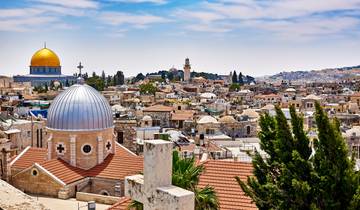
Jerusalem, Masada & Dead Sea, 3 Days
Sorry I forgot name of guide for the City of David he did a fantastic job. The trip was well organized and I will recommend it to my friends and family. Shalom
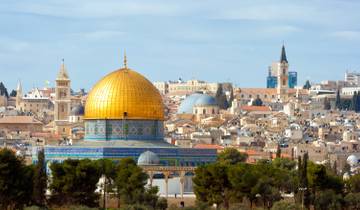
Biblical Israel and Jordan 7 days (Single, 4* Hotel)
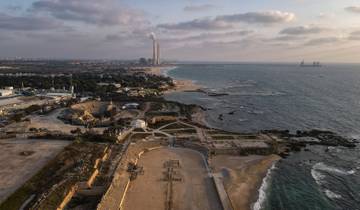
10 Days Tour in Holy Cities & Jordan.
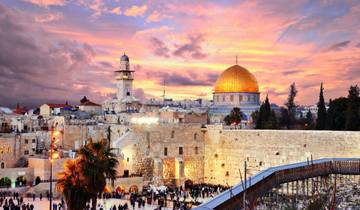
Highlights of Israel and Jordan - 11 days
Tour was excellent. I am very happy. thanks
What people love about Budget Tours in Israel
The tour was amazing! Masada sunrise - Ein Gedi - the Dead Sea - a wonderful mix of mountain hiking (not easy, but such a satisfaction from a successful ascent!), walking in the park and then relaxing in the Dead Sea. Jerusalem - history and modernity - it was interesting to see two sides of this city. And a cherry on the cake - a Tel Aviv bike tour - it was fantastic! Architecture, parks, history and especially the promenade - I enjoyed it so much! And also a complete delight from the hostel! There is a lovely lounge where a lot of events, nice bar and rooftop for guests to relax. Stunning atmosphere! The staff is friendly and professional - any help at any time. Thank you all, guys, you are amazing!
top experience thank you
More Budget Tours in Israel
- Holy Land tours (12)
- Northern Israel tours (5)
- Budget Family tours (62)
- Budget In-depth Cultural tours (51)
- Budget Christmas & New Year tours (26)
- Budget Explorer tours (14)
- Budget Active tours (10)
- Budget Sightseeing tours (10)
- Budget Historical tours (10)
- Israel Travel Guide | All You Need to Know
Travel Styles
- Singles and Solo (213)
- For Couples (124)
- Seniors (145)
Winter is here! Check out the winter wonderlands at these 5 amazing winter destinations in Montana
- Travel Destinations
- Africa & Middle East
How Much Does A 10-Day Trip To Israel Cost?
Published: November 14, 2023
Modified: December 28, 2023
by Raine Alger
- Budget Travel
Introduction
Planning a trip to Israel is an exciting prospect. With its rich history, diverse culture, and breathtaking landscapes, this small but dynamic country has something to offer every traveler. From exploring ancient sites in Jerusalem to relaxing on the beautiful beaches of Tel Aviv, there are endless possibilities for a memorable journey.
However, before setting off on your adventure, it’s important to have a clear understanding of the costs involved. Budgeting for your trip can help you make the most of your time in Israel without breaking the bank.
In this article, we will guide you through the various aspects of planning a 10-day trip to Israel, including the average expenses you can expect to encounter. From flights and accommodation to food, transportation, and activities, we will provide you with a comprehensive overview to help you plan your budget effectively.
Please note that the costs mentioned in this article are based on average prices and may vary depending on your travel style, preferences, and the time of your visit. It’s always a good idea to research and compare prices beforehand to get a better idea of your specific expenses.
So, whether you’re a history enthusiast, a beach lover, or an adventure seeker, let’s dive into the details of how much a 10-day trip to Israel might cost and help you plan your dream vacation.
Flight Expenses
One of the major factors influencing the cost of your trip to Israel is the price of your flights. The cost of airfare can vary depending on several factors, such as the time of the year, the airline you choose, and how far in advance you book.
If you are flying from the United States or Europe, you can expect to pay anywhere between $500 to $1500 for a round-trip ticket to Israel. Prices tend to be higher during peak travel seasons, such as summer and major holidays, while you may find better deals during the shoulder seasons of spring and fall.
To save on flight expenses, it’s a good idea to book your tickets in advance and be flexible with your travel dates. Additionally, consider flying into and out of alternative airports or using flight comparison websites to find the best deals.
Keep in mind that some airlines offer direct flights to Tel Aviv, Israel’s main international airport, while others may have layovers in major transit hubs. It’s important to factor in the duration of layovers and consider if it’s worth paying a bit more for a more convenient and time-saving itinerary.
Another point to consider is the cost of any additional baggage you may need to check in. Each airline has its own baggage policy, and exceeding the allowed weight or size limits can result in additional fees. To avoid unexpected expenses, make sure to check the baggage rules of the airline you choose and pack accordingly.
Overall, it’s best to allocate a significant portion of your budget for flights, as they can be a substantial expense. By planning ahead and exploring different options, you can find affordable flights and maximize your budget while still enjoying a comfortable journey to Israel.
Accommodation Costs
When it comes to accommodation in Israel, there are a wide range of options to suit different budgets and preferences. From luxury hotels to budget hostels and vacation rentals, you can find something that fits your needs.
In popular tourist cities like Jerusalem and Tel Aviv, the cost of accommodation tends to be higher compared to smaller towns and rural areas. On average, a mid-range hotel in these cities can cost anywhere from $100 to $300 per night. If you’re looking for more budget-friendly options, you can find comfortable guesthouses or hostels for around $50 to $100 per night.
If you prefer a more authentic and immersive experience, consider staying in guesthouses or bed and breakfast accommodations. These often offer a more personalized and locally-inspired stay, providing a unique glimpse into Israeli culture.
Another alternative is vacation rentals, such as apartments or villas, which can be a cost-effective option for families or groups. Websites like Airbnb offer a variety of properties in different price ranges, allowing you to choose the accommodation that best suits your budget and requirements.
For those who are willing to immerse themselves in nature, camping is a popular option in Israel. There are many designated camping sites across the country, offering basic facilities and a chance to sleep under the stars. This can be an affordable way to experience the beauty of Israel’s landscapes, with camping fees usually ranging from $10 to $30 per night.
When planning your accommodation budget, also keep in mind that prices may vary depending on the time of year and any special events or holidays. It’s advisable to book your accommodation in advance, especially during peak travel seasons, to secure the best rates and availability.
Overall, there are plenty of accommodation options available in Israel catering to different budgets. By doing some research and comparing prices, you can find the right accommodation that not only fits your budget but also enhances your overall travel experience in Israel.
Transportation Costs
Getting around in Israel is relatively easy, thanks to its well-developed transportation system. To explore the different attractions and cities in the country, you have various options to consider.
One of the most popular ways to travel within Israel is by using public transportation. The country has an extensive network of buses and trains, which are efficient and affordable. Bus fares typically range from $1 to $10, depending on the distance traveled. Train tickets are also reasonably priced, with fares starting at around $7 for short journeys.
In major cities like Jerusalem and Tel Aviv, you can also use public transportation, including buses and light rail. These options are convenient and cost-effective, with fares typically ranging from $1 to $3 per ride.
If you prefer more flexibility and convenience, you may consider renting a car. Rental prices can vary depending on the type of vehicle, rental duration, and the rental company. On average, expect to pay around $40 to $100 per day for a standard car rental. It’s important to factor in additional costs like fuel, parking fees, and tolls when budgeting for a rental car.
For shorter distances or sightseeing within a specific area, taxis and ride-sharing services like Uber are available in major cities. Be aware that taxi fares in Israel are metered and can vary depending on the distance traveled and traffic conditions.
When exploring the beautiful coastal areas, consider taking advantage of the bike-sharing programs available in cities like Tel Aviv, Haifa, and Eilat. These programs offer a convenient and eco-friendly way to get around, with prices starting as low as $5 per hour.
Overall, transportation costs in Israel can vary depending on your preferred mode of travel. Using a combination of public transportation, rental cars, and occasional taxis or ride-sharing services can help you make the most of your trip while keeping transportation expenses within your budget.
Food and Dining Expenses
Israeli cuisine is a wonderful blend of Middle Eastern, Mediterranean, and Jewish influences, and experiencing the local food scene is an essential part of any trip to Israel. When budgeting for your 10-day trip, it’s important to consider the costs of food and dining.
In Israel, you can find a variety of dining options to suit all budgets. From street food stalls and casual eateries to upscale restaurants, there is something for everyone. On average, you can expect to spend around $10 to $20 per person for a meal at a budget-friendly restaurant or a street food joint.
If you prefer to cook your own meals or have a more budget-conscious approach, consider shopping at local markets and grocery stores. This allows you to try out fresh produce, Israeli snacks, and local products while saving some money. You can easily find grocery stores and supermarkets throughout the country, offering a wide range of options.
For a special dining experience, indulging in Israeli cuisine at mid-range or high-end restaurants can cost anywhere from $30 to $100 per person, depending on the restaurant and the dishes chosen. These restaurants often offer a diverse menu, incorporating traditional Israeli flavors with contemporary twists.
Don’t forget to try some of the local specialties during your trip, such as falafel, hummus, shawarma, and fresh seafood. These dishes can often be found at affordable prices in street-side restaurants or market stalls.
When it comes to drinks, tap water in Israel is safe to drink. However, if you prefer bottled water, it is readily available at convenience stores and supermarkets. In terms of alcoholic beverages, beer and wine are popular choices, with an average cost of around $5 to $10 per drink.
Lastly, don’t forget to factor in the costs of snacks and drinks during your sightseeing and exploration. It’s always good to have some extra budget for local treats or a coffee break in charming cafes.
Overall, the cost of food in Israel can vary depending on your dining choices. By balancing local eateries, markets, and enjoyable dining experiences, you can savor the diverse flavors of Israeli cuisine while keeping your food expenses within your budget.
Sightseeing and Activities
Israel is renowned for its rich history, cultural landmarks, and stunning landscapes, offering a wide range of sightseeing and activities for travelers. While some attractions have entrance fees, others are free to explore or require a small donation.
One of the must-visit attractions in Israel is the Old City of Jerusalem, home to religious sites like the Western Wall, the Church of the Holy Sepulchre, and the Dome of the Rock. Entrance to these sites is usually free, but donations are appreciated. Other popular attractions in Jerusalem, such as the Israel Museum or the Tower of David, charge admission fees ranging from $10 to $20.
In Tel Aviv, you can visit the vibrant Carmel Market, stroll along the promenade of the Mediterranean Sea, or explore the Tel Aviv Museum of Art. Most museums and art galleries in Tel Aviv have entrance fees of around $10 to $15.
If you’re interested in nature and outdoor activities, you can explore the beautiful Masada fortress or hike in the stunning landscapes of the Negev Desert. National parks and nature reserves in Israel usually charge entrance fees of around $5 to $10 per person.
Another popular destination is the Dead Sea, where you can float in its salt-rich waters and enjoy mud baths. Access to the public beaches at the Dead Sea is usually free, but if you want to visit one of the private beach resorts, you may have to pay a fee of around $20 to $30.
It’s also worth considering any guided tours or excursions you may want to join during your trip. The cost of guided tours depends on the duration and the specific activity, ranging from $50 for a half-day tour to a few hundred dollars for a multi-day excursion.
Remember to allocate some budget for souvenirs and shopping as well. Israel is known for its unique crafts, artisanal products, and traditional souvenirs, which you can find in local markets and tourist shops throughout the country.
Overall, the cost of sightseeing and activities in Israel can vary depending on your preferences and the specific attractions you choose to visit. By planning ahead and prioritizing your must-see sights, you can make the most of your trip and create unforgettable memories without overspending.
Visa and Travel Insurance Costs
Before traveling to Israel, it’s important to ensure that you have the necessary documentation in place. Depending on your nationality, you may need a visa to enter the country. Fortunately, many nationalities are entitled to a free tourist visa upon arrival, which is valid for a stay of up to 90 days.
However, it’s important to check the visa requirements for your specific country of origin to ensure a smooth entry into Israel. If you are planning to stay in Israel for longer than the allotted visa-free period, you will need to apply for a visa in advance through the Israeli embassy or consulate in your home country. Visa fees vary depending on your nationality and the type of visa you require.
Travel insurance is another crucial aspect to consider when planning your trip to Israel. While it’s not mandatory to have travel insurance, it is highly recommended to cover unexpected medical expenses, trip cancelations or delays, and lost or stolen belongings.
The cost of travel insurance can vary depending on factors such as your age, duration of the trip, and the coverage you require. On average, travel insurance for a 10-day trip to Israel can range from $30 to $100 per person.
Before purchasing travel insurance, carefully review the policy coverage, exclusions, and any pre-existing condition limitations. It’s also a good idea to compare different insurance providers to ensure you get the best coverage at the most affordable price.
Having appropriate travel insurance provides peace of mind and protects you from potential financial burdens in case of unforeseen circumstances during your trip to Israel.
In summary, make sure to check the visa requirements for your nationality and allocate a budget for any visa fees. Additionally, consider investing in travel insurance to protect yourself from unexpected expenses and ensure a worry-free journey.
Additional Expenses
When planning your budget for a 10-day trip to Israel, it’s important to consider additional expenses that may arise during your journey. These miscellaneous costs can vary depending on your personal preferences and travel style.
One common additional expense is tipping. In Israel, it is customary to leave a gratuity of around 10-15% at restaurants and for services such as taxi rides or guided tours. While tipping is not mandatory, it is appreciated and considered a common courtesy.
If you plan on using your mobile phone during your trip, be aware of potential roaming charges. It’s advisable to check with your mobile provider beforehand to understand their international roaming plans or consider purchasing a local SIM card for your phone.
Another expense to consider is souvenirs and gifts. Israel offers a wide range of unique and traditional products that make for great gifts or mementos. Whether it’s jewelry, ceramics, or Dead Sea products, be sure to allocate some budget for shopping during your trip.
Additionally, it’s a good idea to set aside some money for unexpected expenses or emergencies. While we hope nothing goes wrong, having a contingency fund can alleviate stress if any unforeseen situations arise, such as lost belongings or health-related issues.
If you plan to participate in outdoor activities such as hiking or visiting national parks, you may need to purchase appropriate gear or equipment. It’s important to factor in the cost of any necessary equipment rentals or purchases.
Lastly, don’t forget to consider the cost of airport transfers to and from your accommodation. Depending on your arrival time and location, you may need to take a taxi or arrange for a private transfer. Researching the options in advance can help you budget accordingly.
By accounting for these additional expenses, you can ensure that you have a comfortable and stress-free trip to Israel without any financial surprises along the way.
Planning a 10-day trip to Israel can be an exciting and enriching experience. By taking the time to understand the various costs involved, you can create a budget that allows you to make the most of your time in this captivating country.
Flight expenses can be a significant part of your budget, but by booking in advance and exploring different airlines and options, you can find affordable fares. Accommodation costs vary depending on your preferences, with options ranging from budget-friendly hostels to luxurious hotels and vacation rentals.
Transportation costs in Israel are reasonable, with public transportation offering an efficient and affordable means of getting around. If you prefer more convenience and flexibility, renting a car is also an option to consider.
When it comes to food and dining, Israel offers a delightful culinary experience. From street food to fine dining, there are options to suit all budgets. Sampling local delicacies and exploring the diverse food scene can be an enjoyable part of your journey.
As you explore Israel’s historical sites, natural landscapes, and cultural attractions, there may be entrance fees to consider. Planning ahead, prioritizing your must-see sights, and considering any guided tours or excursions can help you stay within your sightseeing and activities budget.
Don’t forget to allocate budget for visa fees and travel insurance, as these are essential aspects of any trip. Finally, accounting for additional expenses, such as tips, souvenirs, and unexpected costs, ensures that you have a well-rounded budget that encompasses all aspects of your trip.
By taking the time to plan and budget accordingly, you can embark on a memorable 10-day adventure in Israel, creating lifelong memories without compromising your financial well-being.
So pack your bags, embrace the spirit of adventure, and get ready to discover the wonders of Israel!

- Privacy Overview
- Strictly Necessary Cookies
This website uses cookies so that we can provide you with the best user experience possible. Cookie information is stored in your browser and performs functions such as recognising you when you return to our website and helping our team to understand which sections of the website you find most interesting and useful.
Strictly Necessary Cookie should be enabled at all times so that we can save your preferences for cookie settings.
If you disable this cookie, we will not be able to save your preferences. This means that every time you visit this website you will need to enable or disable cookies again.
- Election 2024
- Entertainment
- Newsletters
- Photography
- Personal Finance
- AP Investigations
- AP Buyline Personal Finance
- AP Buyline Shopping
- Press Releases
- Israel-Hamas War
- Russia-Ukraine War
- Global elections
- Asia Pacific
- Latin America
- Middle East
- Election Results
- Delegate Tracker
- AP & Elections
- Auto Racing
- 2024 Paris Olympic Games
- Movie reviews
- Book reviews
- Personal finance
- Financial Markets
- Business Highlights
- Financial wellness
- Artificial Intelligence
- Social Media
Austin tells Congress Israel is taking steps to boost aid to Gaza as lawmakers question US support
U.S. Senate Armed Services Committee hears from Secretary of Defense Lloyd Austin and Chairman of the Joint Chiefs of Staff General Charles Brown on the budget for fiscal year 2025 and other issues.
Secretary of Defense Lloyd Austin testifies before Senate Committee on Armed Services during a hearing on Department of Defense Budget Request for Fiscal Year 2025 and the Future Years Defense Program on Capitol Hill in Washington, Tuesday, April 9, 2024. (AP Photo/Jose Luis Magana)
- Copy Link copied
Secretary of Defense Lloyd Austin accompanied by Chairman of the Joint Chiefs of Staff Gen. Charles Brown Jr. testifies before Senate Committee on Armed Services during a hearing on Department of Defense Budget Request for Fiscal Year 2025 and the Future Years Defense Program on Capitol Hill in Washington, Tuesday, April 9, 2024. (AP Photo/Jose Luis Magana)
FILE - Secretary of Defense Lloyd Austin testifies before Senate Committee on Armed Services during a hearing on Department of Defense Budget Request for Fiscal Year 2025 and the Future Years Defense Program on Capitol Hill in Washington, April 9, 2024. Austin has spoken with China’s national defense minister in the latest in a series of U.S. steps to improve communications with the Chinese military and reduce unsafe and aggressive incidents in the Indo-Pacific. It is the first time Austin has talked to Adm. Dong Jun. And it’s the first time he has spoken at length with any Chinese counterpart since November 2022. (AP Photo/Jose Luis Magana, File)
WASHINGTON (AP) — Defense Secretary Lloyd Austin told Congress Tuesday that pressure on Israel to improve humanitarian aid to Gaza appears to be working, but he said more must be done, and it remains to be seen if the improvement will continue.
“It clearly had an effect. We have seen changes in behavior, and we have seen more humanitarian assistance being pushed into Gaza,” Austin said in a Senate Armed Services Committee hearing. “Hopefully that trend will continue.”
Austin’s comments came during a session that was interrupted several times by protesters shouting at him to stop sending weapons to Israel. “Stop the genocide,” they said, as they lifted their hands, stained in red, in the air. A number of senators also decried the civilian casualties, saying the administration needs to do more to press Israel to protect the population in Gaza.
In response, Austin said he spoke with his Israeli counterpart, Defense Minister Yoav Gallant, on Monday and that he repeated U.S. insistence that Israel must move civilians out of the battlespace in Gaza and properly care for them.
Austin and Joint Chiefs Chairman Gen. CQ Brown Jr. were testifying on Capitol Hill about the Pentagon’s $850 billion budget for 2025. But the hearing offered the first chance for lawmakers on both sides to question the Pentagon’s top civilian and military leadership on the administration’s Israel strategy following Tel Aviv’s deadly strike on World Central Kitchen humanitarian aid workers in Gaza.
That strike led to a shift in tone from President Joe Biden on how Israel must protect civilian life in Gaza and drove dozens of House Democrats, including former House Speaker Nancy Pelosi, to call on Biden to halt weapons transfers to Israel. Half the population of Gaza is starving and on the brink of famine due to Israel’s tight restrictions on allowing aid trucks through.
Israel in recent days took initial steps to increase the flow of humanitarian aid into Gaza. In a call Friday, Biden told Israeli Prime Minister Benjamin Netanyahu that future U.S. support for the war in Gaza depends on Israel taking more action to protect civilians and aid workers.
At the hearing, Austin also said that the military is moving ahead with plans to build a pier off the Gaza coast to increase the delivery of humanitarian aid, and initial operations will probably be ready to start by the third week of this month. He said that details are still being worked out but that aid organizations will help do that.
Six U.S. military ships with personnel and components to build a humanitarian aid pier are enroute to Gaza, with several in the Mediterranean Sea, heading toward Cyprus.
The war, now in its seventh month , has killed more than 33,000 Palestinians, mostly women and children, according to local health authorities. Israeli authorities say 1,200 people, mostly civilians, were killed and roughly 250 people taken hostage in Hamas’ Oct. 7 attack.
In their opening statements, both Austin and Brown emphasized that their 2025 budget is still shaped with the military’s long-term strategic goal in mind — to ready forces and weapons for a potential future conflict with China. About $100 billion of this year’s request is set aside for new space, nuclear weapons and cyber warfare systems the military says it must invest in now before Beijing’s capabilities surpass it.
But the conflicts in Ukraine and Israel are challenging a deeply-divided Congress and have resulted in months of delays in getting last year’s defense budget through, which was only passed by lawmakers a few weeks ago.
Ukraine’s president Volodymyr Zelenskyy has issued desperate pleas that if the U.S. does not help soon, Kyiv will lose the war to Russia.
The Pentagon scraped together about $300 million in ammunition to send to Kyiv in March but cannot send more without Congress’ support, and a separate $60 billion supplemental bill that would fund those efforts has been stalled for months.
“The price of U.S. leadership is real. But it is far lower than the price of U.S. abdication,” Austin told the senators.
If Kyiv falls, it could imperil Ukraine’s Baltic NATO member neighbors and potentially drag U.S. troops into a prolonged European war. If millions die in Gaza due to starvation, it could enrage Israel’s Arab neighbors and lead to a much wider, deadlier Middle East conflict — one that could also bring harm to U.S. troops and to U.S. relations in the region for decades.
Israel’s actions in Gaza have been used as a rallying cry by factions of Iranian-backed militant groups, including the Houthis in Yemen and Islamic Resistance groups across Iraq and Syria, to strike at U.S. interests. Three U.S. service members have already been killed as drone and missile attacks increased against U.S. bases in the region.
Lawmakers are also seeing demands at home. For months, a handful of its far-right members have kept Congress from approving additional money or weapons for Ukraine until domestic needs like curbing the crush of migrants at the southern U.S. border are addressed. Republican House Speaker Mike Johnson is already facing a call to oust him as speaker by Georgia Republican Rep. Marjorie Taylor Greene because Johnson is trying to work out a compromise that would move the Ukraine aid forward.

- Share full article
For more audio journalism and storytelling, download New York Times Audio , a new iOS app available for news subscribers.
Iran’s Unprecedented Attack on Israel
A yearslong shadow war between the countries burst into the open after tehran fired hundreds of drones and missiles..
This transcript was created using speech recognition software. While it has been reviewed by human transcribers, it may contain errors. Please review the episode audio before quoting from this transcript and email [email protected] with any questions.
I’m Isabel Kershner in Jerusalem. It’s coming up to about 5:30 AM at the end of a very long and surreal night here. For the first time in Israel’s history, the country came under a direct attack from Iran.
This night started ominously, with cancellations of all educational activities for Sunday morning, then the reports on TV that the airport was closing down after midnight. And then —
[SPEAKING HEBREW]
— came the announcement that swarms of drones were actually on their way.
There were lots of diagrams on TV — how long it takes drones to arrive, how long it takes cruise missiles to arrive, how long it takes ballistic missiles to arrive. So everybody was basically up and waiting.
Sure enough, it’s about 2:00 AM, air raid sirens were going off in Jerusalem, very quickly followed by a long series of booms in the sky and flashes of light.
My apartment building woke up. It came to life. The neighbors were sitting on the stairs in the stairwell. Everybody in this country is used to incoming rocket fire.
It was a fairly relaxed atmosphere, but quite surreal and bizarre, nonetheless.
And now, dawn is just about breaking. I can hear birdsong. And we’re being told, it’s not over. There will be some kind of Israeli response. And the question is whether that will be wrapped up within a couple of days or whether we are entering into an unprecedented regional war.
From The New York Times, I’m Sabrina Tavernise, and this is “The Daily.”
Overnight on Saturday, Iran launched its first direct attack on Israeli soil, shooting hundreds of missiles and drones at multiple targets around the country. Today, my colleague, Eric Schmidt, on what happened and what it means for the risk of a broader war in the Middle East.
It’s Monday, April 15.
So Eric, we witnessed this extraordinary attack overnight on Saturday against Israel by Iran — missiles, drones lighting up the sky in multiple locations around the region. The whole country was really on high alert. I was watching in New York. And it really was like the whole world was holding its breath with this attack. Tell me what happened.
At around 9 o’clock Israel time, we started to get intelligence that the Iranians had launched a first wave of attack drones.
Iran has basically three buckets of weapons that they’re launching over time against Israel.
So the drones come first. They’re packed with explosives, relatively slow-moving, make a lot of noise with their buzzing. It goes on. People can actually see them.
The next wave that’s coming after this are cruise missiles. These are larger missiles, guided, that are headed toward Israel at the same time, faster-moving. Then finally, the Iranians launch as many as 100 ballistic missiles. Ballistic missiles are the fastest-moving missiles. They carry a big payload. And what makes them so dangerous is that, especially if launched in large numbers, they can overwhelm defenses on the ground.
You’ve got well over 300 drones and missiles of different kinds that have been engaged. But the thing you have to know about these 300 weapons is that the vast majority of them are actually shot down, mostly by Israel, but also by allies, like the United States, Britain, and Jordan. And in the end, only a dozen or so, maybe a few more, actually impact on Israeli territory.
So where do these missiles actually hit?
So you have some damage to this airbase in the Negev Desert. You have military targets in the Golan Heights. You have some injuries on the ground. About a dozen or so civilians are injured. And it’s unclear whether it’s from the blasts themselves or, more likely, from some of the shrapnel and debris that’s falling from the sky. There was one seven-year-old girl, for instance, who was severely wounded outside of Arad, Israel, a Bedouin Arab, but no fatalities that we know of so far and no major injuries, which is — given the scale of this attack, is really quite remarkable.
And Eric, walk me through why this Iranian attack was so clearly repelled.
Well, there are several main reasons. One is that the Israelis have a very sophisticated layer of defenses. The best-known of them is called Iron Dome. But it seems, here, it was another defense technology, called Arrow System, that shoots down ballistic missiles that was particularly effective. And in addition to Israel’s already very strong defenses, you have a number of Israel’s allies, principally the United States, that it’s engaging with their combat planes. They’ve got F-15 fighter jets up in the sky that are shooting down, we were told, more than 70 of these exploding drones.
And then you’ve got a couple of US Navy destroyers off the coast of Israel in the Eastern Mediterranean Sea. They take down as many as six of these ballistic missiles. The other thing that’s obviously important is that Iran gave everyone a lot of warning this was going to happen. And we didn’t know exactly which bases they were going to shoot at. We didn’t know exactly what part of the country was going to be attacked. But it became pretty clear in the messaging that Iran did beforehand that they weren’t going to attack major cities. That wasn’t the goal here. That wasn’t the objective. It was going to go after military targets. And the way they did it was pretty much as US officials expected the Iranians to do.
So Eric, it seems like, really, at the end of the day, this attack, despite its unprecedented nature, was actually, really, not nearly as bad as it could have been from the Israeli perspective. But why did Iran attack Israel to begin with?
Yeah, I mean, as you said, this is really, from the US and Israeli perspective — given the vast number of drones and missiles that were launched at Israel, this was a win that they were able to get out of this crisis with relatively little damage on the ground and all that. But for the Iranians, you have to understand — well, what prompted this in the first place?
The latest now from the Middle East, Syrian state media reporting that an airstrike hit Iran’s consular building in Syria today.
And what this is really all about was retaliation for a strike on April 1 that the Israelis carried out in Damascus, Syria.
Damascus has reportedly killed seven members of Iran’s Islamic Revolutionary Guards Corps.
Among the dead pulled from the rubble, a high-ranking Iranian military leader.
And even though the Israelis haven’t come out and formally acknowledged this, it’s clear that Israel is behind this.
Mohammad Zahedi, one of the leaders of Iran’s Revolutionary Guard Corps, a commander that was involved in the weapons shipments to groups like Hezbollah and Iran-backed Syrian Shia militias, has been targeted in an Israeli airstrike this afternoon.
These weren’t just any old Iranian officers. These were a couple of their top generals and other senior officials from a group called the Quds Force. It’s a wing of the Iranian security services that carries out covert operations across the region in places like Gaza, in places like Lebanon. These are the actors that organize the very attacks against Israel.
Israel has long targeted Iranian military installations in Syria. Monday’s attack marked the first time Iran’s embassy compound itself had been hit.
But the other important thing — these guys weren’t killed on some dusty road in a military truck in some battlefield or anything like this, they were in a diplomatic facility. This is essentially their sovereign soil in a foreign country. And if that’s violated, it’s a big deal.
So for the Iranians, it’s not just the loss of these key operatives in this covert organization that carries out some of their most sinister activities, but it’s almost as if you’re carrying out a strike on Iranian soil itself, this embassy complex. And they feel, they need to respond to this and respond in kind, respond in force.
Because carrying out an attack on Iranian soil, effectively, was really an audacious thing to do.
Absolutely. And this was so audacious that the Israelis didn’t tell their closest ally, the United States, until about five minutes before the strike is going to hit.
American officials were not happy. Not only does it create this diplomatic and security challenge, but it also — for Secretary of Defense Lloyd Austin, it presents a very serious problem about what will the response be and what kind of threats, now, will this pose to American troops in the Middle East?
So the US does something pretty unusual right away. One is they come out and say publicly that the Israelis didn’t give them any kind of advance notice of this. And the other thing they do that’s also unusual is the United States both publicly, but very much privately, starts to signal the Iranians through back channels that the US government had nothing to do with this attack on April 1 in the Damascus embassy. They had no prior knowledge of it and were not involved in it.
And so the message to the Iranians from Washington is don’t blame us. We know Israel is our key ally. But we had no idea this was coming. We don’t want to get caught in the blowback.
Interesting. So the Americans are basically saying, look, Israel, we’re in the middle of a pretty high-stakes situation here. There’s this war in Gaza. Proxies are firing rockets into your territory. It’s all on a hair’s trigger. Taking this shot at these Iranian military officials was not a good idea. How do the Israelis respond? What is their explanation to their American allies for killing this top Iranian commander on April 1?
Well, the Israelis are saying, look, these are the people that are planning attacks on us through their proxies. And we are in a war of survival with them. And they are the root of the problem that we are facing — not just in Gaza with Hamas, but with Hezbollah, with the Houthis in Yemen, with these militias in Iraq and Syria. Iran is behind all of these groups, these partners and proxies that they have.
And they’re willing to take the risk, despite the blowback that they almost certainly know will happen once they strike these Iranians in Syria. They’re willing to take it because they just don’t get opportunities like this very often. And they feel pretty confident that they can take a step like this, as risky it is and audacious as it is, because they’ve seen it work before.
We’ll be right back.
So Eric, why were the Israelis so confident that engaging with Iran in this risky way was something they were willing to gamble on? I mean, it resulted in this historic Iranian attack. So why risk something like that?
So the Israelis had been involved in a shadow war with Iran for years, where each side took shots at some of their senior military people or other operatives. But it’s always been below the radar, if you will. The Israelis’ strike on April 1 that precipitated this attack from Iran was a clear departure from that shadow war.
And I think one reason why Israel had that change in approach was because it was looking to a specific American action against Iran as a kind of a model.
In January 2020, the United States under President Trump made an extraordinary move. He went after a guy named Major General Qasem Soleimani.
Soleimani at the time was Iran’s most powerful security and intelligence commander. And he worked closely with Iraqi and Lebanese allies. He nurtured proxy forces to form a kind of Shiite axis of power throughout the whole region. Many in Iran lauded him as a hero, somebody who was essentially untouchable to the West.
And he was almost too big to kill. However, he’d also been long designated as a terrorist by the United States. And because many of his forces had been fighting against the United States after the United States invasion of Iraq. So Trump orders a strike to kill General Soleimani. He was on a visit to Iraq. And while he’s at the Baghdad airport, they take him out. And it’s just stunning.
I remember this strike because it was — everybody was saying, this is going to be the beginning of the end. I mean, this guy is the most important guy in many ways in Iran. And the United States just killed him.
Yeah. Yeah. Well, Trump said, he was plotting imminent and sinister attacks against American interests. That was his reasoning after the strike. But everybody was just waiting and holding their breath for what’s going to happen next. What will be Iran’s response to the death of their top general?
And sure enough, five days later, Iran responded. They launched more than a dozen ballistic missiles at Al-Asad airbase, a major American base in western Iraq, where hundreds of US service members are stationed.
The response was important, in Iran’s view. This is a major attack, again, using a very sophisticated weapon against an American base in Iraq. More than 100 Americans suffered brain injuries, but no one was killed. Given Soleimani’s position and the influence he had over covert operations, the Iranian attack could have been much worse.
In fact, the Iranians come out looking kind of restrained in the response.
Iran did not want a full-scale war with the United States at this point, despite their public remarks, despite the loss of this revered general. When push came to shove, at that point, they did not want to cross that line.
So what is the lesson in the Soleimani example for what we saw this past weekend, Eric? I mean, is it fair to say that, perhaps, the Israelis were right in their assumptions, that what we saw in how Iran prosecuted this attack on Saturday — the advanced warning, the slow rollout, the targeting of remote bases rather than urban centers — that all of this seems to have been done to send a signal and that that signal was that Iran is only willing to go so far?
Yes. They’re essentially maneuvering themselves to give them a way out. It’s an off ramp here by basically saying, OK, look, we’re done for these strikes for now. This has been a defensive measure. That’s how they’re calling it. That’s how they’re casting it. And basically, unless you Israelis want to ramp this thing up, we’re done. We’re done for now. And that seems to be where Iran wants to leave it.
And so the ball is in Israel’s court right now as to what the response will be next.
OK. So what do we know about what Israel’s thinking? What’s going to be Israel’s response?
So that’s the question everyone is asking right now. Israel’s closest and strongest ally, the United States, is pushing Israel to basically stop here President Biden spoke with Prime Minister Netanyahu and told him, hey, you got everything you wanted. You killed the generals. You staved off this massive Iranian attack. This basically could not have worked out any better for you. Take the out the Iranians are giving you. And let this be the end of it for now.
Look, we came to your aid when you were in need. We put our planes and our ships in harm’s way and helped knock down these missiles and drones. But we will not help you retaliate against Iran if that’s the decision you decide to make.
Eric, this strikes me as a pretty tricky moment for President Biden. Because he’s asking Netanyahu not to escalate. But at the end of the day, Netanyahu has lots of constituencies he’s dealing with. He’s under lots of pressure. And now that Iran has attacked like this directly, it’s going to be harder for Biden to use his leverage against Israel. So I guess the next question, then, is will Netanyahu actually take the win, as the Americans are advising him to do?
Well, and that’s the open question. You’ve got — in one ear, the Americans are telling him, stop, take the win. Don’t make this any worse. But in the other ear, you’ve got the far-right cabinet members saying, you cannot let this stand. You must strike aggressively back. You cannot do this. And so what you see in at least the early statements from — the Israelis are saying, look, we will continue to defend ourselves. And we will respond at a time and place of our choosing.
It’s sort of international speak for we’re going to do something, but we’re going to do it later.
That’s right.
And of course, were the hardliners in Netanyahu’s cabinet to win out, that, of course, would potentially spark the regional war that we’ve long been worrying about and have been talking to you for a long time about, Eric.
That’s right. And of course, that would have multiple effects. I mean, think about it. Just as there’s this huge debate, before all this happened, over the Israeli operation in Rafah and southern Gaza now, well, Israel’s ability already is so difficult to do that.
But can you imagine having to try and prosecute its mission of dismantling the last stronghold of Hamas in Gaza and having to fight some other kind of broader second or third front at the same time? As a whole, it would upset the stability of the entire region if this happens. And any escalation here would open the door to a much wider regional war.
So the question is will Israel bring us into one or will Iran lose patience and bring us into one from that side?
Yes. In the United States and Iran, they’re saying here, is this the line we’re willing to walk up to? And the question is whether Israel is willing to set that line or go further. You seem to have, in this case, the Iranians and the Americans, in a weird way, are kind of aligned in this, like, enough, enough already. And the Israelis — everybody’s leaning forward and saying, OK, now what? Is this going to get worse? And that’s what we just don’t know yet.
Eric, thank you.
On Sunday, the United Nations Security Council held an emergency meeting at the request of Israel, with diplomats urging restraint by all parties to prevent the conflict in the Middle East from escalating. The Secretary General of the UN, Antonio Guterres, told the Council that it was, quote, “time to step back from the brink.”
Here’s what else you should know today. On Friday, in a major turnaround, the House passed a reauthorization of a surveillance law that national security officials say is crucial to gathering intelligence and fighting terrorism, and civil liberties advocates say, improperly allows warrantless surveillance of American citizens. The law, known as the Foreign Intelligence Surveillance Act, or FISA, had stalled in the House just a few days before, when former President Donald Trump had urged lawmakers to kill it. But Republican Speaker Mike Johnson rescued it by putting forward a version that extends the law by just two years instead of the original five. That was enough to persuade hard-right Republicans, who had been blocking the bill, to vote for it.
And in Sydney, Australia, six people were killed and at least 12 others were injured in a stabbing rampage at a crowded shopping mall on Saturday. The attack was the deadliest act of mass violence in the country in years.
Today’s episode was produced by Rachelle Bonja, Alex Stern, and Luke Vander Ploeg. It was edited by Marc Georges, with help from Lisa Chow, contains original music by Dan Powell, Marion Lozano, Corey Schreppel, and Elisheba Ittoop and was engineered by Chris Wood. Our theme music is by Jim Brunberg and Ben Landsverk of Wonderly.
That’s it for “The Daily.” I’m Sabrina Tavernise. See you tomorrow.

- April 23, 2024 • 30:30 A Salacious Conspiracy or Just 34 Pieces of Paper?
- April 22, 2024 • 24:30 The Evolving Danger of the New Bird Flu
- April 19, 2024 • 30:42 The Supreme Court Takes Up Homelessness
- April 18, 2024 • 30:07 The Opening Days of Trump’s First Criminal Trial
- April 17, 2024 • 24:52 Are ‘Forever Chemicals’ a Forever Problem?
- April 16, 2024 • 29:29 A.I.’s Original Sin
- April 15, 2024 • 24:07 Iran’s Unprecedented Attack on Israel
- April 14, 2024 • 46:17 The Sunday Read: ‘What I Saw Working at The National Enquirer During Donald Trump’s Rise’
- April 12, 2024 • 34:23 How One Family Lost $900,000 in a Timeshare Scam
- April 11, 2024 • 28:39 The Staggering Success of Trump’s Trial Delay Tactics
- April 10, 2024 • 22:49 Trump’s Abortion Dilemma
- April 9, 2024 • 30:48 How Tesla Planted the Seeds for Its Own Potential Downfall
Hosted by Sabrina Tavernise
Featuring Eric Schmitt
Produced by Rachelle Bonja , Alex Stern and Luke Vander Ploeg
Edited by Marc Georges
With Lisa Chow
Original music by Dan Powell , Marion Lozano , Elisheba Ittoop and Corey Schreppel
Engineered by Chris Wood
Listen and follow The Daily Apple Podcasts | Spotify | Amazon Music
Overnight on Saturday, Iran launched its first direct attack on Israeli soil, shooting hundreds of missiles and drones at multiple targets.
Eric Schmitt, a national security correspondent for The Times, explains what happened and considers whether a broader war is brewing in the Middle East.
On today’s episode

Eric Schmitt , a national security correspondent for The New York Times.

Background reading
Here is what we know about Iran’s attack on Israel.
The barrage made the Middle East’s new reality undeniable: Clashes are becoming harder and harder to contain .
There are a lot of ways to listen to The Daily. Here’s how.
We aim to make transcripts available the next workday after an episode’s publication. You can find them at the top of the page.
The Daily is made by Rachel Quester, Lynsea Garrison, Clare Toeniskoetter, Paige Cowett, Michael Simon Johnson, Brad Fisher, Chris Wood, Jessica Cheung, Stella Tan, Alexandra Leigh Young, Lisa Chow, Eric Krupke, Marc Georges, Luke Vander Ploeg, M.J. Davis Lin, Dan Powell, Sydney Harper, Mike Benoist, Liz O. Baylen, Asthaa Chaturvedi, Rachelle Bonja, Diana Nguyen, Marion Lozano, Corey Schreppel, Rob Szypko, Elisheba Ittoop, Mooj Zadie, Patricia Willens, Rowan Niemisto, Jody Becker, Rikki Novetsky, John Ketchum, Nina Feldman, Will Reid, Carlos Prieto, Ben Calhoun, Susan Lee, Lexie Diao, Mary Wilson, Alex Stern, Dan Farrell, Sophia Lanman, Shannon Lin, Diane Wong, Devon Taylor, Alyssa Moxley, Summer Thomad, Olivia Natt, Daniel Ramirez and Brendan Klinkenberg.
Our theme music is by Jim Brunberg and Ben Landsverk of Wonderly. Special thanks to Sam Dolnick, Paula Szuchman, Lisa Tobin, Larissa Anderson, Julia Simon, Sofia Milan, Mahima Chablani, Elizabeth Davis-Moorer, Jeffrey Miranda, Renan Borelli, Maddy Masiello, Isabella Anderson and Nina Lassam.
Eric Schmitt is a national security correspondent for The Times, focusing on U.S. military affairs and counterterrorism issues overseas, topics he has reported on for more than three decades. More about Eric Schmitt
Luke Vander Ploeg is a senior producer on “The Daily” and a reporter for the National Desk covering the Midwest. More about Luke Vander Ploeg
Corey Schreppel leads the technical team that supports all Times audio shows, including “The Daily,” “Hard Fork,” “The Run-Up,” and “Modern Love.” More about Corey Schreppel
Advertisement
- Travel Planning Guide
The Best One Week (7-Day) Tours in Israel
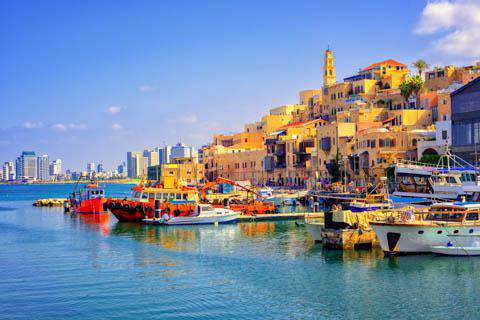
Are you craving an unforgettable 7-day trip to Israel that strikes the perfect balance between relaxation and adventure? Look no further than our carefully curated selection of 7-day guided tours that are perfect for a week-long getaway. We've analyzed these tours based on key criteria such as price, comfort, service, guest ratings, and activities in order to find the top 7-day tours in Israel for your next trip. Whether you're yearning for thrilling excursions, mouthwatering cuisine, or simply a chance to unwind, these week long tours offer the perfect amount of time to immerse yourself into the local culture and activites. Get ready to embark on an extraordinary journey that will leave you with memories to treasure for a lifetime.
- Jewish Israel Tour Package, 7 Days 7 Days, $1390.00
- Classical Israel Tour Package, 7 Days 7 Days, $1370.00
- Christian Israel Tour Package, 7 Days 7 Days, $1340.00
Which 7-day tour options are available in Israel?
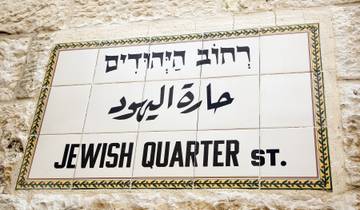
Here are the important factors:
- 6 trip options analyzed
- $218 average price per day (USD)
- 4.52 of 5 average rating
- 38 people or less on average
Curious about the diverse range of tours lasting 7 days? Prepare to be amazed by the array of options available to suit every traveler's preferences. It comes as no surprise that visitors adore these tours, given their exceptional average guest rating of 4.52 out of 5 stars. When it comes to group sizes, the average maximum capacity stands at 38 people, allowing for a comfortable and sociable experience. With a comprehensive analysis encompassing 6 tours lasting 7 days, you can rest assured that Israel has something tailored to your interests and preferences, promising an unforgettable experience for all.
(All tour prices are in US Dollars before taxes, and come from a base price that is reported by TourRadar. Peak season prices can vary significantly, particularly in destinations where seasonal travel fluctuates dramatically.)
So, let's get to it and see...
The 6 Best 7-Day Tours in Israel
Jewish israel tour package, 7 days.
- Great Value: the daily price is lower than average for tours lasting 7 days.
- High Quality: guest ratings are higher than average.
Check out this incredible voyage that has received a 4.6 out of 5 rating from previous guests. Rest assured, this trip is all about local culture, family-friendly activities, and religious sites, guaranteeing an unforgettable adventure. With a duration of 7 days, this journey ensures an intimate group size of 30 people, and is good for travelers aged 4 to 85 years old. This itinerary covers 11 captivating destinations, with stops in Tel Aviv, Caesarea, Acre, and Masada National Park, among others. Jerusalem marks the starting point, while Tel Aviv stands as the final stop on your incredible journey. This fantastic option, organized by Bein Harim Tourism Services , presents an unbeatable value at just $199 per day.
- Sightseeing
- In-depth Cultural
- Local Guide
- Religious Sites
Classical Israel Tour Package, 7 Days
Spanning over 7 days, this trip has a maximum size of 30 individuals. Welcoming travelers aged 4 to 85 years old, it is organized by Bein Harim Tourism Services , a very popular company with plenty of great reviews. Immerse yourself in a travel experience that includes 13 destinations, featuring Acre, Rosh Hanikra, Golan Heights, and Jerusalem. Beginning in beautiful Tel Aviv, you'll have a terrific journey that ends in Jerusalem. This extraordinary adventure also revolves around local culture, family-friendly activities, and religious sites. Available at an unbeatable price of only $196 per day, this option also has a rating of 4.5 out of 5 stars from previous guests.
Christian Israel Tour Package, 7 Days
Here's your chance to take off on an exceptional voyage, visiting Israel and Palestinian Territory, that has garnered a 4.4 out of 5 rating. With a duration of 7 days, this jouney will have 30 participants, and it warmly welcomes travelers aged 4 to 85 years old. This terrific trip also highights local culture, family-friendly activities, and religious sites. Expertly organized by Bein Harim Tourism Services , this amazing trip is an incredible value at just $191 per day.
Israel and Jordan in 7 days
This memorable journey, visiting Israel, Palestinian Territory, and Jordan, is offered by Booking Tours which has received plenty of positive reviews. The trip itself has a guest rating of 4.8 out of 5 stars, and is priced affordably at $202 per day. Traverse through 10 enchanting destinations, with Jericho, Nazareth, Tiberias, and Eilat among the must-see stops along the route. Tel Aviv marks the starting point, while Amman stands as the final stop on your incredible journey. You're in for an epic adventure with a strong emphasis on local culture and family-friendly activities. The maximum group size is 55 people, welcoming people of any age.
Biblical Israel and Jordan 7 days
Set off on an extraordinary journey, visiting Israel and Jordan, that has been awarded a 3.8 out of 5 stars by previous guests. You'll love the emphasis on local culture and family-friendly activities, too. With a duration of 7 days, this journey offers an intimate group setting, accommodating 55 individuals, while extending a warm welcome to people of any age. This trip visits 11 destinations, including Caesarea, Acre, Haifa, and Nazareth along the way. Beginning in beautiful Tel Aviv, you'll have a terrific journey that ends in Eilat. Brought to you by Booking Tours , this exceptional deal is an incredible steal at a mere $236 per day.
- Coach / Bus
Holy Land and Jordan - Group Tour
With this option you can experience an unparalleled trip for 7 unforgettable days, visiting Jordan, Israel, and Palestinian Territory. It ensures an intimate group setting with 30 participants at most. Experience a trip that takes you to 13 remarkable destinations, including Mount Zion, Bethlehem, Jerash, and Petra. Amman will be both the start and end of your journey. Trip500 , the organizer of this journey, extends a warm invitation to guests travelers aged 2 to 80 years old. This extraordinary opportunity offers exceptional value at only $286 per day.
See also The Best Family-Friendly Tours to Israel , The Best Historical Tours in Israel , The Best 10-Day Tours in Israel , The Best 3-Day Tours in Israel , The Best 2-Week Tours in Israel , The Best River Cruises in Israel , The Best Christmas & New Years Tours in Israel , The Best Coach Bus Tours in Israel , The Best Adventure Tours to Israel , The Best Art History, Museums, and Cultural Tours Tours in Israel , The Best Sightseeing Tours in Israel , The Best Cultural Tours in Israel , The Best Romantic Tours for Couples in Israel , The Best Religious Tours in Israel , The Best Tours Under $1000 in Israel , The Best Luxury Tours to Israel , The Best Budget Tours to Israel , or The Best Tours for Seniors to Israel for more tour ideas. With so many options, there's a guided tour or vacation package for every type of traveler.
Also, if you're departing from a specific destination, see The Best 3-Day Tours from Jerusalem , The Best 3-Day Tours from Eilat , The Best One-Week (7-Day) Tours from Jerusalem , or The Best 10-Day Tours from Jerusalem for more package tour options.
How much do 7-day tours to Israel cost?
Visitors will find a large range of terrific options for tours lasting 7 days when planning a visit to Israel. The price of these specific trips can vary according to length, destinations, and travel style. The average price of tours lasting 7 days in Israel based on data from 6 options is an affordable $218 per day. If you're interested in more information about tours here, see our guide to tour prices in Israel .
And for more information on Israel, see Israel Travel Costs and Israel Hotel Costs .
Subscribe to our Newsletter
By signing up for our email newsletter, you will receive occasional updates from us with sales and discounts from major travel companies , plus tips and advice from experienced budget travelers!
Budget Your Trip

Some of the links on this website are sponsored or affiliate links which help to financially support this site. By clicking the link and making a purchase, we may receive a small commission, but this does not affect the price of your purchase.
- Privacy / Terms of Use
- Activities, Day Trips, Things To Do, and Excursions

IMAGES
VIDEO
COMMENTS
Two people traveling together for one month in Israel will often have a lower daily budget per person than one person traveling alone for one week. A one month trip to Israel on average costs around $3,579 (₪13,495) for one person and $7,158 (₪26,989) for two people. The more places you visit, the higher the daily price will become due to ...
Middle East / Israel /. Visitors to Israel usually spend between $51 and $297 per day on average for one person and $103 to $594 for two people. While this is a wide range, the average daily cost averages $126 (₪450) per person. This average includes sightseeing, hotel, food, and local transportation expenses from other travelers.
A handful of average prices are detailed below to help you to envisage how much you are likely to spend. Bed in Hostel Dormitory - $15-$20 per night. Basic Single Room in Hotel/Airbnb - $40 per night. Mid Range Hotel Room - $80 - $100 per night. Bus from Jerusalem to Tel Aviv (and vice versa) - $5 each way.
Rough cost of a return flight between Tel Aviv and Eilat - $90 to $220. Rough cost of renting a car for two weeks in Tel Aviv - $400. Rough cost of renting a car per day in Tel Aviv - Between $30 and $50 per day. Rough cost of fuel - $2.5 per liter, depending on fuel consumption.
The lowest cost for one person to visit Israel for a week is $1,127-$2,226 ($161-$318 per day) Food, Travel, and Sightseeing: $31 to $61 per day for one person's daily expenses. Flights: $502 to $1,145 for economy. Lodging: $68 to $80 per night for one 1-star hotel room. or $80 to $109 per night for a 1-bed vacation rental.
Backpacking Israel 10-Day Itinerary #1: The Northern Hills. Route: Tel Aviv > Netanya > Haifa > Acre > Nazareth. This is a short itinerary for touring the north of Israel. Book into a cool place to stay in Tel Aviv before jetting off for a much different vibe in the quieter cities of Netanya, Haifa, and Nazareth.
Based on the travel expenses of others, a one week trip to Israel costs around $883 on average, per person. This includes food, sightseeing, local transportation, accommodation, and nightlife. For two people, a one week trip costs $1,766. How expensive is a two week trip to Israel? Based on our calculations from previous travelers, a two week ...
Then, why not use our free tool to calculate your Israel travel budget. Travel budget in Israel Israel: calculate your travel budget. ... Daily budget: $ 139 for 2 ppl. $ 51 per person; $ 12 per person; $ 12 per person; Total budget: $ 4013 * (15092 ₪) High budget (tourist) Daily budget: $ 178 for 2 ppl.
The cost of entry to attractions in Israel does, of course, vary dramatically. Entry at most national parks is 25-30 NIS (8-10 USD), and at major museums, 40-50 NIS (11-14 USD), although these do of course vary dramatically. Many of Israel's most fascinating things to do not require an entry fee, for instance, walking around the Old City of ...
In our opinion, road tripping is one of the best ways to explore Israel on a budget. Obviously, getting around Israelby public transport will be cheaper, but it will not be as time-efficient as by car. And time is quite often the most precious thing we have, especially when vacationing. Simply put, time is money.
My daily budget in Israel was anywhere between $75-150 USD per day (depending on whether I was doing any tours). Here's a little rundown of what a trip like mine might cost you: How to do Israel on a budget Accommodations. Accommodations will be, by far, the biggest expense of the whole trip.
This will give you enough to stay in hostels 80-130 NIS per night ($21-$35USD), cook your own food or eat out at cheap street food joints, 10-20 NIS ($2.70-$5.40USD), get around by bus, cheap daily activities and to take an occasional tour. For a mid-range budget plan to have $175-$300USD (650-1115 NIS) per day.
from 102.95 USD to 119.73 USD. Daily budget for one person, assuming that two people travel in a standard close to 1 star (hostels, public transport). When traveling alone, the cost may be slightly higher (hotel room) or the same (dormitory accommodation). Average daily expenses were calculated on the basis of the prices of accommodation, food ...
With some insider tips and a daily budget of $30-$40, you'll be happy and fed during your trip to Israel. Israel may be known for its high cost of living, but fear not! You can still enjoy delicious meals and explore the country on a budget. With some insider tips and a daily budget of $30-$40, you'll be happy and fed during your trip to Israel.
For dining in a mid-range restaurant in Israel, you can expect to pay about US$20-50 per meal. It is customary to leave a tip of about 10-15% for meals enjoyed on-site, while other Middle Eastern countries typically require 5-10% tips. If you seek fine dining, you'd better prepare to pay over US$200 per person.
Main course on the menu of a restaurant: 60 NIS ($17 USD) Street food meal (e.g., falafel or shawarma sandwich, with a drink): 25 NIS ($7 USD) Car rental: Rental: 80-140 NIS ($22-39 USD) per day. Gas: Although prices vary, expect to spend 6-7 NIS ($1.67-1.95 USD) per liter of gasoline.
There may be (up to) a $600 (per person) difference between winter and summer flights. To discuss those details, give us a call at 1-855-958-6877. Accommodations: You'll have various accommodation options in Israel, including hotels, hostels, and vacation rentals.
Our budget travel packages allow you to travel hassle-free with an operations team that is available to assist you 24/7. On our tours, you will visit the most important sites and attractions in Israel. You will stay in hostels in 10-bed mixed dorms or 6-bed female dorms, which will ultimately save you money so you'll have more to spend on ...
Israel & Jordan - 10 Day Budget Travel Package. Destinations Israel, Palestinian Territory, Jordan +2 more Age Range up to 99 year olds Operated in English Operator Tourist Israel. 19% Off . Duration 10 days Price per day $200 From US $1,999. View ...
The cost of travel insurance can vary depending on factors such as your age, duration of the trip, and the coverage you require. On average, travel insurance for a 10-day trip to Israel can range from $30 to $100 per person. Before purchasing travel insurance, carefully review the policy coverage, exclusions, and any pre-existing condition ...
Reporting from the Capitol. Published April 20, 2024 Updated April 21, 2024, 3:06 p.m. ET. The House voted resoundingly on Saturday to approve $95 billion in foreign aid for Ukraine, Israel and ...
During the Israel-Hamas war in Gaza, there have been near-daily exchanges of fire between Israeli forces and the Iran-backed Hezbollah militant group along the Israel-Lebanon border. U.S. officials have recorded more than 150 attacks by Iran-backed militias in Iraq and Syria on U.S. forces at bases in those countries since war started on Oct. 7.
Defense Secretary Lloyd Austin is telling senators that pressure on Israel to improve humanitarian aid to Gaza appears to be working, but more must be ... both Austin and Brown emphasized that their 2025 budget is still shaped with the military's long-term strategic goal in mind — to ready forces and weapons for a potential future conflict ...
Israel's weapons arsenal includes Vietnam-era missiles, some of which have a failure rate as high as 15 percent. Jin Yu Young reports on South Korea, the Asia Pacific region and global breaking ...
From The New York Times, I'm Sabrina Tavernise, and this is "The Daily." Overnight on Saturday, Iran launched its first direct attack on Israeli soil, shooting hundreds of missiles and ...
Visitors will find a large range of terrific options for tours lasting 7 days when planning a visit to Israel. The price of these specific trips can vary according to length, destinations, and travel style. The average price of tours lasting 7 days in Israel based on data from 6 options is an affordable $218 per day.